Distinguished Ag Alumni
DISTINGUISHED AG ALUMNI
Tahirou Abdoulaye (Ibadan, Nigeria | Distinguished Ag Alumni: 2016)
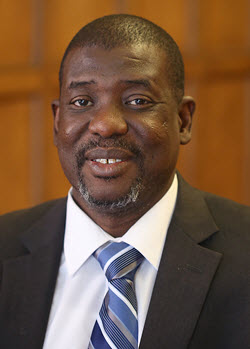
Tahirou Abdoulaye’s is an economist with the International Institute of Tropical Agriculture based in Ibadan, Nigeria. His relationship with Purdue University goes far beyond that of a typical alum, even one who has earned two degrees from the College of Agriculture. Through his work with the International Institute of Tropical Agriculture in Nigeria, Abdoulaye has worked hand-in-hand with the first Purdue Improved Cowpea Storage (PICS) project with responsibilities for Nigeria, Cameroon, Benin and Togo. In Nigeria alone, the PICS team has reached over 10,000 villages, extending the reach of the technology of hermetic storage in triple-layer plastic bags.
After earning his BS in Nigeria in 1988, Abdoulaye worked for the national agricultural research agency in Niger (INRAN) until coming to Purdue, where he earned his MS in agricultural economics in 1995. He returned to INRAN for two years, then came back to Purdue to earn his Ph.D. in agricultural economics in 2002. He returned to Africa to work at INRAN and to continue to work on a project with John Sanders to increase the acceptance of improved millet and sorghum cultivars through better marketing.
Abdoulaye joined the International Institute for Tropical Agriculture (IITA) in Nigeria and is currently the project leader for the PICS3 project, working in Nigeria and Ghana. The latest project has reached 1,500 villages in Nigeria and another 1,000 villages in Ghana. Abdoulaye has participated in many research and development projects aimed at improving farmers’ lives in Africa. He has co-authored more than 50 papers that have made significant contributions to agricultural science in Africa.
He has also retained close and mutually beneficial connections with Purdue Agriculture through collaborative partnerships that have resulted in joint research and by serving on several graduate student committees for the College of Agriculture.
George P. Abide (Minneapolis, Minnesota | Distinguished Ag Alumni: 2017)
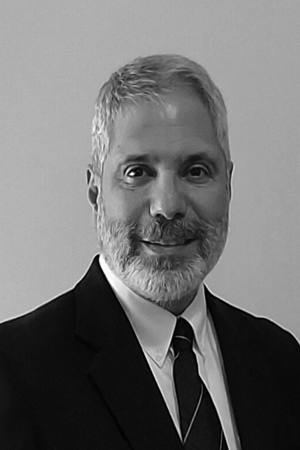
Not surprisingly, George Abide had an idea — to establish a consultancy firm that would be “a friend to ideas and the people who have them.” Today Fortune 100 companies across diverse sectors seek him out for guidance in qualitative consumer research, new product idea generation, and strategy development for teams and businesses.
Abide is a native Mississippian who earned bachelor’s and master’s degrees at Mississippi State University. A food scientist with a business sensibility, he knew he wanted to develop new product ideas for the food industry. He chose Purdue for its reputation and the influence of his mentor, an MSU professor and Purdue alumnus.
Abide looks back at his four years at Purdue as both enjoyable socially and challenging academically. He cites the influence of Professor Emeritus Philip Nelson, who allowed Abide to “explore and experiment” on his way to choosing a research focus; John Floros, now dean of the College of Agriculture at Kansas State University, but then a young Purdue faculty member; and Professor of Food Science Suzanne Nielsen. Abide also admired the late William Stadelman: “You talk to these people who were legends in their field, and it really helps you understand what Purdue means to agriculture,” he says.
Abide began his career as a product development scientist at General Mills, where his contributions to brainstorming sessions were particularly respected. He astutely observed consultants to the corporation and decided he could best focus on the front end of product development from his own company. The Abide Idea Company, founded in 1997, taps the critical-thinking skills he acquired at Purdue, he says: “Even though I don’t work in food science, my food science degree still works for me.”
Abide enjoys gardening and cooking. He and his wife have three sons who represent the Big Ten admirably in their college choices of Minnesota, Purdue, and Wisconsin.
“I have a relationship-driven business and a commonsense approach. Sometimes, I can tell CEOs are a bit surprised that it’s not a slicker sell, but it’s always honest. I think that’s in keeping with a place like Purdue, where you roll up your sleeves and get the work done.”
2011 Purdue University Food Science Department Outstanding Alumni Award
2007 Northern Star Council, Boy Scouts of America Silver Beaver Award
1997-present Founder and Principal, The Abide Idea Company
1992-1997 General Mills, Inc. Product Guidance Associate, 1994-1997 Research Food Scientist, 1992-1994
1992 PhD, Food Science, Purdue University
1988 MS, Food Science, Mississippi State University
1984 BS, Horticulture, Mississippi State University
Nels Ackerson (Potomac, Maryland | Distinguished Ag Alumni: 2002)
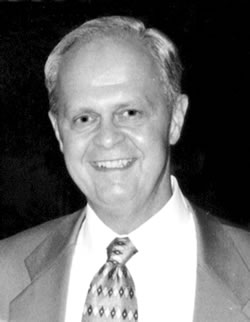
An attorney with a passion for international travel, Nels Ackerson was the ideal candidate to lead an intricate cross-cultural charge: Establishment of Egypt’s first American law office—Sidley & Austin & Naguib—in 1982.
Equally important to the legal landmark, however, were the personal experiences and impressions Ackerson gained through three years in the Middle East.
“Living and working in Egypt was completely unlike anything I’ve done before,” he says. “There’s so much to understand about a culture that goes back 4,000 years. Sites such as the Temple of Karnak ruins display signs of a civilization impossible to imagine in terms of intellect and sophistication.”
Visiting rural villages offered insights to the country as well. “The level of near-destitute poverty of many village people was overwhelming,” Ackerson recalls. “But the character of those who wanted to rise above it was amazing. Egypt is a poor country, but its people are very noble.”
Ackerson also seized the opportunity to act as an ambassador of sorts. “Many Egyptians have had great admiration for Americans in the past, but, in recent years, that’s shifted toward fear and misunderstanding. Too often, Egyptians have found that the Americans in their presence didn’t represent the high ideals they expected. Too many Americans enter the country with arrogant or superior attitudes, and they ignore Egyptian culture and traditions.”
Ackerson’s returned to Egypt several times, always reuniting with colleagues and friends. “I’ve seen enough examples in career paths and policy changes to know that my presence there has made a difference,” he says. “Going through such a rigorous, intense, and rewarding experience to create something unique left me with very strong connections.”
Timothy Adams (Martinsville, IN | Distinguished Ag Alumni: 2013)
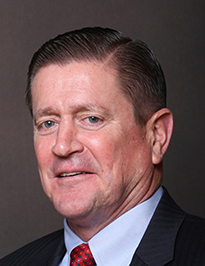
Since retiring from the U.S. Army as a Brigadier General in 2011, Timothy Adams, B.S. 1982, has served as an independent consultant with MBO Partners near Indianapolis. During a distinguished 33-year military career, Adams headed the U.S. Army Public Health Command at Aberdeen Proving Ground, Maryland, where he provided global preventative medicine, health promotion, and veterinary support to soldiers, family members, civilians, and retirees in all theaters of operation around the world.
Adams was responsible for more than 3,000 personnel and an annual operating budget of $200 million. Adams also was commander of the U.S. Army Medical Research Institute of Chemical Defense, Assistant Surgeon General for Force Projection in the Army, and Chief of the 24th Veterinary Corps.
1982--B.S., Biochemistry and Animal Science, Purdue University, 1986--D.V.M., Purdue University, 1992--Master of Public Health, Harvard University, Cambridge, Massachusetts, 2001--Ph.D., Duke University, Durham, North Carolina, 2005-2006--Deputy Commander, U.S. Army Research Institute of Chemical Defense, 2007--M.S., National War College, Washington, D.C., 2007-2008--Commander, U.S. Army Medical Research Institute of Chemical Defense, 2008-2009--Assistant Surgeon General for Force Health Projection, 2009-2011--Commander, U.S. Army Public Health Command, Aberdeen Proving Ground, Maryland, 2012--Independent Consultant, MBO Partners, Martinsville, IN.
Mary Beth Adams (Morgantown , WV | Distinguished Ag Alumni: 2016)
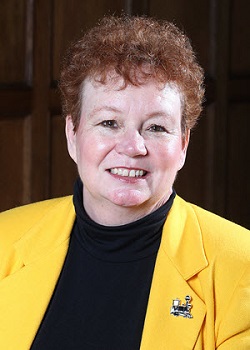 Mary Beth Adams is a research soil scientist for the USDA Forest Service, based in Morgantown, West Virginia. Adams first became interested in the environment while growing up in south-central Indiana. While in high school, Adams spent her summers working for the Youth Conservation Corps at the Muscatatuck National Wildlife Refuge just east of Seymour.
Mary Beth Adams is a research soil scientist for the USDA Forest Service, based in Morgantown, West Virginia. Adams first became interested in the environment while growing up in south-central Indiana. While in high school, Adams spent her summers working for the Youth Conservation Corps at the Muscatatuck National Wildlife Refuge just east of Seymour.
At Purdue, Adams acquired a passion for the research side of science. Much of her current research deals with nutrient cycling in forest ecosystems as affected by different management and disturbance regimes. She conducts long-term experiments and enjoys working with other scientists in the Forest Service as well as at universities and other agencies.“Long-term research is a hallmark of Forest Service Research and Development,” Adams said. “It is important for us to understand that the trends we are observing are due to various management treatments or other causal factors and not just due to annual variability in rainfall and temperature.
My research will help us better manage our forests sustainably for many years.”Adams has co-authored more than 60 refereed journal articles and numerous technical papers and has edited three books. In 2009, Adams was named a fellow of the Soils Science Society of America.
Akinwumi A. Adensina (Nairobi, Kenya | Distinguished Ag Alumni: 2008)
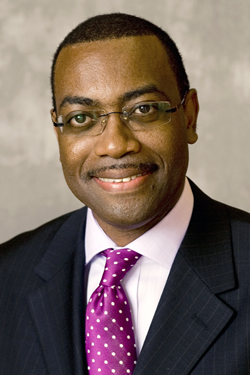 Raised in rural Nigeria, wordsAkinwumi Adesina heard as a youngster were those he took to heart and to the world: “If you ever become someone important,” his father urged, “take the opportunity to help the poor.”Adesina seized the directive to eliminate poverty in Africa through increasing his home country’s agricultural productivity.“I’m running against time, and must make things happen very quickly,” says Adesina. “Poverty in Africa must not be managed, but eliminated.”
Raised in rural Nigeria, wordsAkinwumi Adesina heard as a youngster were those he took to heart and to the world: “If you ever become someone important,” his father urged, “take the opportunity to help the poor.”Adesina seized the directive to eliminate poverty in Africa through increasing his home country’s agricultural productivity.“I’m running against time, and must make things happen very quickly,” says Adesina. “Poverty in Africa must not be managed, but eliminated.”
The race began in 1988 when Adesina was awarded a post-doctoralRockefeller Foundation fellowship — an opportunity that launched a twenty-year career in international agricultural development. Along the path, he has directed every skill and resource to rural farmers who eke their living from the harsh African soil. In 2007, Adesina launched the Alliance For A Green Revolution in Africa, a bold,multi-billion-dollar initiative of the Rockefeller and Bill and Melinda GatesFoundations. As Vice President, he leads teams responsible for development of 10,000 rural agro-dealers in 13 African countries; develops and implements strategies for solving Africa’s soil fertility problems; and creates programs to address market, trade, and policy issues.“A total of 250 million Africans live on less than one dollar a day,” Adesina says.“They have land and labor, but lack the government's support.”Challenges appear straightforward— linking rural farmers to seed and fertilizer, and supporting their efforts with necessary infrastructure and subsidies.
But the path to progress is intricate, requiring the presentation of innovative economic development models to African presidents, governments, and donor agencies and, literally, cultivating his country agriculture program from the ground up. And although Adesina frequently brainstorms in lofty company, he credits his wife, Grace, as the inspiration for his best ideas.“My graduate training at Purdue — among the worlds leading universities in agriculture — was the best investment I ever made, and I’ve carried the tradition and good works of its people with me. ”
Kamphol Adulavidhayas (Bangkok, Thailand | Distinguished Ag Alumni: 1996)
Kamphol Adulavidhaya is president of Kasetsart University in Bangkok, Thailand, the leading institution of higher education in Southeast Asia. It is also the region’s primary source of agricultural education and extension service.
Dr. Adulavidhaya has been associated with the university since 1959 when he earned a Bachelor of Science degree in agriculture. From there, he traveled to the United States and earned a master’s degree in agricultural economics from Oregon State University in 1962, and a Purdue doctorate in agricultural economics in 1970.Dr. Adulavidhaya returned to his native Thailand and joined the faculty in the Kasetsart Department of Agricultural Economics in 1972, and served as department chair until 1979. In 1980, he founded the Research and Development Institute, serving as director until 1986. He was vice president for Research and Development and vice president for Administration before assuming the presidency in 1992, becoming the first agricultural economist to hold the position.
Kamphol chairs the Committee on Cooperative Programs in Agricultural Science for the Japan Society for Promotion of Science and the National Research Council of Thailand. He is a board member of the Regional Research Institute of Agriculture in the Pacific Rim, Tokyo, and The Asian Vegetable Research Center in Taiwan.
Dr. Adulavidhaya has served three consecutive terms as president of the Agricultural Economics Society under the patronage of His Majesty the King of Thailand. He has received an honorary doctorate from Tokyo University of Agriculture, and is an honorary professor at Beijing Agricultural University. He received the Golden Garuda Award for Outstanding Civil Administrator from The Thai Society of Civil Service and was named the Distinguished Administrator in Education Development by the Foundation for the Thai Society.
He has edited two books and written more than 50 research articles. For the last 25 years, he has been the Thailand delegate at international conferences relating to agricultural development. Currently, he is president of the Purdue University Alumni Club and the Oregon State University Alumni Club in Thailand, and serves as secretary of the Kasetsart University Foundation.
William R. Aimutis (Blaine, Minnesota | Distinguished Ag Alumni: 2002)
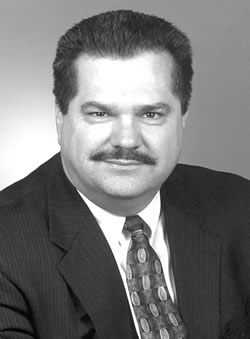
No doubt William Aimutis could recite this litany—along with friendly, courteous, kind, obedient, cheerful, thrifty, brave, clean, and reverent—in his sleep. The 12-point Scout law he first learned as a youngster growing up in Crown Point, Indiana, is the same creed Aimutis shares with his two sons, Vince (18) and Don (15), and with the members of Rockton Boy Scout Troop 619.“I like the ideals of Boy Scouts, and I enjoy teaching youth lessons in leadership,” says Aimutis of his 10 years as Scoutmaster. “My first passion is the outdoors, and scouting combines everything I love.”Nature provides plenty of adventure as well, and Aimutis recalls one escapade in particular.
During an outdoor camping jaunt in Galena, Illinois, his assistant scoutmaster was rushed to the hospital with an appendicitis attack. As Aimutis drove back to the campsite, cold rain turned to heavy snow. “After your first camp-out in bad conditions, you figure out ‘who’s who’ pretty quick,” he laughs. “Kids haven’t changed as much as they think.”Aimutis can look forward to further high-energy quests, thanks to his recent role as leader of the Venturing Crew, a co-ed group of 14- to 20-year-olds. On the agenda are backpacking, water skiing, rock climbing, and a Colorado hiking trip.
In addition to family fishing vacations this summer, Aimutis also hopes to visit his favorite spot in the country—the mountains of New Mexico—for a scout training program.“My philosophy is you can’t be over-trained when it comes to working with youth. And my objective is to train today’s youth, so they can carry on leadership lessons.”
David D. Anderson (Indianapolis, IN | Distinguished Ag Alumni: 2010)
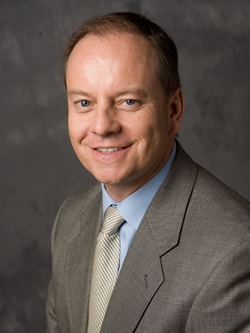
Seeds are like computers—no one wants to buy last year’s laptop. To stay competitive, Dow AgroSciences relies on David Anderson and his team to project what growers will want in the next growing season and to have it ready to meet the demand.“Sometimes it’s a little like guessing what the next Tickle Me Elmo toy will be 18months before Christmas,” Anderson says.Once the corporate direction is set, Anderson turns strategy into action. A member of the company’s Global OperationsTeam, he directs the planning and supply process, growing field operations, production, processing, and distribution. He is responsible for significant budgets and a sizable workforce globally, and his job involves regular travel to South America, Mexico, and Europe.“One thing that stands out in my mind is going to a remote place in Brazil, 20 miles down a dirt road from a paved road, and appreciating the scope of agriculture,” he says. “It was a good opportunity to think about the systems we have in place to organize and manage something that's spread out.”Throughout his career, Anderson has used his approachable style to build effective teams and programs that have improved worker safety and job satisfaction; improved operational processes and efficiencies; and advanced seed production technologies and seed quality standards for canola, corn, sorghum, soybean, sunflower, and Wheaton a global scale.
Mentoring has been a key component of his influence in the industry. He crosses departments or organizations to find curious, energetic people and then helps them maximize their strengths. One colleague who drove around SouthAmerica with Anderson for a week concluded, “You’re a control freak, but you're not a micromanager.”Anderson’s interest in seeds germination his family’s farm in Montgomery County, Indiana. When he’s not on the job, he enjoys time with his wife, Marisa, and three children ages 7 to 14—and he is an avid Purdue sports fan.“I had a lot of interaction with the people at Purdue University through 4-H, FFA, and family. Then, as president of the Purdue Foundation Student Board and freshman class president–Purdue Student Association, I had opportunities to further develop leadership skills.”
Walter J. Armbruster (Oak Brook, IL | Distinguished Ag Alumni: 1999)
Walter J. Armbruster earned bachelor’s (1962) and master’s (1964) degrees in Agricultural Economics from Purdue and a doctorate in Agricultural Economics from Oregon State University (1970). He is currently Managing Director of the Farm Foundation. Here are some of his thoughts on education, career, and life: On his early years: “I grew up on a small farm near Lawrenceburg in southern Indiana. We didn’t earn a living on the farm, but we learned the work ethic by raising enough animals to feed ourselves and to take to market, and by growing feed and grain for the animals and tending a huge garden. I spent many hours hunting and fishing and pursuing other outdoor activities, and that background gave me an appreciation for agriculture and for the environment.” On deciding to come to Purdue: “I came to Purdue intending to be an engineer, but after the first year I didn’t find that very appealing. Some aptitude tests identified several possible majors, and I went around and talked to people in those departments.
Ag Econ came across as the most interesting. I was in the first undergrad agribusiness management program and continued that focus for my master’s. I was the first in my family to come to Purdue: my four younger brothers are all Boilermakers too.” On major Purdue influences: “My Purdue education formed the basis on which I was able to build a career. Interaction with recognized leaders in agricultural economics and policy helped me find the opportunities that fit me. “Another major influence was the food service work that I did to help put myself through school. First as waiter captain and then as head waiter, I was in charge of 90-person wait staff. It was a great experience to learn how to manage people and schedules. It was very demanding in addition to my classroom work, but I also made a lot of good friends in the process.”
On his career: “The most rewarding thing about my work is the opportunity to interact with national and international agricultural leaders in both public and private sectors. “The Farm Foundation serves as a catalyst, bringing a lot of people together to talk about various topics. I meet many interesting people that way. “I can really say I enjoy my work. It has brought opportunities for extensive travel in the United States and abroad. Last summer my family spent three weeks in South Africa. It is a beautiful country, with. some big challenges for agriculture and food production.” On his philosophy of life: “Look ahead, do as good a job as you can, and let the recognition come from that.” On his hopes for the future: “I hope we can produce good quality, safe food supply for as many people in the world as possible in a manner that is environmentally conscious. Personally, I’d like to help bring people together to shape the agenda for agriculture in the future.” His advice to students: “Get a sound education to in something with basic interest to you. Then follow the leads you get and you’ll find a way to apply that knowledge to serve broader society and to find a satisfying career for yourself and your family.”
Highlights/Armbruster Education B.S., Agricultural Economics, Purdue University, 1962 M.S., Agricultural Economics, Purdue University, 1964 Ph.D., Agricultural Economics, Oregon State University, 1970 Career 1978-present Farm Foundation, Oak Brook, Illinois Managing Director Associate Managing Director 1976-78 United States Department of Agriculture Staff Economist, Agricultural Marketing Service 1968-76 United States Department of Agriculture Agricultural Economist, Economic Research Service Honors and Associations American Agricultural Economics Association, Past President American Agricultural Law Association, Past President International Association of Agricultural Economists, Secretary/Treasurer Council on Food, Agricultural and Resource Economics International Food and Agribusiness Management Association North Central Rural Development Center, Board of Directors Family
Dr. Armbruster’s wife, Helen, is a homemaker and does the most important job of raising their 11-year-old son, Sean, who does a little bit of everything, including playing piano and percussion in marching band, playing soccer and baseball, and singing in the church choir. Dr. Armbruster has coached the soccer team and has learned as much as his son has in that endeavor. Display quote/Armbruster “The most rewarding thing about my work is the opportunity to interact with national and international agricultural leaders in both public and private sectors. The Farm Foundation serves as a catalyst, bringing a lot of people together to talk about various topics. I meet a lot of interesting people that way.”
Glenn S. Armstrong (Highland Park, IL | Distinguished Ag Alumni: 2009)
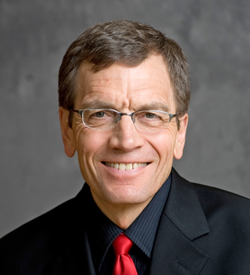
Whenever someone orders McDonald's fillet-of-fish sandwich, buys a Whirlpool KitchenAid refrigerator-freezer, or picks a pack of Wrigley’sOrbit Drops, Glenn Armstrong smiles.“Most rewarding is seeing someone select ‘my’ product, and knowing that people make a living by producing it,” he says.“As a food scientist, I can help people live better lives.”And as a skilled researcher and consultant, Armstrong also can strategize ways to reach consumers.
His current focus as vice president of corporate and business innovations forAlticor, Inc., the parent company of Amway, is to re-vamp a fifty-year-old business model to make Amway’s products and sales force relevant to today’s consumers. His “innovative toolbox” includes Web communities and micro-franchising, and projects take him around the world. When he joined Alticor in 2007, global sales totaled $7 billion. Sales currently total $8 billion, with the goal of$12 billion by 2012.“Benchmarks” are synonymous with“Armstrong.” Recruited to the WrigleyCompany by CEO Bill Wrigley Jr., Armstrong was charged with moving the legendary business from gum maker to global confectionary company. Within two years, Armstrong’s confections teams introduced five new candy products.
As director of advanced product concepts for Whirlpool Corporation’sRefrigeration area, his group took five projects through prototype and business analysis—the most significant of which was a redesign of Whirlpool’s side-by-side refrigerator/freezer. Moving this model's ice maker to the freezer door saved space and garnered a spot on the high-end Kitchen Aid showroom in 2000.“Many projects are a total stretch,” he says, “but that’s what makes them fun.”Armstrong is also challenged by two wheels. A dedicated competitive endurance cyclist, he placed first in his age group in the 2001 National 24-Hour Challenge, held annually near Grand Rapids, Michigan. His stretch: 401 miles in 24 hours.“I wear my passion for life on my sleeve, and when I hire people, I look for what intrigues or excites them. Job-related skills can be taught, but passion must be part of the soul.”
Robert E. Armstrong (Alexandria, VA | Distinguished Ag Alumni: 2007)
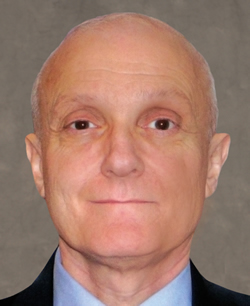
Two beliefs are among those guiding Robert Armstrong’s life: the need for lifelong learning and agriculture’s commanding role in the world, which today is marked by the imperative to develop a bio-based economy. Armstrong’s own extensive and ongoing education began with a bachelor's in psychology and has included two master’s degrees, a doctorate in agronomy, and his latest achievement, graduating from the Army War College in 1999. After earning his Purdue doctorate in
W. Dwight Armstrong (Lewisburg, OH | Distinguished Ag Alumni: 1995)
Dr. Armstrong is President and Chief Executive Officer of Carl S. Akey, Inc., a privately owned company that provides nutritional products and services to the feed, livestock and poultry industries. Their primary business activity is the production of dietary premixes containing vitamins and trace minerals that are used in the formulation of diets for all species of livestock and poultry. They also provide key ingredients such as antibiotics and amino acids used in the feed industry. Additionally, they provide nutritional formulation assistance to customers using their products. Upon completion of his graduate studies, Dr. Armstrong accepted a faculty position at North Carolina State University.
During his academic career, he published 20 refereed papers, 21 abstracts and 16 articles in the popular press. He was also the recipient of North Carolina State’s Outstanding Teacher Award. In 1982, he served as a visiting lecturer in Eastern Europe as a member of the American Soybean Association. That same year, he accepted the position of Director of Nutrition with Carl S. Akey, Inc. Four years later he was appointed vice president and, in 1993, assumed his present position. During his tenure with Carl S. Akey, Inc., the company has exhibited tremendous growth in all aspects of the business. Dollar sales have increased from 30 million to 115 million, and the number of employees has gone from 70 to more than 250. Their market served customers in ten states and now encompasses much of the United States and six foreign countries.
Dr. Armstrong currently serves on the American Feed Industry Association’s board of directors and executive committee. He is a member of the American Society of Animal Science, the American Institute of Nutrition, the American Dairy Science Association, and the Council for Agricultural Science and Technology. He is also very active in his church and community. A major focus of his efforts has been raising dollars and support for his local school system.
Jeffrey G. Arnold (Temple, TX | Distinguished Ag Alumni: 2008)
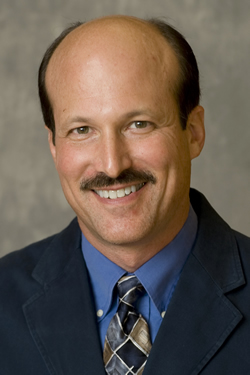
When it comes to understanding the effects of management decisions on water quality and quantity, much of the world turns to the Soil and Water Assessment Tool developed by Jeffrey Arnold while earning his doctoral degree in agricultural engineering at Purdue. Popularly known as SWAT, the public domain software is a river basin scale model used to quantify the impact of land management practices in complex watersheds. It’s supported by the USDA, Agricultural Research Service at the grassland, Soil and Water ResearchLaboratory in Temple, Texas, where Arnold has spent most of his career. There, he is responsible for a $3.5 million annual budget and a staff of 35. His research in the last quarter of a century has been published in some 235 articles and chapters and reported at nearly 50 national and international meetings. In the United States, his work plays a key role in USDA conservation policy and the Environmental Protection Agency’s environmental policy. His international reach is equally profound, evidenced by 23 scientists from 17countries who have traveled to work with him. Arnold’s greatest satisfaction is that his work is utilized rather than sitting on a shelf. He says his time at Purdue was important for completing SWAT, and for collaborating and establishing
cooperation he’s continued with faculty. Impressive credentials aside, Arnold says he won’t be tallying his publications on his deathbed. “I’ll be thinking about the people I touched paths with.”
Raised on an Illinois farm, Arnold was drawn to agriculture, but “I wanted to get away from the farm and see what else was out there.”Today, he enjoys his Texas yard, growing vegetables, and flowers in two seasons — spring and fall. “Get ‘em in early and keep ‘em watered” is the secret
to his success.“You are at one of the best universities in the world. Enjoy the time you have with the faculty and other students, and keep those contacts as you move on in your career.
Melissa Ann Ashlock (Bethesda, MD | Distinguished Ag Alumni: 1998)
Medical research is not just a career endeavor for Dr. Ashlock, but the fruition of a childhood dream. She is currently acting chief of the Vector Development Section of the Lab of Gene Transfer within the Division of Intramural Research of the National Center of Human Genome Research (NCHGR) at the National Institutes of Health. The Division of Intramural Research of the NCHGR strives to develop technology to identify, analyze, and treat genetic diseases. Dr. Ashlock’s research focuses upon the method of gene delivery to cells in a variety of genetic diseases.
Early in her life, questionable advice dimmed her medical aspirations. During the commencement of her Purdue education, she sought instead a career in foods and nutrition. The encouragement of a biochemistry professor reawakened Dr. Ashlock’s dream by encouraging her to consider medical school. Although her academic endeavors were demanding, she continued to pursue extracurricular interests as well. She was an active member of the Delta Gamma sorority and served as president of the Student Union Board. Dr. Ashlock remains the only woman from the School of Agriculture to earn the prestigious Flora Roberts Award, honoring the outstanding senior woman on campus.
After her Purdue years, international experience played a key role in Dr. Ashlock’s professional development. While spending a year at the University of Innsbruck in Austria on a Rotary International Fellowship, Dr. Ashlock sharpened her communication skills and broadened her awareness of the international community. Dr. Ashlock credits this experience for lending her a better understanding of the beneficiaries of medical research—people all over the world.
Returning to the United States, Dr. Ashlock attended Cornell University’s Medical School. After interning at the New York Hospital of Cornell Medical School and a residency at the Dartmouth Medical Center in Hew Hampshire, she joined the NIH in 1988 where she remains today. For contributions to her profession and community, and for bringing distinction to her alma mater, Purdue University School of Agriculture is proud to present the Distinguished Alumna Award to Dr. Melissa Ann Ashlock.
P. Stephen Baenziger (Lincoln, NE | Distinguished Ag Alumni: 2002)
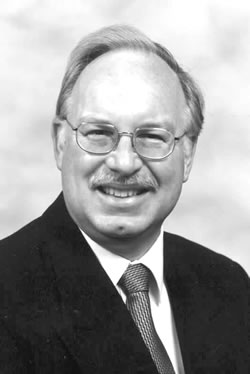
Give Stephen Baenziger some ballads to listen to and a ticket to travel, and he’ll tell you he’s a happy man. Both are pastimes he relishes. He not only experiences great pleasure listening to music from the 1960s and 1970s, he enjoys learning the stories behind the lyrics, too. “What’s most interesting to me is realizing that the songwriter felt the emotion, too,” Baenziger says. “I find it interesting to think about the origin of these songs and what the writer was thinking, like the former slave ship captain who wrote “Amazing Grace,” and Woodie Guthrie’s “This Land,” when he talks about land being taken away from the average American. I like learning where these songs come from.”
As in the tune, “On the Road Again,” Baenziger also enjoys seeing the world. And he’s traveled much of it—Central and South America, Australia, China, Japan, many European countries, Turkey, Israel, and countless other spots. Among his favorite trips is one he shared with his daughter Aubrie a couple of years ago, when the two spent New Year’s Eve in Paris, a high school graduation gift to her. Another that stands out is a trip to a small village in Western China. “I became the oddity to check out at the bustling market,” he recalls.
Experiencing different cultures, as well as checking out the local agriculture scene, are highlights for him. “I just love travelling,” he says. On his wish list for future travels are Eastern Australia and Southeast Asia. And this wheat breeder says, “I’d love to see the great wheat production areas of the former Soviet Union.”
Tracy A. Baker (Bradenton, FL | Distinguished Ag Alumni: 2004)
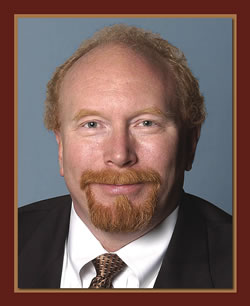
Because his job in food science research and management isn’t one that lets him check off a list of tangible daily accomplishments, Tracy Baker turns to hands-on pastimes to give him the satisfaction that comes from completion. “I like hobbies where I can lay out a timeline and when I’m done I can pack up the tools, sit back and see that I completed something,” he says. Tinkering is something he’s long enjoyed, he says. He mastered it at the side of his grandfather, an electrician. “He always referred to me as his plumber’s helper,” Baker says. “I learned a lot from him. I even rebuilt and repainted a 1959 Edsel when I was 15.”
Today, gardening, his greatest passion, and woodworking fill the bill. Baker started his latest gardening project with a clean canvas in Bradenton, Florida, when he moved into a new house on three-quarters of an acre. “I’ve been trying to give my house personality,” he says of his landscaping efforts that include planting a banana tree, five different varieties of palm trees and a host of tropical plants. “Most things here don’t die. And they grow like crazy. So I plant them, they grow, and I trim them.” He’s also created an indoor garden around his screened-in pool. Woodworking is a hobby he’s returning to, with a new shop just set up. First on his list is a dining room table with marble inlay.
In earlier years, he’s mastered fine cabinetry, made a hutch, some tables and bookcases. “It’s something I can look at and say, ‘I completed that,’” he says. “It balances my workday.” “The years spent at Purdue turned a shy, awkward, small town boy into the very confident outgoing leader I am today. Although my formal Purdue education opened the door for me, it was lessons learned at Purdue that formed my career.”
Robert W. Baltzell (Omaha, NE | Distinguished Ag Alumni: 1998)
Mr. Baltzell’s remarkable contributions to the animal feed industry have elevated him from salesperson to accomplished entrepreneur. He began his career in 1969 in sales for the Chicago-based company Bullard-Aylor, a firm representing manufacturers in the livestock feed and pet food manufacturing industry. Success swiftly elevated him to manager of a subsidiary facility of the same company in 1972.
During the three years under his direction, the subsidiary doubled its sales. Gifted with the talent to recognize future industry needs and an unrelenting enterprising spirit, Mr. Baltzell purchased the Omaha division of Bullard-Aylor and formed his own company, Baltzell Agri-Products. Today he is owner and president of this company that specializes in manufacturing and distributing pre-mix and mineral feed ingredients for livestock food products. Since 1980, when Baltzell Agri-products and another company merged to optimize production, the company has increased sales from $1 million to over $25 million. Mr. Baltzell is currently vice-president and co-owner of another feed industry company, the Gladwin A. Read Company in Elgin, Illinois. The company is a sales agency representing many feed-related companies across the Corn Belt such as PCS Phosphates, Milk Specialties, and De Gussa. He is also very active in the American Feed Industry Association and a founding stockholder of the American Feed Insurance Company.
During his years at Purdue, Mr. Baltzell not only excelled in the classroom, but also protected the quarterback and rushed the ball for the 1966 and 1967 football team as starting right half-back. In 1967, he and the rest of the team secured a victory at the Rose Bowl over Southern California. Demonstrating more than just athletic prowess, he earned the Leonard Wilson Award honoring the senior player who best exemplified unselfishness and dedication to the team. Mr. Baltzell continues to support Purdue today as a member of the Presidents Council, a benefactor providing valuable undergraduate scholarships for students majoring in Animal Science, and a loyal all-around athletic fan. For contributions to his profession and community, and for bringing distinction to his alma mater, Purdue University School of Agriculture is proud to present the Distinguished Alumnus Award to Mr. Robert W. Baltzell.
Antônio Bandeira (Vicosa, Bandeira | Distinguished Ag Alumni: 1997
Dr. Bandeira is president-director of AGROS in Brazil, a social insurance institute for the Federal university of Vicosa’s employees. Agros provided health assistance to 16,000 active and retired university employees and their dependents. From 1992 to 1996, he served as rector (president) of the Federal University of Vicosa (UFV). Dr. Bandeira has been associated with UFV since 1969, when he earned a master’s degree in agriculture economics.
In 1970, he joined the UFV faculty. After earning his doctoral degree at Purdue in 1977, he returned to UFV as a faculty member in the Department of Agricultural Economics. During his tenure at UFV, he has advised numerous graduate students and taught a variety of courses. An avid researcher, he has published 28 technical and scientific papers. While rector of UFV, Dr. Bandeira fostered an important relationship with Purdue University. By helping establish collaborative research projects and initiating discussions on a study abroad program, he nurtured a connection between the universities that benefits students and faculty at both institutions.
During his career, Dr. Bandeira has tirelessly served the UFV and the Vicosa community. He was a member of both the Graduate and Departmental Councils of UFV School of Agriculture. He was president of the Forum of the Rectors of the Federal Universities in Minas Gerais. Appointed by the governor of Minas Gerais, he served as a member of the Social and Economic Development Council for the state. Dr. Bandeira has earned many prestigious honors.
In 1976, while studying at Purdue, he was named a member of Gamma Sigma Delta, an agricultural honor society. In 1955, he received the Medal Santos Dummont from the state of Minas Gerais for his outstanding contributions to education. He also has received the Award of Distinction from the Brazilian Society of Agricultural Economic and Rural Sociology.
Michael J. Beach (Atlanta GA | Distinguished Ag Alumni: 2011)
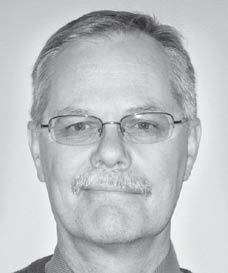
Addressing an international scientific forum, a class of fifth-graders, or a television news audience. In all settings, his research and work in public health have made him a respected epidemiologist and authority on disease prevention, especially waterborne diseases. In his current position, he coordinates activities related to water safety, sanitation, and hygiene across eight centers of the CDC.
Beach manages 55 professionals on four teams. The Domestic Water, Sanitation, and Hygiene (WASH) Epidemiology Team focuses on waterborne disease surveillance, emergency response, and prevention of diseases associated with drinking, recreational, and other water uses in the United States; the Global WASH Epidemiology Team works on preventing diarrheal and nonenteric disease associated with water use and inadequate sanitation and hygiene in the developing world; a WASH Laboratory Team studies environmental microbiology, molecular epidemiology, serology, and free-living amoebae related to global prevention of WASH-related disease; and the Health Promotion and Communications Team translates science into prevention messages and campaigns to promote global waterborne disease prevention.
Beach led efforts to fund and design a Healthy Water website that highlights CDC waterborne disease and water-related work. Since www.cdc.gov/healthywater went live in March 2009, it has had more than a million hits. Beach’s epidemiological activities have not been restricted to waterborne problems; he has participated in 25 outbreak investigations as well. His experience has therefore affected topics of considerable interest to the agricultural community. Away from work, he enjoys hiking, camping, backpacking, and rock-climbing. He has two children, one of whom was born while he was writing his thesis at Purdue. Beach is a lifelong learner who values the continual new challenges the CDC offers as well as the applicability of his work. “I’ve never felt that I go very long without seeing the direct impact that I have,” he says. “We make decisions on a regular basis that impact national and international health.” In the Advanced Guard of Disease Prevention.
Elizabeth A. Bechdol (Auburn, IN | Distinguished Ag Alumni: 2009)
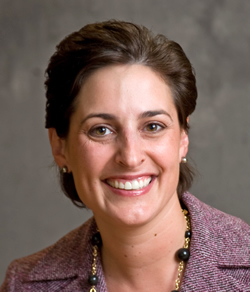
From education to high-profile career
posts to family commitments, Elizabeth
“Beth” Bechdol says, “I live for the
challenge and I give 100 percent of
everything I have to that challenge.”
After graduating cum laude from
Georgetown University’s School of
Foreign Service, she enrolled in Purdue’s
agricultural economics master’s program
in international trade and policy, earning
her degree and Outstanding Master’s
Thesis Award in 1996.
That June, she joined Sparks
Companies Inc. (now Informa
Economics) staying five years as vice
president. She then spent a year as
deputy staff economist for the Senate
Agriculture Committee and three as chief
of staff to the under secretary for Farm
and Foreign Agricultural Services at the
U.S. Department of Agriculture.
After nearly a decade on Capitol Hill,
Indiana and family called her home,
where she was invited to take on the
challenge of helping launch the state’s
first Department of Agriculture.
She spent three years as deputy director,
an experience, she says, “I wouldn’t
trade for anything.”
In December 2007, she was recruited
by Indianapolis’s Ice Miller LLP to debut
and direct the firm’s agribusiness
strategies and lead business development
and marketing efforts.
She lives in her native DeKalb County,
where her father still farms. Spending
time with family is her chosen pastime
today, with many activities, such as
horseback riding and ballet lessons,
centered on her daughter, Grace, 7. “I
wish I could claim car racing or rock
climbing as a hobby,” she says, “but right
now I simply enjoy every chance I get to
be with my family.”
Because of family members’ diagnoses,
she’s also active with the Cystic Fibrosis
Foundation and the Indiana Chapter of the
Huntington’s Disease Society of America.
She also serves on several Purdue and
agricultural boards and associations.
“Purdue’s master’s program offered a great complementary
set of skills by taking analytics, concepts, thoughts,
and words, and putting quantitative substance behind them.
It’s also where I learned how the agricultural industry
works and what the relationships are.”
John Becherer (Chesterfield, MO | Distinguished Ag Alumni: 2014)
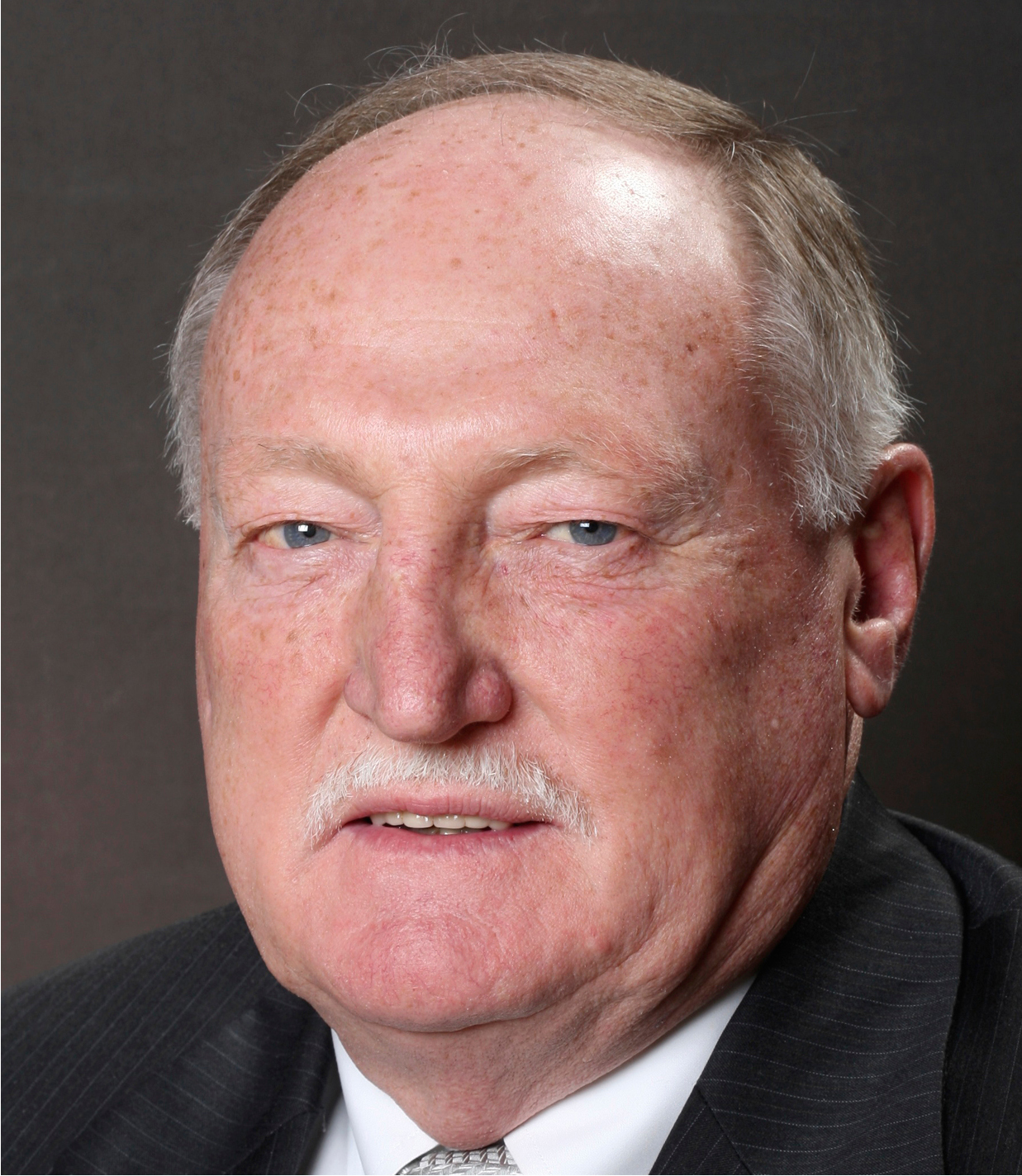
Since 1994, John Becherer, M.S. ‘87, has
served as the chief executive officer of the
United Soybean Board. The board consists
of 70 soybean producers appointed by the
U.S. Secretary of Agriculture who are
charged with investing soybean checkoff
funds to benefit U.S. soybean producers.
Becherer oversees the investment of
USB’s $100 million annual checkoff funds
used to develop international and domestic
markets, find new soybean uses, conduct
soybean production research, and
implement communications activities. He
also serves as a spokesperson for the
board, meeting with industry and
government officials as well as soybean
producers and agricultural groups.
A 2009 study determined the soybean
checkoff has returned $6.40 in additional
profits to U.S. soybean farmers for every
dollar invested.
Becherer grew up on a farm in central
Wisconsin. His position with the soybean
board allows him to continue his
careerlong interest in helping producers
farm more profitably.
After managing a construction company in Milwaukee for 14 years, Becherer
returned to school to pursue his master’s
degree at Purdue University. In West
Lafayette, Becherer served as senior
director of development and programs for
the Conservation Technology Information
Center, a clearinghouse for technological
information on soil conservation.
What part of your visit back to campus in
March are you most looking forward to?
I’m looking forward to going back to the
AgEcon department to visit with the
professors and students. The department is
multinational in composition and reflects
the global approach I am involved with in
the soybean industry.
Why did you select Purdue as the place to
continue your education?
I chose Purdue because Purdue chose me.
I applied at several universities and Purdue
assured me that if I was serious about
getting a master’s degree, they were ready
and willing to help me achieve my goal.
Were you a good student when you were at
Purdue?
I was an average student at Purdue. I
went back to school when I was 35 years old to get my master’s degree. Having been
out of school for 14 years before going
back was a major hurdle for me to
overcome. After two years, by the time I
graduated from Purdue, I was a good
student on average, based on the overall
time spent getting my degree.
What was the most difficult course you took at
Purdue? What made it so difficult for you?
Math for economists was my most
difficult course at Purdue. After being out
of school for 14 years I felt like I had to
almost start over with math at Purdue. By
my second semester at Purdue I was taking
the graduate level math for economists
course and was overwhelmed. Thankfully,
the doctoral student teaching the course
was willing to assist me and I became
proficient enough to pass the course. What is the best advice you got while you were
at Purdue? Who gave you the advice?
Otto Doering told me he had a feeling I
would be working with farmers after I got
my degree and told me I needed to tell
farmers what they needed to hear and not
what they wanted to hear. As I look back I
feel the advice Dr. Doering gave me is good
advice no matter who the audience is.
What is the best advice you have ever given?
To whom did you give the advice?
I have told many people that the most
difficult thing I have ever done, for myself
and my family, was to get my AgEcon
degree from Purdue. It was also the best
thing I ever did. Based on that, I have
encouraged people to take on difficult
challenges because the rewards can be great.
Tom J. Bechman (Franklin, IN | Distinguished Ag Alumni: 2005)
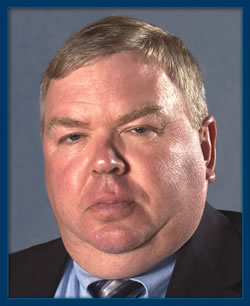
For nearly 25 years, Tom J. Bechman
has devoted himself to a single mission:
helping farm families survive and thrive
by identifying and publishing news most
pertinent to their lives.
New technologies, continually evolving
science, and an ever-changing industry
challenge him as he sifts through
information, news releases, research
findings and technical reports.
“Someone has to interpret all the
science that comes out and show how it
might apply and why you should care,”
the editor of Indiana Prairie Farmer
says. “Whenever I find a new idea or a
new thought that could either improve
someone’s life or their income, I
consider it a personal challenge to
present it in the most useful form.”
He’s also partnered with others to, as
he says, “stretch myself and the pages of
our magazine through quasi-research
projects.” His work includes precision
agriculture software research, Purdue
Extension bean booster soybean plots
and discovery plots at the Farm
Progress Show.
He brings his communication expertise
to Purdue Ag Comm classes where he
teaches students about feature writing,
often publishing their work.
Bechman’s interest in farming stems
from childhood years on an Indiana
tenant dairy farm.
“You need to understand your
audience,” he says of his publishing
tenure, which followed four years as a
high school ag teacher. “Growing up on
a small farm and then teaching ag, I
understand the audience.”
His hobby is collecting toy tractors
(he has about a hundred) and farm
implement sales literature, mostly from
the 1950s. His prized possession is a
sales piece on the John Deere 520, 620
and 720 Series that came out in the late
1950s. “That’s kind of special,” he says,
“because Dad bought a 620 in 1958.”
“Facts and figures and what I got out
of books were important. But the value of
my Purdue education was more about
how to learn and grow in life.
I learned a lot about that.”
Scott C. Beck (Atlanta, IN | Distinguished Ag Alumni: 2005)
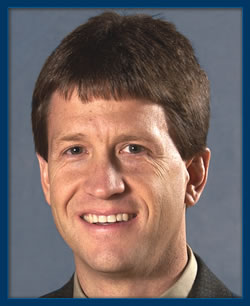
Bringing advertising in-house,
achieving new heights in marketing
success, overseeing some 50 different
research studies on 125 acres, and
launching an organic seed subsidiary
are among the accomplishments of
Scott C. Beck, vice president of Beck’s
Hybrids, a family business founded in
1937. Its products include hybrid seed
corn, soybeans, wheat, alfalfa, and other
forages, sold within a 140-mile radius.
He’ll tell you, though, that true
achievement is “the opportunity to come
into the family business and incorporate
my faith, my value in my family, and the
unique gifts and talents I’ve discovered
and cultivated into the areas of the
business I serve.”
The company’s annual field “day” has
grown to a four-day family event
attracting 7,000 for numerous tours,
agronomic research reports, technology
information and children’s activities. “It’s
a unique event that’s grown to this level
over the last 10 to 15 years,” Beck says.
Closely tied to customer service, the
research program provides information
on how to farm better, how practices
affect yield, how different populations
affect standability, how planting speed
affects seed spacing and yield, and more.
He joined the business the year of its
50th anniversary after earning his Purdue
agronomy degree. He was the company’s
12th employee; today it employs 120
people fulltime. In 2001, he launched a
subsidiary, Great Harvest Organics, and
serves as its president.
“What’s unique about us is that we
have remained independent, and we
license from many different sources.”
Beck serves on the Indiana Crop
Improvement Association board and as
secretary of the corn and sorghum
division of the American Seed Trade
Association. In his spare time, he enjoys
water activities and his children’s
sporting events.
“From the first day on campus, I discovered
that Purdue’s agronomy faculty were
very much interested in me as a person
and in what was of interest to me.
They care about their students.”
Lawrence “Sonny” Beck (Atlanta, IN | Distinguished Ag Alumni: 1992)
Mr. Beck is the President and General Manager of Beck’s Superior Hybrids of Atlanta, IN. Beck’s Hybrids started as a family business and has grown to be a seed industry leader under Mr. Beck’s direction. They are now marketing in Virginia, Kentucky, Tennessee, Illinois, Wisconsin, Michigan, and Ohio, as well as in Indiana. Mr. Beck has distinguished himself not only as an astute businessman, but as a leader in service to agriculture, His business philosophy emphasizes quality, service, and the importance of agronomic research to the future of the seed trade industry. He has served as President of the Indiana Crop Improvement Association, member of the State Steering Committee of the Indiana Institute of Agriculture, Food, and Nutrition, and as a board member of the National Soybean Council. Mr. Beck was awarded the Master Farmer Award from Indiana Prairie farmer in 1979 and received the Crops and Soils Award from the Indiana Crop Improvement Association in 1988. Purdue has recognized Mr. Beck both as an outstanding student and alumnus. He received the Doane Award from the FarmHouse Fraternity and the Outstanding Senior Man Award in 1962. The FarmHouse Fraternity honored him with the Darrel Snyder Alumni Award in 1989. He has been an active, loyal supporter of Purdue University. He has served Purdue as a member of the Purdue University Executive Council, Parents Council, and the FarmHouse Fraternity’s Scholarship and Foundation Boards.
Larry E. Becker (Indianapolis, IN | Distinguished Ag Alumni: 2012)
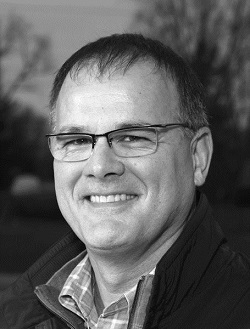
By the time Larry Becker was 13, he had saved money for a greenhouse kit, which he built in the backyard of his Indianapolis home as the base of a little houseplant business. And when his father established a lawn-mowing operation to let his five sons earn money while they helped the neighbors, middle son Larry’s career path became even greener. With a work ethic instilled by “Dad kicking us out of bed at 6 a.m. to go start cutting grass,” Becker now heads one of the largest landscape contractors serving central Indiana, with annual sales
exceeding $10 million. The firm’s impact is especially significant in downtown Indianapolis. “White River Gardens (1999) was a breakthrough for us,” he says. Other nearby landmark projects
followed, including the Indianapolis Zoo and Indiana State Museum. The company also installed landscapes on campus at the Purdue football practice field, First Street Towers residence hall, and Neil Armstrong Hall of Engineering. Becker’s interest in mentoring and his talent for motivating people helped his firm become successful. His influence further extends to the Indiana nursery and landscape industry. In a win-win, his leadership of trade organizations has also been a valuable resource in building the company, he says: “Networking and learning from other people helped us be one step ahead of whatever was going on out there in the industry. When you serve on boards and committees, those people become your friends, especially in the agricultural world.” Becker Landscape Contractors hires
other Purdue graduates, and Becker and his staff share their expertise in Purdue Horticulture and Landscape Architecture
classes. Field trips to Becker job sites and nursery production operations complement class instruction each year. This entrepreneur inspires students to want to know more. Becker lives with his wife Robin and two sons, both of whom will become Eagle Scouts this year. His two daughters attend Purdue. Most of all, he still likes to work in the yard.
Gary C. Bergstrom (Ithaca, NY | Distinguished Ag Alumni: 2006)
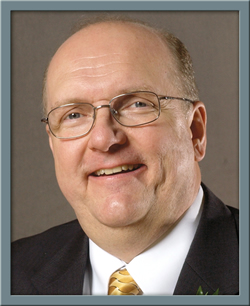
As a professor in Cornell University’s
Department of Plant Pathology, Gary
Bergstrom enjoys the best of two worlds.
He can steep himself in science and
research, and then surround himself
with people through his Extension work.
“I enjoy science, discovering
something new about nature,” he says.
“I also like people and need to be
involved in service, in applying
knowledge and translating discoveries
to others to solve their problems.”
Bergstrom’s expertise includes
epidemiology and integrated
management of cereal and forage crop
diseases, seed pathology and seed
treatment, host plant disease resistance,
and biological control. He earned his
bachelor’s in microbiology in 1975 and
master’s in plant pathology in 1978, both
from Purdue University. His Ph.D. in
plant pathology is from the University of
Kentucky in 1981.
Although he was raised in the city
(Chicago), Bergstrom’s greatest
satisfaction comes from solving problems
for farmers. “It’s not so much the
positions I’ve held or the publications
I’ve written, it’s identifying a crop variety
that’s resistant to a disease problem and
developing solutions for those problems
faced by farmers that has given me great
pleasure.”
So, too, has his work with dozens of
graduate students, including 15 Ph.D.
students.
Bergstrom is active in numerous
professional societies and has served in
leadership positions in the American
Institute for Biological Sciences, American
Phytopathological Society, and others.
His service to people extends to the
community, too. As a Purdue student, he
volunteered at the county retirement
home. He volunteered at a Lexington
children’s hospital while working on his
Ph.D. In Ithaca, he’s a soup kitchen
volunteer.
He also enjoys hiking, nature
photography, and family times.
“My career in science and public service was
launched in the classrooms, laboratories, and
community life at Purdue University.
I am forever grateful. I don’t think too many
places would have been as good an incubator.”
Martin Berry (Lakeville, MA | Distinguished Ag Alumni: 2016)
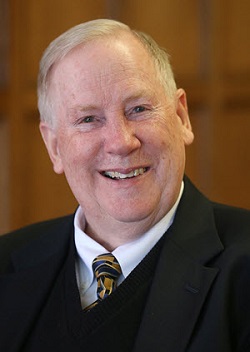
Martin Berry is the senior principal research engineer for Ocean Spray Cranberries Inc., based in Lakeville, Massachusetts.
Berry has spent 39 years working in the food industry, developing new products and processes and starting up production lines and new plants. In his current role, he is engaged in beverage and food processing research, where he pioneered the development of white cranberry juice, which grew to a $100 million a year platform for the cooperative.
Berry is currently engaged in the start-up of Ocean Spray’s new flagship production facility, which will produce over 40 percent of the company’s volume.
Berry holds patents in cranberry processing, extrusion and equipment development. Before coming to Ocean Spray, Martin worked for General Foods, Shaklee Corp., Borden Inc. and Alpo Pet Foods. At General Foods, he developed the nutritional profile, formulation and process for Cycle Pet Foods, the first widely commercialized product line recognizing the different nutritional requirements for canines from puppy to adult.
Caula A. Beyl (Knoxville, TN | Distinguished Ag Alumni: 2008)
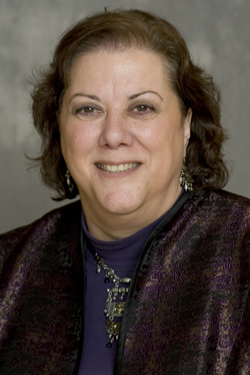
As a “military brat” whose family moved eighteen times in sixteen years, Caula Beyl particularly appreciated life’s anchors: Her mother, who re-made curtains for every new house and painted the walls green; and her father, who faithfully planted his favorite Cockscomb and marigolds in every yard. The bright blooms also inspired Beyl’s early interest in horticulture. Like those irrepressible plants, she thrives in different settings and multiple pursuits — as researcher, teacher, and administrator. “If you take everything a step at a time, with confidence, you can accomplish much more than you think,” Beyl says. Her steady strides began as a Purdue University horticulture graduate student, where she embraced the relatively new research area of mechanical stress physiology of plants. Beyl transplanted herself south, joining Alabama A&M University as a post-doctoral researcher. Throughout her 27-year tenure at the University — which spanned positions from assistant professor in horticulture to interim dean in the Office of Graduate Studies — Beyl amassed an impressive research record in plant science, including space horticulture for human life support in microgravity environments and in vitro propagation. While at Alabama A&M, Beyl was credited with developing and teaching sixteen undergraduate, graduate, professional, and community courses. Since June 2007, she’s flourished in a position that combines people and plants. As the first female Dean of the College of Agricultural Science and Natural Resources at the University of Tennessee, Beyl ranks among only a handful of women in such leadership positions within the land-grant system. Roots remain part of her story, too. She recently painted the office walls in her Tennessee home a well-remembered shade of green.
D. William “Bill” Biddle (Remington, IN | Distinguished Ag Alumni: 2000)
Deep roots, reverently honored by D. William Biddle, fuel his strength. They send him to church early every Sunday for choir practice, a tradition he began as a youngster at the invitation of his aunt Martha, the church organist. They prompt him to preserve a midfield windmill near the site of the house where his grandfather was born, and to live in the house where his father was born-reminders that he’s the fourth generation to farm in Benton County. And they keep him involved in countless agricultural and Purdue organizations, because people and their ideas are the rewards in his life. “I watched my dad,” Biddle says, “He did a lot of these things, and it seemed like the right thing to do.” His father brought him to Purdue for the Ag Fish Fry and Big Ten games years before Bill was old enough to be e student, and he keeps coming back today,35 years after he earned his agricultural economics degree. • Watching his father also inspired Biddle’s long commitment to agricultural organizations. His commitment included board posts and leadership rol.es for Agricultural Alumni Seed improvement Association; American Soybean Association; Indiana Crop Improvement Association; Indiana Institute of Agriculture, Food and Nutrition: Indiana Seed Trade Association; and Public Varieties of Indiana. “The rewards of my involvement over the years are the good people I work with, who then become good friends, and their new ideas,” Biddle says. “Each one has something to offer. Some people measure their success with dollars. I measure mine by the people in my life.” And that explains why he loves waving the Purdue flag every chance he gets, why he sings “Amazing Grace” with such appreciation for life, and why “Born in the U.S.A.” is one of his favorite songs..
Steve Bishop (Cincinnati, OH | Distinguished Ag Alumni: 2006)
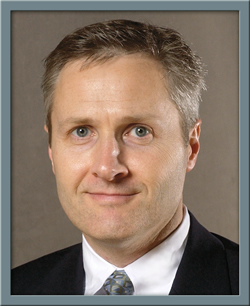
SWith his Purdue University agricultural
economics degree tucked under his arm,
Steve Bishop headed for Procter &
Gamble in Cincinnati, Ohio, in 1986. The
Orleans, Indiana, native has been
climbing the company’s corporate ladder
ever since, except for a six-month stint in
1994 when he served as vice president of
marketing for Sparrow Records at EMI
Christian Music Group in Nashville.
Bishop began his P&G career as an
assistant purchasing manager in the
Foods Division, moving on to new
positions with increasing responsibility.
These have included brand management
for Crisco and for Sunny Delight,
marketing director for the company’s
U.S. dish, home care, and laundry
products, and a year and a half in
Brussels as general manager of global
strategic planning and design for laundry
additives and light-duty detergents.
In 2001, Bishop was named general
manager of North America Fabric Care.
In 2002, he became vice president of
that division. He oversees more than
1,000 employees, and he is responsible
for a portfolio of brands including Tide,
Gain, Cheer, Era, Downy, Bounce, and
others.
“I like the basic aspect of trying to
understand what consumers want, and
then competing to deliver that in the best
value proposition,” Bishop says. “I like
the consumer aspect, how fast-paced it
is, and that it’s always changing.”
On the job, he enjoys seeing results
and achieving success. “If you’re not
inspired by competing and winning, you
can’t do a job like this,” he says. “That’s
what it’s about.”
He serves on the local Junior
Achievement board of directors; he has
helped on a congressional political
campaign; and he is active in his church
and as a parent.
“Two things at Purdue prepared me to succeed:
great academics with a balance of breadth and depth,
in concepts I could use; and a ton of experience
in leadership and collaboration.”
Mark W. Bitz (Plainville, NY | Distinguished Ag Alumni: 2000)
Armed with a bachelor’s from Purdue and a master’s from Cornell, Mark W. Bitz set out to take on the world. For him that means a life of learning and teaching, little of it in classrooms. By day, he’s president and general manager of a 500,000-bird turkey farm and related businesses, where one of the company’s 10 strategies is “learn, learn, learn.” He’s also an avid reader and writer, particularly on practices for living and marriage. “I learn about what is universal and what is particular,” Bitz says. “Some of the most critical conflicts in our time are the perspectives that come out of traditional religions versus science. I’ve tried to glean from both some practices for living well and organizing a business, a family, and a culture.” Bitz also opens doors of learning for others. On the job, he developed a 20-week employee training program. Outside of work, he chairs the New York State 4-H Foundation Board and serves in a group at Cornell that is reformulating 4-H programs, both aimed at helping adults spend more time with children. On the Purdue rowing crew he learned that play, too, has value. “What I loved at Purdue was that people have good balance. I learned lots in the classes, and there was time for extracurricular activities. I got fully as much out of those experiences as I did out of the classroom.” Today, he teaches that lesson by coaching youth soccer. Bitz also helped develop and build The Pioneer Experience, a central New York facility replicating yesteryear, and Plainville Farms welcomes thousands of school children for tours each year. “Usually, if I’m involved in something, it doesn’t stay the way it was when I found it,” he says. “I like to think I leave it better. For sure, it ends up different.”.
William T. Boehm (Cincinnati, OH | Distinguished Ag Alumni: 1999)
William T. Boehm earned master’s (1972) and doctorate (1974) degrees from Purdue in Agricultural Economics. He is Vice President of Logistics with The Kroger Company. Here are some of his thoughts on education, career, and life: How he decided to come to Purdue: “I decided on Purdue on the strength of the faculty and the history of the department. There were all these big names like Earl Butz, Don Paarlberg, and Charlie French, and if you knew anything about Ag Econ, you knew that these guys were like the winners of the Super Bowl. Being recruited to join a team that had won the Super Bowl was pretty exciting.” On his early life influences: “I was born and raised on a little dairy farm in central Wisconsin, and I learned all the lessons life that teaches you, like contributing, working hard, and having personal accountability. From the time I was a sophomore in high school, I knew I wanted to go to grad school and get a Ph.D. degree in Ag Econ and I never deviated from that. I thought there was great significance in being involved in something that fed people.” On the value of his Purdue degrees: “I have been extremely lucky in my career. I spent time as a faculty member, and I learned a lot from the academic environment. I also spent four years in Washington, D.C., and learned about how government works. For 18 years, I’ve been at Kroger where I have actually been involved in making the food system work. In each case what I’ve been able to learn as I’ve earned a living is the most important part.” His philosophy of life: “This philosophy comes from my dad, and it’s that the harder I work, the luckier I get. I really believe in working and learning and that each of us has a responsibility to develop and use the talents the good Lord gave us. It’s that simple, and the rest takes care of itself.” On the future: “Personally, my wife and I would like to retire and live on a sailboat. If possible, I’d also like to spend some time giving back in a university environment. “As for the future of agriculture, there’s still a lot that needs to be done in order to feed a growing world population. But, it’s important to remember that I came of age professionally believing there was going to be a huge world food crisis, and the fact is, the miracle of agriculture, with increased productivity and technology has changed that. It’s been great to witness and be a part of that. “My hope for the future is that we can build on that progress and go forward. The main problem I see is an imbalance of distribution more than a shortage of resources, but I am optimistic that the science of agriculture and the people who practice it are going to figure out a way to make it all work. I’m a real optimist about the future as it relates to our industry.” On his best Purdue memory: “My best Purdue memory is arguments in the coffee room. For those of us who graduated with Ag Econ Ph.D.’s in the late 1960s and early 1970s, it was a very stimulating, high quality, open academic environment. There wasn’t a better Ag Econ education in the country. Grad students were expected to challenge the faculty, so we learned how to debate and express our ideas. It wasn’t book learning so much, although you’d better be able to do those mathematical calculations, but you’d also better be able to stand up and defend what you did in an open forum that didn’t have anything to do with the classroom. Applying those skills-thinking though a problem, shaping it, analyzing it, selling it-that’s how people succeed.” Boehm/Highlights Highlights Education B.S., Agricultural Economics, University of Wisconsin-River Falls, 1970 M.S., Agricultural Economics, Purdue University, 1972 Ph.D., Agricultural Economics, Purdue University, 1974 Career 1981-present The Kroger Co. Vice President, Logistics Vice President, Grocery Procurement Vice President, Corporate Planning and Research Director of Economic Research 1979-1981 President’s Council of Economic Advisors Senior Economist for Food & Agriculture 1976-79 United States Department of Agriculture Branch Manager, Food Economics, Economic Research Service 1974-1976 Virginia Polytechnic Institute and State University Assistant Professor of Agricultural Economics Honors and Associations Chairman, National FFA Foundation Sponsors’ Board, 1999 National Board of Directors, Alpha Gamma Rho Fraternity Board of Directors, People Working Cooperatively International Food & Agribusiness Management Association Alpha Zeta Centennial Honor Roll, 1997 Cincinnati United Way Appeal Cabinet, 1991 Family Dr. Boehm and his wife, Debbie, met in Wisconsin when she was the State President of the Future Homemakers of America and he was the State President of Future Farmers of America. They were married while he was at Purdue, and lived in married student housing by the golf course. Debbie worked as secretary in the Poultry Science Department and took courses at Purdue to finish her degree in Sociology. Today Debbie is an event planner and does volunteer work in Cincinnati. They have two children. Adam, 24, is a senior at the University of Cincinnati, studying communications and public affairs. Andrew, 19, is sophomore at Dennison, studying communications. Both are better golfers than their dad. Display quote/Boehm “I decided on Purdue on the strength of the faculty and the history of the department. There were all these big names like Earl Butz, Don Paarlberg, and Charlie French, and if you knew anything about Ag Econ, you knew that these guys were like the winners of the Super Bowl. Being recruited to join a team that had won the Super Bowl was pretty exciting.”
William S. Bowers (Tucson, AZ | Distinguished Ag Alumni: 1994)
Dr. Bowers, a native of Decatur, Indiana, has served as a professor
of entomology at the University of Arizona since 1988. Prior to
joining the faculty of the University of Arizona, he was on the
faculty at Cornell University from 1972 to 1984. While at
Cornell, he also served as a Visiting Director of Research to The
International Centre of Insect Physiology and Ecology in Nairobi,
Kenya from 1977 to 1983. He was Senior Insect Physiologist in
the Insect Physiology Pioneering Research Laboratory of the
Agricultural Research Service with the United States Department
of Agriculture from 1962 to 1972.
Dr. Bowers has pioneered significant research in chemical ecology
and the biological control of insect pests. His research on the
chemistry of insect/plant interactions and the natural defensive
strategies of plants and beneficial organisms has had far-reaching
applications to the welfare of humankind through improved
methods of insect control. His accomplishments have resulted in
18 patents and more than 130 published scientific works. Several
products derived from these discoveries have been developed
commercially and are in common use.
Dr. Bowers was named "Outstanding Young Scientist" by the
Agricultural Research Service of the United States Department of
Agriculture in 1969 and in 1970. The USDA again honored him
with the Superior Service Award for Scientific Research in 1991.
In 1980, he was the recipient of the J. Everett Bussart Memorial
Award from the Entomological Society of America in recognition
of his outstanding work in economic entomology. He was named
a Fulbright Scholar in 1987 and was the 1992 recipient of the
Senior Fulbright Scholar Award for his research on the desert
locust. In 1989, Dr. Bowers was awarded The Alexander von
Humboldt Foundation Award, which recognizes scholarly research
applied to agriculture.
Rick L. Brandenburg (Raleigh, NC | Distinguished Ag Alumni: 2013)
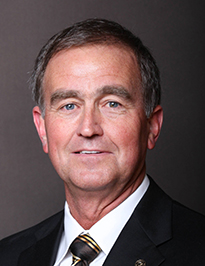
Rick L. Brandenburg, B.S. 1977, is the William Neal Reynolds Professor of Distinction in the department of entomology at North Carolina State University, Raleigh. He is co-director of the Center for Turfgrass Environmental Research and Education and is an internationally recognized authority on insect pest management in turf and peanut. Brandenburg has been invited to speak in nearly 20 foreign countries about turfgrass insects. Brandenburg recently joined an international project funded to improve the agricultural infrastructure in Liberia and is working to develop projects to address diet and nutrition problems in West Africa.
1977 B.S., Entomology, Purdue University
1981 Ph.D., Entomology, North Carolina State University
1981-1985 Assistant Professor, Research and Extension
Entomologist, University of Missouri, Columbia
1985-present North Carolina State University, Raleigh
Assistant Professor, Extension Entomologist,
1985-1988
Associate Professor, Extension Entomologist,
1988-1989
Professor, Research and Extension Entomologist,
1993-present
Co-director, Center for Turfgrass Environmental
Research and Education, 2001-present
William Neal Reynolds Professor of Distinction,
2007
1999-2000 Visiting Professor, Department of Zoology and
Entomology, University of Pretoria, Pretoria,
South Africa
2002 John V. Osmun Alumni Professional Achievement
Award, Purdue University
2003 Fellow, American Peanut Research and Education
Society
2004 Fellow, Entomological Society of America
2004 Entomological Foundation's 2004 Recognition Award
Award in Urban Entomology, Entomological Society of
America
2005 North Carolina Entomological Society Outstanding
Contributions to Entomology Award
2007 Lawn and Landscape and Bayer Environmental
Science National Leadership Award.
Richard A. Brock (Milwaukee, WI | Distinguished Ag Alumni: 1995)
Mr. Brock is President of Brock Associates, a commodity marketing consulting firm. Brock Associates currently manages grain sales on over 300,000 acres of row crop production throughout the United States and serves as a commodity marketing advisor and price forecaster to many of the nation’s largest agribusiness firms, food companies and financial institutions. Mr. Brock has successfully grown his business by providing sound advice and services for America’s farmers and agribusinesses. Since 1981, Brock Associates has published The Brock Report, a weekly newsletter designed for farmers and agribusiness firms. It is the largest newsletter of its kind in circulation. They also publish Pork Profit Edge, a weekly newsletter for pork producers, as a joint venture with the Elanco division of Eli Lilly. Mr. Brock currently serves on the editorial board and is Staff Economist for Farm Futures Magazine. He has written many articles for magazines and newspapers. He also appears twice weekly on the television program AgDay. Mr. Brock is involved in farming in Colorado, Texas and Indiana. He is the author of the book Greater Profits Through Better Marketing and serves as arbitrator for the National Futures Association. He is also one of the most widely sought-after speakers in the country on commodity prices, agricultural policy and long-term economic forecasts for the agricultural industry. He averages 75 to 100 speaking engagements each year for agribusiness and farm conventions. Mr. Brock is active in the American Society of Agricultural Consultants, the National Grain and Feed Association, the Chicago Mercantile Exchange, and the Schlitz Audubon Society. He also serves on the University Council at Cornell University.
Eric A. Brown (Austin, MN | Distinguished Ag Alumni: 2001)
Sometimes, journeys in the right direction unfold a map for life - particularly when 4-H is your compass and dad is your navigator. Such was the combination that led Eric Brown to his career in Austin, Minnesota, with Hormel Foods Corporation. Growing up on the family farm just north of Lafayette, Brown raised purebred hogs as a youngster and was a 12-year 4-H member. He and his dad traveled annually to state fairs and national shows, including Austin’s National Barrow Show, sponsored by Hormel. “After graduation, I sent letters to about 50 different food companies, including Hormel,” Brown recalls. “As we progressed with interviews, I felt I already knew the company. It all came together and was a good choice for me, based on my understanding of raising hogs.” Brown also offered his employer keen senses of history and stability. His great-great-grandfather, Peter 0. Brown, moved from Chillicothe, Ohio, to Tippecanoe County in 1829 and settled the family’s original farm. Brown recalls that as a child he found arrowheads in the fields, and that he heard stories about Peter Brown’s father-in-law, who was killed by area Indians. He remembers hearing how neighbors’ homes were moved when Highway 43 went from dirt road to blacktop, and of the horses used to grade the county’s first highways. “My family’s stories gave me strong roots,” Brown says, “and my farm experiences led to a strong work ethic. I learned what it takes to raise food.” Today, the family farm has grown to 5,500 tillable acres and is co-owned by the three Brown brothers. Known as Tip Top Farms, it includes the original 160 acres homesteaded by Peter Brown. In addition to anchoring the Brown family, these historic acres also have cultivated serendipitous paths for their caretakers: Brown joins his father, Donald, grandfather Wilbur Brown, and brother Bruce Brown in a distinguished line of Purdue graduates. Ohio, to Tippecanoe County in 1829 and settled the family's original farm. Brown recalls that as a child he found arrowheads in the fields and that he heard stories about Peter Brown's father-in-law, who was killed by area Indians. He remembers hearing how neighbors' homes were moved when Highway 43 went from dirt road to blacktop, and of the horses used to grade the county's first highways. "My family's stories gave me strong roots," Brown says, "and my farm experiences led to a strong work ethic. I learned what it takes to raise food." Today, the family farm has grown to 5,500 tillable acres and is coowned
by the three Brown brothers. Known as Tip Top Farms, it includes the original 160 acres homesteaded by Peter Brown. In addition to anchoring the Brown family, these historic acres also have cultivated serendipitous paths for their caretakers: Brown joins his father, Donald, grandfather Wilbur Brown, and brother Bruce Brown in a distinguished line of Purdue graduates.
Allen Thomas Budd (Carol Stream, IL | Distinguished Ag Alumni: 1993)
Mr. Budd is vice president and publisher of Farm Progress Companies, Inc. in Carol Stream, Illinois. He is a native of Lebanon, Indiana. Mr. Budd is responsible for the editorial staffs of 18 farm magazines coast-to-coast with an annual circulation of over one million copies. He serves as director for the Farm Progress Show, Husker Harvest Days, Oklahoma Farm Show, and the FarmerStockman Show in Lubbock, Texas.
Mr. Budd began his career as a news reporter and farm editor of the Commercial News in Danville, Illinois. He joined the staff of Prairie Farmer in Illinois in 1960 as a field editor. In 1964, he became the science editor. He served as editor of the Indiana Prairie Farmer magazine until 1982 when he assumed his present position. He led the effort to take the once newspaper-styled publications to the sophisticated magazines they are today.
As a writer and editor, Mr. Budd has become widely known and respected among readers, agricultural educators, and legislators for his news, features, and editorials voicing the opinions of Indiana agriculturalists. His extensive research on agricultural subjects has often influenced legislation affecting agriculture and rural America.
Mr. Budd is a member of the board of directors of the National 4-H Foundation, the National Agriculture Hall of Fame, and vice president of the North American Farm Show Council. He is a noted communicator and member of the Society of Professional Journalists and the American Agricultural Editors Associations. He served as co-chair of the Agricultural Communications Curriculum Review Committee for the Purdue School of Agriculture in 1991. Mr. Budd was honored in 1992 by the national Agricultural Communicators in Education organization with its highest award, the Reuben Brigham Award. It honors individuals who have made major contributions to communications in agriculture, food, fiber, and natural resources.
Dale R. Butcher (West Lafayette, IN | Distinguished Ag Alumni: 1995)
Mr. Butcher is an agricultural science and business teacher at Benton Central High School, a position he has held for the past thirty years. He has been ranked among the top agricultural and business teachers in the United States. The Benton Community School Corporation named him Teacher of the Year in 1990. He also earned the Distinguished Teacher Award from Western Illinois University. During his tenure, he has been instrumental in establishing the Benton Central FF A Alumni Consignment Machinery Auction, which has generated over $115,000 for chapter operations and agriculture scholarships. He strongly encourages students to pursue educational opportunities beyond high school. Mr. Butcher’s leadership in agricultural science and business education is widely recognized. He served as president of the Indiana Vocational Agriculture Teachers Association in 1975-76 and was president of the National Vocational Agricultural Teachers Association from 1982 to 1984. He was a charter member of the National Council for Vocational and Technical Education in Agricultural. He also served as vice president of the American Vocation Association from 1991 to 1994. Mr. Butcher has been actively involved in setting the national agenda for agricultural science and business education. He served on the National Academy of Sciences panel to evaluate U.S. agricultural education programs that prepared the National Research Council report, Understanding Agriculture-New Directions for Education. This report served as a catalyst for change in all levels of agricultural education. He has also been at the forefront of new curriculum development initiatives for Indiana’s agricultural science and business programs. Mr. Butcher has served on the boards of the National FFA and the National Council for Agricultural Education. Purdue University has been the beneficiary of his good counsel through his service as a member of the Department of Education’s Advisory Committee.
Gabriel Cadena-Gómez (Santafe De Bogota, Columbia | Distinguished Ag Alumni: 1997)
Cadena-Gomez is director of Cenicafe, the National Coffee Research Center of Colombia. Founded in 1938 by the National Coffee Growers Federation of Columbia (FEDERACAFE), Cenicafe assists coffee growers in all aspects of their trade. Because the coffee industry employs or supports more than one million citizens, its vitality is central to the prosperity of the Colombian economy. Dr. Cadena-Gomez became associated with FEDERCAFE in 1971, when he served as head of the National Campaign against the Coffee Leaf Rust. After receiving his master’s degree in plant pathology at the National University of Colombia in 1978, he became assistant of Plant Pathology Section of Cenicafe. In 1980 he advanced to head of the same section. After earning his doctorate from Purdue in 1986, he returned to Cenicafe as a principle researcher at the Laboratory of Coffee Chemical Research. In 1988, He assumed his present position. In 1985, the Del Ruiz volcano erupted, triggering an avalanche that destroyed Cenicafe. Dr. Cadena-Gomez was instrumental in the physical and philosophical rebuilding of the center. He instituted concepts such as non-hierarchical methods of administration and “laboratories without walls,” and he promoted teamwork, sharing and cooperation’s toward joint goals. Uniting staff scientist, the Extension Service, and coffee growers, he instituted a five-year strategic research plan to ensure the future success of Cenicafe. Dr. Cadena-Gomez is a member of the Board of Directors of the National Council of Biotechnology of Colombia and the Colombian Cooperation of Agronomic Research, among others. He also was honored in 1994 as the Agronomic Engineer of the Year by the Asociacion Caldense de Ingerieros Agronomos.
Daniel J. Cantliffe (Gainesville, FL | Distinguished Ag Alumni: 1999)
Daniel J. Cantliffe graduated from Purdue in 1967 with a masters in Horticulture. He earned his Ph.D. in Plant Physiology from Purdue in 1971. He is Chairman of the Horticultural Sciences Department at the University of Florida in Gainesville. Here are some of his thoughts on education, career, and life: His fondest Purdue memories: “Purdue was undefeated in football when I was there, and quarterback Bob Griese got the Boilermakers on the map. He was followed by Leroy Keyes and Mike Phipps, who all went on to the pros. Every time I see or hear those guys on television, I think of my years at Purdue.” On the value of a Purdue education: “Because of the excellence of the institution, I continually meet people I knew at school-all of us made out very well for ourselves. Purdue was simply the very best institution for what I wanted to study. My experience at Purdue built my self-confidence. When you meet with and learn from the best, you strive to reach their standards.” On his favorite honor: “Being honored by my alma mater is my proudest accomplishment. The one area I enjoy the most is working with students, and going through graduate school helped me a great deal in working with and mentoring students. Some people just talk and give out information. Others, like myself, like to see people learn and enjoy the process. I never tire of the thrill of working with students.” On his biggest professional challenge: “Growing up seven miles outside of New York City, I didn’t know much about agriculture. It took me about a semester to spell and say ‘horticulture,’ and to begin to develop a sincere appreciation for agriculture. But I’ve seen a lot of changes since the mid ‘60s, and my biggest concern is the seeming lack of public concern and awareness of the world’s food supply. We’re gambling with a lot of our best production areas, and many are covered up with cement and condominiums. “I’m trying to bring science to the forefront that will help us solve future problems. For instance, methods of protected agriculture are beginning to allow us to use marginal lands for production of high-value crops. In northern Florida, for instance, areas that traditionally were not used for winter production are now producing raspberries, peaches, blueberries, and practically any kind of vegetable. We’re in the process of converting large-acre farming interests into small greenhouse or tunnel operations. This whole area of protected agriculture will continue to explode.” On his personal credo: “Get a good education, and work hard while you’re young. Don’t expect to get something for nothing. Worry about what you need to succeed, not about what others have.” Highlights/Cantliffe Education B.S., Delaware Valley College, 1965 M.S., Horticulture, Purdue University, 1967 Ph.D., Plant Physiology, Purdue University, 1971 Career 1974-present University of Florida, Gainesville Chairman, Horticultural Sciences Department Professor, Fruit Crops Department Professor, Vegetable Crops Department Honors and Associations Member, American Society for Horticultural Science Member, American Society of Plant Physiologists Member, American Society of Agronomy Professorial Excellence Program Award, University of Florida, 1996 United States Department of Agriculture Group Honor Award for Excellence, 1997 Outstanding Researcher Award, 1997, American Society for Horticultural Science Family Dr. Cantliffe and his wife, Elizabeth, are parents of four daughters, and grandparents to four granddaughters. Their oldest child, Christine, is a nurse; Deanna, a schoolteacher, was born in Lafayette; Danielle, a recreational therapist, was named for her father; and youngest daughter Cheri is a schoolteacher in Davenport, Iowa. Display quote/Cantliffe “Growing up seven miles outside of New York City, I didn’t know much about agriculture. It took me about a semester to spell and say ‘horticulture,’ and to begin to develop a sincere appreciation for agriculture.”.
Ronald P. Cantrell (Los Banos, Laguna, Philippines | Distinguished Ag Alumni: 2000)
Gardening and golf might be among the interests Ronald P. Cantrell would pursue if the call to advocate for the world’s hungry didn’t ring quite so loudly. Instead, his passion as director general of the International Rice Research Institute in the Philippines permeates every aspect of his life and occupies virtually all of his time. The roots of that commitment extend to his years at Purdue University and the time he spent in West Africa heading a farming systems team. There he first heard hunger’s cry. And he’s since listened to it in several Asian countries. “It’s a real crisis,” Cantrell says, citing 1.2 billion people who live on less than a dollar a day, those who spend nearly all their income on food, and the 800 million people without sufficient quality or quantity of food. Those numbers fuel his advocacy. “Not having enough food or having to spend 80 percent to 90 percent of your income on food is a very solvable problem. It’s not an easy problem, but it’s solvable. And it needs the attention and support of people throughout the world,” Cantrell says. He believes the answer lies in science and agriculture working together to produce more food and to make it more available and affordable-the institute’s research mission. Looking at projected population growth, Cantrell notes, “In the next 30 years we’re probably going to have to produce 30 percent to 50 percent more rice with less land and less water.” That alone poses quite a hurdle. “This is coming at a time when people are not as aware of the poverty of the world, so we are not as able to raise funds as we were years ago.” That further motivates Cantrell. “It’s a tremendous challenge, but these people need the best science has to offer.”.
James R. Carpenter (Zionsville IN | Distinguished Ag Alumni: 1994)
Mr. Carpenter is President and Chief Executive Officer of Wild Birds Unlimited, Inc., in Indianapolis. His company is the first national franchise business established to focus on the growing national hobby of bird feeding and bird watching. His franchise business has grown to 162 stores in the United States and Canada, with sales of over $35 million in 1993. He is an entrepreneur and young businessman who has built a highly successful business from the ground up. Following graduation from Purdue University in 1979, Mr. Carpenter became the manager of a garden center on the north side of Indianapolis. His goal, however, was to own his own business. In 1981, with an $8000 personal investment, he developed a plan to reach a niche market that would focus on supplying the needs of the nearly 83 million people in the U.S. who enjoy bird watching. He started with a single store in Indianapolis. Using market strategies and his ideas for franchising and training, he built the largest franchise in the bird watching industry. Each year the number of franchises continues to grow. Wild Birds Unlimited was ranked 20th in the top 100 franchises in the United States by Success Magazine in November of 1993. Mr. Carpenter won the 1993 Entrepreneur of the Year Award in retailing in Indiana. He and his wife, Nancy, and their staff are active in the Audubon Society and have given hundreds of lectures to garden clubs, schools, and civic groups on the hobby of bird feeding. He has built relationships with the Wilderness Society, Cornell University’s Laboratory of Ornithology, and the National Wildlife Federation to promote education and understanding of wildlife and wilderness areas. He serves as a member of Indiana University’s Board of Advisors to the College of Arts and Sciences. Mr. Carpenter is also on the Board of Directors of The Alliance, a group of mid-sized companies sponsored by the Indiana University Center for Entrepreneurship.
William R. Carteaux (Medina, OH | Distinguished Ag Alumni: 2003)
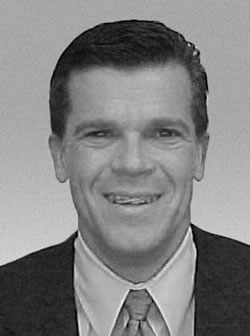
Interested in how one of your managers likely will respond to a personnel problem or how a vendor might handle a complaint? How about whether a customer will over-react if there’s a misunderstanding?
Spend a few hours together on the golf course, Bill Carteaux suggests, and you’ll have the answer. Walking and playing a few holes can reveal more about your colleague than a 40-hour workweek.
An avid golfer whose home is situated strategically on the fifth fairway, Carteaux’s favorite hobby doubles as an insightful business tool. “You get to know someone on the golf course,” he says. “Are they driven? Do they continue to push toward the end, or give up? After four hours together, most people really let down their guard.”
Carteaux’s first golf game with the former Van Dorn Demag president, for instance, revealed the fiercely competitive side of an otherwise laid-back, soft-spoken individual. Another revealing round ended with a vendor throwing his putter on the green. “He pitched it so hard it stuck,” Carteaux recalls. “He was a hothead, and it really showed.”
Carteaux travels extensively—and rarely without his clubs. And although he’s played on courses around the world—including a club in Singapore where dues totaled $200,000 annually—Carteaux ranks Toledo, Ohio’s, Inverness Club as his favorite. “It’s one of the top 10 courses in the country and has a tremendous history,” he says. “All of the greats, like Palmer, Nicklaus, and Sneed, have played there.”
He may not be a legendary golfer, but Carteaux’s hobby claims lofty roots. “Before I started at Purdue, I never touched a club,” he recalls. “A friend suggested it, and I loved the game from the very first swing.”
1984 B.S., Agricultural Mechanization, Purdue University 1984-1985 Sales and Marketing Manager/Regional Sales Manager, Pent Incorporated 1985-1988 Sales Engineer, Manager of Customer Quality Projects, Production Supervisor, Guardian Industries 1988-1990 Territory Manager, Stanley-Vidmar 1990-1991 Sales Manager, Group Dekko Autoejectors, Inc. 1991-1993 General Manager, Group Dekko Autoejectors, Inc. 1993-1994 Vice President, General Manager, Group Dekko Autoejectors 1994-1997 President, General Manager, Group Dekko Autoejectors 1997-2001 Vice President of Marketing, Van Dorn Demag 1998 Outstanding Alumnus Award, Department of Agricultural and Biological Engineering, Purdue University 1999 MBA, Indiana Wesleyan University 2002-present President and CEO, Van Dorn Demag Executive Managing Director, Demag Plastics Group
“My Purdue professors helped me realize my potential and instilled a lifelong commitment to learning. I received an excellent education . . . but I also learned to manage competing priorities and to stay focused.”
John S. Castrale (Mitchell, IN | Distinguished Ag Alumni: 2001)
Living next door to Indiana’s Spring Mill State Park and enjoying birds as a pastime as well as profession blur the lines between work and play for John Castrale, a nongame biologist for the Indiana Department of Natural Resources Division of Fish and Wildlife. And while he enjoys reading a fast-paced thriller for pleasure, that, too, can reflect a typical day. That’s because two species that fall under his care are peregrine falcons and bald eagles, which offer Castrale quite an adventure when he’s tagging the birds or checking nests as part of his restoration projects. A workday might find him flying in a helicopter surveying riverbanks or donning a hard hat and safety glasses to protect himself from the birds, which can be fierce about protecting their young. “It’s an adrenaline rush,” he admits. His banding work has taken him to the 31st story of an Indianapolis building and high on power plant smokestacks along Lake Michigan. The falcons and eagles are just two of 300 species of Indiana birds he looks out for and takes calls about. “Most questions about birds get referred to me,” he says. His passion carries through on vacation when he often discovers how small the world is. On a recent family trip to his grandparents, birthplace in Usseglio, Italy, he was touched by a special connection when he spotted his first red-backed shrike, a member of the same family as Indiana’s logger-head shrike. “I like seeing different cultures and birds, habitats when I travel,” he says. While he’s not meticulous about keeping his life list of bird sightings, which ranges from 400 to 500 species, “on trips I like to tick off birds I spot,” he says. And he often helps other birders add to their own list by hosting them on his backyard deck, where they might hear the song of a visiting chuck-will’s widow.projects. A workday might find him flying in helicopter surveying riverbanks or donning a hard hat and safety glasses to protect himself from the birds, which can be fierce about protecting their young. "It's an adrenaline rush," he admits. His banding work has taken him to the 31st story of an Indianapolis building and high on power plant smokestacks along Lake Michigan. The falcons and eagles are just two of 300 species of Indiana birds he looks out for and takes calls about. "Most questions about birds get referred to me," he says. His passion carries through on vacation when he often discovers how small the world is. On a recent family trip to his grandparents' birthplace in Usseglio, Italy, he was touched by a special connection when he spotted his first red-backed shrike, a member of the same family as Indiana's logger-head shrike. "I like seeing different cultures and birds' habitats when I travel," he says. While he's not meticulous about keeping his life list of bird sightings, which ranges from 400 to 500 species, "on trips I like to tick off birds I spot," he says. And he often helps other birders add to their own list by hosting them on his backyard deck, where they might hear the song of a visiting chuck-will's widow.
Kevin J. Cavanaugh (Distinguished Ag Alumni: 2012)
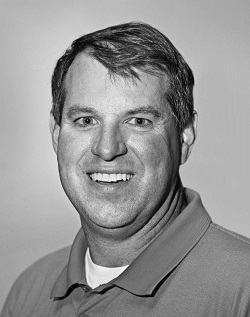
At age 14, Kevin Cavanaugh landed a summer job in a Pioneer Hi-Bred corn breeding station near his family’s small grain and livestock farm in northwest Ohio. He didn’t understand everything he was doing, but he enjoyed the work, and he would return to Pioneer Hi-Bred during school breaks throughout high school and college. “That’s where I really developed a passion for corn breeding and the seed industry,” he says. He excelled in crops judging at Iowa State University and came to Purdue for graduate study because of the strength of its program and to get closer to the Eastern Corn Belt. He joined Beck’s Superior Hybrids in 1993 as its corn breeder, attracted by the opportunity to gain a much broader view of the seed industry. Although his title has remained director of research since the following year, his job has evolved. By merging a highly effective research and testing program with excellent marketing, Cavanaugh helped Beck’s become the largest independent family-owned retail seed company in the United States. As part of its four-person leadership team, he is involved in business development, setting seed programs, pricing, inventory, facilities, and policy-making. “I’m really more of a people person than a hardcore researcher,” he says. “Really, what I’m best at is understanding the scientific principles and knowing how to apply that in the business world.” He spends a great deal of his time selecting products for the company’s retail lineup. Beck’s uses its own germplasm but also sources other companies’ genetics. Since Cavanaugh joined the organization, sales of corn, soybeans, and wheat have increased more than ten-fold. Cavanaugh and his wife Carey, an attorney, met at Purdue’s agronomy farm. His favorite activities are those that involve his family, including coaching sports and working a 12-acre hay operation with their sons, ages 12 and 7. It’s hard work, but then again, Cavanaugh admits, he’s never been very good at sitting on the couch.
Janice A. Cervelli Schach (Pendleton, SC | Distinguished Ag Alumni: 2003)
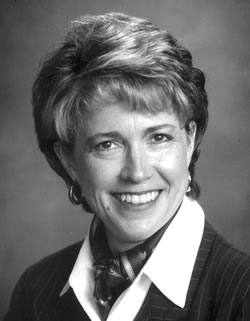
From singing in a rock band while at Purdue to taking voice lessons today—and woodcarving in between—Janice Cervelli Schach counts on creative expression for sustenance. It’s a natural extension of her profession, which includes 20 years as a landscape architect educator and her post now as dean of Clemson’s College of Architecture, Arts and Humanities.
Music has long been her passion, and it was almost her major at Indiana University—until she discovered landscape architecture and chose Purdue the summer before her freshman year. That fall, she attended a meeting of the Independent Musicians and Songwriters Club, where, she says, “I got to know some great musicians and songwriters. I still communicate with some of them.” She was a lead singer and played some guitar for the Wooden Ships and Green Mountain Flyer during her Purdue days, with gigs at the Stabilizer and other venues. She performed and recorded in Canada, too, while at graduate school.
Now, she’s interested in jazz, especially liking Diana Krall. “If the students will have me, I would absolutely love to perform here. They’ll have to put me in a soundproof room to see if I’m safe for the public.”
She’s also drawn to opera these days. “I’ve come full circle.”
Woodcarving, too, began at Purdue, with a three-dimension design principles class. That prompted her to try her hand at duck decoys and, more recently, private study with a Native American in Seattle, learning to carve totem poles and masks.
“My mother was a professional dancer when she was young, and my father was an engineer who loved the outdoors and traveling,” Schach says. “I’ve combined the engineering side of the world and the artistic side.”
1979 B.S., Landscape Architecture, Purdue University
1981 Master’s in Landscape Architecture, University of Guelph, Ontario
1981-1986 Assistant Professor of Landscape Architecture, University of Kentucky
1986-1993 Associate Professor, University of Kentucky
1992 Excellence in Undergraduate Education Award, University of Kentucky
1993 Excellence in College and University Teaching in the Food and Agricultural Sciences Award, U.S. Department of Agriculture
1993-1997 Professor, University of Kentucky
1996 Fellow, American Society of Landscape Architects
1996-1997 President, University Senate, University of Kentucky
1998-1999 Fellow, American Council on Education, Ohio State University and Ohio University
Distinguished Alumnus Award, Department of Horticulture and Landscape Architecture, Purdue University
1999-2000 Associate Dean of Undergraduate Studies; Director, Teaching and Learning Center; and Director, University Accreditation Self-Study, University of Kentucky
President, American Society of Landscape Architects
2000-present Dean, College of architecture, Arts and Humanities, Clemson University
2002 Award of Recognition for Excellence in Academic Administration, Council of Educators in Landscape Architecture
“At Purdue and living on my own, I learned to determine my own goals. It was a time of stretching myself and seeing what I’m made of, of challenging myself and seeing what I could do.”
Barbara Chattin (Arlington, VA | Distinguished Ag Alumni: 2000)
Thinking on her feet fills much of Barbara Chattin’s workdays, especially during the .six months or so of every year that she spends at the Geneva, Switzerland, Office of the U.S. Trade Representative. So when she has a little time off from trade negotiations, she takes those overworked feet on mini-vacations in the Swiss countryside. “Switzerland has an incredible train system. I ride the train out to different little towns. At each town you can get off the train, get a map showing where hiking trails are and how long they are, and you can walk,” Chattin says. “And strange as it may seem for Switzerland, you can find some trails th.at don’t require you to be scurrying up a mountain or down narrow paths and ledges.” • Living in Arlington, Va., and flying frequently to Geneva for. extended stays, Chattin needs a portable and very parNlme hobby .. Hiking fills the bill on both continents. In Virginia, she also enjoys her own home’s flower garden. Hiking is especially beneficial in Switzerland, where the scenic meadows she walks to offer an occasional respite from intense trade discussions. Negotiations constitute the bulk of her job, and being able to think on her feet is her greatest challenge, Chattin says. “The more articulate you are, the better the job you do,” she says. “You can have a position identified ahead of time. You may know the general principles you’re trying to convey. But no one can script it. And when you’re from the United States, every word you say, people are taking down.” Her years at Purdue, which went beyond agricultural economics to include some animal science, process engineering, and a broad interdisciplinary experience helped prepare her. “It was a foundation, working with people who have a different framework,” she says. “It’s very similar in the government.”
Christie S. Chavis (St. Louis, MO | Distinguished Ag Alumni: 2007)
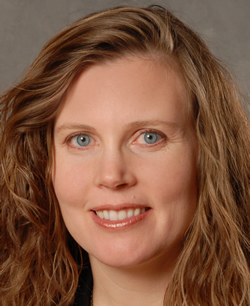
Whether she’s attempting ten perfect jumps in a national equestrian competition, or leveraging the expertise of technical, financial, business, and legal colleagues on behalf of her company’s customers, Chris Chavis aspires to excellence — and relishes the journey. As Technology Development and Services Lead for Monsanto Choice Genetics, Chavis addresses key challenges: How to produce livestock and livestock products more efficiently and effectively; and how to help our nation’s farmers improve productivity. To that end, she provides strategic direction at every critical juncture of the product pipeline. “At Monsanto, I’m always at the forefront of new technology,” says Chavis, referring to current research efforts in swine genetics. “We’re recreating the platforms on which business is done in the animal-agricultural industries, and working fast and furious to provide advancements using information we gain from genetics.” Since joining Monsanto in September 1994 as a Research Biologist in Animal Agriculture, Chavis’ track record reflects successful senior level positions in international strategic planning, crisis management, and stakeholder relations. As Executive Director of Global Biotech Strategy from 2001 to 2003, she was largely responsible for consumer acceptance of Monsanto’s biotechnology crops. Her commitment to customers, and her zest for tackling tough issues in competitive environments, earned Monsanto’s “Customer Challenge Award” in 2005. Chavis applies the same intensity to a passion second only to agriculture: Show horses. A rider since age nine, she recently segued from competing regularly in U.S. Equestrian Federation Hunter Jumper shows to breeding small pony jumpers and riding on weekends. “The minute I get in the saddle, any stress disappears,” she says. “The horse and I operate as a team and, when everything is in synch, the adrenaline rush is incredible.” “Purdue University was an amazing growth experience — academically and socially. Purdue prepared me to operate and deliver results successfully while developing relationships and networks within agriculture that are essential in doing business today.”
Gary E. Chenoweth (St. Louis, MO | Distinguished Ag Alumni: 2011)
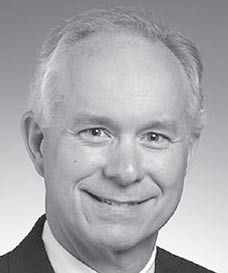
Gary Chenoweth tried two other majors at Purdue before settling on Food Science. He calls that choice the second best decision he ever made (marrying his wife Mary, who he met on campus his freshman year, was the first). From his first job with Durkee Foods — as a “technical sales guy on the road from Monday morning to Friday night” — Chenoweth rose through the ranks to become a leader and mentor in the processed oils industry. His career progressed with Central Soya, which led to his transition to Bunge Oils in 2003. This division of the world’s largest oilseed processor provides a full portfolio of edible oils to food processors and food service companies. As vice president of food processor sales from 2004 to December 31, 2010, Chenoweth directed the marketing and sales of bulk soybean and canola oils in the United States. Now his company has asked him to capitalize on his longstanding relationships in the industry and his knowledge of Bunge Oils’ diverse business units and the commodities market in a new position. As vice president-customer relationship leader, he is developing programs that focus on customers while he identifies efficiencies in serving them across business units. One aspect of the job that particularly appeals to him is an in-house education component; he is an enthusiastic mentor. Chenoweth serves on the Board of Directors for the Institute of Shortening and Edible Oils, and has represented the oil industry association in Washington, D.C. Quality, stability, and food safety are all issues of great importance to him. He serves his community by volunteering for Habitat for Humanity and Living Lands and Water river cleanup. He believes that exercise is important to quality of life, so when he’s not on the road, he enjoys squash and running. He and the best decision he ever made have two adult children.
Russell “Pete” Clark (Frankfort, IN | Distinguished Ag Alumni: 1997)
Mr. Clark co-operates Clark and Clark, a family farming business in southeastern Clinton County they consists of 1200 acres of corn and soybeans. The farm also contains a 200-sow farrow-to-finish operation which clearly has been Mr. Clark's passion during the entirety of his career. Upon graduation from Purdue, Mr. Clark embarked on a two year service with the United States Navy. Returning to Clinton County 1960, he joined forces with his father and brother to create Clark and Clark as an exemplary model of farm management, the Clark and Clark farm was highlighted in estate management tour in the early 1970s. Prairie farm magazine named Mr. Clark Master Farmer 1984. Mr. Clark has served on numerous advisory committees including the National Pork producer Pseudorabies Eradication Coordinating Committee. As a member of the Swine Advisory Committee to the Indiana Board of Animal Health, Mr. Clark is working to elevate the standards of swine health regulations Indiana. Mr. Clark helped establish the Clinton County Pork Producers organization and served as its first president 1965. He also was named president of Indiana Pork Producers Association in 1984. Never forgetting his alma mater, Mr. Clark often returns to Purdue to speak to future pork producers and industry leaders, and is a member of that Purdue Legislative Awareness Network (PLAN). As a mentor and advisor to other pork producers, Mr. Clark is ensuring the future success and quality the park industry in Indiana. Community development also is the top concern for Mr. Clark. He was instrumented in establishing zoning in Clinton County, and served for 12 years on the Clinton County area plan committee commission. He is a member of Clinton County’s economic development Board partners in progress and is in and is an advisor to NBD Community Bank of Frankfort.
Joseph Coffey (Midlothian, VA | Distinguished Ag Alumni: 1997)
Dr. Joseph Coffey is vice president of Economics and Planning at Southern State Cooperative Incorporated in Richmond, Virginia. Southern States manufacturers and distributes feed, seed, fertilizer, and petroleum products, and market gains through out of network of 500 stores in 6 states. As vice president, Dr. Coffey is responsible for strategic planning, market analysis, and economic forecasting. He has been with Southern States for 15 years. Previously Dr. Coffey served on the faculty of the University of California at Berkeley and was head of the department of agricultural economics at Virginia Polytechnic Institute and State University. Dr. Coffey also was an analyst on the Planning, Evaluating, and Programming staff of the Office of Secretary of Agriculture. Dr. Coffey certainly have a colorful passport. In 1963, he served as an agriculture advisor with North Carolina State University Agricultural Mission in Lima, Peru. While in Peru, he also was assigned the position of visiting professor of social sciences at the Agrarian University. Dr. Coffey has traveled to Canada, Switzerland, and Albania to serve as a guest lecturer or advisor offering wisdom and advice on Agricultural issues. In 1981, he took part in a scientific mission to the People's Republic of China. Since his time at Purdue he was a member of Alpha Gamma Rho fraternity, Dr. Coffey has been active promoter of agriculture. He is a member and current chair for of the Council for Agriculture Researchers, Education, and Teaching (CARET), a national proponent of Agriculture programs at land grant universities. He was honored by President Nixon with a Citation from Work on Rural development in 1972. In 1996, he received the outstanding friend of Virginia Agricultural Award. As a trusted resource on the topic of agriculture economics, Dr. Coffey has served on dozens of professional committees and has spoken to more than 500 international, state, and local groups.
Charles F. Conner (Otterbein, IN | Distinguished Ag Alumni: 1998)
From the time he graduated from Purdue until May of 1997, Mr. Conner was a trusted advisor to America’s lawmakers in Washington. Today, he is president of the Corn Refiners Association, representing the nine wet-millers of corn in the United States. Together, these nines companies refine about 1.5 billion bushels of the U.S. corn crop into high fructose corn syrup, ethanol, and other starch-based corn products.
Early in his career, Mr. Conner served as counselor to US Senator Richard Lugar on several facets of agricultural economics, establishing himself as an instrumental voice for agricultural policy improvement. In 1985, he became a professional staff member of the U.S. Senate Committee on Agriculture, Nutrition, and Forestry while maintaining his responsibilities to Senator Lugar. In January of 1987, he became Minority Staff Director of the same committee, helping to promote the 1990 Food Security Act and the Farm Credit Assistance Act of 1988 among others. By 1995, Mr. Conner was the Majority Staff Director of the committee, and lists the Federal Agriculture Improvement and Reform (FAIR) Act of 1996 among his major accomplishments.
Determined not to become caught up in the detached, distant mindset reputed of many Washington insiders, Conner always maintained a personal balance with the Midwest during his service. Never forgetting his alma mater, he continually sought advice from expert Purdue staff to promote key legislation and supported programs, in affiliation with Purdue, designed to educate future agricultural leaders. Mr. Conner refused to ignore the needs of this vital industry by pursuing legislation designed to assist those that feed and clothe the nation and the world—American agriculturists.
Despite his commitments in our nation’s capitol, Mr. Conner finds time to operate a 1500 acre corn and soybean operation in Benton County, Indiana. He also maintains a herd of 100 registered Angus cows in Whitley County, Indiana, completing the spectrum of his widespread agricultural understanding.
For contributions to his profession and community, and for bringing distinction to his alma mater, Purdue University School of Agriculture is proud to present the Distinguished Alumnus Award to Mr. Charles F. Conner.
Nancie Corum-Oxley (Paw Paw, WI | Distinguished Ag Alumni: 2019)
Nancie Corum-Oxley, Michigan’s first female winemaker, was born in Illinois and raised in Lafayette, Indiana. While studying food manufacturing operations at Purdue, she assisted Emeritus Professor of Enology Richard Vine in making wine as part of Purdue’s grape and wine research program. She also helped coordinate the Indy International Wine Competition held at Purdue, completed an internship with a California winery, and was active in Purdue’s chapters of the Institute of Food Technologists and the American Wine Society. Since becoming head winemaker at Michigan’s oldest winery in 2010, Corum-Oxley has produced wine styles that fit Michigan’s climate and fruit, collaborated with growers, managed quality assurance and food safety efforts, supervised wine cellar staff and operations, and developed marketing information, among her many other responsibilities. Improvements during her tenure range from grower relations to wine grape quality to new packaging equipment. She has applied winemaking techniques she learned at educational sessions and through international travel to St. Julian’s wine portfolio. These changes collectively have given the winery a makeover that better reflects the winemaker’s style— fun and full of personality. The company introduced several new wines that won top medals in various competitions. “Our winemaker created a sparkling version of the Traminette grape grown in Southwest Michigan,” said the late St. Julian President David Braganini. “What better way to honor Michigan’s first female professional winemaker than to name it Sweet Nancie.” Since Corum-Oxley joined the winemaking team, St. Julian wines have won more than 200 best of class/double gold awards. St. Julian’s 2017 Mountain Road Riesling was named White Wine of the Year at the 2018 Indy International Wine Competition, and the International Riesling Foundation honored its 2011 St. Julian LH Riesling as the “Best Sweet Riesling in the World.” Corum-Oxley is an active wine judge and has served as head judge of the Indy International Wine Competition and the Tasters Guild International Wine Competition.
John Corya (Greensburg, IN | Distinguished Ag Alumni: 1996)
John Corya launched his agricultural career in partnership with his father who farmed 700 acres. Today, he is president and manager of two intensive swine operations which employee 60 people and produce more than 140,000 hogs annually—enough to feed 400,000 people. In 1978, after working with his father and brother to expand the family operation, John launched Corya Pork Farms, Inc. The company, which he leads, consists of 1400 sows and 4500 acres of cropland. Mr. Corya is also the manager of Prema-Lean Pork, LLC, a 6, 000-sow operation in which he is a partner with his employees. Quick to adopt new technology, John has also looked for ways to diversify his operation. He has grown seed corn for Pioneer Hybrid Seed Co., started a grain merchandising operation with facilities in Greensburg and Milroy, Ind., and operated two grocery stores as business investments. While the grocery stores have been sold, the farming operation provides feed for the hogs and the grain businesses are used to purchase additional corn for feed, and merchandise any surplus purchase. John says he believes his employees are the company’s greatest single asset. As employees prove their capability, he increases their responsibility. Several Purdue Agriculture alumni are members of the Corya Pork Farm family. Mr. Corya has demonstrated leadership in community activities as well as in hi business. A native of Greensburg, Ind., he is president of the Decatur County Area Plan Commission and past president of the Decatur County Community Foundation, Indiana Farm Management Association, and Parish Council of St. Mary’s Church. He has also been president of the Lake Santee Water Board, the Indiana Farm Management Association, and a committee chair for the Indiana Pork Producers Association. In 1981, Corya Pork Farm hosted the Indiana Farm Management Tour, an opportunity provided only to the best managed farms.
Lynda M. Cuiffetti (Corvallis, OR | Distinguished Ag Alumni: 2014)
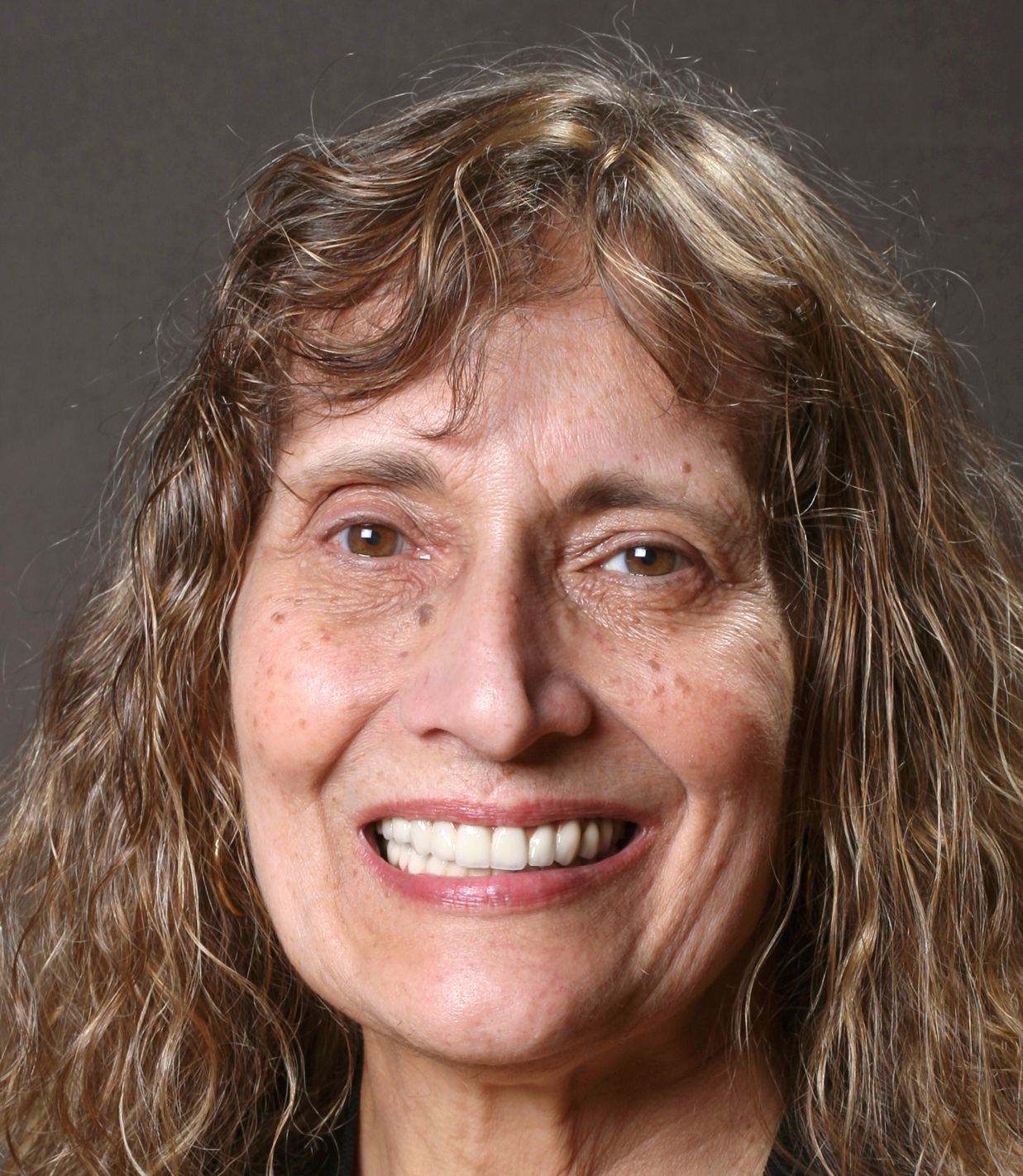
Lynda Ciuffetti, Ph.D. ‘83, has been the head of the Department of Botany and Plant Pathology at Oregon State University since 2008. The long-term goal of her research is a complete molecular description of factors that account for the ability of microorganisms to cause plant disease. Specifically, her lab is investigating the molecular mechanisms in the Pyrenophora tritici-repentis-wheat interaction. But throughout her career, Ciuffetti has also excelled as a teacher. She has received no fewer than 10 awards for teaching undergraduate cellular and molecular biology courses. In 1996 Ciuffetti received a National Science Foundation CAREER award, which supports research and novel educational activities. She was named Fellow of the American Pytopathological Society in 2011 and Fellow of the American Association for the Advancement of Science in 2012. “Her talent for teaching and her dedication to students were immediately evident at Oregon State,” said her nominator, Peter Goldsbrough, head of Purdue’s Department of Botany and Plant Pathology. What was the most difficult course you took at Purdue? What made it so difficult for you? I don’t recall any particular class being the most difficult. As a Ph.D. student, one takes their course work very seriously and you anticipate a rigorous curriculum. I do, however, recall with great admiration two courses: plant pathology taught by Dr. John Tuite, and plant virology taught by Drs. Richard Lister and Andy Jackson. The reason I mention these two classes is that both had Saturday labs and these labs lasted most of the day. It seems strange that I would look fondly on those Saturday labs, but the interactions, discussions, and camaraderie during those lab sessions was very special and critical, I believe, to our development as scientists. What is the best advice you got while you were at Purdue? Who gave you the advice? Dr. E.B. Williams provided the following quote: “illegitimi non carborundum.” When I realized what this mock-Latin aphorism referred to, I really had to smile. Over the years I have often recalled the incident when E.B. was sitting in the media room having his coffee and he made that statement just prior to me going into my Ph.D. defense. I still smile at his wisdom! What is the best advice you have ever given? A piece of advice I give to all individuals in our lab is a piece of wisdom from Dr. Barbara Mcclintock. I always encourage them to develop a feel for their organism, to spend the time necessary to observe and know the organism that they are studying. To the thousands of undergraduate students and also the graduate students I have taught over the years, the most valuable piece of advice I have given is to make sure they approach their studies in a way that they are the ones making the decisions for their futures and not a lack of success in their studies that makes the decisions for them.
Michael Culy (Indianapolis, IN | Distinguished Ag Alumni: 2006)
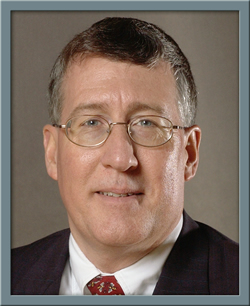
The butterfly nets Michael Culy took on family vacations and sewing pins he borrowed from his mother to mount his childhood insect collections were telltale signs of the Purdue University bachelor’s, master’s, and doctorate in entomology to come. The Hagerstown, Indiana, youngster simply loved bugs. That education opened the door of opportunity, and Culy stepped in. He started with a small Fort Wayne you-pick vegetable farm and then moved on to Pioneer, where he worked full time while earning his Ph.D. There, he set up the nation’s first integrated pest management program in corn seed production, an achievement he holds dear despite many more that followed. In 1989, he joined Dow Chemical USA and DowElanco, continuing with successor Dow AgroSciences. In his 17 years, he’s held various posts and taken leadership on numerous projects, ranging from scientific to human resources to compliance matters. Today, he serves as Dow’s global regulatory molecule leader, accountable for regulatory actions and maintenance of legal right-to-sell of existing molecules. He’s also an adjunct entomology professor at the University of Nebraska. Culy is a board-certified entomologist and a frequent author, conference presenter, and guest lecturer. He’s helped develop site-specific decision-making tools for farmers, positioned Dow as a global leader in responsible care of GMO crop research, and mentored many students and young scientists. His interests also include fishing, hunting, camping, gardening, woodworking, and volunteering with Habitat for Humanity. And when his children were young, he earned the nickname “Dr. Bug” for his lively school presentations. “Beyond the book learning and technical science, what I got at Purdue was an appreciation for people and relationships — that probably did the most — and a sense of professionalism that was instilled in the students.”
Gregory W. Curlin (Vevay, IN | Distinguished Ag Alumni: 2009)
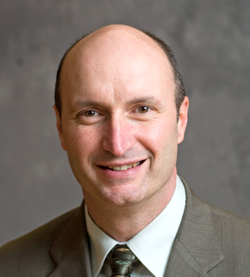
Just as seeds need a nurturing environment to sprout and thrive, so do students. And that’s what Gregory Curlin provides at Indiana’s Switzerland County High School as he sparks interest in agriculture and business. “I have come to understand the importance of teaching traditional agricultural practices while implementing the science and business of agriculture,” the 18-year educator says. “Most importantly, I have come to realize we need to educate society on our continued need for agriculture in the classroom.” He has done his job well in Vevay. After earning his bachelor’s in agricultural education in 1990, he returned to his hometown to teach four junior high sections and 11 students in a general horticulture class. Today, 132 of the high school’s 482 students are in the agricultural program, taking animal science; horticulture science; landscape management; food science; agricultural mechanics; and advanced life science plant, animal, and food science. A second instructor conducts six-week classes at the junior high and teaches agriculture mechanics and agriculture science. Curlin also mentors the FFA chapter, which has grown from 18 to 106 members under his tenure and earned top awards. The school recently built a new greenhouse and completed a fish lab facility, and this year it will pilot a new high school agriculture curriculum in partnership with National FFA. “As I continue to develop the alignment of standards, offer service learning, engage learning practices, and apply new technology, our school and community see our program as a prosperous place for students to learn,” he says. He and his wife, Becky, also an educator, are the parents of two sons. They’re also involved in hands-on agriculture, operating the family farm with Curlin’s brother and raising Red Bull cattle. “The diversity Purdue offered in agricultural education gave me a good idea of what to expect and what I could do in the classroom. Purdue prepared me for challenges. I like challenges, and I went after them.”
Stanley Curtis (University Park, PA | Distinguished Ag Alumni: 1996)
Stanley Curtis is a rare blend of visionary leader, creative researcher, gifted teacher, and dynamic speaker. He is a professor of animal sciences at Pennsylvania State University, and the leading authority of the well-being of farm animals. Dr. Curtis has been at the forefront of scientific and political issues surrounding animal well-being. His leadership and influence is increasing public understanding of agricultural extends around the globe. After earning his doctorate from Purdue in 1968 with highest distinction, Stanley joined the faculty at the University of Illinois, where he advise hundreds of students and about new courses on applied ecology that educated more than 1600 upper-level and graduate students. In 1980, he received the Alpha Zeta award for outstanding instructor in agriculture from the University. Since joining Penn State 1990, Dr. Chris has taught courses in animal management, applied ecology, I follow G, and agricultural ethics. He has authored or co-authored 27 book chapters, 91 scientific articles, 107 abstracts of papers presented at scientific meetings, over 50 monographs, and miscellaneous articles. His book, environmental management at animal agriculture, is currently being revised in reprinted. A native of Culver, Indiana, Dr. Curtis has always been ahead of his time. He recognized 30 years ago that the animal rights movement would grow in strength when others dismissed it as a passing fad. His continue to provide leadership and vision in this area. His current research efforts on animal cognition promise new understanding of age old issues and science and animal care. Send me as Pres. of them the American Association for accreditation of laboratory animal care, and past Pres. of the American Society for animal science and the Federation of American societies of food animal sciences. He’s speaking, studying and consulting has taken him to owe all 50 states in the United States and 20 foreign countries. He has presented more than 400 lectures outside of his university activities. In 1998 he received the Charles A Black Award, Council for Agricultural Technology (CAST), for exemplary contributions to enhancing the understanding of agriculture by the general public.
Thomas A. Davis (Des Moines, IA | Distinguished Ag Alumni: 2004)
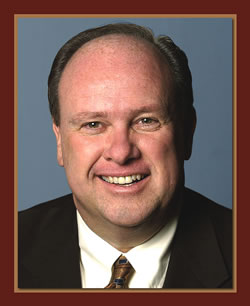
Tom Davis will forever remember the day a Floyds Knobs, Indiana, neighbor cornered his father and said, “Don, your boy has to go to college.” And not just any college, the neighbor, a cattle producer, added: Purdue University. “I was the oldest of nine children, and we were not wealthy by any means,” Davis recalls. “But my Dad had a great deal of respect for this friend and, from that moment on, the seed was planted.” Another strong voice was Davis’ Future Farmers of America (FFA) instructor, a Purdue graduate. The FFA experience also steered Davis toward his career path: agricultural communication and marketing. Decades later, Floyds Knobs voices still echo as Davis carries their messages to colleagues and collegians alike. Through involvement with the National Agri- Marketing Association (NAMA)— specifically the Association’s student programs—he enjoys opportunities to mentor and motivate future professionals. “I tell students to put their personal agendas aside and focus on the employer,” he says. Employers want to hear what you can do for them, and how you can be the solution to their challenges. “Sometimes, these same students wind up as my advertising clients,” Davis adds. “It’s fun to call on them, watch them in action, and reverse the tables.” The same words work magic with colleagues: “Put your agenda on the back burner,” he advises. “As long as you can solve a problem for someone else, you’ll be successful.” Along with words of wisdom, Davis also carries some slightly less lofty reminders of growing up in southern Indiana. “My friends and I hunted a lot of squirrels and quail with b-b-guns,” he says, “and sometimes we’d have b-b-gun ‘wars’ with each other. I still have the scrapes and nicks to prove it!”
Anthony S. Davis (Corvallis, OR | Distinguished Ag Alumni: 2017)

Under Anthony S. Davis’s guidance, the Center for Forest Nursery and Seedling Research at the University of Idaho became a world-recognized leader in forest nursery science. Now his impact in administration at Oregon State University is just getting underway. Davis has been in his new job as associate dean for research only since July 2016, but he is enthusiastic about leading the strategic development and execution of innovative and effective research programs.
Davis grew up in Saint John, New Brunswick, Canada. His mentor at the University of New Brunswick, Purdue alumnus John Kershaw, encouraged Davis to look at his alma mater for graduate study. “Purdue had just hired a dynamic new professor in the field I was interested in studying in, and Doug Jacobs [Fred M. van Eck Professor of Forest Biology] was the exact right fit for me as an advisor,” Davis says. He was awarded the department’s inaugural van Eck Fellowship.
Davis also credits the late Charles Michler, first head of the Hardwood Tree Improvement and Regeneration Center, as an influential mentor. In 2007, Davis and his wife Amy Ross-Davis, also a PhD graduate of Purdue’s Department of Forestry and Natural Resources, established an endowment in Michler’s honor.
In 2013 Davis was named to the University of Idaho’s first endowed chair. In addition to his broad contributions to nursery production techniques, he has had international influence in nursery and reforestation programs in Lebanon, Jordan, Armenia, Morocco, Haiti, and Togo.
In his new position, Davis is particularly enthusiastic about his college’s transformative, integrated approach to forestry research. The potential to positively affect natural resource stewardship made the move a logical next step for him. “Like Purdue, Oregon State University leads in research on the global stage.”
The couple has a son, 8, and daughter, 6, and in addition to the children’s activities, the family enjoys theatre, exploration, and water sports.
“The Institute for Working Forest Landscapes will transform how we do forestry research, integrating all the complex pieces that make such work dynamic. There is amazing energy and support here to do a better job with research and its application. Coming in to lead efforts to achieve change on a bigger scale was very appealing.”
2016 Associate Dean for Research, Oregon State University College of Forestry
2015 Dr. Arthur Maxwell Taylor Excellence in Diversity Award
2007-2016 Department of Forest Rangeland, and Fire Sciences, College of Natural Resources, University of Idaho Tom Alberg and Judith Beck Chair in Natural Resources, 2013-2016 Associate Professor of Native Plant Regeneration and Silviculture, 2013-2016 Head of the Department, 2013-2015 Director, Center for Forest Nursery and Seedling Research, 2007-2016
2006 PhD, Forestry and Natural Resources, Purdue University
2003 MS, Forestry and Natural Resources, Purdue University
2001-2002 Nursery grower, Pacific Regeneration Technologies
2001 BScF, University of New Brunswick
Gregory W. Deason (West Lafayette, IN | Distinguished Ag Alumni: 2010)
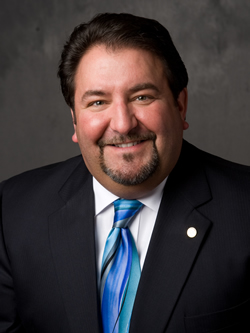
As a land-grant institution, Purdue University has always had an outreach focus. Gregory Deason’s work fits right into that historical mission. Deason repositioned Purdue Research Park in West Lafayette from a basic real estate venture to a vibrant high-tech hub that incubates and supports firms in the life sciences, homeland security, engineering, advanced manufacturing, and information technology. It is Indiana’s first and largest certified technology park, with more than 100 tech-related companies sharing common ground. He also led the development of research parks in Merrillville (2004), New Albany (2009), and Indianapolis (2009). His recruiting efforts capitalize on Purdue’s deepest core competencies. Although the West Lafayette park dates to 1961, Deason was also able to take advantage of a critical development in the mid-1990s—a new emphasis on creating and growing companies from start-up mode. He developed a program called Purdue Research Park Portals, which provides daily counsel to early-stage companies on crucial topics from writing a business plan to protecting intellectual property. The parks’ impact is substantial both in terms of new jobs and capital investment. He says: “At the core, we’re trying to create new kinds of jobs that are highly skilled and pay well; that will continue to diversify Indiana’s economy; and that address new and innovative products, services, and ways of doing business.” New companies will help Indiana retain its brightest individuals, he adds. He believes that, through research parks, universities can have tremendous human impact by developing solutions to societal challenges in energy, medicine, and the environment. As president of the 374-member Association of University Research Parks, he has represented Purdue and the entire industry in discussions of best practices around the world. Deason grew up in rural Clinton County. He is a composer, singer, and guitarist, and is active in his church’s music programs and in a band called Mustard Seeds. He also enjoys time with his family, especially watching the older two of his three sons play varsity football. “Purdue, as a whole, laid a great foundation, but in agricultural economics a number of my classes guided me to think critically. Then I was encouraged within the department to work hard on my communication skills to add a layer to what I could do. Faculty helped me hone my leadership and management skills.”
Francis “Frank” P. DeGennaro (Hockessin, DE | Distinguished Ag Alumni: 2002)
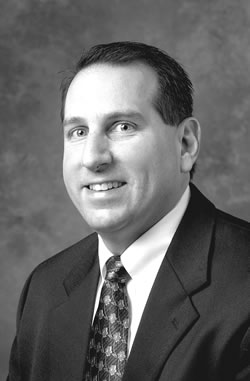
Purdue University gave Frank DeGennaro a running start—literally. An avid jogger, DeGennaro first put Nikes to pavement as an undergraduate. Matching him mile for mile was Stephen Weller, DeGennaro’s major professor in the Department of Horticulture and Landscape Architecture. “I caught the running bug at Purdue, and I’ve had it ever since,” says DeGennaro. “Five- and ten-kilometer races were just getting started then, and every fair in Indiana was adding them. Steve and I hit a different race every weekend.” DeGennaro hopes to run a marathon this year, a goal that eluded him in 2001. “I ran the Philadelphia half-marathon last September as training for an October marathon, but something happened to my foot, and I was toast by the race’s end.” This year, he’ll add more recuperation time between half and full marathons. Typically, DeGennaro logs three to four miles several times a week, with distance runs on weekends. “I’m amazed at how the body adapts to distance. I’ll get up to eight miles, feel great, and actually crave more miles the next week.” Although training is exhilarating, DeGennaro puts fitness ahead of competition. “Running a marathon is a life goal, but I won’t sacrifice running for the rest of my life to achieve it. My Dad died of a heart attack in his 50s, and there’s a prevalence of heart disease in his family. Running’s the way I take care of myself.” Less aerobic activities also contribute, such as tending an expansive garden behind his 140-year-old home, just outside Wilmington. “The whole process—starting from seed in the middle of winter and going all the way to summer and fall and seeing the fruits of your work—is in my blood.”
Malcolm S. DeKryger (Distinguished Ag Alumni: 2012)
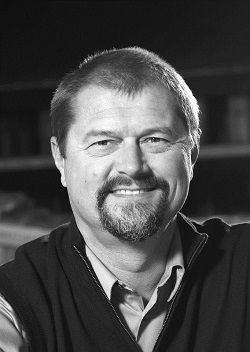
Malcolm DeKryger may be an officer in
a multimillion-dollar agribusiness, but
he’ll always be a hog farmer first.
The vice president of Belstra Milling
Company grew up in western Michigan
and made his way through Calvin College
by working for an uncle in the pig
business. “It’s simple, I just loved the
animal,” he says.
After earning his master’s degree at
Purdue and working a stint as a Purdue
Extension swine specialist, he launched a
career in sales. He was traveling a 14-state
territory when Belstra Milling, one of his
Indiana customers, asked for his
recommendations on someone to head its
business development function. Attracted
by the company’s family values and the
opportunity to settle in a small town,
DeKryger signed on for what he calls
“an unbelievable ride.”
When he joined Belstra in 1991, the hog
production business consisted of 600
sows, and the mill produced 36,000 tons
of mixed feed. Under his leadership the
pork business has grown to 11,500 sows
with an annual production in excess of
310,000 breeding and market animals.
The feed milling operation now produces
more than 120,000 tons of mixed feeds.
“My job is to make sure there’s a reason
to make feed every day,” he says. DeKryger
has directed all phases of design, finance,
and construction of the facilities that led to
the growth of the pork business. These
were among the first in Indiana to utilize
new technologies and are among the most
productive in the country. A 2,500-sow
unit in Wheatfield, Indiana, received the
2010 Pork Industry Environmental
Steward Award.
DeKryger and his wife Donna have three
children and one granddaughter, and the
family enjoys snow skiing and travel. He is
active in the pork industry and in his
community, from announcing high school
basketball games and playing his baritone
in churches to traveling with church
mission and construction trips. In addition,
Belstra Milling donates more than 500
pounds of ground pork and beef to the
Northwest Indiana Food Bank each week.
Robert J. Deschenes (Tampa, FL | Distinguished Ag Alumni: 2017)
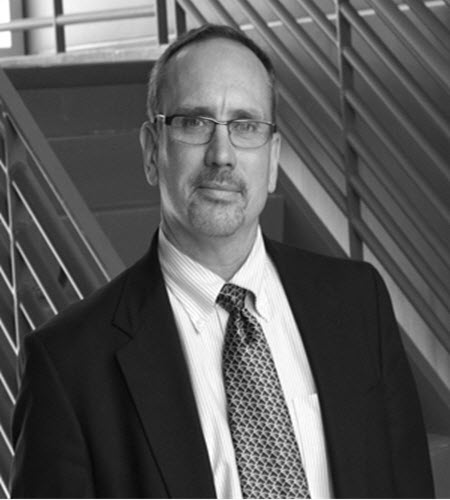
Robert Deschenes is one of the country’s leading researchers in the genetic and biochemical mechanisms of cell growth regulation, a critical field in the development of drug therapies for cancer and other diseases. He is a strong advocate of interdisciplinary research and the use of model systems in medical research. His own work takes advantage of the model eukaryote yeast to understand signaling pathways related to cancer. The work has uncovered new targets for the rational design of new cancer chemotherapeutic agents. Deschenes grew up in New Hampshire, where his enjoyment of the mountains and nature sparked his early interest in biology. He determined, however, that biochemistry offered a more mechanistic view of biology and presented the broadest career options. He earned his PhD from Purdue’s Department of Biochemistry under the guidance of Dr. Jack Dixon. “Being at Purdue was the best possible thing that could have happened to me,” Deschenes says. “The biochemistry department and my professors were outstanding, and Jack Dixon has been my most important mentor throughout my career.”
After leaving Purdue, Deschenes completed postdoctoral training in the molecular biology department at Princeton University with Dr. Jim Broach. He was awarded prestigious National Institutes of Health and Anna Fuller Cancer Research postdoctoral fellowships for his work, among other awards.
He has been at the University of South Florida since 2009. He began his academic career at the University of Iowa, where he also directed the Genetics Interdisciplinary PhD program. He then served as professor and chair of the Department of Biochemistry and ultimately director of research in the Cancer Center at the Medical College of Wisconsin.
While contributing significantly to teaching at the graduate and undergraduate levels, Deschenes has published more than 60 peer-reviewed publications and presented his research at universities, institutes, and meetings throughout the U.S. and around the world. Scientist, administrator, and self-titled “consummate soccer dad,” Deschenes enjoys supporting his college-aged daughter and high school twins, all of whom play competitively.
“What I learned at Purdue completely influences how I mentor others. Our jobs as mentors are not just to teach graduate students but also to inspire them along the way, to bring out the best in them.”
2014 Robert J. Grasso Award for Outstanding Dedication to Graduate Education
2013 Outstanding Faculty Award, University of South Florida
2009-present Professor and Chair, Department of Molecular Medicine Associate Dean of Research Morsani College of Medicine University of South Florida
2007-2009 Director of Research, Cancer Center, Medical College of Wisconsin
2004-2008 Joseph F. Heil Jr. Professor and Chair, Department of Biochemistry, Medical College of Wisconsin
1989-2004 Department of Biochemistry, University of Iowa Vice Chair, 2002-2004 Director, Genetics Interdisciplinary Program, 1999-2004 Professor, 2000-2004 Associate Professor, 1995-2000 Assistant Professor, 1989-1994
1984-1989 Postoctoral Fellow, Department of Molecular Biology, Princeton University
1984 PhD, Biochemistry, Purdue University
1980 MS, Biochemistry, Tufts University
1977 BS, Biology, St. Michael’s College
Charles J. Dietzen (Zionsville, IN | Distinguished Ag Alumni: 2002)
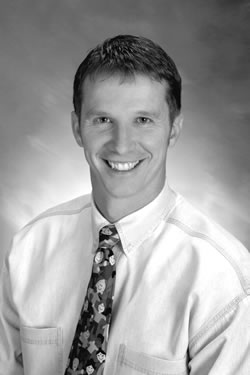
Growing up in a Kokomo, Indiana, family that cared for more than 150 foster children, Charles Dietzen learned early about compassion and living with zest. It led him to become a physician. And it’s taken him to the top of Mount Shasta, on an Arctic dog sled trip, and to professional wrestling rings as Dr. Doom. He’s since rolled those into a single passion: a life of adventure and caring. This June it will take Dr. Chuck, as his pediatric patients call him, to a houseboat on the Amazon, where he’ll provide medical care during his travels. July will find him in Ecuador. And these are after his March medical missions to Honduras and Haiti. His travels to six or seven countries a year are part of the nonprofit Timmy Foundation, which he founded in 1994 and named for a brother who died as an infant. The foundation provides for children’s needs around the world by serving as a clearinghouse for volunteers, medicine, food, educational resources, clothing, and other supplies. “We organize trips. We help volunteers find their mission,” Dietzen says. “I tell people we weren’t all born to be doctors, nurses, and therapists, but we were all born to be healers.” Stateside, he’s equally committed to youngsters, in his medical work and his service as medical director at CHAMP Camp for medically fragile children. There, he challenges the “fragile” label by engaging children in vigorous outdoor activities. “I take kids with disabilities and give them arenas to display their abilities.” His inspiration, he says, are the children themselves, whom Dietzen regards as heroes. “They are so incredibly wise. Medical school gave me knowledge. My patients make me wise.”
Jan Doorenbos (Utrecht, The Netherlands | Distinguished Ag Alumni: 1997)
Dr. Doorenbos has pursued to distinguish public-service career in the Food and Agriculture Organization (FAO) of the United Nations and with the Ministry of Agriculture of the Netherlands. Always concerned with the improvement up rural life in developing countries he served in a variety of positions. Most recently, he was lead advisor to the international fund of agriculture development at FAO headquarters in Rome, Italy. Previously, he served as an FAO representative in Turkey, Mauritius, and Nigeria. While abroad, he worked to improve argicultural practices, particularly in the areas of land and water use. From 1968 to 1978 Dr. Doorenbos was a technical officer for in the land and water development division of FAO. During that time, he traveled to more than 40 countries promoting an integrated systems approach to rural development. He also has been both assistant director and director for International Affairs of the Netherlands Ministry of Agriculture. Dr. Doorenbos is renowned for his ability to relate to farmers of all nations and stations in life. He has worked on the grass roots level to improve crop productivity and solve problems, especially those related to irrigation. He is the author of many publications on land and water use and has been co-editor of the Journal of Irrigation Sciences. His most recent handbook, A System Approach to Irrigation Development, was translated into 50 languages. Dr. Doorenbos also developed internationally known equation for predicting crop evapotranspiration in arid climates. Whatever his pursuits, Dr. Doorenbos has always placed the importance of the farmer first. While representing the Dutch Ministry of Agriculture, he collaborated with the World Bank and other organizations to implement emergency food relief programs. As a former lecturer and initiator of international conferences, he shared with his contemporaries the importance of helping improve the human condition.
David Doster (Dearborn, MI | Distinguished Ag Alumni: 1996)
For David Doster, quality truly is job one and two and three... As an employee of Ford Motor Company since 1978 he is currently chief engineer of automotive components division in Dearborn, Michigan, having held more than 10 different positions and his rising career at Ford. After a summer internship, he began with the company as a print product planning analyst for agricultural tractors at the Ford tractor operations plant in Troy, Michigan. His early years with Ford were spent as a product engineer, manufacturing process engineer, and Senior advanced manufacturing engineer. After earning his Masters of business administration degree from University of Michigan in 1983, David’s role expanded. He became chief planning analyst for new business studies in the climate control division, manager of a Korean program team focusing on climate control standards, and program planning manager for North America and Europe. In 1989, he was deemed plan manager of the Coclisa plant in Cuidad Juarez, Mexico. From there, Ford brought David back home again, to Indiana that is. The West Lafayette native was named manufacturing manager of the climate control division and Connersville, Indiana, The largest Ford operation in the United States. The plan, which is one of the most highly automated in the world, produced produces radiators and air conditioning systems for Ford cars and trucks. Mr. Doster managed 3000 employees and was responsible for a daily shipment of 130,000 parts worth about $3 million wholesale. Following his success in this capacity, Mr. Doster was promoted to his current position. David has been active in the companies “Ford 2000” restructuring effort to improve quality and customer service through five worldwide vehicle centers. His division, one of the five centers is responsible for large front-wheel-drive vehicles. It has a staff of more than 400 and annual component sales of $1.8 billion. David remains in active alumnus of Purdue University. He serves on the Dean’s industrial engineering advisory committee, and with the Purdue alumni Association Detroit club. He has participated in occupational Outlook at Purdue, a student/professional activity, and represents Ford Motor Company at career days on campus to recruit fellow Purdue alumni into the Ford organization.
F. Dominic Dottavio (Tiffin, OH | Distinguished Ag Alumni: 2007)
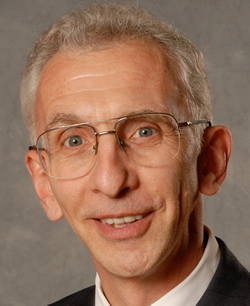
F. Dominic Dottavio has led Heidelberg College, a small liberal arts university, toward mighty milestones: Construction of Gillmor Science Hall, a 42,000- square-foot, state-of-the-art facility; and formalization of long-term strategic plans encompassing areas from fundraising to curriculum reform. One of the brightest gems he’s mined from this rich academic environment, however, is Heidelberg’s Center of Water Quality Research, internationally recognized as one of the largest tributary monitoring programs worldwide, and representative of Dottavio’s career passions of academics and environment. “Higher education has provided an important avenue to address significant issues facing natural resource organizations,” he says. “Resource management and the environment are at the core of my career, and academics has been the thread connecting it.” Prior to assuming the presidency at Heidelberg College, Dottavio was dean and director of The Ohio State University at Marion, and professor of natural resources in the College of Food, Agriculture and Environmental Sciences. His tenure saw significant enrollment growth, new programs, and completion of a $4.5 million fundraising campaign. As chief scientist and associate regional director of natural resources for the southeast region of the National Park Service from 1986 to 1993, Dottavio spearheaded scientific programs involving biological, physical, and social sciences in 58 national parks and five universities located in eight states, and two U.S. territories. Dottavio dubs himself a “collector” of national parks. His trips number in the hundreds. “At the right time of year, Yosemite is incredible,” he says. “I also love the subtle beauty of the Smoky Mountains, along with their significant historical component. “It’s great to have up-close and personal encounters with these parks, rather than windshield experiences.” “My passion for the conservation of natural resources took flight during my time at Purdue University. Lessons learned in university classrooms and Indiana’s woodlots and farm fields continue to guide and direct my life.”
Tracy A. O. Dougher (Bozeman, MT | Distinguished Ag Alumni: 2019)
Tracy Dougher’s contributions in university administration, the classroom and national educational programing have touched many lives. She leads academic programs in the College of Agriculture at Montana State University, where she is also an awardwinning teacher and expert in native plant research. As associate dean for academic programs, Dougher oversees enrollment, curriculum, assessment, teaching resources and facilities, and student success. Her initiatives have helped to ensure a positive and dynamic learning environment. Dougher, the eldest of nine children, grew up in Mt. Pulaski, Illinois. Her parents were former large-city dwellers who moved to the small rural community to support their large family by growing their own vegetables and fruits. As a graduate student at Purdue under the direction of Cary Mitchell, professor of horticulture, Dougher conducted pioneering research optimizing hydroponic culture environments in cowpea, which earned recognition from the American Society for Gravitational and Space Biology. In her 18 years at MSU, Dougher has taught and developed a number of courses, including Miracle Growing, Horticulture Science & Technology, and Tough Plants in Tough Places. She integrates her research on understanding the ranges and limitations of native plants in the built landscape with her outreach and teaching programs. She has developed a horticulture-teaching program centered on active learning integrated with student research and service opportunities. Dougher was president of the North American Colleges and Teachers of Agriculture (NACTA) in 2016-2017. She has organized workshops on teaching and learning for the American Society for Horticulture Sciences, MSU’s Center for Faculty Excellence, and NACTA. Her professional activities have earned many national honors. As a faculty member and administrator, Dougher has participated enthusiastically in all parts of the land-grant mission. She also is active in her community, where she volunteers with the Boy and Girl Scouts, is co-president of the Big Sky Wind Drinkers running club, and enjoys spending time outdoors with her husband and two children.
William Dull (Zionsville, IN | Distinguished Ag Alumni: 2007)
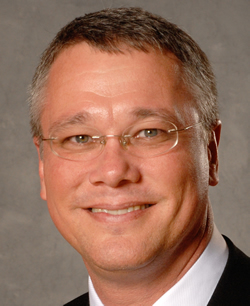
With a career that has spanned farming, service to elected officials, entrepreneurism and even starring in a television commercial, William Dull qualifies as a master of many trades. Learning early that being open to opportunities could lead to interesting opportunities, he’s taken many a turn since arriving at Purdue University in 1981. Vested in agriculture since high school as beef herd manager of Dull Family Farms Inc. in Thorntown, Ind., Dull planned on earning a degree and returning to the farm. But opportunity knocked, interrupting study for a year so he could serve as Indiana Future Farmers of America state president. Then after earning degrees in animal sciences and agronomy in 1986, something other than farming again called. International Foreign Youth Exchange chose him for a six-month ambassadorship in Portugal. That led to a fellowship in the Indiana governor’s office, a job with the lieutenant governor, then eight years in the office of former Indiana senator Dan Coats — all while maintaining ties to Dull Family Farms. In 1997, he and two friends opened yet another door, pooling their talents and resources to launch Briar Tek Inc., a technology company operating from Zionsville, Ind., and Alexandria, Va. They design, produce, and sell safety-related devices, such as the ORCA Man Overboard Alarm System, which signals the ship when a person goes overboard. The recent TV spot, which U.S. Airways asked him to tape, was another new experience and a lot of work, requiring a production staff of about 50. While the experience of being “the talent” and having his own trailer was interesting, Dull reports, “I’m not thinking of an acting career.” Dull’s pastimes are hunting, fishing, camping, traveling, and spending time with his family, which includes three youngsters all under the age of 10. “At Purdue, I tried to be as active and involved as I could. I came out of Purdue knowing and understanding the importance of thinking outside the box and challenging the status quo.”
David A. Dull (Lafayette, IN | Distinguished Ag Alumni: 1994)
Mr. Dull is President and Chief Executive Officer of Fluidrive, Inc., an Indiana-based advanced technology firm. Fluidrive created the market for powered rear-wheel systems on self-propelled grain combines and related construction and industrial equipment. His innovative engineering and skillful management have been key ingredients to the company’s success. His design excellence was recognized by the American Society of Agricultural Engineers in 1990 when he received the Young Designer Award. Fluidrive started in 1970 under the name Mud-Hog, Inc., with an idea for an entirely new product to fill a need. That idea was replacement of the steering wheels on combines with a completely re-engineered, hydraulically powered wheel-set. Mr. Dull was instrumental in the design and development of the Mud-Hog Rear Wheel Drive System that was targeted initially for rice farmers on heavy soils in the southern United States. It was instantly successful for its intended purpose and was soon in demand by farmers in the Midwest. Retrofitting combines with the hydraulic systems permitted harvesting under a much wider range of soil conditions. The new drive system became a factory installation option on International Harvester self-propelled combines in 1979. Mr. Dull, as Manager of the Engineering Department of Mud-Hog, Inc., from 1984 to 1987, directed an expansion of the company’s product line with the development of a patented front-wheel drive system for Champion motor graders. In 1991, Mud-Hog underwent a management buy-out and reorganized under the name Fluidrive. As President, Mr. Dull further broadened the total corporate product line with the addition of the Granning Division, a manufacturer of air suspension components for trucks, trailers motorhomes, ambulances, shuttle buses, and other specialty vehicles. He also added Central Power Products (CPP), a division of Fluidrive that distributes air filtration and hydraulic products. Company sales have grown by more than 20 percent since he assumed company leadership in 1991. Today, Fluidrive is a $25 million a year operation employing more than 100 people.
Robert L. Eddleman (Indianapolis, IN | Distinguished Ag Alumni: 1995)
Mr. Eddleman has served as the Indiana State Conservationist since 1980. His rural background, coupled with active participation in 4-H and FFA, has led to a lifelong interest and commitment to conserve and protect the earth’s resources. While an undergraduate at Purdue, he was president of Circle Pines Cooperative, the Agricultural Education Society and the Poultry Club. He was also active in the Agriculture Council and Collegiate 4-H. Upon graduation, Mr. Eddleman held several positions with the U.S. Soil Conservation Service in Indiana. He was one of the early promoters of conservation tillage. During this period of time, he also served as president of the Purdue Ag Alumni Chapters in both Fayette and Vigo counties and was president of the Hoosier Chapter of the Soil Conservation Society of America. Mr. Eddleman was made Assistant State Conservationist for the state of New York in 1972. His activities were recognized with the President’s Citation from the Soil Conservation Society of America in 1974. In 1975, he returned to the Midwest as Deputy State Conservationist of Illinois. He has compiled a distinguished record as Indiana’s State Conservationist. Under his direction, Indiana was the first major agricultural state to complete the Soil Survey. He is leading a major effort to reduce Indiana’s soil erosion problems. The Indiana Association of Soil and Water Conservation Districts honored him with the President’s Award in 1986 for his outstanding service. The United States government has honored him with numerous awards and certificates for superior service and performance. Mr. Eddleman has been an active youth leader throughout his adult life. He has been a volunteer 4-H leader for the past 25 years. He has also dedicated many hours to competitive youth swimming programs in both Illinois and Indiana.
Mamou K. Ehui (Washington, D.C. | Distinguished Ag Alumni: 2001)
Reading works by Maya Angelou. Listening to Natalie Cole, B.B. King, African music with lots of rhythm, and some jazz. Taking walks. These are the weekend pastimes that rejuvenate Mamou K. Ehui for the high profile, nonstop pace of the work week. She’s currently an agricultural economist at the World Bank on a one-year staff exchange program with the United Nations Economic Commission for Africa. “One of my favorite pastimes is listening to music on weekends and enjoying quiet moments. This is because of my busy schedule during the week,” she says. “I also like walking, to re-energize and think.” These are imperatives in taking care of herself, Ehui says. So is traveling to Cote d’Ivoire in West Africa each December to spend time with her extended family, which includes two sisters, four brothers, aunts, uncles, cousins and her 4-year-old daughter, Marie Danielle. ‘This is what Africa is about - family,” she says. ‘We home from quite big families, and all the children are there. My husband has a very busy schedule, too, so these are very precious moments. That is why we don’t miss the holidays at home.” The substantive training Ehui received at Purdue has served her well in the decade she’s been at the United Nations, she says. “Now I appreciate the hard time my professors gave me,” she quips. At the U.N., she served the last five years as the first woman to be named special assistant to the executive secretary of the United Nations Economic Commission for Africa, one of five U.N. commissions. ‘The groundwork at Purdue provided me with tools to successfully enter the U.N. system, to address and analyze economic problems, and to remain very competitive,” she says.to address and analyze economic problems, and to remain very competitive," she says.
Simeon K. Ehui (Addis Ababa, Ethiopia | Distinguished Ag Alumni: 2001)
Growing up in Africa’s Ivory Coast, Simeon K. Ehui knew firsthand what it was like to be poor. “I come from a very modest family. We had no electricity in our home,” he says. “I lost my father when I was 10, and my mother sold cloth in the marketplace to earn money.” Today when he visits his home country, he says, “I see the same type of child in the same situation, and it hurts my heart. So wherever I am, I try to help.” Despite his childhood hardships, he’s been lucky, Dr. Ehui says. His mother worked to send him to school. He earned a graduate scholarship from his country’s government and other awards and fellowships along the way. And in return, he’s devoting his life to helping others. Professionally, Ehui contributes as leader of the policy analysis program of the International Livestock Research Institute in Ethiopia. The organization’s mission is to improve sustainable livestock production. Personally, he helps to ease the pain of poverty in several ways. “Being involved in humanitarian activities is my biggest pastime,” Ehui says. Many of his contributions have been through his leadership in the Rotary Club of Addis Ababa - donations to Sister Jember’s Slum Area Development Project, Hanna Family Home for Orphan Children, and a training center for street girls. He also was instrumental in launching the Lighthouse Project for Ethiopia, which provides shelter for homeless mothers, food for six months, and loans to establish small-scale businesses. And he’s secured assistance from the West Lafayette, Indiana, Rotary Club to further these projects. “I believe I should help,” he says. “I am deeply involved in solving community problems.”
Kevin L. Eikenberry (Indianapolis, IN | Distinguished Ag Alumni: 2004)
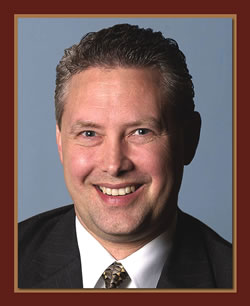
Imagine settling into a comfortable, center row seat at your local movie theater, digging into a tub of hot, buttered popcorn, watching your favorite actor in an Oscar-winning role . . . and learning a lifetime lesson in the process. That’s exactly the scene Kevin Eikenberry envisions. In fact, he’s such a fan of big-screen lessons that he’s currently writing a book on movies about enriching your life through the most important movies of all time. “Movies are stories, and we make sense of our lives and experiences through stories,” says Eikenberry, whose draft will include essays on the top 50 inspirational films as identified through a poll of 10,000-plus respondents. “In most films, there are tremendous opportunities to recognize yourself in a character or situation. If you direct your movie discussions the right way, a lot of learning results.” Eikenberry’s own lessons started with his first trip to the theater to see Jungle Book. He’s returned many times since, and counts Tom Hanks, Robin Williams, and Jimmy Stewart among his favorite actors. He’d award Oscars to Hoosiers, Groundhog Day, Radio, and Seabiscuit, but says it was no surprise that It’s A Wonderful Life ranked first among poll respondents. His literary concept has been well received by several publishers, including editors of the Chicken Soup For The Soul series. “I have a copy of the New York Times bestseller list in my office. I’ve crossed out the number one title, and penciled in my magical movies book,” he laughs. His story’s true moral, however, is the many ways in which people can learn. “I believe our creative, intellectual, and spiritual potential is so much greater than what any of us ever reaches,” Eikenberry says. “We can make miracles happen, and learning is an important part of that process.” “I was very fortunate to have Purdue University instructors who were exemplary role models. When I reflect on it now, I realize I saw them, everyday, modeling how to make learning more effective for adults.”
Michael A. Emerson (Chicago, IL | Distinguished Ag Alumni: 2013)
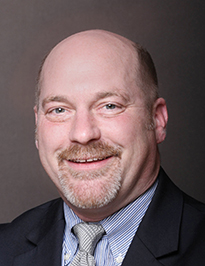
As senior vice president of VOA Associates, an international design firm, Michael Emerson, B.S. 1988, has worked on diverse projects both far and near to his company’s Chicago headquarters. Emerson’s design credits include Chicago’s Navy Pier; the city master plan for Su Qian, China; the University of Cincinnati’s Marriott Kingsgate Conference Center; the Cleveland Waterfront Master Plan; and the Jockey Club in Miami. 1988 B.S., Landscape Architecture, Purdue University 1988-89 Intern, Benjamin Thompson and Associates, Cambridge, Massachusetts 1992- M.S., Architecture; M.S., Urban and Regional Planning, University of Illinois, 1992-93 Lead Designer, Brian Clouston Partners/Aspinwall, Hong Kong 1993-94 Director of Design Services for Historic Landmarks Foundation of Indiana 1994 Associate, Benjamin Thompson and Associates, Cambridge, Massachusetts 1994-present Project Manager, Project Architect, Planner, Historic Preservationist, and Landscape Architect on Projects for Institutional, Public, and Commercial Ventures, VOA Associates, Inc., Chicago.
Byron L. Ernest (Sheridan, IN | Distinguished Ag Alumni: 2007)
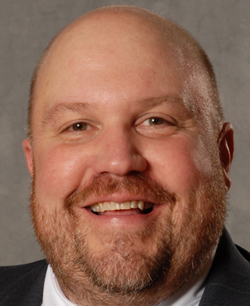
From background to profession to hobbies, it’s agriculture all the way for Byron Ernest. Raised on a hog, cattle, and grain farm in Pendleton, Indiana, his goal was to earn an animal sciences degree from Purdue. When a professor suggested Ernest had a gift for teaching, he added ag education as a second degree, earning both in four years, then went on to get his M.S. He’s been involved in education since 1985, teaching in Shelby County, Michigantown, and Lebanon, as well as working as a vocational education specialist for the Indiana Department of Education and executive director of The National Young Farmer Education Association, United States Department of Education. In 2004 he answered a recruiting call to launch an agriculture department at Lebanon Community School Corp., where he has grown it to a staff of four teachers who are instructing more than 500 students. There, he has implemented new advanced life sciences courses and developed an agriculture department endowment fund with the Lebanon Educational Foundation. “I like the challenge of staying up-todate in new developments and the thrill of developing kids,” he says. “My motto is rigor, relevance, and relationships. I gain their respect by taking an interest in them and showing them what’s relevant to what they’ll be doing.” Throughout his career, he’s also been an FFA advisor. His chapter ranked first in the state numerous times and won the national once. Since 1987 he has co-owned Hopeful Farmers, where he breeds and races thoroughbreds, raises some show sheep, and produces value-added hay sold to racehorse trainers and owners. He enjoys judging sheep, cattle, and hog shows across the country. And he’s involved in the National and Indiana FFA associations, Indiana Young Farmers’ Association, and National Young Farmer Educational Association. “At Purdue I learned relationship and relevance in my classes, preparing me for what I do as a teacher, which wasn’t even in my plan until a professor suggested I had a gift for it.”
Victoria L. Finkenstadt (Peoria, IL | Distinguished Ag Alumni: 2015)
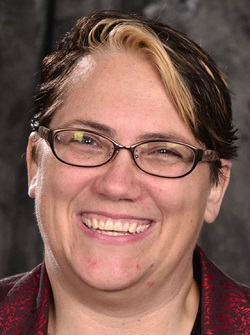
Vicki Finkenstadt, PhD ’97, is a lead scientist at the USDA’s National Center for Agricultural Utilization Research facility in Peoria, Illinois. Finkenstadt’s career in science had its beginning at McPherson College, a small liberal arts college in McPherson, Kansas, where she earned her BS in chemistry in 1989. After earning her degree, Finkenstadt worked for two drug firms before coming to Purdue to work on her PhD at the Whistler Center for Carbohydrate Research.
In the first 15 years of her career as a scientist, Finkenstadt and her coauthors published more than 70 research papers with 43 in peer-reviewed scientific journals. She is an internationally recognized expert in structure-function relationships of multi-component bio-based polymer systems. She has received USDA Certificates of Merit for “sustained superior performance in research.” Finkenstadt has also excelled as an advisor. She has mentored one postdoctoral research associate, 13 undergraduate students, five high school students, and four grade-school teachers by providing summer research opportunities in her lab, a program she started in 2000.
Which Purdue faculty member had the most profound impact on your professional career?
It’s difficult to choose just one. Studying natural polymers, especially polysaccharides, in the Whistler Center for Carbohydrate Research was the best thing I could have done for my career. Prof. R.P. Millane took a risk by accepting a synthetic polymer chemist (me) who wanted to study natural polymers and hadn’t been in school for a few years. I earned my BS in 1989 from McPherson College in Kansas, but didn’t return to school (at Purdue) until 1991 to work on my PhD.
What part of your visit back to campus in April are you most looking forward to?
I was last on campus in 2012 for the International Hydrocolloids conference hosted by the Whistler Center. When I come back this time, though, my father — Dr. William R. Finkenstadt, who also has a doctorate from Purdue (1968) — will be accompanying me. No doubt, there will be a lot of déjà vu for both of us in the wonderment in all that is new in the campus that has come over the past 30 years. But I’m sure we are both excited to see some of the timeless things that were part of the campus back then and will continue to be a part of the campus well into the future.
Were you a good student when you were at Purdue?
I would have to say no. I received two C’s during my first semester back in school. Remember, I was a nontraditional student and worked a couple of years before coming back for graduate school. I think it took me a while to readjust to all that was required of me. Prof. Millane called me at my parent’s home over the December holiday and persuaded me to return for the second semester. I think I ended up with a solid B average, though, so it all worked out in the end. But in the beginning, it wasn’t easy for me.
What is the best advice you got while you were at Purdue?
Who gave you the advice?
Dr. Thom Hendrixson, a postdoctoral research associate during my fourth year, said to me: “At some point, you have to decide that you’ve learned enough to write up and graduate.” That week, I had a, shall we say, heated discussion with my professor that culminated in me tapping the chalkboard very emphatically to illustrate a point. Later on that month, my major professor mentioned that I should start writing up my dissertation. I’m not so sure those events were just a coincidence.
Burnell C. “Burney” Fischer (Lafayette, IN | Distinguished Ag Alumni: 2003)
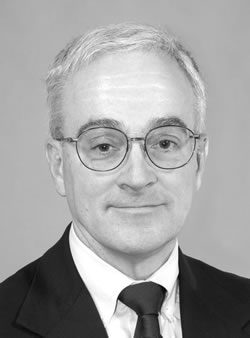
After a workweek that covers the state and involves a $10 million annual budget, 13 state forests, and as many as a few hundred employees seasonally, Burney Fischer heads to his private retreat. It’s a one-acre site with a one-bedroom cottage on the Tippecanoe River in Carroll County that he bought in 1981.
“The lot is totally treed, with wonderful, huge trees. It’s a great place,” he says. “And I can walk right into the river.”
There, he dons shorts, T-shirt, baseball cap, and a plain tan fishing vest; wades in thigh-high; and casts his pole for small-mouth bass. His goal isn’t filling a bucket—he returns the fish to the water. Instead, the lure for Indiana’s State Forester is the quiet, the time alone each morning and evening when there are no people or canoes on the water. “This is the best part of the river,” he says of his spot below Lake Freeman.
Once a year, he heads for Lake of the Woods in Nestor Falls, Ontario, a place his father took him to every year from the time Burney was 11. There, his repertoire expands to northern pike, walleyes, and muskies. And he’ll keep some for his supper. “I’ve been going there for more than 40 years. It’s a great week,” he says.
“I don’t think of fishing as a competitive sport,” Fischer says. “From June to September, this is the most pleasant way to spend a summer day.”
He doesn’t commune with the fish, but he admits he sometimes talk to the trees. “Trees are the only natural part of the landscape you see when you’re driving the road,” says Fischer, whose favorite is the giant Burr Oak in the White Oak family. “I like trees. They’re the best part of the landscape.”
1969 B.S., Forestry, Purdue University
1971 M.S., Forestry, Purdue University
1974 Ph.D., Forestry, Purdue University
1974-1977 Faculty member, University of Massachusetts - Amherst
1977 Assistant professor and Extension forester, Department of Forestry and Natural Resources, Purdue University
1985 Technology Transfer and Extension Award, Society of American Foresters
1988 Full professor, Purdue University
1990-present State Forester/Director of Division of Forestry, Indiana Department of Natural Resources
1993 Historic Preservation and Archaeology Award to Division of Forestry
1997 Certified Forester, Society of American Foresters
1999 Fellow, Society of American Foresters
“It was the teachers at Purdue who helped make me what I am. They made a difference. The forestry faculty’s good teaching and mentoring established a style that is a part of my everyday work and personal life.”
Jerry L. Flint (Johnston, IA | Distinguished Ag Alumni: 2018)
Three academic degrees, followed by a 27-year career. Not an unusual occurrence. But few people make an impact that warrants this description: “His experiences make him an incredible asset to the agricultural community. Rural farmers may not realize that Jerry Flint helped to facilitate changes that increase their chances of successful yields. Dr. Flint’s effect on people’s lives and livelihoods through his regulatory and policy efforts are felt by many the world over.” His skill set includes something the agricultural industry must have: An ability to address policy and regulatory issues. He has focused on bringing new seed technologies from the research and development pipeline to farmer customers. For two decades he developed and implemented research strategies and coordinated technical support for the Monsanto Company’s seed, trait and crop protection portfolio in U.S. markets. Under his purview, Roundup Ready corn, YieldGard Corn Borer, YieldGard Rootworm, Roundup Ready alfalfa, and Roundup brand herbicide, to name a few, made it to market. These products revolutionized the farming industry. Dr. Flint joined DuPont Pioneer in 2010; his efforts were dedicated to developing global regulatory strategy and policy, leading to more efficient product approvals. As part of the newly formed Corteva Agriscience, Agriculture Division of DowDuPont, he now has a global outlook across several agricul- ture platforms. He is responsible for develop- ing and implementing strategies for maintain- ing business continuity for seed, crop protection, and services. By providing access to DowDuPont’s proprietary phenotyping and ear photometry technology, he has significantly boosted Purdue’s plant breeding research and teaching. And he helped establish the Henry A. Wallace Chair in Plant Sciences, a position that the College of Agriculture expects will open many avenues to research, development and educational contributions.
McArthur Floyd (Normal, AL | Distinguished Ag Alumni: 2001)
When McArthur Floyd’s friends and family gather, they can count on one certainty: They’ll enjoy starring roles in a Floyd classic. “I’ve been the official videographer for the past 13 years,” Floyd laughs. “Whenever you see me, I’ll have my camera with me. One of these days, I plan to sit down, organize my collection, and put together a ‘world’s travels’ tape for the family.” New releases routinely join the archives. Floyd videotapes family holidays, vacations, and friends’ weddings. He’s most enthralled by natural scenes, and he has documented trips to the country’s national parks. He’s visited all but four, and he hopes to add Jackson Hole, Wyoming, to the docket soon. ‘‘I’m motivated by the joy of recording special moments, and also by the expressions of joy when I share tapes with family and friends,” Floyd says. Sharing joy takes many forms - whether he’s leading a young adult “Facts of Life” Bible class or encouraging students at Alabama A&M. The spirit, Floyd says, is rooted in the 13 months and 21 days he spent in the Vietnam jungles three decades ago. “It was a very troubling period, but one of real evaluation for me,” he recalls. “I often felt I was fighting a war for a country that didn’t seem to appreciate me as a person. “But I learned to look for the positive in everyone I meet, and to take something good from every experience. Life is more than what comes to you - it’s what you give to others.” Floyd next hopes to spend time in Africa, applying biotechnology to increase the food supplies in various countries on that continent. As he travels, he’ll share his expertise - and sharpen his keen videographer’s eye.
Johann R. Garwood (Morrow, OH | Distinguished Ag Alumni: 2014)
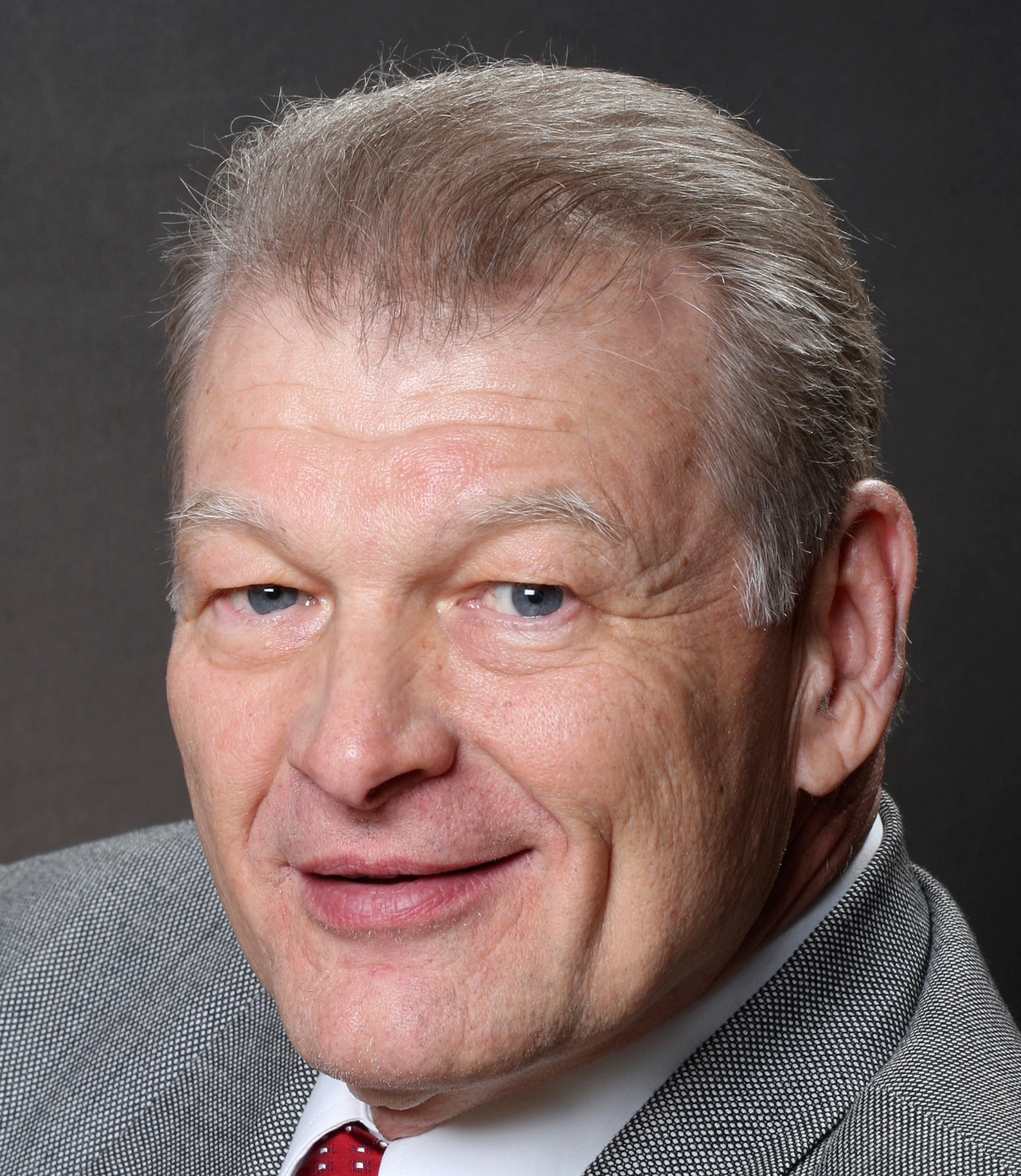
Joe Garwood, B.S. ‘78, grew up on a farm in southern Indiana, farming with his uncles while working with his father who was an independent oil producer. The independent spirit shown by his father, Francis, would guide Garwood through his professional career. “Simply put, Joe is an entrepreneur,” said his nominator, Bernie Engel, head of the Department of Agricultural and Biological Engineering. Garwood excelled during a 21-year career with DuPont’s Agricultural Products Division where he received DuPont’s highest marketing award: the Corporate Marketing Excellence Recognition ( CMER). But it was Garwood’s entrepreneurial spirit that led him to the private sector where he is involved in several businesses. Garwood is co-manager and director of corporate operations of their entities. “I’m very passionate about sharing the virtues of entrepreneurism with our students,” Garwood said. Why did you select Purdue as the place to continue your education? When I was 7 years old, my dad brought me to campus just to have a look around. He said, “One day you’ll be going to school here.” In high school, my guidance counselor encouraged me to apply to IU so I would have options. I never opened their response letter when it arrived at our house. Where was your favorite place on campus to study? Either in the student lounge in the ABE building or at the airport. I spent a lot of time in the lounge and I loved just hanging out at the airport. What do you miss most about your college days at Purdue? Most definitely, I miss all the people and the friendships I made there. Simply put: the people. When I talk to students today, I joke that I was on the fast track. It took me six years to get a four-year degree! But I wouldn’t trade a minute of it. When I wasn’t in class, farming, or selling Electrolux vacuums door to door, I was working for Don Rhine and Les Whaley in the ABE building. They were staff members who built or fixed everything in the ABE building. They were mentors when I needed it. They became family to me. Along with Dr. Krutz and Prof. Lien, they coached and encouraged me to buckle down and finish school so I’d have a multiple of choices for my future. What was the most difficult course you took at Purdue? What made it so difficult for you? IM 200 (Introduction to Accounting). At that time I couldn’t see myself having a need to know the material. I felt that kind of work should to be left to those who enjoyed it. I thought, “Why do they want me to learn this?” Ironically, today I find myself spending more time with our accountant than anyone else in the operation. What is the best advice you have ever given? To whom did you give the advice? You don’t know what you don’t know ... and it’s those things that can put you out of business. I have returned to campus many times to share life lessons with our students, particularly those interested in entrepreneurship (In November, Garwood was one of five alumni panelists participating the College of Agriculture’s Entrepreneurship Day). I talk a lot about the value of having good mentors; that you’ll need one long before you think you will. Most major problems can be prevented if you stay in counsel with your mentor. If you do run into a problem for the first time, it’s better to seek the advice of someone who knows how to handle it, rather than to try and resolve it on your own.
Yonas Gizaw (Cincinnati, OH | Distinguished Ag Alumni: 2008)
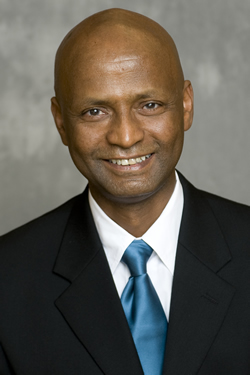
Reginald Gomes (Distinguished Ag Alumni: 1992)
Dr. Gomes currently serves as Dean of College of Agriculture at the University of Illinois, Urbana-Champaign. He has distinguished himself as a scientist, educator, and administrator. Dr. Gomes was the first recipient of the Ohio Sigma Xi Research Award recognizing the state’s outstanding young scientist. He was also named a Fullbright Distinguished Traveling Professor to Zagreb University in Yugoslavia and a Fellow of the Japan Society for the Promotion of Science.
Dr. Gomes is an accomplished teacher and researcher specializing in basic and applied research in biochemistry, endocrinology, and physiology of animal reproduction. He was co-editor of the four-volume treatise, The Testis, and a four-volume Proceeding of the Tenth International Congress on Animal Reproduction and Artificial Insemination. He has also authored or co-authored nearly 16 book chapters and more than 90 scientific journals articles and abstracts.
Dr. Gomes was the first Head of the combined Department of Animal Sciences at the University of Illinois. Dr. Gomes was named Dean of the College of Agriculture in 1989 and is responsible for all aspects of the University’s agricultural programs in the State of Illinois. He was a member of the 1988 Illinois delegation that elevated Egerton College in Kenya to full University status. He has also been instrumental in negotiation agreements between the University of Illinois and institutions in Egypt and the People’s Republic of China.
Zarrell T.G. Gray (Carmel, IN | Distinguished Ag Alumni: 2013)
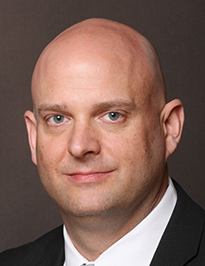
Since 2007, Zarrell Gray, B.S. 1990, has worked at Teays River Investments in Carmel, Indiana, where he is executive vice president and chief operating officer. After graduating from Purdue with a degree in Agricultural Economics, Gray returned home to Shelby County, to work alongside his grandfather, father, and uncle to learn the family business, Gray’s Seed, Inc., of Fairland, Indiana. Gray worked in a variety of roles over a 17-year period, eventually becoming owner and business manager. In 2007, Gray joined his college friend, Richard Halderman, to form Teays River Investments. 1990 B.S., Agricultural Economics, Purdue University 1990-present Principal Owner, Advisor, and Board Member, Gray’s Seed, Inc., Fairland, Indiana 1999-2004 Indiana Crop Improvement Association Board of Directors, with stints as Vice President and President 2001-2005 Indiana Seed Trade Association Board of Directors, with stints as Vice President and President 2007-present Executive Vice President and Chief Operating Officer, Teays River Investments, Carmel, Indiana 2012 University of California at Davis Agribusiness Executive Seminar
Joann K. Green (Indianapolis, IN | Distinguished Ag Alumni: 1999)
Joann K. Green graduated from Purdue in 1977 with a BS in Landscape Architecture. She is president of Claire Bennett Associates of Indianapolis. Here are some of her thoughts on education, career, and life: On her earliest influences: “Growing up with four older brothers, I was always treated like one of the ‘guys,’ and my parents encouraged me to take on many nontraditional responsibilities and challenges. “My father had a profound influence on me as a person and as a professional. He always said, ‘You can never go wrong by trying to treat others fairly.’ In my early years, when I’d get frustrated with a client, he’d remind me the client is almost always right. I’ve grown to understand exactly what he was talking about. “My father was a construction project manager, and he used to take me to his construction sites. He would look at these huge buildings and stand in awe of what had come out of the ground-what he had been a part of. For many years, my father was invited to Purdue once a year to speak to civil and structural engineering classes.” On choosing Purdue: “Two of my older brothers graduated from Purdue with degrees in mechanical and civil engineering. Both of them secured good positions, and their experiences impressed upon me the need to go to a school where I could be assured of finding desired employment right after graduation. Purdue also had an outstanding academic reputation.” On choosing landscape architecture: “In the 1970s, many students were selecting interests based on causes, and the environment was my cause. At that time, there were areas in Indianapolis that were very unattractive and insensitive to the natural environment. I remember driving down Keystone Avenue, an early poor example of suburban strip development, and thinking to myself, ‘What can I do to make sure this kind of development doesn’t continue?’ I also wanted to study something that would combine my interests in technology and art. I felt landscape architecture would be a good marriage of the two.” On her most significant professional accomplishment: “I am most rewarded by my role in the design of public spaces. I often see the trails I’ve designed, and see them being used and enjoyed by families. I take every opportunity I’m offered to appropriately and creatively plan and protect the environment. That is what’s so great about what I do-I get involved in everything from planning pocket parks to county-wide land use strategies. I enjoy all the aspects equally.” Her life philosophy: “I try to treat each day as a gift. This attitude helps me keep my life in perspective. It also helps me to focus on the appropriate treatment of others.” Booklet highlights/Green Education B.S., Purdue University, Landscape Architecture, 1977 Registered Landscape Architect in Indiana since 1982 Career 1992-present Claire Bennett Associates, Inc. Vice President, 1992-1997 President and Owner, 1997-present 1987-1992 Howard Needles Tammen & Bergendoff Director of Planning and Landscape Architecture 1985-1987 CSO Architects, Inc. Project Manager 1977-1985 The McGuire and Shook Corporation Project Landscape Architects Honors and Associations Purdue University Landscape Architecture Outstanding Alumni, first recipient, 1994 Board member, Department of Capital Asset Management-City of Indianapolis, 1998 Secretary (1993-94), Fund-raising Coordinator (1993), Indiana Make-A-Wish Foundation Advisory Committee, Indiana Vietnam and Korean War Memorial, 1992 State Chapter President (1985), State Chapter Treasurer (1980-1983), American Society of Landscape Architects Family Joann Green’s husband, Steve, is a construction project manager for Toth Ervin, Inc., in Indianapolis. They are the parents of twins, 14-year-old Conner and Hadley. Like his mother, Conner is interested in the environment, particularly wildlife conservation, and enjoys outdoor recreation and camping. Hadley loves reading and sports. They love to travel as a family and all four are regular fans of Purdue University basketball and football. Display quote/Green “I try to treat each day as a gift. This attitude helps me keep my life in perspective. It also helps me to focus on the appropriate treatment of others.”
Jill Gisele Greene (Clive, IA | Distinguished Ag Alumni: 1998)
Jill Greene's agricultural pursuits began where many children wistfully dream of victory—in the 4-H fair show ring. Her unwavering interest in livestock led her to major in animal science as an undergraduate at Purdue University. Although her career began because of an intense love of animals, Greene's paramount talent is clearly communication. As Vice President and Team Leader at Meyocks and Priebe Advertising, Greene is a powerful liaison between food production companies and consumer retailing. She has been vital in the success of many agricultural products, and a catalyst in the development of new agricultural businesses.
Greene joined Meyocks and Priebe in 1990 while the agency was in its formative stages. Utilizing the team concept of business management, Meyocks and Priebe has emerged at the forefront of advertising companies, and ranks today among the top 355 advertising companies in the United States. Among the agency's clients are such eminent companies as Bayer Animal Health, Kemin Industries, and ABS Global.
Prior to her affiliation with Meyocks and Priebe, Greene's past successes in the industry lent her prominence in her current position. She was a sales representative for such agencies as Elanco Animal Health and Dakon Implement Distributors. As account supervisor for CMF&Z Advertising in Cedar Rapids, Iowa from 1989 to 1996, Greene and her team joined forces with Dow-Elanco in a product launch effort. The affiliation led to the resurgence of the insecticide Lorsban, increasing the market share of the product by 5.7% in one year.
Greene is very active in the National Agri-Marketing Association (NAMA), chairing several important committees and serving as National Vice President in 1996. Despite all of her professional activities, she has found time to operate a crop and cattle farming operation alongside her husband, analyzing and appreciating on a personal level the importance of some of the products she represents.
For contributions to her profession and community, and for bringing distinction to her alma mater, Purdue University School of Agriculture is proud to present the Distinguished Alumna Award to Mrs. Jill G. Greene.
Douglas Griffin (Duluth, GA | Distinguished Ag Alumni: 2011)
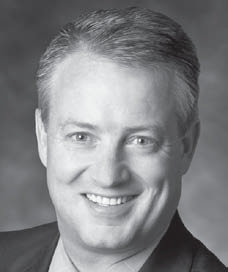
Dale Griffin (Cutler, IN | Distinguished Ag Alumni: 2015)
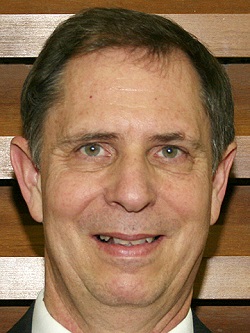
Purdue professor Natalie Carroll calls Dale Griffin, BS ’81, BS ’83, MS ’85, “the most dedicated volunteer I have encountered in my 20 years at Purdue.” And certainly many of the 3,000 or so students he has taught during a 29-year career at Rossville High School would have to agree. Griffin considers FFA members who are students of his own former students his “grand students.” He has six “great-grand student chapters” who join his Rossville chapter every summer for a whitewater rafting trip in Tennessee.
He teaches five courses at Rossville and oversees the landscaping of approximately 20 homes in the community each year. He has arranged international trips for 60 students and chaperones since 2009 and has hosted around 15 Purdue Agricultural Education student teachers in his classes. He has spoken in seven different Purdue classes during his career and has spent countless hours supporting state- and county-level 4-H and FFA events.
Which Purdue faculty member had the most profound impact on your professional career?
There have been a few, including, but not limited to the following.
Until he died in 2012, Dr. James Carson and I communicated on a regular basis. He was my academic advisor. While I never had him for class, for me, he was the most helpful man ever.
Merle Brown was the manager of Purdue’s Dairy Research facility. He took a chance and hired me, a city boy from Indianapolis, as a Purdue student. He taught me more about animal agriculture than any living soul — and he had the patience of Job with me. Believe me, he needed it. My first job as a herdsman was at a boy’s ranch in North Dakota. The place was a mess. I called Merle weekly to ask questions and he always helped me out.
Howard Martin was the assistant manager at the Purdue dairy research facility. He and his wife, Mary, fed me and clothed me, and basically adopted me, and got me through my first rural Indiana winter alive. They became lifelong friends.
Jerry Peters, my student teacher advisor, pushed for perfection. I didn’t much like him, but learned to appreciate his efforts as I aged!
Were you a good student when you were at Purdue?
Ha! Look at my grades! My first four years I barely passed ... a 4.01 on a 6-point scale, and you had to have a cumulative grade point average of 4.0 to graduate! The grades got better for the second bachelor’s and master’s when I was a residence hall counselor in Wiley for two years. I could only have one job — always before I needed two or three jobs to pay all the bills. When I worked at the Dairy Center I recorded two hours for every 20 because Merle said he would hire me for whatever I had on work study (which was around $400). I worked at the Dairy Center for experience, and then two other jobs to pay for my college. I didn’t have time to party, and I was so tired I would fall asleep any time that I stopped long enough to close my eyes.
What is the best advice you got while you were at Purdue?
Who gave you the advice?
Give as you have been given. Dr. Carson told me that in year six or seven when I was a residence hall counselor. I was having problems with a resident and was frustrated. As usual, I went to Dr. Carson and he told me this quote — a most profound quote if you think about it. I’ve lived the remainder of my life with that quote as my guide.
Edwin M. Grote (Milton, WI | Distinguished Ag Alumni: 2018)
Not only was Ed Grote highly driven as a graduate student at Purdue University, but he was also the most organized and hardest working, his major professor, World Food Prize Laureate Gebisa Ejeta, recalls. He was — and is — consistently described as polite, humble and friendly. “Ed is a nonstop mentor,” says a fellow DuPont Fellow. And he’s one of the world’s most successful plant breeders. • A named inventor on 634 patent applications to date. • A named inventor on 113 issued patents to date. • “By far the most productive corn breeder within Pioneer for commercial sales.” His corn inbred line inventions have sold about 4.25MM units of hybrid corn per year over the past seven years, with cumulative sales of 30MM units of hybrid corn. • He has been a top-five contributor to worldwide hybrid corn sales each of the last seven years. • He has been the No. 1 contributor to worldwide hybrid corn sales four of the past seven years. He began his career as Corn Research Manager with Pioneer Hi-Bred International Inc. He ran corn breeding programs in eastern Iowa, northern Iowa, and southern Wisconsin. The “exemplary scientist” has a “demonstrated ability to succeed in different breeding and production environments,” a coworker notes. During his graduate study years at Purdue, Grote multitasked, coaching undergraduates in the Agronomy Club and Crop Judging Teams, in addition to his studies and his research assistantship obligations. His mentoring skills are widely respected. He leads by example, provides a superior technical research education, and incorporates his many years of experience to allow pupils to gain practical insights.
Kun-Liang Guan (Ann Arbor, MI | Distinguished Ag Alumni: 2006)
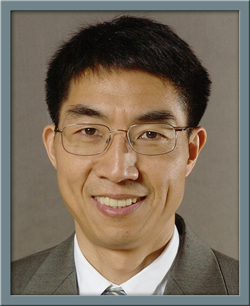 In the global fight against life-threatening diseases, the most significant strides often are the tiniest, such as scrutinizing how genetics and the environment affect the growth of a single cell. Marshal the talent and passion of educator and researcher Kun-Liang Guanand analysis equals discovery.A native of the Republic of China, Guan’s distinguished career in biochemistry began in 1983 when he came to Purdue through the Chinese andU.S. Biochemistry Examination forAdmission, a program that selected about 50 of China’s brightest students for graduate study in the United States.While at Purdue he honed his research skills, pioneering the molecular biology expertise in Henry Weiner’s research group. Guan then joined the University of Michigan faculty, achieving full professor in less than ten years, and NamedProfessor in 2003.“Sometimes scientists find it difficult to communicate,” Guan admits of his highly technical domain, “and we can translate our own language.”He insists, however, layman’s terms best describe his current focus: finding ways to interfere with out-of-control cell growth, an initiative extremely relevant to cancer research. Guan’s latest findings led to a three-year clinical trial of the FDA-approved drug rapamycin, an immunosuppressant used for organ transplant patients. His research suggests rapamycin also may be effective in treating tuberous sclerosis complex (TSC), an incurable multi-symptom genetic disorder in which tumors cause seizures, mental retardation, and kidney failure in one out of 6,000 individuals. The potential breakthrough is generating significant excitement among TSC patients. Even the most invigorating laboratory occasionally feels too small. When it does, Guan simply walks away. “Hiking in national parks gives me a different perspective. I climb a mountaintop, and I realize it’s a big world out there.”Purdue University’s traditional, thorough, and the solid curriculum was absolutely essential to my scientific career development. Learning to generate knowledge through research science, versus textbook learning, was a quantum leap for me.”
In the global fight against life-threatening diseases, the most significant strides often are the tiniest, such as scrutinizing how genetics and the environment affect the growth of a single cell. Marshal the talent and passion of educator and researcher Kun-Liang Guanand analysis equals discovery.A native of the Republic of China, Guan’s distinguished career in biochemistry began in 1983 when he came to Purdue through the Chinese andU.S. Biochemistry Examination forAdmission, a program that selected about 50 of China’s brightest students for graduate study in the United States.While at Purdue he honed his research skills, pioneering the molecular biology expertise in Henry Weiner’s research group. Guan then joined the University of Michigan faculty, achieving full professor in less than ten years, and NamedProfessor in 2003.“Sometimes scientists find it difficult to communicate,” Guan admits of his highly technical domain, “and we can translate our own language.”He insists, however, layman’s terms best describe his current focus: finding ways to interfere with out-of-control cell growth, an initiative extremely relevant to cancer research. Guan’s latest findings led to a three-year clinical trial of the FDA-approved drug rapamycin, an immunosuppressant used for organ transplant patients. His research suggests rapamycin also may be effective in treating tuberous sclerosis complex (TSC), an incurable multi-symptom genetic disorder in which tumors cause seizures, mental retardation, and kidney failure in one out of 6,000 individuals. The potential breakthrough is generating significant excitement among TSC patients. Even the most invigorating laboratory occasionally feels too small. When it does, Guan simply walks away. “Hiking in national parks gives me a different perspective. I climb a mountaintop, and I realize it’s a big world out there.”Purdue University’s traditional, thorough, and the solid curriculum was absolutely essential to my scientific career development. Learning to generate knowledge through research science, versus textbook learning, was a quantum leap for me.”
Eric J. Gustafson (Rhinelander, WI | Distinguished Ag Alumni: 2010)
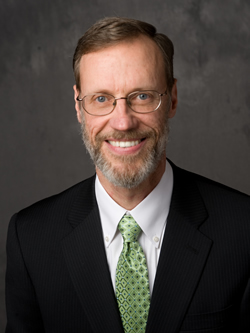 From the window of an airplane over Indiana on a clear day, you would see a patchwork of fields, towns, cities, and scattered woodlots (forests). The pattern changes across different areas; over Wisconsin, for example, you would see more and larger forests. How forests are arranged over a broad scale—their size, relative age, and proximity to each other—affects the ecological processes for the plants and animals that live in them. Eric Gustafson is a scientist who, by advancing new ideas in the growing discipline of landscape ecology, has impacted academic thinking and the management of forest resources around the world. Gustafson grew up in Massachusetts, near his family’s tree farm in southern Vermont, where camping and backpacking gave him an early appreciation for the woods. Today, Gustafson directs theInstitute for Applied Ecosystem Studies, a unit of the Northern Research Station of the U.S. Forest Service. While some of his researchers and technicians work in the field, Gustafson is usually at a computer. As a modeler, he conducts experiments at scales of space and time that are not possible in real life. Gustafson has developed spatial pattern analysis software, which takes digital maps of ecological systems over large areas, quantifies measures of their characteristics, and relates them to forest's ecological health. At Purdue, he developed a timber harvest simulation called HARVEST. That led him to other scientists working on sophisticated software called LANDIS, for which Gustafson wrote additional modules. National Forest planners, state land management agencies, and large-scale land managers use Gustafson’s models to quantify the implications of their timber management choices. Gustafson publishes extensively and speaks frequently about his work, but he still makes time for the outdoors. He enjoys downhill skiing and hiking, especially with his daughter on April, 23. “The joy of seeing and understanding nature is why I love to be out in the woods,” he says.“I was not a landscape ecologist until I came to Purdue. In writing the software for my thesis, I discovered that I really enjoyed computer programming. Programming was the foot in the door’ that got me into simulation modeling.”
From the window of an airplane over Indiana on a clear day, you would see a patchwork of fields, towns, cities, and scattered woodlots (forests). The pattern changes across different areas; over Wisconsin, for example, you would see more and larger forests. How forests are arranged over a broad scale—their size, relative age, and proximity to each other—affects the ecological processes for the plants and animals that live in them. Eric Gustafson is a scientist who, by advancing new ideas in the growing discipline of landscape ecology, has impacted academic thinking and the management of forest resources around the world. Gustafson grew up in Massachusetts, near his family’s tree farm in southern Vermont, where camping and backpacking gave him an early appreciation for the woods. Today, Gustafson directs theInstitute for Applied Ecosystem Studies, a unit of the Northern Research Station of the U.S. Forest Service. While some of his researchers and technicians work in the field, Gustafson is usually at a computer. As a modeler, he conducts experiments at scales of space and time that are not possible in real life. Gustafson has developed spatial pattern analysis software, which takes digital maps of ecological systems over large areas, quantifies measures of their characteristics, and relates them to forest's ecological health. At Purdue, he developed a timber harvest simulation called HARVEST. That led him to other scientists working on sophisticated software called LANDIS, for which Gustafson wrote additional modules. National Forest planners, state land management agencies, and large-scale land managers use Gustafson’s models to quantify the implications of their timber management choices. Gustafson publishes extensively and speaks frequently about his work, but he still makes time for the outdoors. He enjoys downhill skiing and hiking, especially with his daughter on April, 23. “The joy of seeing and understanding nature is why I love to be out in the woods,” he says.“I was not a landscape ecologist until I came to Purdue. In writing the software for my thesis, I discovered that I really enjoyed computer programming. Programming was the foot in the door’ that got me into simulation modeling.”
Roger W. Hadley, II (Woodburn, IN | Distinguished Ag Alumni: 2008)
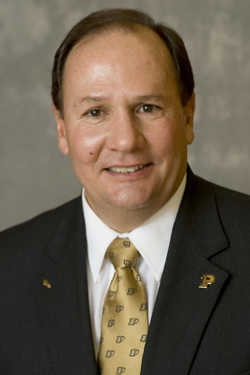
From the time Roger Hadley put in his first hours farming as a youngster, he knew that was the life he wanted. Working alongside his father, a part-timefarmer, he discovered nature’s wonders and the benefits of sticking with it.“I learned the joy of being in charge of what you’re doing and that things aren't always easy,” he says. “I like being able to put a seed in the ground, see it develop into young plants, then a crop, and getting enough revenue to pay for the expenses with some left to go again the next year.”By the time he graduated from Purdue in 1975, he had already purchased a tractor, plow, other equipment, and his first 92 acres. To supplement his startup operation, he worked until 1987 as manager and research manager at Maumee ValleySeeds in Allen County. In 1988, he made corn, soybeans, and beef production his full-time career. Today, he owns 240 acres and leases another 560, relying only on seasonal help from family. “I’m not afraid of work, and I’m not afraid of risk,” he says. “I was determined, and I’ve done it with a lot of ambition, grit, and help from up above.”Throughout, Hadley has been a servant leader in agriculture, education, and his community. He’s held board, advisory, and officer posts for state and national organizations and PurdueUniversity volunteered as an FFA judge and annually hosted farm tours for as many as 1,500 students, teachers, and parents. Since college, he’s also been an American Red Cross blood donor, giving more than 200 times over the years. For pleasure, he enjoys Boilermaker sports and fishing for bluegill, crappie, and bass.“Learn all you can, have a goal and work toward it, knowing that your path to reach it may change. When you’ve got more energy and time than money, put in a lot of effort.”
Richard R. Halderman (Wabash, IN | Distinguished Ag Alumni: 2009)
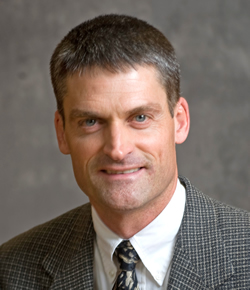
Decades before Richard R. Haldermanwas born, the family name was already well-known for farm management achievements. The legacy began when his grandfather Howard stepped up to manage foreclosed farms during theGreat Depression. It continued under his father Robert, and now under the third generation, brothers Howard and Richard.“Dad loved nothing more than figuring out how to set Howard and me up with the business and let us run,” Richard says. After earning an agricultural economics degree at Purdue in 1991, Richard spent about a year at a Florida dairy before joining the family businesses, Halderman Farm Management ServiceInc. and Halderman Real Estate ServicesInc. in Wabash, Indiana. Today, he co-owns those businesses with this father and brother. He also heads Halderman clients Teays RiverInvestments and Agricultural Real EstateInvestors, whose combined assets include some 70,000 acres of U.S. crop and livestock production operations valued at more than $200 million. He is also on the board of InternationalFarmland Holdings, which has invested more than $600 million in Argentine, Brazilian, and Uruguayan farmland topping 650,000 acres.“The challenge draws me, and so does the paradox of agriculture,” Halderman says. He’s also drawn by the people he works with. “We go a thousand miles an hour. We see change occurring. Economically, it’s been quite interesting, sure. I do what I love and the money happens to be a byproduct of that.”Halderman’s spare time is focused on religious activities and his family—his wife Kelli and their home-schooled children, Jackie and Jeremiah. Together, they enjoy renting villas on tropic islands, where they boat, waterski, or scuba dive or visiting Colorado for snow skiing vacations. They also like to read and compete in mini triathlons.“Most of my professors would cringe at this: only fifty percent of my education was in the classroom. The other fifty percent was in the inter-fraternity council, Mortarboard, Iron Key, Old Masters and being an Ag Ambassador.”
Robert R. Halderman (Wabash, IN | Distinguished Ag Alumni: 1995)
Mr. Halderman is President of Halderman Farm Management Service, Inc., the largest farm management firm east of the Mississippi River. The company currently manages over 600 farms in Indiana, Illinois, Ohio, Michigan, Missouri, Wisconsin, and Kentucky. The firm has 26 employees, including 18 area managers, most of whom are Purdue graduates. Mr. Halderman has enlarged the management services and expanded farm sales, appraisal and investment services since assuming the role of president in 1964. Since 1990, he has also served as president of Halderman Real Estate Services, Inc. He is very much a “hands on” executive. He is an Accredited Rural Appraiser and a licensed real estate broker in Michigan, Indiana, Ohio, Illinois, and Kentucky. Under his direction, Halderman Farm Management Service became one of the first farm management offices in the country to computerize farm records for all of the farms managed and operated by the firm. The Wabash Area Chamber of Commerce honored Halderman Farm Management Service as the 1994 Small Business of the Year. In 1963, Mr. Halderman and a group of investors pioneered a new bank in Wabash now known as the Frances Slocum Bank and Trust. He is currently a member and a past vice president of the board of directors. He has also been actively involved in his community as a member of the Wabash Economic Development Corporation and the Wabash Chamber of Commerce. He is committed to helping youth through his support and volunteer service with FFA, Big Brothers and Boy Scouts of America. Mr. Halderman has been a great advocate for Purdue University. He returns to campus almost every year as a guest lecturer for the Agricultural Economics course, “Advanced Farm Management.” He is a member of the Purdue President’s Council and a past member of the Dean of Agriculture’s Advisory Council. The Purdue Ag Alumni Association awarded him a Certificate of Distinction in 1993.
F. Howard Halderman (Wabash, IN | Distinguished Ag Alumni: 2012)
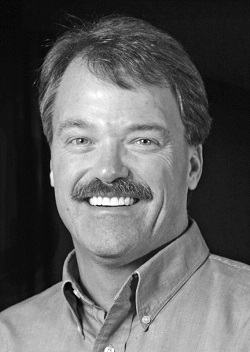
L. Curtis Hannah (Gainesville, FL | Distinguished Ag Alumni: 2004)
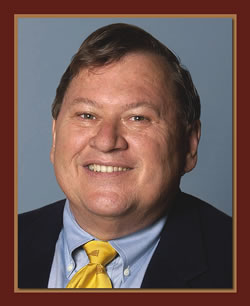
When Curt Hannah wants to feed his passion, it’s a figurative shift from one side of the desk to the other and a 900-mile trip to get there. A University of Florida maize researcher, his pleasure comes in harvesting corn on the family farm near Monrovia in Monroe County, Indiana. He visits every chance he gets and spends a couple of weeks every October. There, he says, he loves running an eight-row John Deere combine and picking corn on the farm purchased and worked by his parents and now run by Hannah's nephew.“At the end of the day you can look back and see what you accomplished in very physical ways. It’s very tangible. You’re accomplishing something, and you go to bed tired with a few sore muscles,” he says. “But more importantly, it’s a return to my roots. I’m going home.”His nephew’s family lives in Hannah’schildhood home now, “But it’s my house, too, at the same time,” he says of his feelings about being there. He’s proud of his nephew’s expansions to the corn and soybean operations and growth of hog production to about 10,000 a year, farrow to finish. Returning to the farm his father left in a family trust reminds him of his beginnings, Hannah says. It keeps him grounded. He recalls a comment his father once made after viewing a field of mutants Hannah was growing in his research. “The plants were short and wimpy, and my father said, ‘Well, that wouldn't feed very many hogs,’ but he was fairly proud of my work.”Hannah also maintains ties to home by following Purdue sports. He especially felt that link this football season, with the success of John Standeford, a boilermaker wide receiver who also hails from Monrovia.“At Purdue, I learned a sense of curiosity and respect for the discipline of biological sciences. My professors were clearly role models, teaching me how to go about doing science.I also learned to throw myself into my work.”
Anetra L. Harbor (Rockville, MD | Distinguished Ag Alumni: 2014)
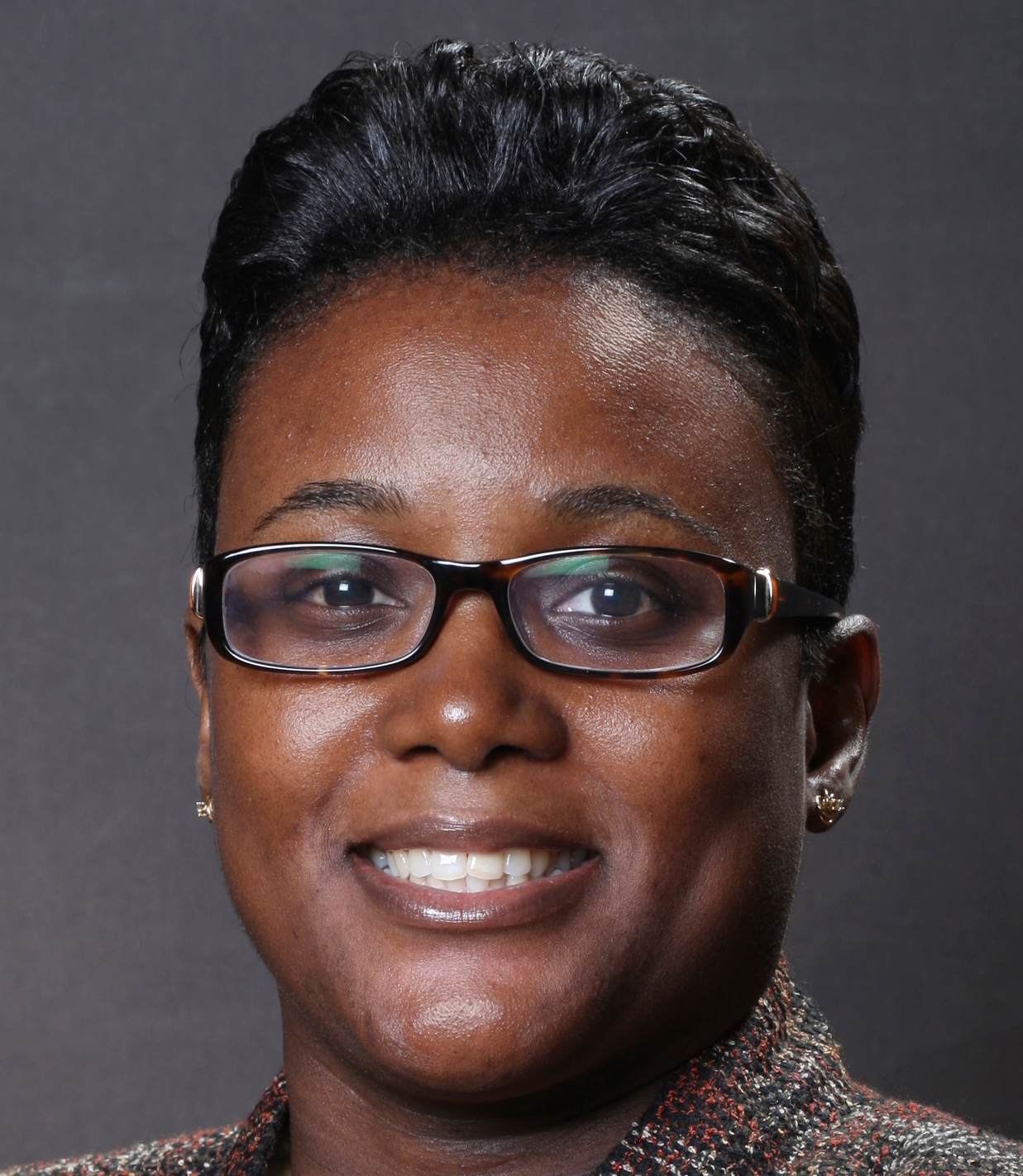
Anetra Harbor, M.S. ‘02, Ph.D. ‘06, has held economist and analyst positions with the United States Department of Agriculture (USDA) since 2006. She is currently a policy analyst with USDNs Natural Resources Conservation Service (NRCS) in Beltsville, MD. She is a member of NRCS’s Resource Economics, Analysis and Policy Division (REAPD). As a member of REAPD, her primary responsibility is to provide guidance and support for NRCS’s overall regulatory activities. She has a key role in the development, coordination, and clearance of NRCS regulations and notices. These documents, which are published in the Federal Register for the public, serve as the official mechanism by which NRCS’s conservation programs are administered. For the bulk of the past two years, her work has been directed toward preparatory activities needed to respond to the enactment of the 2014 Farm Bill. The majority of NRCS’s programs are authorized through the Conservation Title of the Farm Bill. Her notable achievements with USDA include: chairing NRCS’s Regulatory Working Group, temporarily serving as the Acting Director for NRCS’s Budget Planning and Analysis Division, assisting with the promulgation of more than 35 rules and notices to implement the conservation provisions of the 2008 Farm Bill, serving as Administrator for NRCS’s portion of the Federal Docket Management System, and conducting economic analyses covering various topics. Which Purdue faculty member had the most profound impact on your professional career? Every member of the Purdue Agricultural Economics faculty I came into contact with inspired me in some way. I remember something enduring about each one. In particular, Dr. Marshall Martin and Dr. Jay Akridge guided me through my graduate research and I was able to observe their passion for their craft, dedication to helping others, and commitment to the College of Agriculture and to Purdue University. This left the biggest impression on me as I graduated and went on to my first job as an economist with United States Department of Agriculture. What part of your visit back to campus in March are you most looking forward to? I want to see how much things have changed. I can’t wait to talk with professors and students, find out what new classes or areas of study are being offered, and see what new buildings are up or renovated around campus. I haven’t had a chance to visit Indiana since graduation back in 2006, so I especially want to get a good look around the Lafayette-West Lafayette community. It was my home for six years. What is the best advice you got while you were at Purdue? Who gave you the advice? Dr. Otto Doering would give us all the best advice that applies to graduate school and life beyond- “Just hang in there.” What is the best advice you have ever given? To whom did you give the advice? I actually have two pieces of advice that I find myself using when talking to my children. “In life you need a little bit of luck, skill, and will.” This one my son pretty much has memorized (of course, he plays football and thinks everything in life is a competition so he’s keen on the skill and will part). My daughter is getting close to graduating high school and the pressure of standardized tests and college applications is increasing. I have to remind her that “Sometimes your best is good enough.”
John D. Hardin, Jr. (Distinguished Ag Alumni: 1992)
As a Purdue student, Mr. Hardin spent his junior year participating in the International Farm Youth Exchange in New Zealand. After graduation, he worked as a research associate with the Indiana Regional Medical Program while farming part-time. He began farming full-time in 1971 and has gradually expanded his operation to its present size of 1200 crop acres and 5500-head farrow to finish hog operation located in Hendricks and Marion Counties. Mr. Hardin has served U.S. and Indiana agriculture in many leadership roles. Under former Governor Otis Bowen, he was a member of the Rural Policy Commission, serving as chairman of its committee on preserving Indiana’s agricultural resource base. He has also served as chairman of the Chicago Board of Trade Advisory Committee. Mr. Hardin is currently the President of the National Pork Producers Council and is recognized as a national leader on commodity issues, serving as an advisor to the international trade negotiators in the current GATT Round. He has received numerous awards for his service and achievements, including Indiana’s Pork All-American and the Indiana Prairie Farmer Master Farmer Awards. Gamma Sigma Delta honored him with its Alumni Award of Merit in 1985. Mr. Hardin was named a Purdue Old Master in 1986. He is a current member of the Dean of Agriculture’s Advisory Council. In January of this year, Mr. Hardin received the highest award given by the Purdue of Ag Alumni Association, its Certificate of Distinction.He has received numerous awards for his service and achievements, including Indiana's Pork All-American and the Indiana Prairie Farmer Master Farmer Awards. Gamma Sigma Delta honored him with its Alumni Award of Merit in 1985. Mr. Hardin was named a Purdue Old Master in 1986. He is a current member of the Dean of Agriculture's Advisory Council. In January of this year, Mr. Hardin received the highest award given by the Purdue of Ag Alumni Association, its Certificate of Distinction.
Marilyn Hartig (Pennington, NJ | Distinguished Ag Alumni: 1996)
Marilyn Hartig is vice president of External Service and Technology of the pharmaceutical research Institute at Bristol-Myers Squibb in Pennington, New Jersey. She is responsible for negotiating and managing alliances and licenses to access technology from outside the company. Sources of this technology include pharmaceutical and biotechnology companies, research institutes, and universities. Dr. Hartig division also manages the institute’s research and development portfolio review and prioritization process, and provides competitive intelligence related to internal development projects. In short, Marilyn is a key player in a central leader at Bristol-Myers Squibb. In addition to her scientific knowledge, she is skilled at handling difficult negotiations and accomplishing mutually beneficial outcomes for the parties involved. After earning a bachelor’s degree in chemistry from St. Olaf College in Northfield, Minnesota, Marilyn came to Purdue’s department of biochemistry. After completing her Ph.D., she was a postdoctoral fellow at the University of California, San Francisco. Her research efforts focus on hepatitis B virus and AIDS. She joined Bristol-Myers Squibb in 1987 as associate director of licensing, biotechnology division. Since then, she has directed that unit just and served as senior director of business development for biotechnology and specialty pharmaceutical products. Prior to her current assignment she was director of corporate development and vice president of Med-Tech ventures for Warner-Lambert Company in Morris Plains, New Jersey, but she was responsible for acquisition, divestment and investment activity. She also managed the company’s venture investment portfolio. In 1984, she returned to Bristol-Myers Squibb in her current position. The company is a diversified worldwide health and personal care company its principles businesses are pharmaceutical, consumer products, nutritionals and medical devices. Through her efforts, Dr. Hartig is shaping not only the different direction of Bristol-Myers Squibb, but of the future pharmaceutical industry. Marilyn grew up in Springfield, Oregon and Iowa City, Iowa. Her first licensing experience came in the patent trademark and copyright office at the University of California, Berkeley. She is a member of Licensing Executive Society and the Association of University Technology managers.
Vernon R. Hawkins (Greensboro, NC | Distinguished Ag Alumni: 2011)
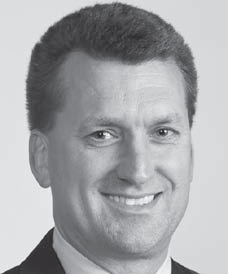
Through the agronomy department cooperative education program, Purduesophomore Vern Hawkins had a six-month assignment doing “a hundred different kinds of jobs” at a retail cooperative in Winamac, Indiana. The next summer, his co-op placement took him to ICI Americas, where he was asked back the following summer. From the co-op program, he pocketed 12 academic credits, hands-on experience in the business world, and a job offer with ICI, a legacy company of his current employer, global agribusiness Syngenta.Today, Hawkins is president of SyngentaCrop Protection, the top profit-contributingsubsidiary within the corporation with more than $1.5 billion in annual sales. He brought considerable leadership experience along with sales and marketing expertise to the position, which he assumed in January 2010. He was vice president of U.S. commercial operations,led the U.S. horticulture business unit, and led brand management, biological research and development, regulatory affairs, and development planning teams in the NAFTA region. Mobility facilitated his advancement in the company, he says —both his willingness to travel and to move every two or three years.“I probably had the best development you could ask for in preparing to lead a company,” he says. He characterizes his management style as open and personable, tempered by accountability and high expectations.Once a member of FFA, Hawkins now supports the National FFAFoundation and has chaired the National FFA Sponsors’Board. He returned to Purdue last fall as the featured speaker at the College ofAgriculture Learning from Leaders program. His own career validates his advice to students that work experience, through internships or other means, is important for real-world connections to their education in the classroom. The Indiana native has never lost his love of the outdoors and enjoys everything from golf to chopping wood to most sports —but especially Purdue basketball.
.”
David Hefty (Auburn, IN | Distinguished Ag Alumni: 2018)
Their potential was clear long before their 1999 Purdue University graduation. Roles in Mortar Board, Iron Key and Old Masters, and the Agricultural Council and NAMA Marketing Team. Both were teaching assistants in the Agricultural Economics department, and both graduated summa cum laude. He was the College of Agriculture’s outstanding senior and won the G.A. Ross Award, given to the outstanding senior man on campus. She was one of eight recipients of the Charles O. McGaughey Leadership Award, and a month after she spoke at commencement, Stacy married David Hefty. Careers in the financial industry awaited them, but a year later, they struck out on their own. Cornerstone Wealth Management was the name for a decade. Now Hefty Wealth Partners — he’s the chief executive, she’s the president — handles $200-plus million for clients who need financial, estate and wealth planning; small business planning; trust services; risk management planning; corporate services and consulting for nonprofits. The mission statement emphasizes education, communication and honesty. She’s been president of the Auburn Kiwanis, the DeKalb County Extension Board, and the Women’s Care Center Northeast Indiana. She served two terms on the DeKalb Health Hospital board. In 2010, he was named one of Greater Fort Wayne Business Weekly’s 40-under-40, and she earned that distinction two years later. He’s a frequent guest on national television network business shows, and his remarks have been seen in The Wall Street Journal, MarketWatch, Forbes and USA Today, among others.
Stacy Hefty (Auburn, IN | Distinguished Ag Alumni: 2018)
Their potential was clear long before their 1999 Purdue University graduation. Roles in Mortar Board, Iron Key and Old Masters, and the Agricultural Council and NAMA Marketing Team. Both were teaching assistants in the Agricultural Economics department, and both graduated summa cum laude. He was the College of Agriculture’s outstanding senior and won the G.A. Ross Award, given to the outstanding senior man on campus. She was one of eight recipients of the Charles O. McGaughey Leadership Award, and a month after she spoke at commencement, Stacy married David Hefty. Careers in the financial industry awaited them, but a year later, they struck out on their own. Cornerstone Wealth Management was the name for a decade. Now Hefty Wealth Partners — he’s the chief executive, she’s the president — handles $200-plus million for clients who need financial, estate and wealth planning; small business planning; trust services; risk management planning; corporate services and consulting for nonprofits. The mission statement emphasizes education, communication and honesty. She’s been president of the Auburn Kiwanis, the DeKalb County Extension Board, and the Women’s Care Center Northeast Indiana. She served two terms on the DeKalb Health Hospital board. In 2010, he was named one of Greater Fort Wayne Business Weekly’s 40-under-40, and she earned that distinction two years later. He’s a frequent guest on national television network business shows, and his remarks have been seen in The Wall Street Journal, MarketWatch, Forbes and USA Today, among others.
Barth Hendrickson (Indianapolis, IN | Distinguished Ag Alumni: 2019)
Barth Hendrickson traces his passion for landscape architecture to his rural roots on his family’s Clinton County dairy farm. Leadership experiences through FFA and 4-H and his agricultural education as a second-generation Boilermaker gave him a unique perspective in a world searching for solutions to environmental health, food security, universally designed spaces and thoughtful public places. Hendrickson’s work has positively impacted millions of people who experience his built environments — community parks and recreational facilities, government and civic projects, corporate headquarters, museums, zoos, and town and facility master plans. Notable examples are the Canal and White River State Park interpretive master plan; Indianapolis Museum of Art Expansion; Monument Circle redesign study; and The Center | The Heritage Research Group, the state’s first dual sustainable design designated both LEED-Gold and SITES Certified. He also has completed detailed planning studies and proposals for institutions of higher learning, including Purdue. Several of his plans have received prestigious honors, and one of his estate designs will become part of the Smithsonian Institution’s Archives of American Gardens. Beyond the scope of his professional practice, Hendrickson has brought his planning and design expertise to several boards to guide both physical and economic development initiatives. He has also remained dedicated to his alma mater. On the Landscape Architecture Professional Advisory Council, Hendrickson is a strong advocate for training students to work with others outside of their own area of study. Such cross-disciplinary collaboration in the real world, especially between landscape architects and civil engineers, leads to more holistic and innovative solutions — a mindset he believes begins in higher education. Hendrickson’s approach to design has been described as “thoughtful, strategic and pragmatic, anchored in detailed analysis, hands-on client interaction, meaningful public involvement and broad community support.” He aspires to plan sustainable communities while working alongside like-minded allied professionals who see the importance of global biodiversity, environmental stewardship, and the spiritual realities that face humankind.
David Hettinga (Minneapolis, MN | Distinguished Ag Alumni: 1996)
David Hettinga is chief technical officer and vice president of Corporate Research, Technology and Engineering, Agricultural research, and technology and fleet for Land O’Lakes, one of the world’s largest and most successful cooperatives. Dr. Hettinga had has had a positive effect on the course of our culture, both farm production and food manufacturing. Thanks to his contributions, US agriculture is stronger and more vital than ever. David holds two patents for the manufacture of cheese and cheese products before joining Land O’Lakes he held positions a Kraft and Clorox he currently serves as the chair of the board of Advanced Food Sciences, Inc., and on the board of Alex Fries, Inc. He is also vice chair of the United States National Committee of the International Dairy Federation. Dr. Hettinga is active and dairy organizations, chairing the Wisconsin Milk Marketing Board Fat Advisory Committee. He is a board member of the Industry Review Committee for the National Dairy Promotion and Research Board, the American Dairy Science Association, and the Institute of Food Technologist. He is also active in the community organizations such as the United Way and the Minnesota 100 mentor program. A native of Orange County, California, he is a former instructor of dairy and food science at California State Polytechnic University and he has published numerous scientific papers and refereed journals. He is the author of three book chapters and is frequently asked to speak to agriculture and food groups. In addition to his Purdue degree, Dr. Hettinga earned a bachelor of science in dairy manufacturing and business from Cal Poly in 1962. He holds a Ph.D. in food Microbiology from Iowa State University, which he completed in 1971.
G. William Hoagland (Washington, D.C. | Distinguished Ag Alumni: 2004)
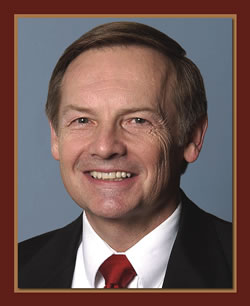
Crunching numbers all day is stressful enough. Make those numbers the congressional budget, and it is no wonder Bill Hoagland needs a tension reliever. That and his motivation to stay healthy keep him on schedule, jogging every other day. He’s religious about it, but not fanatical. “Ten miles is my limit,” he says. “I have the best running course in the world. I head out the west side of the capital and go down the mall to the Lincoln Memorial and back.”It takes him about 41 minutes for the4.5 mile lunch-hour run, leaving him time to shower before returning to his desk. A runner since the early 1970s, he’s been consistent in the sport for the last10 years. “I like getting away from the office. It’s important to relax, to take the pressure off from work,” he says. “I get my heartbeat up and my pulse going. And has time to myself, time to think. It’s a good time to think.”It’s largely a solo activity for him, although last Thanksgiving he ran theTurkey Trot with his daughter, Kate, visiting from Boston. He usually runs in the April Cherry Blossom 10-miler, but is missing the 2004 race to be at Purdue for the Distinguished Agricultural AlumniAwards.“Most of the time I do it on my own,” he says of his passion for running. “I would like to run a marathon, but my wife thinks I’m too old. There’s nothing scheduled right now.”“IcametoPurduesearching, uncertain and stormy future.My professors gave me a sense of value, a sense of worth, and a recognition that I could use where I had come from and put it to good work.”
Gary D. Hodgen (Virginia Beach, VA | Distinguished Ag Alumni: 1995)
Dr. Hodgen, a native of Frankfort, Indiana, is President of the Jones Institute for Reproductive Medicine in the Department of Obstetrics and Gynecology at Eastern Virginia Medical School. He was designated the Howard and Georgeanna Jones Professor of Reproductive Medicine in 1992. Dr. Hodgen joined the faculty at Eastern Virginia in 1984 after a fifteen-year appointment with the National Institute of Child Health and Human Development, a division of the National Institutes of Health (NIH) in Bethesda, Maryland. During his last six years with NIH, he held the post of Chief of the Pregnancy Research Branch. Prior to that he headed the Endocrinology, Reproduction Research Branch. Over the course of a distinguished research and teaching career, Dr. Hodgen has authored or co-authored more than 500 original scientific articles. He has also mentored scores of undergraduate, graduate and postdoctoral students. Dr. Hodgen has dramatically increased the new knowledge of reproductive endocrinology, including studies on pregnancy recognition and follicular maturation. Particularly noteworthy are his studies of in vitro fertilization, surgical bypass of damaged oviducts and early genetic diagnosis of embryos. In 1994, he conducted the world’s first preimplantation genetic diagnosis to prevent Tay-Sachs Disease. Dr. Hodgen was elected president of the Society for Gynecologic Investigation in 1994. He was the 1983 recipient of The President’s Scientific Achievement Award from the Society. Eastern Virginia named him the 1995 Outstanding Scientist, and he has dozens of invited lectureships and presentations for conferences and universities worldwide to his credit. He is also widely sought as a consultant and authority in his field. Dr. Hodgen has served on the editorial boards of several prestigious journals on reproductive endocrinology.
Thomas Hoekstra (Bellvue, CO | Distinguished Ag Alumni: 1997)
Dr. Hoekstra, a native of Lansing, IL., Serves as the acting director of the Inventory and Monitoring Institute for the National Forest System, a division of the USDA Forest Service. He also is Program Manager for International Forestry Relations.
The USDA Forest Service is a key player in the preservation and protection of forests and grasslands in the United States, and provides service to people through the promotion of ecologically sound multiple use benefits of the land. Prior to joining the Forest Service, Dr. Hoekstra was an assistant/associate professor of wildlife ecology at the University of Vermont.
Through his research for the Forest Service, Dr. Hoekstra has focused on maintaining ecological sustainability and developing scientifically sound land and wildlife management strategies. As a consultant both nationally and abroad, his ecological expertise is often sought by universities and research groups, including the International Arid Lands Consortium, to which he serves as chairman of the Research Advisory Committee. In 1989, Dr. Hoekstra led a research team and co-authored a report for the 1989 Resources Planning Act Assessment of Fish and Wildlife. The information presented was the basis for the development of fish and wildlife management practices in the Forest Service.
Along the T.F.H. Allen, Dr. Hoekstra wrote Toward a Unified Ecology, a book assessing the need for ecologist to become increasingly predictive and urging them to consider large-scale systems in their study. In addition, Dr. Hoekstra is the author or co-author of more than 80 scientific papers. Currently, Dr. Hoekstra is writing a second book with Allen and Dr. Joesph Tainter.
Dr. Hoekstra’s professional accomplishment have earned him several awards, including a Certificate of Appreciation in 1990 form the chief of the USDA Forest Service for Exemplary Contribution to Critique on Land Management Planning.
Douglas Hoerr (Chicago, IL | Distinguished Ag Alumni: 2010)
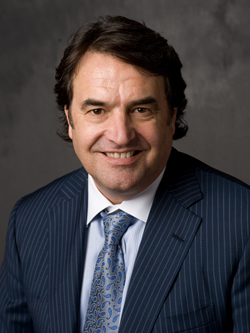
A farm in Milford, Indiana; a design/build firm in Peoria; English formal gardens; and Chicago cityscapes—these seemingly unconnected spaces led DouglasHoerr to become a leading landscape architect of projects that continue to grow in scale and impact. The Milford native worked for nine years in Peoria before heading overseas, where his career was hugely influenced by a two-year apprenticeship with three of Britain's most respected garden designers. When he returned from England in 1990, he established his own company in Chicago. While beautiful gardens grow more easily in other regions, Hoerr understood the Midwest horticulturally, and he thought Chicago would be fair to an entrepreneur. He marketed himself by speaking at garden clubs and botanical gardens. His big break came with a design for the Crate & Barrel store on Michigan Avenue. It caught the mayor's eye, and Hoerr landed the beautification of Chicago’s Magnificent Mile.He approached the job with trepidation. That portion of Michigan Avenue—the main thoroughfare between Chicago’sLoop business district and its Gold Coast—was concrete from curb to curb. Merchants donated the funds that allowed Kerr to create raised medians filled with naturalistic blends of enormous scale, complexity, and texture. He has since built a reputation for socially responsible and environmentally sustainable public open spaces. He is a strong proponent of green roofs. His“signature” is a final product that looks connected to the architecture on the site as well as to the greater landscape: “It looks honest,” he explains. He partnered with Peter Schaudt inJanuary 2008 to create his current practice. Hoerr’s work and philosophy have been introduced to millions of readers in national publications, and he has designed more than 500 private gardens across the United States.He maintains his own formal rooftop garden at his Chicago-area home and naturalistic, layered gardens at a 100-acre farm in Michigan. Other escapes include hunting and golf. Hoerr and his wife TracyTaylor have two children, ages 10 and 6.“Purdue gave me that balance of skills and how to think things through—I can conceptualize very rapidly and at the same time, I’m a builder. I hire a lot of Purdue interns and staff because I like the way Purdue educates them; they come out of West Lafayette with ‘batteries included.’”
Leslie Holland-Bartels (Anchorage, AK | Distinguished Ag Alumni: 2006)
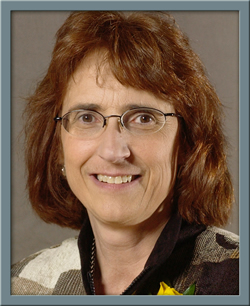
Imagine revealing, and preserving, the untapped environmental wealth of Alaska— treasures spanning nearly 592,000square miles of largely unmapped terrain. Such is the quest embraced by LeslieHolland-Bartels, who balances positions as Deputy Regional Director/WesternRegion and Director of the AlaskaScience Center, U.S. Geological Survey. She and her corps of nearly 300 scientists scrutinize all facets of the Alaskan“frontier,” from interpreting and disseminating information on earthquakes and volcanoes to modeling international populations of herons and waterfowl. Holland-Bartels assumes integral roles in guiding the state’s large-scale mining initiatives, as well as planning Alaska’sgas pipeline. “Our state has world record mineral deposits and an enormous wealth of oil and gas,” she explains.“Sound, defensible scientific facts are critical in order for policymakers to balance their decisions between the country's economic needs and preserving the environment for future generations.”Balance and personal commitment have long mapped Holland-Bartels’career path. After earning her Ph.D. from Purdue in 1980, she joined the NationalFishery Research Center in La Crosse, Wisconsin, where, under her leadership, a new science group developed a research program to assess impacts of upper Mississippi River management endangered species. From 1995 to 2002, she served as Chief Scientist for the $6 million integrated multi-agency study to determine the continuing impact and potential recovery of near-shore marine ecosystems of Prince William Sound following the 1989 Exxon Valdez oil spill. Professional challenges aside, Alaska’srich landscape also provides the perfect venue for a favorite hobby, fly-fishing.“I’m not very good,” she admits, “but the state is so over-populated with fish, anyone can catch something.” True to her environmentalist bent, however, she“catches” with a barbless hook.“I felt strongly about learning science in a practical context, and Purdue University combined an excellent academic reputation with the flexibility to plot my own course. Graduating from Purdue has carried weight throughout my career.”
Jay Hood (Orlando, FL | Distinguished Ag Alumni: 2016)
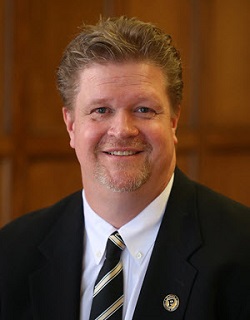
Jay Hood is a principal and director of landscape architecture for the Littlejohn Engineering Associates in Orlando, Florida.
Hood has been responsible for a portfolio that is noteworthy not only for its many significant high-profile projects but also for the positive, far-reaching impact these built works continue to have on countless people from diverse walks of life.
Hood has over 28 years of experience in site design and landscape architecture for public spaces. His design influences can be seen throughout Florida in places such as Lakeland’s Hollis Gardens, Orlando’s Harry P. Leu Botanical Gardens, Winter Park’s Park Avenue and the University of Central Florida’s Health Sciences campus at Lake Nona, to name a few.
Despite his demanding schedule, Hood has remained dedicated to Purdue and his colleagues within the department. Since 2006, Hood has served as a member of the Purdue landscape architecture program’s Professional Advisory Council, supporting students throughout their academic careers.
Patricia L. Houghton (McCook, NE | Distinguished Ag Alumni: 2010)
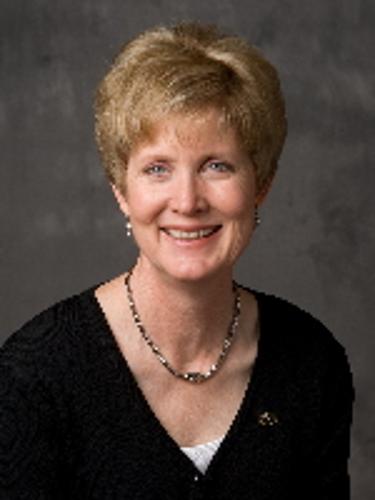
Patsy Houghton grew up on a cow-calf operation near Tipton, Kansas, where documents signed by Ulysses S. Grant, Chester A. Arthur, and Benjamin Harrisonattest to the history of the ranch her family homesteaded in 1872. Like her ancestors, Houghton is a pioneer. When she and a partner built a company to produce genetically superior bred females for ranchers—heifers that excel in on-ranch performance while producing high-quality, consistent beef products—they started a new segment in the beef industry. After earning her doctorate at Purduewith professor of animal sciences RonaldLemenager, Houghton became an extension Beef Specialist at Kansas StateUniversity. There she and a colleague implemented a program that trained student technicians for artificial insemination in beef herds. The program allowed Houghton to collect data comparing the effectiveness of various estrus synchronization protocols and it gave her the idea for her own facility. Heartland Cattle Company began in1990 with the construction of pen space for1,680 head. Based on demand, the company expanded even before it opened. Today the business is owned solely by Houghton and has a yard capacity of 4,000head, most of its original customers, and waitlist. An extensive research program further sets Heartland apart from its competitors. The company injects nearly$4 million into the local economy annually. Houghton is involved in every detail of the operation, but credits her hardworking crew of six: “Ours is a story of how to do things with integrity, work ethic, and attention to detail to get it done right, year in and year out.”Today the concept of professional heifer development is embraced by industry leaders and producers, who have invitedHoughton to speak at more than 250 states, regional, national, and international meetings. She makes time for community service, as well, and has just completed her second three-year term on the board of McCook Community Hospital. She has hosted the Purdue Animal Science industry tour several times and was the keynote speaker for Purdue’s spring 2009 Book-Harmon Leadership Forum.“Universities are there not to tell you what to think, but to teach you how to think. I am in the problem-solving business; if I can solve customers' problems cost-effectively, they’ll be with me forever. The beginning of understanding that concept was my graduate work at Purdue.”
Leland R. House (Distinguished Ag Alumni: 1993)
Dr. House has served since 1984 as executive director and program leader of the Southern African Development Corporation Committee/ International Crops Research Institute for the Semi-Arid Tropics (SADCC/ICRISAT). This year he is returning to the United States from his post in Southern Africa to complete the third edition of his book, Guide to Sorghum Breeding.
Dr. House began his professional career as a faculty member and maize breeder in Purdue’s Department of Botany and Plant Pathology. He has been a leading contributor to sorghum improvement around the world for the past 25 years. Dr. House has been involved in all aspects of developments in sorghum improvement programs in Southern Asia, the Middle East, and in many parts of Africa for the past two decades. His interest in international agriculture led him to join the Rockefeller Foundation in 1959 as a maize breeder in the All India Maize Program. In 1961, Dr. House was made joint coordinator of that program, with responsibility for introducing hybrid sorghum to India. He contributed significantly to building an effective team that transformed and modernized Indian sorghum production. The Barwale Seed Company, that Dr. House helped establish, has served as a model for development of seed companies in other countries around the world.
Dr. House has subsequently led broad programs in sorghum and millet improvement in Lebanon and the Middle East for the Rockefeller Foundation, in India for ICRISAT, and in Zimbabwe for SADCC/ICRISAT. One of his principal accomplishments was the initiation of a hybrid sorghum program in Sudan in cooperation with Sudanese scientists in the Agricultural Research Corporation. He recently headed a special emergency sorghum/millet seed production project for Southern Africa to address the problem of providing seed for farmers who had to eat their seed in order to survive the severe drought last year. Dr. House has made a remarkable contribution to the food security of millions of disadvantaged people whose food supply is threatened population pressure, drought, and pestilence.
David W. Howell (Middleton, IN | Distinguished Ag Alumni: 2008)
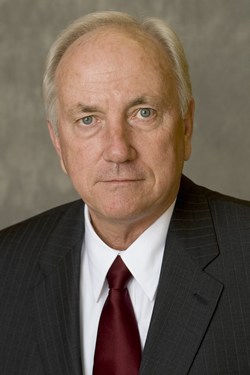
Besides traditional corn and soybean crops, the fruits of David W. Howell’slabor are evidenced in semi-truck loads of watermelons, tomatoes, pumpkins, and sweet corn, today is grown on 5,000acres in four Indiana counties. He’s also lending a hand to his son’s operations on15,000 acres in Bahia, Brazil, raising soybeans, sorghum, and cotton. With farmers on both sides of his family, Howell was born into the business, growing up on a DelawareCounty farm. He came to Purdue for his bachelor's and master’s, both in agricultural economics. “It opened many doors for me and my family, and I learned to think, ‘Why not do this?’ and go ahead and do it,” he says. He and his wife Mary struck out on their own in 1972, borrowing equipment from his father and leasing 300 acres. Operations grew over the years and diversification kept them going. They planted a 3,000-tree apple farm in 1981. And for 10 years until 2007, their operations included fresh market fruits and vegetables. Each season, they employ more than 400. That they are still farming counts as his greatest achievement, Howell says.“That’s what I’m most proud of, besides my family. We were able to be full-time farmers when so many of my peers couldn't.” He’s also served the industry and his community — on the bank, education, Extension, and governmental boards —and regularly hosting farm tours. He recently helped rescue a 19th-century church building, now a community center. His awards include HonoraryIndiana Commissioner of Agriculture, Red Gold Master Grower, and Order of the Red Tie from Indiana HorticultureCongress.In his spare time, Howell enjoys working some more, traveling, and the political process. “I work behind the scenes when I’m asked. I enjoy the smoke-filled room much more than Ido the front page,” he says.“At Purdue, I learned how to reason, logically work through alternatives, and find answers, as well as understand the fundamentals of many disciplines. I gained the confidence to move ahead and innovate.”
Paul P. Hung (Bryn Mawr, PA | Distinguished Ag Alumni: 1994)
Microbiology Division of Wyeth-Ayerst Laboratories American Home Products. He began his professional career with Abbott Laboratories in 1960 as head of the Molecular Biology and Virology Laboratory. In 1981, he left to become General Manager of the Genetics Division of Bethesda Research Laboratories, Inc. A year later he assumed his present position. One of Dr. Hung’s most important practical research contributions was the co-invention of Ausria, a kit for the detection of hepatitis B. He also headed a research team that cloned and expressed the first biologically active human enzyme, urokinase, important in blood clot dissolution. Subsequently he led the team that cloned the Hepatitis B virus antigen. Dr. Hung has important discoveries in the chemotherapy of cancer viruses and in molecular virology to his credit. His work with vaccines has been far-reaching and continues to provide the basis for important research in that area today. Most notably, his concept of using live, benign, oral vaccines to carry immunogen genes has led to several patents. These piggy-back immunogens have been adapted for use to combat a number of human diseases. There is great interest in the promise they hold as weapons for viral diseases that are ordinarily difficult to handle with conventional vaccines. Dr. Hung has performed a dual role during much of his career, holding concurrent positions in industry and education. He served as an adjunct professor in the Department of Biochemistry of Northwestern Medical School from 1974 to 1986 and as a senior lecturer at Loyola University Medical School from 1969 to 1975. Dr. Hung is currently a member of the National Vaccine Advisory Board that advises the Secretary of Health and Human Services. He is also a consultant to the Assistant Secretary of Defense, for whom he reviews biomedical research and advises on related military projects.
Brad L. Inman (New Orleans, LA | Distinguished Ag Alumni: 2009)
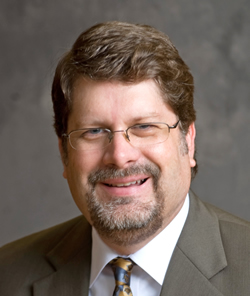
Whether the environmental challenge takes him to the 1.5 million-acre BlackfeetReservation in northwestern Montana or to southern Florida shores, soil scientistBrad Inman brings a well-rounded approach to responsibly using and managing our world’s limited resources. As a principal technologist, agricultural scientist, and senior project manager for CH2M HILL—one of the nation's largest employee-owned environmental consulting firms—his expertise extends to irrigation, wetlands, watershed and forestry industry studies, water resources, hazardous and solid wastes, and environmental assessments. The specific “hat” he wears depends on where, and for what, duty calls. In 2005, Inman spearheaded a$3 million water resources project, conducting a site-suitability study and drafting natural water treatment system plans for Clayton County, Georgia. This innovative endeavor led to more than$15 million of constructed wetland treatment facilities and also was selected as a 2005 National Honor Award Winner by the American Council of engineering companies. Most significantly, Inman’sdesign created a natural watershed for Clayton County, sparing the area from severe drought conditions that have plagued the southeast. Since January 2007, Inman has served as a senior project manager and embedded employee for the Army Corps of Engineers New Orleans District Office, concentrating his expertise on rebuilding levees compromised by Hurricane Katrina.“These are tremendous projects, with impossible deadlines, yet I’m energized and have renewed my focus,” he says.“There are infrastructure issues in NewOrleans that people will be working on for decades.”Raised on a small farm in Coal City, Indiana, Inman grew up in harmony with his rural environment. A music lover, he also harmonized indoors—where he and his brother played the guitar and mandolin in tune with their father, who jazzed things up on the harmonica.“Purdue opened the world to me and rewarded me with a life I could once only dream about. I gained an exceptional education, career skills, friends, mentors, and a lifelong love of learning.”
Naim M. Iraki (Jerusalem, Israel | Distinguished Ag Alumni: 2002)
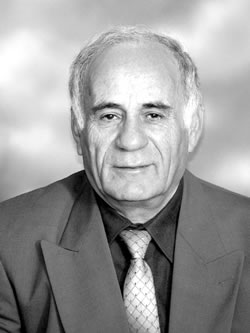
When Naim Iraki came to Purdue University to earn his doctorate in plant physiology, he packed his camera. While photography had been his hobby since his late teenage years, it was at Purdue that his interest blossomed.
His favorite subjects are natural landscapes and “people in important events,” he says. He shoots with color film, but also enjoys black-and-white photos. The hobby, he says, is “a way of preserving in my mind certain events or beautiful locations I visited and the ‘story’ around each of them.”
Photography also gives him an opportunity for personal creativity. “I view photography as an art that can be used for expressing my thoughts and feelings through the kinds of objects and the poses I select.” He doesn’t currently develop his own photographs, but he’d like to. “A large part of the art is also in the film developing process.”
While Iraki doesn’t exhibit his photographs publicly, he enjoys displaying them for family and friends. “The reward I get from photography is the pleasure I feel when recalling the event or the location I visited,” he says. “It is a kind of going back to the past and reliving a good time. One photograph may even remind me of a period of several years of my life.”
And if a photo has captured a sad time, he thinks back and asks, “What caused it to happen? Could I
Michael Jackson (Indianapolis, IN | Distinguished Ag Alumni: 1996)
Michael a Jackson is founder and president of the Agri Business group, the leading agribusiness consulting firm in United States. The Indianapolis based company consist of five different divisions: Spectrum Communications, one of the nation’s top five agricultural public relations agency, of which Jackson serves as the chair; Agricultural Speakers network which books more than 80 professional speakers for 250 annual engagements; Synergy, the strategy development and research arm of the organization; the Technical Division, which focuses on technical training, quality assurance and research project management; and the Custom Training division, which develops training programs to help clients meet their objectives. Michael started the company in 1979 as a one-man operation. Today, Agri Business group employs nearly 100 professionals. In addition to the Indianapolis headquarters, the company has offices in Kansas City, Missouri and Melbourne, Australia. Agri business group also is establishing a European office in Brussels Belgium. Mr. Jackson assists young people in agriculture by working with the FFA, 4–H, and Alpha Gamma Rho fraternity. He has developed extensive marketing education materials for campus classrooms, including co-authoring a widely used textbook, Agriselling. He is a regular and popular guest on the Purdue campus, where he speaks to student organizations and to classes at the invitation of professors. Michael is also active in church and community he is an organizer in charter member of the Geist Christian church. He is a board member of the Lawrence Township foundation capital campaign, which raises $100,000 annually. And he is board chair of the Christian Church foundation (Disciple of Christ), which is grown from $17 million in assets to more than $65 million in assets since 1991.
Scott A. Jamieson (Arlington Heights, IL | Distinguished Ag Alumni: 2004)
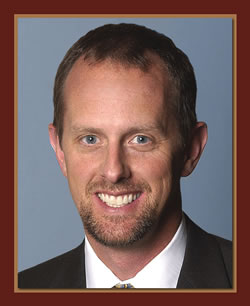
As a boy, Scott Jamieson simplycouldn’t resist the silver maple tree inthe back yard of his Gary, Indiana,home—particularly on breezy days. Theadventuresome youth often would climbto the very top, sway in rhythm with thegrand old maple, and survey hisneighborhood kingdom.Years later as a Purdue student,Jamieson and the future Diane Jamiesonfrequently visited Horticulture Park,simply to sit under the generousbranches of “their” tree—a strappingsassafras, native to Indiana anddistinguished by its uniquely-shapedleaves and gorgeous autumn color.These days, there’s precious little timeto sit below a tree, or to clamber aboveits trunk. Yet Jamieson’s early, elevatingexperiences inspired a love of theoutdoors and an appreciation for theexertion and discipline of physicalactivity.“My goal was to climb as high as Icould,” recalls Jamieson of his boyhoodScott A. JamiesonArlington Heights, IllinoisChief Executive OfficerThe Care of Treesexploits, “and it was pretty silly. We’dnever let our professionals climb the wayI did as a kid!”Back on the ground, Jamieson spentlong hours hiking the Indiana Dunesand, through the years, his homegrownlove for the outdoors branched out to flyfishing,tennis, running, martial arts, andskiing. His favorite spots are stillwherever trees grow in abundance—Yosemite for its natural beauty, andSanibel, Florida, for its family-friendly,undeveloped feel.He also claims a “road-less-traveled”favorite, a small offshoot of GunpowderRiver, just north of Baltimore. This iswhere Jamieson perfects his fly-fishingcasting technique—a motion hedescribes as “counter-intuitive”—andrejuvenates his spirit.“I love this little stream,” Jamiesonsays. “When I’m there, I shut out alldistractions and simply focus myself.Some of my best ideas have come fromthis spot.”
Colleen B. Jonsson (Birmingham, AL | Distinguished Ag Alumni: 2007)
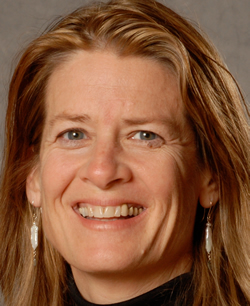
Careful, measured steps guide ColleenJonsson, whether she’s pursuing herpassion for rock climbing or researchinghuman viruses. And when she says, “Ireally like the mix of basic and field; Ienjoy trying to think about what’s goingon in nature,” she’s referring to herwork, but she could be speaking ofrappelling, as well.Jonsson began her life of science byearning biology and chemistry degrees in1983 from the University of Missouri,then spending two years at Monsanto,engineering plants for fungal diseaseresistance.Eager to take the next step in learning,she then headed to Purdue University fora biochemistry doctorate. “I wasfascinated by pathogens that affectedagricultural crops,” she says. Afterearning her Ph.D. in 1985, she climbedhigher in her knowledge quest, studyingthe HIV virus for three years as apostdoctoral biochemist at Robert WoodJohnson Medical School.“My fundamental fascination is theinteraction of pathogens and their hosts,in the broadest sense and in all aspects,”she says. When she headed to NewMexico State in 1993 as an assistantprofessor, she intended to return to plantresearch. But that’s when the stateexperienced hantavirus outbreaks. “Thatcaught my attention, and I have beenworking on it ever since,” she says. Aftera decade in the Land of Enchantment, shebrought her interests to the University ofAlabama and the Southern ResearchInstitute, where today she’s programleader for emerging infections diseaseresearch in the drug discovery division.There, Jonsson oversees a teamresearching hantavirus, avian flu, RSV,SARS, and other infectious diseases.Their studies include land use practices,climate, the environment, and potentialtreatments.Those long days of research, dataanalysis and publishing results call for aphysical counterbalance, which she getsclimbing the rugged rocks and practicinghot yoga.“Purdue prepared me for various challenges I’vefaced academically, providing me with abroad and fairly deep background.Those were great building blocks. I’ve never feltthat I didn’t know where to go for more.”
Tuajuanda C. Jordan (Chevy Chase, MD | Distinguished Ag Alumni: 2008)
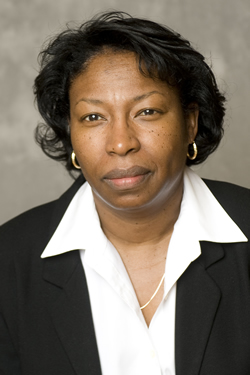
Marking Tuajuanda Jordan’s journey— from studying chemistry as anundergraduate at Fisk University tocollaborating with world-class scientistsand educators as Senior Program Officerfor the Howard Hughes Medical Institute— lie a trio of clearly marked pointers:Patience, passion, and perseverance.Patience was honed at Purdue, whereadapting from a small, liberal artscollege to a Big Ten university with 30,000students took months. But a passion forbiochemistry blossomed, an energy thatdefines her extraordinary career.Throughout 11 years at XavierUniversity in New Orleans, Jordanadvanced from an assistant professor ofchemistry to the university’s AssociateVice President for Academic Affairs. Hertenure was characterized by a focus onundergraduate research and acommitment to fostering an increase ofunder-represented ethnic groups inscientific careers.Following Hurricane Katrina’s wrath inAugust 2005, she and her teenage twinsmade the difficult decision to relocatenear her parent’s home in D.C. — amove that reconnected her to colleaguesat Howard Hughes Medical Institute.From temporary offices at the institute,she worked electronically to facilitateXavier’s reopening in January 2006, andto establish a program that providedsabbaticals for over 50 Xavier faculty.As Howard Hughes Medical Institute’sSenior Program Officer, Jordan’s mostcompelling mission is the launch of amulti-million dollar, four-year ScienceEducation Alliance Program, which willcreate and introduce a national researchcourse for freshman at 12 colleges anduniversities nationwide.“There’s nothing like seeing students’faces when they discover somethingthat’s truly theirs, and realize they’rethinking like scientists,” says Jordan.Jordan was the first in her family topursue higher education, and the firstAfrican American woman to earn a Ph.D.from Purdue’s Biochemistry Department.“In addition to the process of science, Purdue Universityoffered valuable exposure to the culture of science.These life tools gave me confidence in my skills, andenabled me to accept challenges without hesitation.”
Shibu Jose (Columbia, MO | Distinguished Ag Alumni: 2018)
Anyone trying to keep pace with Shibu Jose is accomplishing a great deal — and moving quickly. Two decades ago, Jose left Purdue University with a doctorate. By 2009, he was the H.E. Garrett Endowed Chair Professor and Director of the Center for Agroforestry in the School of Natural Resources at the University of Missouri. Last year he was chosen to head the School of Natural Resources. His research productivity as a faculty member has been remarkable: More than $40M in research grants as principal- or co-investigator; 130-plus published articles and nearly 40 book chapters, and he’s edited eight books. He’s completed 46 graduate students (13 Ph.D., 33 M.S.) and directs nine current graduate students (3 Ph.D., 6 M.S). He has one trademark, one patent pending, two invention disclosures, and one startup company. Jose is Editor-In-Chief of Agroforestry Systems, Associate Editor of International Journal of Ecology and an Academic Editor for PLOS One. He was Editor for the Journal of Forestry from 2008 to 2013 and Book Review Editor for Forest Science from 2005 to 2009. Jose’s research program has the overarch- ing goal of identifying and quantifying ecological processes and interactions that define ecological sustainability. He examines how resource availability (light, water, nutrients, carbon) and disturbances (e.g., management interventions, fire, exotic invasions) influence ecosystem structure and function in agroforests, natural forests and plantation forests. He uses this ecological information in designing agroforestry systems and restoring degraded and damaged ecosystems. He is Chair of the Secretary of Agriculture’s Forestry Research Advisory Council (2016- 18). In 2014, the Society of American Foresters gave him the Barrington Moore Memorial Award, its highest honor for forest biology research. He served on the Purdue FNR’s departmental review team and was a longtime member of the advisory board of the Hardwood Trees Improvement and Regeneration Center.
Michael R. Kanost (Manhattan, KS | Distinguished Ag Alumni: 2008)
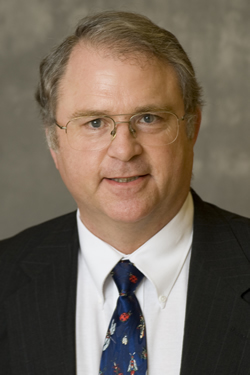
In the research laboratories of MichaelKanost, flour beetles, mosquitoes, andtobacco hornworms are neverconsidered pests. Rather, insects arewelcome subjects in the ongoing quest tounderstand the inner workings of theirimmune systems — research that couldhelp control their population and protectour good health.The journey between man and bugbegan at Purdue University, whereKanost’s post-graduate work focused onspecific proteins in an insect’s blood thatcomprise its immune system.Throughout subsequent decades ofresearch initiatives — from three yearsas a postdoctoral fellow in the biologydepartment at Queen’s University inOntario, Canada, to spearheading studiesas head of the biochemistry departmentat Kansas State University — Kanost’slaboratories have gained a reputationamong the nation’s elite in insect immunity.Under Kanost’s direction, researchteams probe compelling questions:When insects contract diseases, whydon’t they get sick? Or, when a mosquitocarries the malaria pathogen, why doesn’tits immune system kill the microorganism?The answers, Kanost believes, lie in asystems-level understanding of the insectimmune response — a notabledeparture from traditional reductionistapproaches.“If we can interrupt the pathogen’s lifein an insect, we can affect the cycle ofdiseases, such as malaria, which theytransmit to humans,” Kanost says.These and other innovative researchefforts are supported by nearly $8million in grants from agencies such asthe National Institutes of Health, NationalScience Foundation, and United StatesDepartment of Agriculture. Kanostfrequently encounters his researchspecimens outside the laboratories aswell. A dedicated runner, he shares thegreat outdoors with all forms of friendlyarthropods when he tackles workoutsranging from a lunch-hour jog to theKansas City half-marathon.“Purdue University offered outstanding opportunitiesfor my development as a scientist, through excellentteaching and advice from faculty in entomology andbiochemistry and an atmosphere of generosity, withfreedom to pursue my research interests.”
Issoufou Kapran (Accra, Ghana | Distinguished Ag Alumni: 2015)
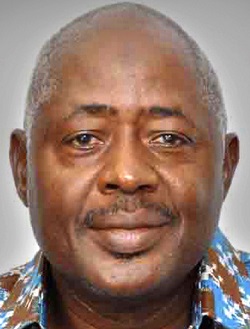
Since earning the last of his three Purdue degrees in 1998, Issoufou Kapran, BS ’85, MS ’88, PhD ’98, has worked tirelessly to develop a viable seed industry as a means of combatting food insecurity in his native Africa.
In his native country of Niger, Kapran has served as the senior sorghum breeder at the Institut National de la Recherche Agronomique du Niger (INRAN) to develop the country’s first commercial sorghum hybrids. He worked closely with several international partners, including INTSORMIL, ICRISAT, IITA, EMBRAPA-MS, and Cornell University.
In 2007, Kapran was promoted to his current position of program officer of the Program for Africa’s Seed System (PASS) for the Alliance for a Green Revolution in Africa (AGRA) with primary responsibilities for West Africa, operating from AGRA’s office in Ghana. The PASS program is active in 18 countries across Africa.
Which Purdue faculty member had the most profound impact on your professional career?
I came to Purdue in 1983 with a dream and to do something important. But I did not know what it was. I met a good number of people with warm hands in this city of cold winters, but two of them became special in my life: Gebisa Ejeta and John Axtell.
In 1985, I was introduced to Gebisa by Axtell, who had been Gebisa’s major professor. Gebisa and I connected almost immediately because of his simplicity and because he represented my dream of getting advanced knowledge and using it to solve the practical issues of African farmers. I swore to mimic his success however I could. Gebisa talked to me about research and took me to the Agronomy Farm to see his work. I quickly found that I wanted to do my thesis research under him. We talked about what he accomplished in the Sudan and what African scientists in general could do. I was extremely hungry for knowledge.
Gebisa taught me how to use sorghum as a breeding model, offering huge possibilities to make sorghum crosses, when in my memory sorghum was only a plant to harvest on my father’s farm back in Niger. When I returned to Niger with my master’s degree, Gebisa’s visit to my home country made me so proud that someone showed this kind of interest in my research project. He encouraged me to take hybrids to farmers, which, then was against the accepted wisdom in Africa, even among scientists. As Gebisa had done in Sudan, I became the first public breeder to release a hybrid in West Africa (in Niger). The professor gradually transformed into my mentor and my friend throughout my career.
John Axtell was already larger than life when I met him in 1985. He was a famous distinguished professor, but he talked to me like I was an old acquaintance, patiently listening to my seamless stories of African agriculture like I was teaching him something. His engaging conversations and his humility are still fresh in my mind. He spoke to all kinds of people like a simple man, which taught me the importance of generosity and humility.
The peculiarity of John Axtell was that he was a real educator for me and not just an academic teacher. He made me realize the world is larger than us and he always did it with a sense of humor. “There are other important professors at Purdue, other universities beside Purdue, other people who are not scientists, but all are important in society,” he told me. I remember looking at the old car he had driven to the Agronomy Farm and he laughed and said it is how one shows donors their money is going to research.
Amy Kelsay (Whitestown, IN | Distinguished Ag Alumni: 2017)
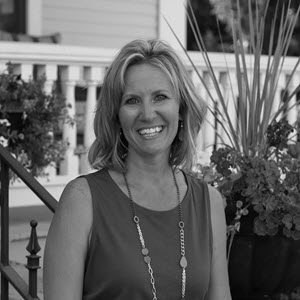
Amy Kelsay has given visitors of all ages the opportunity to visit a working farm and learn about dairy production. In so doing, she has impacted not just Kelsay Farm’s relationship with its community but understanding of agriculture statewide.
Kelsay grew up on a small hog and grain farm in southern Vigo County. “Coming up through 4-H, was there any other university than Purdue?” she asks. “I couldn’t wait to get there.”
She made the most of it, honing her communication skills as president of Sigma Alpha, Animal Sciences Ambassador, and the American Agribusiness Ambassador for Indiana while also working in Alan Sutton’s animal sciences lab and in the agriculture alumni office. Kelsay credits Mark Russell, professor of youth development and agricultural education, as a mentor and friend, as well as Ronald Lemenager, professor of animal sciences, Alan Grant, former department head of animal sciences, and Robert Taylor, retired professor of agricultural economics, among “so many great professors.” She also counts Craig Dobbins, professor of agricultural economics and her Sigma Alpha advisor, as a mentor.
When she married Joe Kelsay, member of a sixth-generation dairy farming family from Johnson County, other family members had well-established roles in the operation, while she was challenged to define her own. She discovered it in agritourism.
Kelsay was employed off site but enjoyed guiding area schoolchildren on field trips, which the farm had accommodated for many years. When parent chaperones and others expressed interest in bringing other members of their families to the farm, she persuaded her in-laws to open the farm to the public in 2007 on a trial basis. In the 10 years since, Kelsay has created programs that align with Indiana’s academic standards. The tour business has grown from 1,500 visitors in 2006 to nearly 24,000 in 2016. Kelsay promotes the tours through the farm’s website, www.kelsayfarms.com, Facebook page, YouTube videos, and Twitter. Amy and Joe have three children who are involved in local athletic and musical events as well as in 4-H and middle school FFA — perhaps paving the way for another generation in Purdue Agriculture.
“Our location 40 minutes south of downtown Indianapolis is surrounded by development. The tours have helped us embrace growth while introducing farming to our neighbors. As the city of Greenwood moves closer and closer, this has opened a whole new dialogue.”
2007-present Founder, Kelsay Farm Tours, LLC Director of Education, Kelsay Dairy Farm
2011 Purdue University Department of Animal Sciences Distinguished Alumna Early Career Award
2001-2005 Extension Educator, 4-H/Youth Development, Purdue University in Johnson County
2000-2001 Director of Marketing, Indiana FFA Foundation & Leadership Center
1999 MS, Agriculture and Consumer Economics, University of Illinois
1998 BS, Animal Sciences, Purdue University
1998 Oakley Ray Scholarship, Outstanding Agriculture Senior, Purdue University
1995-1998 Outstanding Freshman, Sophomore, Junior and Senior, Department of Animal Sciences, Purdue University
Peter J. Kennelly (Blacksburg, VA | Distinguished Ag Alumni: 2009)
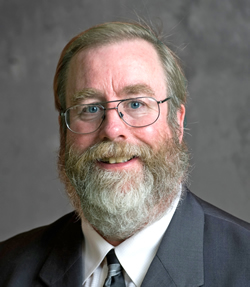
Peter Kennelly compares hisbiochemistry laboratory to a “milliondollarplayground, with all the very besttoys.” Within this invigorating arena, lifeis good for a researcher praised as anoutstanding scientist, colleague, teacher,and leader.Since establishing his independentresearch group at Virginia Tech in theearly 1990s, Kennelly’s innovative questshave focused on protein kinases andphosphatases—enzymes that contributeto the control of many aspects of cellularlife. Utilizing an unconventionalapproach, Kennelly’s research examinesprimitive organisms and the ways themodification of their proteins—acting asmolecular switches—mimics theirmammalian counterparts. Breakthroughsin his laboratories have implications foridentifying and remedying defectscontributing to diseases such as cancer.Kennelly came to Virginia Tech in 1989as an assistant professor in theBiochemistry Department and wasappointed Department Head in JanuaryHis leadership skills wereimmediately evident, with the addition offive faculty members and launch of twonew health-related focuses—insectbornediseases, such as malaria, anddrug targets for tuberculosis.A renowned expert in the area ofprotein kinases and an internationallecturer on the topic, Kennelly alsoco-authored ten chapters of the widelyused textbook, “Harper’s IllustratedBiochemistry,” and recently developededucational Web sites targeted tostudents preparing for biochemistry andmolecular life sciences careers.“I enjoy being part of science in thelargest sense of the word,” says Kennelly,“which means training future scientists.”His message, whether to students orcolleagues, is identical: Science is fun. Nowonder, then, that Kennelly’s laboratoryisn’t the only “playground” he enjoys.“I’m a model railroader and rail fan,”he says, “and I think it’s wonderful that ahobby I started as a ten-year-old is still alot of fun.”“The Department of Biochemistry at Purdueshaped me as a professional.The faculty and students constantly challenged menot only to learn and perfect my craft,but to develop a strong internal compass.”
Mark Kimmel (Modesto, CA | Distinguished Ag Alumni: 2006)
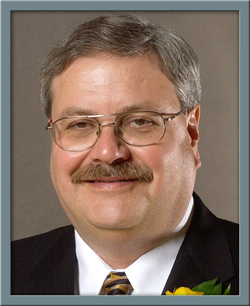
Combine basic ingredients: a corecurriculum focused on biology, foodchemistry theory, and hands-on learning.Add experience in quality control, foodproduction, research/development, andsales. Season with a refined palate andheightened olfactory skills. Mix well.Next, savor success.Each step of Mark Kimmel’s careermodels a “no-fail” method for mastery.Whether sampling red pepper-infusedtomato sauce with an Italian restaurantchef or assessing quality controlthroughout a twelve-hour productionshift, food safety ranks “job one.”“At the end of the day, I know I’vemade some good tomato products,” saysKimmel. “I’d eat them myself and servethem to my family, and that makes mefeel good about what I do.”It might seem a surprising journey foran animal sciences major. PurdueAgriculture did not have a food sciencedepartment during Kimmel’s tenure, butthe animal science core curriculum gavehim the tools he needed to leap into thefood industry — it has been a tasty ride.Kimmel’s responsibilities at StanislausFood Products, an independent, familyownedcompany that specializes in Italiantomato products for restaurants throughoutNorth America, encompass production,purchasing, quality control, research/development, and sales. During histenure, the company expanded from 600employees to 2,000; efficiency increasedby 30 percent; and capacity doubled. Heis responsible for sales volume increasesto multi-unit restaurant customersincluding Olive Garden restaurants andthe Papa John’s Pizza chain.While he “wows” the big names,another appreciative audience restsunder his own roof – his wife, Sharron,and daughters Christina, 23, and Lauren,“I cook Italian at least once a weekat home,” says Kimmel, who alsopractices diligently in the Stanislaus testkitchens. “I can whip up some prettyupscale, chef-requested sauces.”“Through the animal sciences program’s corecurriculum, I gained a wealth of knowledge aboutfood engineering, dairy, and horticulture.Professors — all experts in their fields — taught meto take basic theories and keep asking questions.”
Carl C. Kincaid (Indianapolis, IN | Distinguished Ag Alumni: 2014)
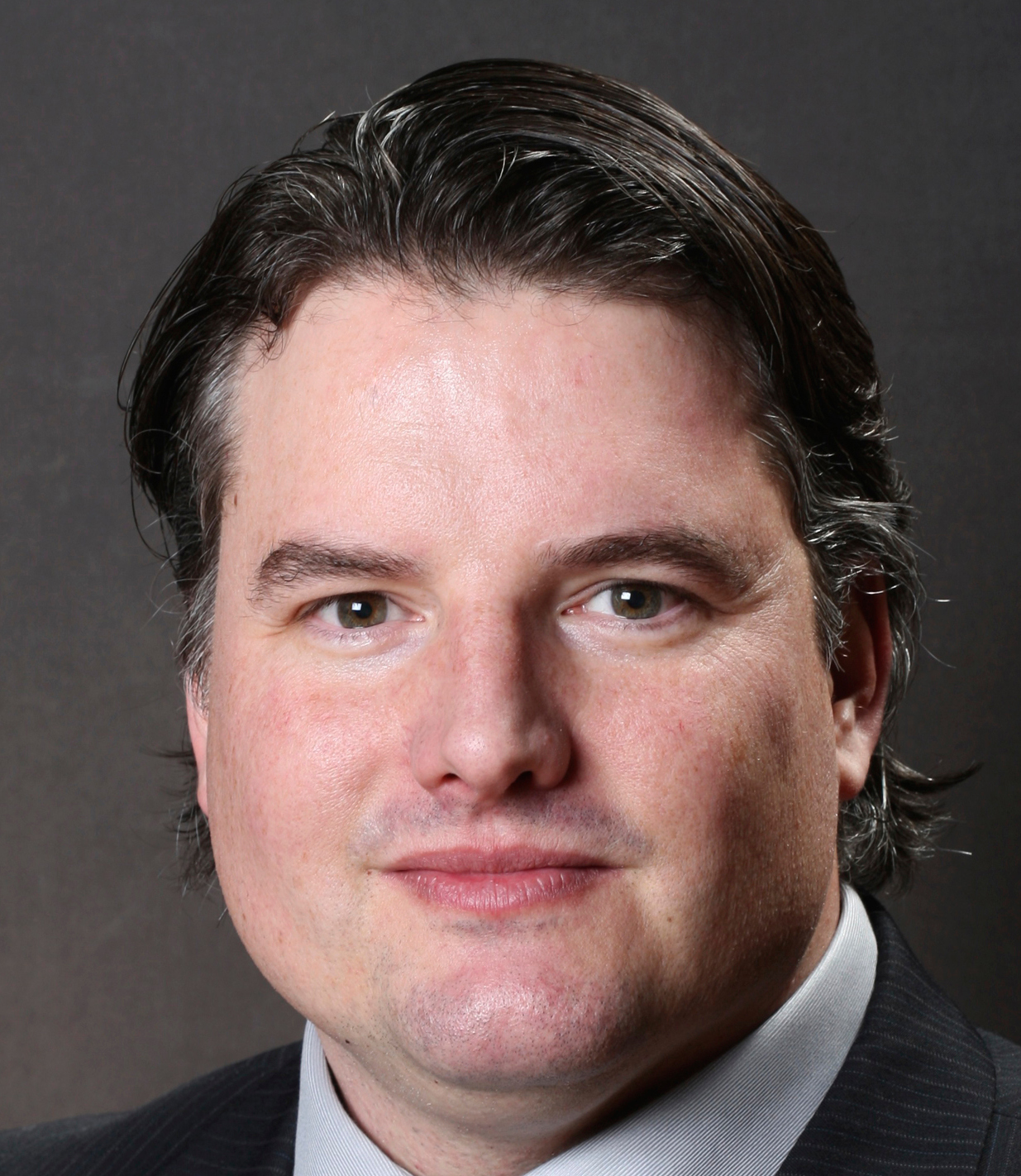
During his 14-year career, Carl Kincaid, B.S. ‘99, has been a project manager, lead designer, and principal-in-charge of a variety of projects, including parks, greenways, trails, urban streetscape improvements, and site designs on the Purdue campus, as well as projects throughout Indiana and the Midwest. Kincaid joined the landscape architecture firm of Rundell Ernstberger Associates (REA) in 2000 and became a partner in 2008. His projects include the Indiana Pioneer Village Gateway, 4-H Celebration Park, and the Department of Natural Resources Exhibit at the Indiana State Fair. He was the Deputy Project Manager for the Indianapolis Cultural Trail, an eight-mile urban greenway integrated into the urban infrastructure of downtown Indianapolis. But you don’t even need to leave the Purdue campus to see examples of REA’s work. REA is responsible for the landscape design surrounding Discovery Park and Pao Hall. He is currently working on the Purdue Integrated Bicycle and Pedestrian Master Plan for the West Lafayette campus. In addition, an estimated 10,000 drivers per hour will experience Kincaid’s innovative, artistic bridge design spanning Interstate 65 at state Route 39 in Lebanon, Ind., which is currently under construction. Through his career, Kincaid has remained dedicated to his alma mater. He is the chair of the Purdue Landscape Architecture Professional Advisory Council. He was an adjunct professor in 2007 and has returned to teach this semester. What do you miss most about your college days at Purdue? The flexibility with your time and the friendships with individuals are what I miss most - as well as the freedom to just be able to go outside to toss around a Frisbee with other students on the agricultural mall in front of the Horticulture Building on a warm spring afternoon, even when knowing that wasting the time would force you to be up all night working on a project due the next day. What was the most difficult course you took at Purdue? What made it so difficult for you? HORT 217 with Prof. Harrison Flint: plant identification. It was a rigorous class that had multiple tests each week with 20 different plant species. We had a plant identification test and a characteristics test in the Horticulture Building and a second identification test on campus where the plant material was growing - everywhere from the Purdue Mall to Horticulture Park. We were required to know and spell the scientific Latin names of each plant even though none of us had ever studied the Latin language. Points were deducted for misspelled scientific names and this proved to be a great challenge. What is the best advice you got while you were at Purdue? Who gave you the advice? When I was a student we had to make the cut into the Landscape Architecture Program after our sophomore year. The program only accepted 2 5 students. If you weren’t good enough, you couldn’t get into the program. I was considering transferring out of Landscape Architecture because I wasn’t sure I could make the cut. I considered landscape horticulture and design. Prof. Gene DeTurk said, “Do not give up on your dreams because of the challenges that lie before you.” I made the cut and earned my degree. Had I switched, my career track would have been dramatically different than it is today. It would have meant working for a landscape contractor and not owning a design firm that has worked on world-class projects like the Indianapolis Cultural Trail. What is the best advice you have ever given? To whom did you give the advice? I have been fortunate to return to campus many times over the years and I always encourage the students to be passionate about design, but I caution that in design there is a fine line between passion and arrogance.
Anthony Klemm (Des Moines, IA | Distinguished Ag Alumni: 2019)
From his roots in Iowa, where his family still farms and where he served as a state FFA officer, Tony Klemm has emerged as an industry player — the portfolio leader of a worldwide corn enterprise influencing and advancing the global corn industry. In his position with Corteva AgriScience, the agriculture division of DowDuPont, Klemm leads teams looking for new ways to develop seed technology for farmers. He has cross-functional responsibilities with key parts of the organization, including commercial leaders around the world, operations personnel growing the seed crop, and research and development teams. Klemm’s sensible approach to problem solving makes him a team builder across these different functions. Peers describe him as performance-driven, collaborative and innovative. In his 25 years of delivering on global, financial and operational goals at Dow AgroSciences and now as a leader in one of the world’s largest agricultural companies, he also has adapted to the many changes occurring in agriculture, especially in biotechnology. Such skills were critical when Dow AgroSciences tapped him to help develop and market the Enlist™ Weed Control System, an innovative seed trait and herbicide system to address the growing challenge of resistant weeds in corn, soybeans and cotton. It is now successfully being launched across the Americas. He then was asked to help build Dow’s global corn business, leading it to a $1 billion enterprise. This meant leading a team of diverse geographies to compete with industry leaders through innovation, creativity and customer focus. His ability to reach positive outcomes proved especially useful during the 18-month merger process for The Dow Chemical Company, Pioneer and DuPont as they became Corteva AgriScience. Klemm has been involved in the American Seed Trade Association and has served the cotton industry in a variety of leadership roles. He and his wife Andrea Klemm (’95, agricultural economics) have three sons and are also lifetime members of the Purdue Alumni Association.
Chris D. Knight (St. Charles, MO | Distinguished Ag Alumni: 2009)
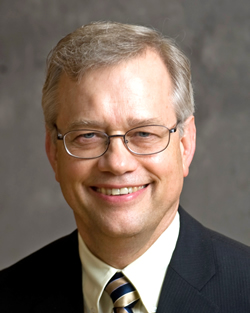
There’s a compatible continuumrepresented by the research andbusiness development projectsspearheaded by Chris Knight—one thatstarts with feed supplements animalproducers use to promote healthy stock,and stretches to our economy,environment and, ultimately, our homes.As Vice President of Research andDevelopment for Novus International,Inc., Knight develops innovative feedproducts and improves the predictabilityof their responses among a wide rangeof farm animals. Previously employed asa researcher for Monsanto, Knight joinedNovus in 1991 and quickly expanded thecompany’s research to include productdevelopment in dairy cattle and swine.Among his most significant achievementswas a research breakthrough showingthat Novus’ ALIMET® Feed Supplementwas the single most cost-effective sourceof post-ruminal methionine—a nutrientcritical to the good health of lactatingdairy cattle. Knight’s success resulted ina U.S. patent and a new RuminantBusiness Unit. Today, this businessrepresents about $700 million annually.Knight is credited with building Novus’international technology foundation—leading the diversification of thecompany’s portfolio from severalproducts to over 70; increasingemployment from 150 to 500 people;and establishing research/developmentoperations in 80 countries.“The opportunity to transform ourcompany through interactions aroundthe world is often daunting,” says Knight.“But we focus our efforts according toour customers’ challenges, which arefood safety, animal welfare, andenvironmental protection.”In research, Knight aims for an85–90 percent benefit predictabilityresponse. But in his own kitchen, thepercentage rarely misses 100. Asdesignated chef, Knight spends“ridiculous amounts of money makingdifferent kinds of recipes”—all inpursuit of a favorite hobby and a familyfriendlyfood chain.“The breadth of experience provided by Purdue had themost significant impact on me, and still connects towhat I’m doing today—facing new research challenges,and finding the people to help solve them.”
Lisa Koester (Wadesville, IN | Distinguished Ag Alumni: 2013)
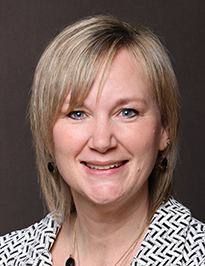
Lisa Koester, B.S. 1994, is an implementation leader/moderator for Beck Ag and part-owner of Koester Brothers Farms, Inc., headquartered in Wadesville, Indiana. At Beck’s Ag, Koester has helped engage more than 1 million agricultural professionals in customized peer-to-peer and expert-to-peer dialogue-driven strategies. Koester works with clients on an individual basis to develop customized experience-sharing marketing solutions that are tailor-made to fit the clients’ needs in the marketplace. 1994 B.S., Agricultural Economics and Agricultural Communication, Purdue University1994-present Part-owner, Koester Brothers Farms, Inc., Wadesville, Indiana 1994-1998 Chemical Sales Specialist, Ciba/Novartis/Syngenta Crop Protection 1997-2001 Board of Directors, Purdue Agricultural Alumni Association 1999-present Implementation Leader/Moderator, Beck Ag 2003-2004 Dairy Farmers of America YC committee 2004-2005 American Farm Bureau Young Farmers & Ranchers Committee 2007-2010 Advisory Board Member, U.S. Representative Brad Ellsworth 2007-2012 U.S. Secretary of Agriculture Committee on Beginning Farmers and Ranchers 2011-present Dean’s Advisory Council, Purdue College of Ag
Barb Ariel Kohn (Watertown, MA | Distinguished Ag Alumni: 1999)
Barbara Jackson Kohn earned a bachelor’s of science (Cum Laude) in Biochemistry from Purdue University in 1979. She is currently Vice President of Vicam L.P., an agricultural biotechnical company providing test kits used to evaluate the safety of foodstuffs and agricultural commodities. Here are some of her thoughts on education, career, and life: On coming to Purdue: “While I was still in high school, I was invited to attend a National Science Foundation training program at Purdue. That summer, I fell in two puppy loves-one with another participant and one with science. My love for science has grown and endured.” On how Purdue influenced her career: “My experiences at Purdue inform my work, that’s why I’m in a biotech company, and why I’m effective. Purdue taught me a reverence for agriculture. It taught me how privileged we are to live in a region of the world that has some of the greatest agricultural richness and the importance of safeguarding the land. “Often, people I work with are interested in my educational background, and usually they are much more impressed with my Purdue degree than my Harvard degree.” On people who influenced her: “T.K. Hodges was the Purdue professor in charge of that summer science program for high schoolers. It was because of that program that I came to Purdue. In that program, I was privileged to work with Dr. Shue-lock Lam in the Department of Horticulture. And once I got to Purdue, two Biochemistry professors stand out in my memory, Klaus Herrmann and Karl Brandt. Dr. Herrmann offered me a job in his biochem lab, and it means as much to me as I think back on it as it did the day he offered me the position. That lab job gave me early experience and got me involved in science and research, which I am doing to this day.” On career rewards: “This career rewards me in several ways: it makes me feel that I’m able to make a difference, because all of us eat food and need safe food, and I’m making a significant impact on human health. I’m also rewarded by the fact that I can do this in concert with people I care about and other people who share the same view of its importance that I do.” On philosophy of life: “My philosophy of life is based on the Jewish concept Tikkun Olam, which says that one of the purposes people have in life is to help to bring the world into balance and make it better, and in that sense people become partners in creation and the flow of life. Each person has a unique gift to offer and mine comes in part through this work. After I invented the kit for Listeria, a person said to me, ‘You’ll never know how many lives you have saved.’ I experienced a lot of senseless violence in my childhood and this work is the antithesis of that.” On her hopes for the future: “On a personal level, I hope to continue to be in a position where I can contribute. One of the things I remember at Purdue was when I was a freshman the Dean of the Agriculture School said to us that many people had sacrificed to enable us to attain the education we were embarking on and we owed it to these people to use this education well. I liked that view and I want to continue to contribute because I had the privilege of education that allows me to serve well.” Her favorite Purdue memory: “I loved watching experiments unfold in labs. There’s an art to developing a test kit or diagnostic device. It’s exciting to watch something go from an idea on paper to a product. It’s challenging and creative to work together as a team to get to the goal.” Highlights/Kohn Education B.S., Biochemistry (Cum Laude), Purdue University, 1979 Ph.D., Biological Chemistry, Harvard University, 1984 MIT, Postdoctoral Fellow, 1984-1989 Career Vicam L.P., Watertown, Massachusetts Vice President (1997-present) Director of Research and Development and Chief Scientist (1994-1997) Director of Microbiology (1992-1994) Director of Pathogen Research (1990-1992) Boston Biomedical Research Institute Principal Investigator (1990-1992) Visiting Staff Scientist (1989-1990) Honors and Associations American Association for the Advancement of Science American Management Association Association of Official Analytical Chemists International Family Dr. Kohn remembers being told that if she went to Purdue she’d marry an engineer. She met Phil Temples at Purdue and he has a B.S. in Electrical Engineering. They were married at University Church in West Lafayette, and in May they will be celebrating their 21st wedding anniversary. Phil works at Harvard with the computer systems. Display quote/ Kohn “I’m proud to be a Purdue graduate. Often people I work with are interested in my educational background, and usually they are much more impressed with my Purdue degree than my Harvard degree.”
Nancy E. Lange (Distinguished Ag Alumni: 2012)
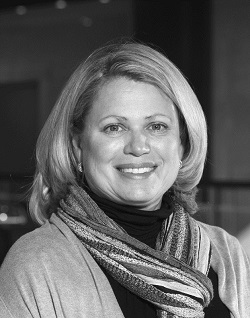
Nancy Everett Lange began her 30-yearcareer with Eli Lilly and Company in 1981as a sales representative for agriculturalchemicals with its Elanco division. She hasadvanced through management positionsthat reflect both her scientific knowledgeand expertise in human relations. Today,as senior director of global recruiting andstaffing, she leads the company’s humanresources recruitment activities. Currentlyshe and her team are supporting recruitingefforts in many of the 125 countries whereLilly has business.Lange grew up in Indianapolis,unconnected in any way to agriculture.At age 12, she boarded a bus to TiptonCounty, thrilled that the $1 hourly wagefor detasseling corn was double herbabysitting income. She would detassel cornfor the next 10 years, becoming a crew bossand paying for college with her earnings.She also became interested in hybridcorn, so when it was time to declare amajor at Purdue, Lange chose Agronomy,not entirely sure what it involved. Shediscovered she enjoyed the subject,worked as an undergraduate researchassistant and was named OutstandingSenior Woman (now the Flora RobertsAward) when she graduated in Soil andCrop Management.Lange was responsible for Lilly’s U.S.recruiting and staffing until she was givenher current, global assignment in 2010.Roughly half of her years at the companyhave been in human resources, but she hasmoved back and forth between thebusiness and HR. “Working in discovery,development, regulatory, and medical —this helped me to understand the biggerpicture of the company,” she says. “I sawthe value chain of the products. I amfamiliar with many divisions of thecompany, which has been a benefit to me.”Lilly recognized her outstanding leadershipin 2000 with the highest honor given to anemployee, the Chairman’s Ovation Award.Lange and her husband Thomas havethree children, two of whom are Purduegraduates. She also is active in theirchurch, and her tutoring at a localelementary school has led her to furthersupport a family for whom English is asecond language.
Jane L. Lavey (Anderson, IN | Distinguished Ag Alumni: 2017)
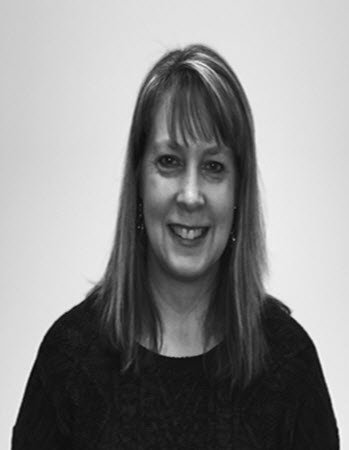
Jane Lavey manages Nestlé’s food safety program in an era of changing regulation and increased public scrutiny. She leads the team responsible for Hazard Analysis and Critical Control Points (HACCP), and the systematic and science-based approach for assessing and controlling or eliminating all food safety hazards. She also manages quality-training programs and investigates consumer complaints.
Lavey grew up in a family of teachers in Louisville, Kentucky. Because she excelled at math and science, she was encouraged to explore a career in engineering, and Purdue’s reputation attracted her to West Lafayette.
Food process engineering turned out to be the right match for Lavey’s affinity for chemistry. Faculty members who influenced her career path included agricultural and biological engineering professors Bernie Tao, Michael Ladisch, and Martin Okos.
Lavey served as president of the student chapter of the American Society of Agricultural Engineers and was active in Zeta Tau Alpha sorority. The social opportunities available at a Big Ten school, in addition to “an excellent education from excellent professors,” made her Purdue experience a positive one, she says. She regularly returns to campus to offer professional insight to ABE students and faculty, and is called on to speak to high school students about engineering as a career.
With knowledge gained from steadily increasing responsibilities in quality control, training, and safety at Eli Lilly and Company and Fisher Clinical Services, Lavey came to her current position at Nestlé in August 2012. Her longstanding commitment to quality control and food safety is personal: “The thing that drives me is the idea that somebody in your family is going to be consuming what you’re manufacturing or producing. I want to have an impact on that.”
Lavey has two children who are adopted from China and is active in the Indianapolis group, Families with Children from China (FCC). She leads her daughter’s unique Girl Scout troop of girls adopted from China, which developed from FCC and incorporates Chinese culture into its programs. She also is an avid cyclist who has completed the one-day, 160-mile Ride Across Indiana five times.
“In visiting high schools, I’ve been surprised that girls who are good in math and science are often pushed toward science, not engineering. They don’t realize there are a lot of different job opportunities — that you can take the thought processes and problem-solving into many areas.”
2012-present Food Safety and Compliance Specialist, Nestlé
2010-2012 Fisher Clinical Services Quality Assurance Representative, 2011-2012 Associated Consultant, Clinical Trial Supply Operations, 2010-2011
2008 Product R&D Operations Group Achievement Award, Eli Lilly and Company
2002 Outstanding Alumna Award, Department of Agricultural and Biological Engineering, Purdue University
1992-2010 Eli Lilly and Company Associate Consultant, Clinical Trial Supply Operations, 2008-2010 Senior Quality Standards Associate, 2003-2008 GMP Quality Control Improvement Team, 2002 Assistant Senior Quality Assurance Representative, Elanco Animal Health and Bulk Pharmaceutical Manufacturing, 1998-2003 Technical Services Representative, Animal Health Manufacturing, 1992-1998
1992 BS, Food Process Engineering and BS, Biochemistry, Purdue University
Kay A. Lawton (Durham, NC | Distinguished Ag Alumni: 2018)
As an undergraduate, she majored in Recreation Resources Management. She pursued a master’s degree while majoring in Ornamental Horticulture and Floriculture Physiology. Her PhD thesis at Purdue University was on “Gene Expression and Regulation During Carnation Flower Senescence.” But biotechnology is where Kay Lawton has made her mark. Her unique abilities and research discoveries have spanned medical and agricultural fields. Her work on natural disease mechanisms in plants is seminal, her accomplishments to science and industry are far-reaching, and her contributions to human health and wellbeing touch lives across the globe. She rose through the ranks at Syngenta Biotechnology Research Inc. to become Principal Scientist and Global Team Leader. Lawton managed genomics discoveries to improve disease resistance, increase crop protection and enhance crop production. She’s been at Metabolon Inc. in North Carolina since 2005, currently as Vice President of Intellectual Property. Lawton is a co-inventor on 50 issued/ pending patents including methods for determining insulin sensitivity with biomark- ers, metabolomics profiling of prostate cancer, biomarkers for monitoring insulin resistance and impaired glucose tolerance, biomarkers for amyotrophic lateral sclerosis (ALS), methods for breeding disease resistance into plants, and plant-derived pathogen, root-specific, and chemical- induced promoters. Her discoveries have had significant impact and have led to the commercialization of several products, such as tests for insulin resistance (Quantose IR) and glucose tolerance (Quantose IGT). The development of Quantose IGT provides a novel and easy method to identify impaired glucose tolerance using a single fasting blood sample. The much simpler test could curtail the onset of type 2 diabetes and cardiovascular disease. Quantose IR is the first and only clinically developed and validated laboratory developed test (LDT) to measure insulin resistance.
Mark H. Legan (Coatsville, IN | Distinguished Ag Alumni: 2005)
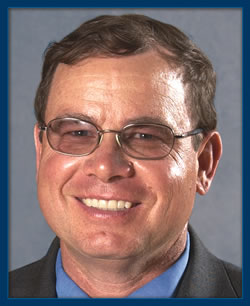
Can a young couple who don’t ownland build a successful agriculturaloperation? In 1989, Mark and PhyllisLegan decided to find out. Theyapproached long-time friends who had“an old set of hog facilities,” establisheda 180-sow herd and started working,side-by-side.“I either had to do it or I’d wonder mywhole life if I could,” says Mark Legan,who was 29 at the time and giving up aseven-year Extension educator career forhis dream.Today, the operation employs anotherfour, owns 1,000 acres of cropland and700 sows that produce about 15,000pigs a year.The Legans mark their success as anachievement. “We’re a first-generation,startup farm, and we’ve grown it to aviable size and, at least to this point,we’re maintaining it from a financialstandpoint,” Mark says.Their success, though, has not been atany cost. “We are part of and proud ofour community,” he says. “We recognizethat pigs stink, so we do what we can tominimize odor and manage properly.”They’re also both involved incommunity service. Mark’s serviceincludes his church, Farm Bureau, thecounty board of zoning appeals and fairboard, and currently he serves as theagricultural representative on Indiana’sDepartment of EnvironmentalManagement water pollution controlboard. “An important part of who we areand what we do is being involved in thecommunity,” he says.Like their business, the Legans sharea common activity that includes theirdaughter, Beth. “We like trail riding andhorse camping,” Mark says. “We enjoya business with animals, and ourpleasure is with animals as well. We ownquarter horses, and my wife adopted amustang. It’s something we do togetheras a family.”“I agree with Abraham Lincoln’s view ofagriculture as a ‘profitable and agreeablecombination of labor and thought.’Farming gives me the opportunityfor physical as well as mental work.”
Donald J. Leopold (Syracuse, NY | Distinguished Ag Alumni: 2014)
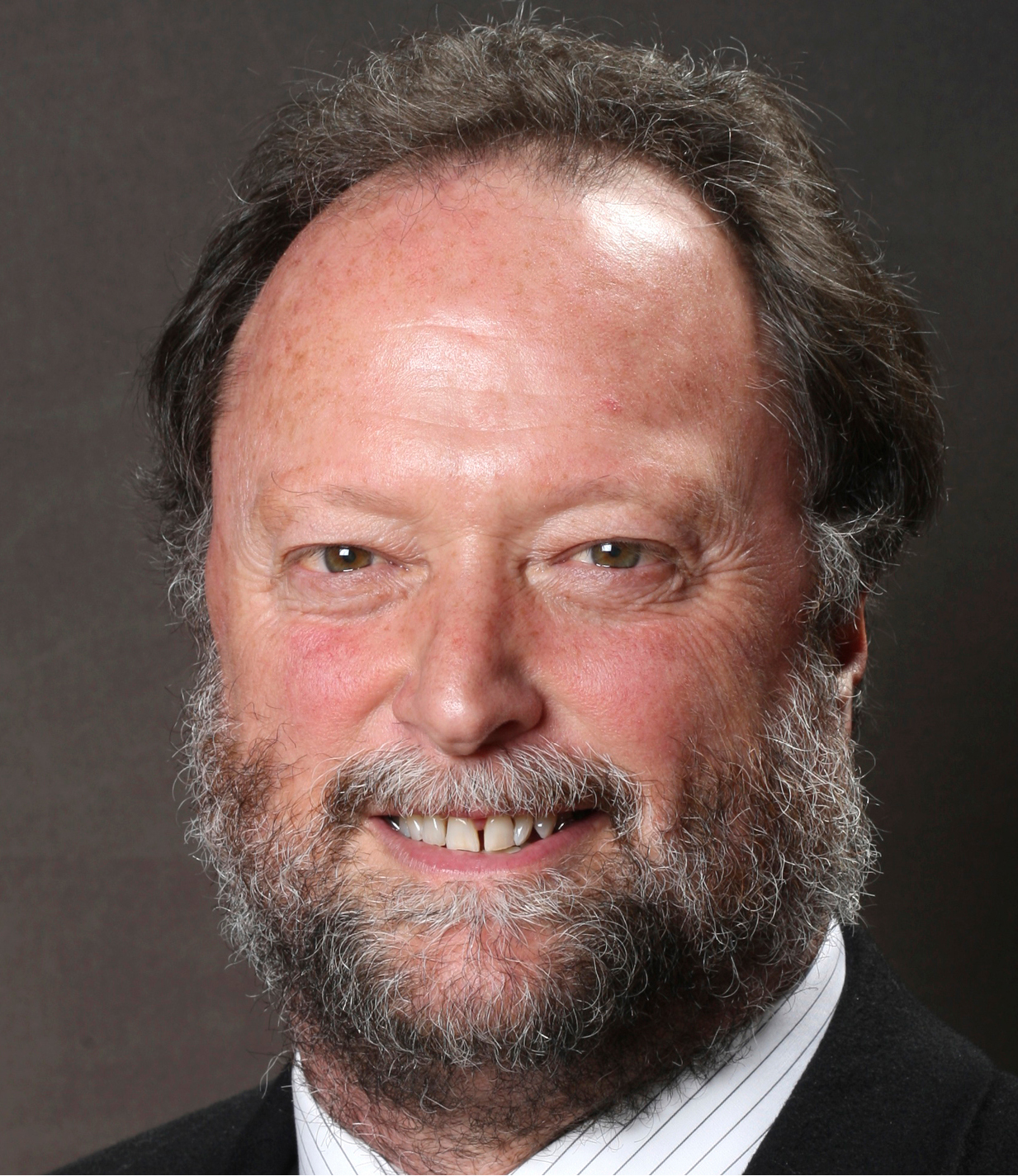
Don Leopold, Ph.D. ‘84, is a distinguished teaching professor and chair of the Department of Environmental and Forest Biology at the State University of New York-College of Environmental Science and Forestry in Syracuse, NY. “He is recognized as a distinguished teacher through his dedication to teaching both undergraduate and graduate students while advancing our scientific understanding of ecological processes within forests and wetlands of the northeastern United States,” said his nominator, Rob Swihart, head of Purdue’s Department of Forestry and Natural Resources. Leopold has produced six books, more than 60 publications in refereed journals, and 12 publications in proceedings describing numerous factors that influence ecological processes within northeastern forests. Under his direction, more than 60 graduate students have completed their theses or dissertations and he has served as principal or co-principal investigator on more than $30 million in grants to support his research program. Which Purdue faculty member had the most profound impact on your professional career? George Parker, a forestry professor and my major professor, had a significant impact on my career track. He always treated me like a colleague and never suggested that anything wasn’t possible (even if he might have thought otherwise). Why did you select Purdue as the place to continue your education? Purdue provided me an opportunity to assist with instruction in dendrology, which I had experience with from the University of Kentucky. Additionally, I was aware of the very strong academic reputation of Purdue, which I thought was so important for a doctoral degree. Where was your favorite place on campus to study? I spent most days and nights in my office at the department, often talking about science, politics, etc., with other grad students in my office and adjacent offices. Were you a good student when you were at Purdue? Not in the sense of having an outstanding grade point average, but I was intensely interested in my subject material and spent most waking moments thinking about forest ecology, trees, and related topics. What was the most difficult course you took at Purdue? What made it so difficult for you? I avoided calculus until I had to take it in my Ph.D. program. I was so proud when I earned an 87% on the first exam, until I found out that this grade was curved to a C-. During my very first semester, I understood just how tough courses would be at Purdue. What is the best advice you got while you were at Purdue? Who gave you the advice? It wasn’t necessarily advice but I’ll never forget Dr. Parker telling me after he gave a talk to a large audience at a national professional society meeting that he still got very nervous before each talk. I often think of his admission before some of my dozens of talks each year. What is the best advice you have ever given? To whom did you give the advice? I often tell many of my advisees who are contemplating graduate programs that they shouldn’t be so consumed by the idea that a specific graduate research project will define their careers for life. Purdue prepared me for pursuing so many different interesting projects. I couldn’t be any happier with the foundation I earned at Purdue.
Scott Lineback (Omaha, NE | Distinguished Ag Alumni: 2013)
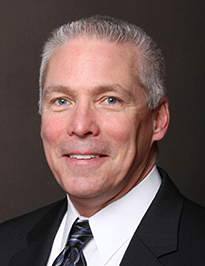
Scott Lineback, M.S. 1989, Ph.D. 1994, is the vice president of process innovation at ConAgra Foods in Omaha, Nebraska, where he leads a team focused on identifying, evaluating, and commercializing new process technologies. Before that, Lineback held a number of leadership positions with industry giants such as Tropicana Products, PepsiCo, Barilla America, and Nestle Foods.
1987 B.S., Chemical Engineering, North Carolina State
University
1989 M.S., Food Science, Purdue University
1994 Ph.D., Food Science, Purdue University
1994-1996 Process engineer, Nestle Research and
Development Center, New Milford, Connecticut
1997-1998 Senior Process Engineer, Nestle Research and
Development Center, New Milford, Connecticut
1998-2003 Tropicana Process Engineering, Bradenton, Florida
Senior Engineer, 1998-1999
Manager, 2000-2003
2003-2009 PepsiCo, Barrington, Illinois
Senior Manager, Hot Fill Packaging Technical
Services, 2003-204
Senior Manager, Gatorade/Propel Product/Process
Development, 2004-2007
2009-2010 Vice President, Research and Development, Quality,
and Food Safety, Barilla America
2010-present Vice President, Process Innovation, ConAgra
Foods, Omaha Nebraska
Mauricio Antonio Lopes (Brasilia, Brazil | Distinguished Ag Alumni: 2014)
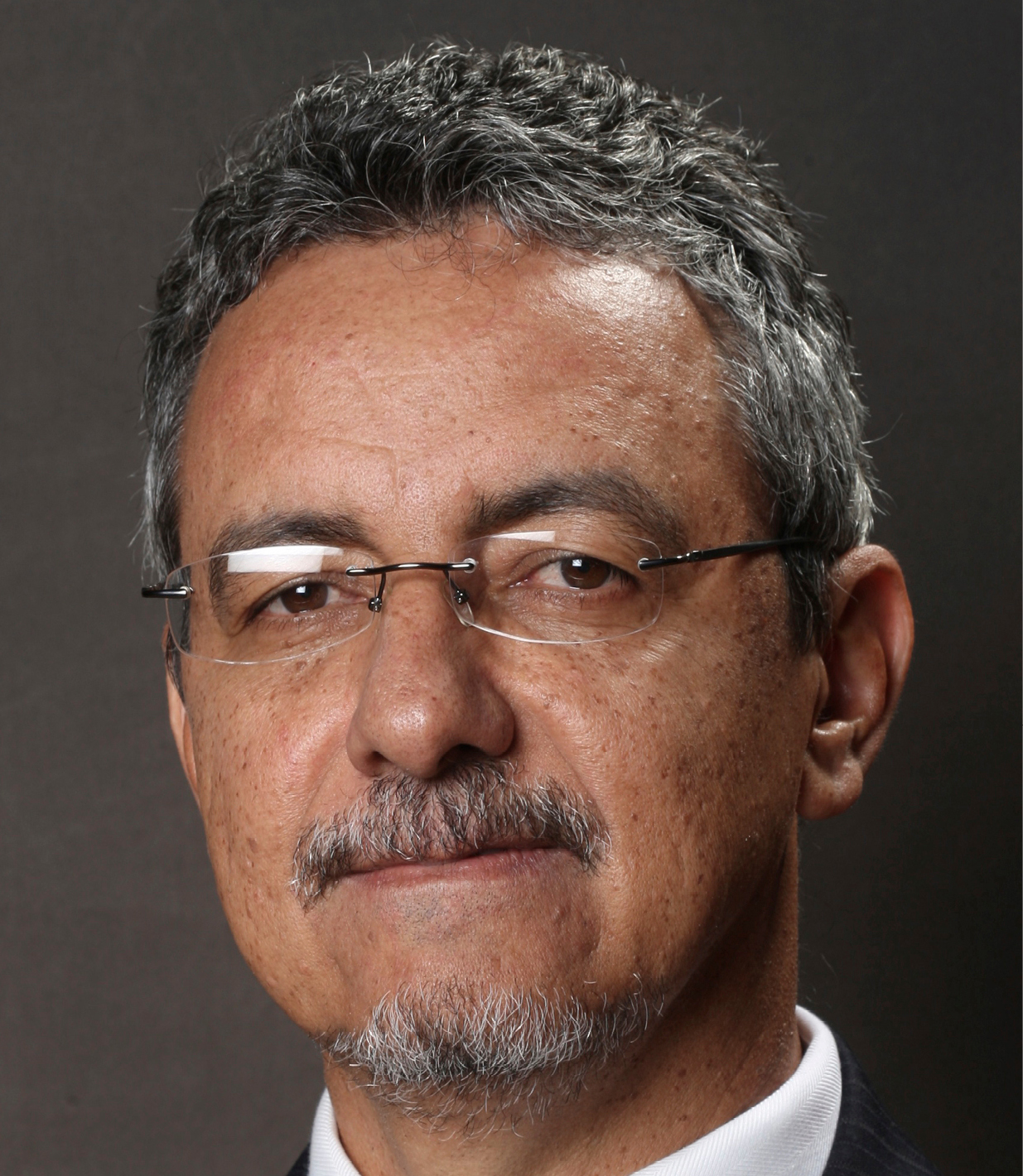
Mauricio Antonio Lopes, M.S. ‘89, is president of EMBRAPA, the Brazilian agricultural research organization with 9,342 employees, 2,282 researchers, and an annual budget of $1.1 billion. As research director, Lopes introduced a new management model for research projects focusing on teams assembled around core themes. The success of the model resulted in Lopes being appointed Head of Research and Development at EMBRAPA, the national agricultural research corporation of Brazil, in 2000. A plant geneticist by training, Lopes’ major scientific contributions include the development and release of new varieties and improved maize germplasm for tropical areas. “The research he completed as a graduate student at Purdue made important contributions to our knowledge of how different storage proteins are synthesized and packaged in the maize kernel, a critical source of protein for both humans and animals,” said his nominator, Peter Goldsbrough, head of Purdue’s Department of Botany and Plant Pathology. Why did you select Purdue as the place to continue your education? I had received my B.S. degree in agronomy from a Brazilian university that has very close ties to Purdue. Many of its professors and administrators received their degrees from Purdue. Also, the founder and former president of my organization, EMBRAPA, received his Ph.D. from Purdue, as did many colleagues I met during the early phases of my career in Brazil. All of them spoke very proudly of their experience attending graduate school at Purdue. Their admiration was decisive in guiding me to choose Purdue to continue my education. What do you miss most about your college days at Purdue? Graduate school is about taking a deep dive into something. Having a chance to choose an interesting problem and to perform research and to critically analyze the different dimensions of that problem and implement successful courses of action was something special at that early stage of my graduate training. I also had the opportunity to experience a healthy research group environment and an effective relationship with my advisor. That experience had an impact on my training and in my professional life. Learning to work in a large research group, with several graduate students and post-docs - all of whom are extremely talented, motivated, and highly competitive - was a big challenge and also a very rewarding experience. What was the most difficult course you took at Purdue? What made it so difficult for you? Biology 520. Complex reasoning and interpretation were valued in that class, not so much black and white-type answers. Being a foreigner, the language barrier had me at a disadvantage when elaborate arguments and answers were required in quizzes and tests. I studied very hard and even entertained an illusion of getting an A. I admit I was hugely disappointed when I learned that I had received a B in that course. What is the best advice you got while you were at Purdue? Who gave you the advice? Confidence is a key to success in whatever we undertake. Prof. Larkins always tried to make us feel confident, energized, and excited about the work we had to do. He never stated it as advice, but I interpret his attitude, support, and encouragement as the best “advice” I have received in grad school: “Trust yourself, be creative, and follow your impulses.”
Jeffrey M. Luckman (Newport News, VA | Distinguished Ag Alumni: 2005)
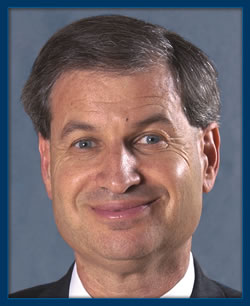
At a young age, Jeffrey Luckmanlearned one of life’s key lessons as heworked alongside his father, a comptrollerin the meat wholesale business: Workhard; give back; and you’ll succeed.You’ll grow along the way, too.A native New Yorker, Luckman took hisfirst big step when he left the east coastfor Purdue, drawn by the university’sreputation in veterinary medicine andagriculture. “My parents taught me to actand think independently,” Luckmanrecalls, “even when my choices took mefar from home.”Learning the production side throughvolunteer work on a hog farm and hisfirst job as district sales manager forDeKalb Swine Breeders were part of thematuring process, and helped honeLuckman’s professional path — one thatcombined a love of animals, an interestin genetics and animal science, andstrong people skills.After seven years in sales, anddistinction as the top breeding stocksales representative in Indiana, Luckmanembraced a new challenge. Hisaccomplishments in the livestockprocurement arena—first with Kahn’s,then John Morrell & Company and,presently, Smithfield Foods—havefocused on production, research, sales,and management.Throughout his tenure as vicepresident for livestock procurement forSmithfield Foods, Luckman hascontributed significantly to the company’sgrowth, from $1 billion in annual salesten years ago to $10 billion in 2004. Heis responsible for three domestic andthree foreign subsidiaries and is creditedwith taking Polish subsidiary Animexfrom near bankruptcy to profitability inPrograms developed by Luckmansignificantly enhanced the success andexpansion of Polish hog suppliers.Throughout the journey, Luckman hasalways remembered his father’s formula.Rewards, he says, have been reflected inhis growth, and the advancements of others.“The education and knowledge Purdue providedhas enabled me to make lasting contributionsin business - nationally, internationally,and in my community. I hope to give back toPurdue as much as the university gave me.”
Albert E. Lund (Wilmington, Delaware | Distinguished Ag Alumni: 2003)
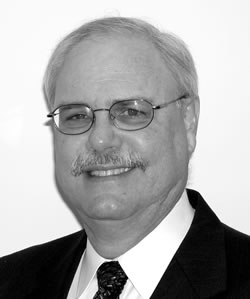
Albert Lund will tell you first-hand: It’s a bug-eat-bug world out there.
He learned the lesson early in life from a first-generation naturalist, his late father Horace Lund, former head of entomology at the University of Georgia. The pair spent many weekends hiking and camping in favorite spots such as North Carolina’s Pisgah National Forest. They’d head in different directions, collect insects for hours, and then reunite at “base camp” for microscopic looks at their finds and discussions of each insect’s adaptations.
“Dad taught me the power of observation and the ability to train my eye to see what others don’t see,” Lund says. “It’s a real jungle out there, and a fascinating, natural drama is always unfolding.” Through his father’s eyes, Lund learned to appreciate not only nature’s panoramic beauty—mountain meadows and deciduous forests—but also intricate snapshots of the natural world—a beetle’s tenacious fight against an anthill or a shrew’s rapid respiration rate, a stress reaction to its low level on the food chain.
“In many ways, Dad’s interest in nature started me in biology and led me to entomology,” he says.
Avid campers, Lund and his wife Rea, also an entomologist and Purdue graduate, have passed on the powers of natural observation to their sons, Timothy and Wesley. And, as was true decades ago, father and sons have recorded memorable adventures.
“There was a hurricane off the East Coast the same weekend Timothy and I were camping in West Virginia,” Lund recalls. “The storm was predicted to move out to sea, but instead it changed direction, backed up, and dumped torrential rain on West Virginia. We spent the whole time bushwhacking over steep terrain to avoid the rising rivers.
“In general, I prefer a much less athletic approach to the outdoors!”
1972 B.S., Entomology, University of Georgia
1974 M.S., Entomology (Physiology), Purdue University
1974 Pi Kappa Phi, Purdue University
1975-1977 David Ross Research Fellow, Purdue University
1978 Ph.D., Entomology (Physiology-Toxicology), Purdue University
1978 Grass Research Fellow, Marine Biology Laboratory, Woods Hole
1978-1980 Post-doctorate, Neuropharmacology, Northwestern University Medical School
1978-1980 NIH National Research Service Award, Northwestern University Medical School
1980-1983 Research Biologist, DuPont
1983-1984 Group Leader, DuPont
1984-1987 Research Supervisor, DuPont
1987-1989 Supervisor, Insect Control Group of Discovery, DuPont
1989-1991 Network Plans Manager, DuPont
1991-1993 Research Manager, DuPont
1993-1999 Insecticide Technology Manager, DuPont
1999-present Manager, Research and Development Asia- Pacific, DuPont
2002 Agriculture & Nutrition Research Accomplishment Award, E.I. DuPont de Nemours
“Professors and mentors at Purdue demonstrated the power of a disciplined scientific thought process. From these masters, I learned to frame and approach research problems and to thoroughly enjoy hunting for the truth behind the problem.”
John Madia (Carmel, IN | Distinguished Ag Alumni: 2007)
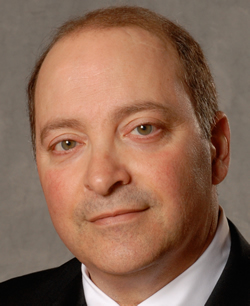
Home runs have long been on John Madia’s mind — from his Purdue baseball scholarship days to his nearly 30-year career with The Dow Chemical Co., and even today’s pastime, Indiana Bulls youth baseball. The story began in his hometown of Utica, New York, when a Boilermaker alumnus spotted him on the baseball diamond and talked about Purdue. Growing up in a family that bred racehorses, Madia had long been interested in animal science; early on, he traveled with his father, who was a representative for animal health companies. His interests were a good fit for Purdue, on the field and in the classroom. He graduated in 1978, and immediately signed on to work for Dow, where he has been ever since. “Dow provided me an opportunity to have many different careers in the same company,” Madia says. He has held posts with ever-increasing responsibilities in sales, marketing, development, Six Sigma implementation, and human resources, working in New York City and Rochester, N.Y.; Minneapolis; Midland, Mich.; Philadelphia; and since 1990, Indianapolis. “I’ve had opportunities to travel, to meet people all over the world and to work in the company’s global functions,” he says. “Those are experiences no one can take away.” Today, as vice president of human resources, Madia is the global focal point for manufacturing and engineering, research and development, shared services, and human resource information technology. Outside work, the father of four is devoted to two youth organizations, serving board posts for the Indiana Bulls Baseball Organization and the national FFA Foundation Sponsor’s Board. While he’s no longer spending time in the dugout, he is often in the bleachers, rooting as his children compete in various sports. “The people at Purdue always had great expectations for me and other students. They taught that way, talked that way, counseled that way. Because of that, I approached the work world with a high degree of confidence.”
Paavo Makinen (Helsinki, Finland | Distinguished Ag Alumni: 2011)
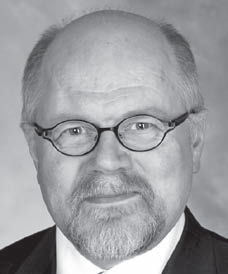
Paavo Mäkinen finds the term “diplomat,” as applied to his career, “a bit flattering.” In his current role with the European Commission, he calls himself a generalist who focuses on communications. But his impact on Finland’s integration into the global economy makes a compelling case that he is indeed his country’s foremost agricultural diplomat. His did not have a rural upbringing; he grew up near Helsinki, with a few years spent in Sydney, Australia. His decision to study agriculture came about “mainly [because] I knew nothing about it,” he says. Such curiosity led him to Purdue on a Fulbright Scholarship. His doctoral thesis at the University of Helsinki — on the effects of various agricultural policies on agricultural structures — was the foundation for his subsequent service to Finnish and international agriculture. In 1991, he was asked to draft the chapter on agriculture for the Finnish government’s report on possible membership in the European Union (EU). During this time Finnish agriculture would transition from a highly protected industry that served broad consumer needs in a country of 5 million people, to a more specialized, internationally competitive sector. The historic negotiations were both challenging and personally satisfying, as Mäkinen worked to educate farmers and the public in Finland about their new role in the EU, which the nation joined in 1995. The EU tapped him to head its unit responsible for international relations in agriculture with Asia, Oceania, Africa, and Latin America. He then returned to Finland to lead the Central Union of Agricultural Producers and Forest Owners, where he bridged Finnish farmers and the changing international environment. He has represented the EU in Finland since 2005 and expects to return to Brussels in September 2011 in a new role relating to international agriculture policy. While at Purdue, Mäkinen joined the choir of a small Lutheran church in Lafayette, and he and his wife remain enthusiastic singers. Major choral pieces — think Handel’s Messiah — “make you forget your daily troubles,” the baritone says.
William Mann (Mermom, IN | Distinguished Ag Alumni: 1995)
Mr. Mann is President of Mann Seed Farms, Inc., which produces public and private soybean and wheat seed stock. Mann SeedFarms is also a contract seed corn and wheat grower for PioneerHi-Bred International. Upon graduation from Purdue University,Mr. Mann started full-time farming. His operation currently includes a 1400-acre family-owned and operated farm consisting of corn, soybeans, wheat, and vegetable production that he manages with his wife and two sons. In addition, the farm has a significant swine enterprise. While a student at Purdue, Mr. Mann farmed 300 acres, rented from 26 different landlords in Marion County, with his father and grandfather. In spite of these responsibilities, he found time to actively participate in campus organizations. He was a member of the Purdue Marching Band, Alpha Zeta and the Purdue SoilJudging Team. He was also president of the Agronomy Club.Mr. Mann has been one of Indiana's outstanding agricultural leaders. He is a past president of the Indiana Soybean GrowersAssociation and past vice president of the Indiana Com GrowersAssociation. He was also on the board of directors of PublicVarieties Inc. and the Sullivan County Farmers Home AdministrationAdvisory Board. He currently serves as treasurer of the Agricultural Alumni Seed Improvement Association and as vicechairman of the State Soil Conservation Board, an appointment by the Governor. He is a trustee for the Region Seven IndianaVocational Technical School and is the Sullivan County LegislativeCoordinator for Indiana Farm Bureau, Inc. Mr. Mann has served Purdue Agriculture as a member of the Southwest PurdueAgricultural Center Advisory Committee. Prairie Farmer magazine named Mr. Mann a 1990 Master Farmer. Governor Orr honored him with the Sagamore of the Wabashdesignation in 1988 for his many contributions to the state of Indiana.
Evandro Chartuni Mantovani (Sete Lagoas, Minas Gerais, Brazil | Distinguished Ag Alumni: 2003)
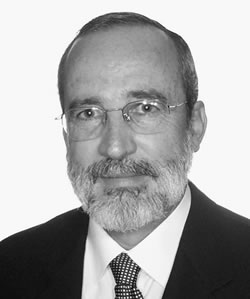
After a day that might include international collaborations, research in precision agriculture, and community service, Evandro Chartuni Mantovani likes to kick back, play a few popular Brazilian tunes on his wooden guitar, and maybe sing along. It’s the perfect cure for high-pressure days, he says.
“When I play the guitar, many good feelings come to mind. It’s a way to enjoy life and to control the stress a bit,” he says. “When singing and playing with your soul, it looks like life is in another dimension, giving me a lot of good energy to move on.”
Influenced early by the Beatles and a friend who played the guitar, Mantovani was about 20 when he started playing, at first by ear. “Finally, last year I decided to take guitar classes,” he says. His favorites are samba, bossa nova, and romantic tunes. “I like to play the Brazilian popular music.”
Although he doesn’t perform—preferring to play at home with family and friends—like the Beatles, he’s influenced others. “Because of my interest in playing guitar, my two sons have become excellent musicians, and they have a rock band that performs during weekends for fun.”
Sports, too, are a big interest, as participant and fan. At Purdue he played tennis and joined fellow Brazilians in intramural games on a team named “Brasa.” Today, he’s a fan, cheering many a weekend for the Minas Gerais’ Cruzeiro soccer team in national competition. He still takes to the tennis court about three times a week for matches of his own.
Equally important, he says, is work for others. That currently includes serving as a member of the Hospital Nossa Senhora das Gracas Council. “I always give part of my time to help the community of Sete Lagoas.”
1974 B.S., Agronomy, Vicosa Federal University, Brazil
1975-present Senior Researcher, EMBRAPA, National Research Center for Corn and Sorghum, Brazil
1981 M.S., Agricultural Engineering, Purdue University
1984 Ph.D., Agricultural Engineering, Purdue University
1992-1993 Adjunct Professor, University of Campinas, Brazil
1993-1996 Agricultural, Commerce and Industry Secretary for the City of Sete Lagoas, Brazil
1995,1996 Outstanding Secretary Award
1999 Admitted as full member, Italy’s Club of Bologna Committee (international association of agriculture and agricultural mechanization experts)
1999-2003 Vice President, Brazilian Society of Agriculture Engineering
2000-2003 National Coordinator for Precision Agriculture Program in Brazil
2002 Honorary Citizen of Sete Lagoas, Brazil
2002 Outstanding Alumni Award, Agricultural and Biological Engineering, Purdue University
“I consider my years at Purdue one of the more profitable times of my life. The quality of the courses, the library, student assistance, and advisors’ attention gave me the structure to develop my professional life.”
Bret D. Marsh (Carmel, Indiana | Distinguished Ag Alumni: 2003)
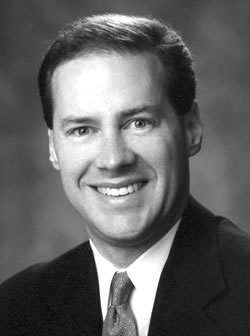
Today, Bret Marsh’s job as Indiana State Veterinarian is largely an administrative one in the state’s capital, but he brings to it hands-on experience growing up around livestock sales in Boone County.
Like his work, his home, too, is a blend of town and country. In Carmel, he enjoys collecting fine china as well as creating a country-like setting in his yard.
His interest in china was sparked by an early gift from his city-raised wife, Polly, who gave him his first piece, a Lladro figurine of a veterinarian. Today, his collection includes both antique and new items, and Limoge china as well as Waterford crystal. “We mix it up,” Marsh says. “We’ve even gone to auctions to find them.”
More recent acquisitions were birth gifts for their children—a Waterford baby block for their son, Spencer, and a Pooh Limoge box for their daughter, Lacey.
In their yard of one-and-a-quarter acres, the Marsh family is at work implementing a landscape plan created for them by a Purdue landscape architect graduate. “It’s a hands-on project,” Marsh says. It began with tearing out 20year-old landscaping to create a garden that incorporates the property’s plentiful and mature trees. They’ve added cone flowers, daisies, and hastas to the creek-accented property and a swing to their giant oak tree, as well as more trees. “We enjoy the lot,” he says. “It gives us a taste of country in town.”
Gardening is a pastime that yields rewards beyond the greenery, too. “I think about things while working in the yard,” Marsh says. “It helps me clear out the cobwebs.”
1981 B.S., Animal Sciences, Purdue University
1984 Doctor of Veterinary Medicine, Purdue University
1984-1986 Area Supervisor/Training Office, Meat and Poultry Inspection, Indiana State Board of Health
1986-1994 Director, Swine Health Programs, Indiana State Board of Health
1994-presen Indiana State Veterinarian, Indiana State Board of Health
1997 Distinguished Alumnus Award, Purdue School of Veterinary Medicine
1997 Sagamore of the Wabash
2001 Industry Meritorious Service Award, Indiana Pork Producers
2002 Veterinary Service Award, Indiana Veterinary Medical Association
“At Purdue, I learned perseverance, to face challenges head-on, and to value the faculty members and people who shared my experiences. They are part of who I am and are still great resources.”
Jean L. Marx (Chevy Chase, MD | Distinguished Ag Alumni: 1995)
Dr. Marx is Deputy News Editor of Science magazine, the premiere United States weekly journal of general science, based in Washington, D.C. Following graduation from Purdue, she taught for five years at Fontbonne College in St. Louis. In 1972, she moved to Washington, D.C. as a newswriter for Science. She has edited three books during her tenure at the magazine, major portions of which were her own writings. She contributed three of the sixteen chapters to the book entitled A Revolution in Biotechnology. Dr. Marx serves a key role in science education as she interprets the latest research to other working scientists over a broad spectrum of biological sciences. Her columns in Science assume a graduate student level of understanding of the basic systems, but not specialist familiarity. Her writing is a model of clarity. She has exceptional talent for knowing what background information is needed to put the work in its proper context and to make the case for its importance. She accurately and concisely summarizes new findings within the context of what new information is needed to further our understanding of the system. Science demands that the news articles be brief and to the point, and the journal employs only the finest writers with a solid background in the sciences. Her articles have also appeared in the Washington Post, the New York Times Sunday Magazine, and The Sciences. In addition to her assignment at Science, she wrote the “In This Issue” feature for the Journal of Investigative Dermatology from 1988 to 1990. Dr. Marx stands out as one who has mastered the efficiency of words. She was a 1970 winner of a National Science Foundation Summer Research Grant. In 1976, the Mid-Atlantic Chapter of the American Medical Writers Association honored her with the Distinguished Medical Writing Award. She also received the Medical Journalism Award from the American College of Radiology. Dr. Marx is a member of the National Association of Science Writers and the D.C. Science Writers Association. She was named a Purdue University Old Master in 1983.
April C. Mason (Fort Collins, CO | Distinguished Ag Alumni: 2005)
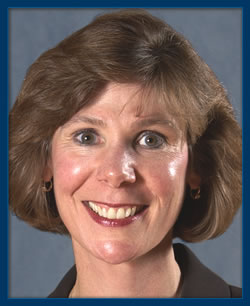
On the surface, working to combat iron deficiencies and Vitamin A blindness common to children in Indonesia, and addressing nutritional concerns among the elderly of Tippecanoe County in Indiana, present little in common. Yet for April Mason, this dichotomy anchors a principle central to her exemplary career as a food science educator and researcher: Deliverresources wherever they’re needed. Address issues important to recipients. Growing up in Italy and attending the overseas School of Rome afforded early glimpses of a global perspective. “I developed a passion for travel and the willingness to take calculated risks,” says Maison. “I also developed an appreciation of racial, cultural and religious differences, and the many ways people examine and study issues.”Ability to lead, and the spirit toembrace diversity, translated directly to development of an extensive range of food safety and nutrition programs, all focused on transferring university-based knowledge to the end user. The Safe Food for the Hungry program, an initiative launched by Mason in the early1990s was the most gratifying. Working with representatives from food banks and homeless shelters, Mason and colleagues developed food safety and nutrition programming targeted to not-for-profit food distribution programs nationwide. Her efforts garnered the Secretary ofAgriculture’s Team Honor award in 1996 and positioned Purdue University as a leader in the food safety arena. After nearly three decades as a Boilermaker, her decision to head west for new challenges at Colorado StateUniversity was heart wrenching, admit season. Yet living near the base of the Rockies—and hundreds of miles from midwest humidity—does have its perks.“There are wonderful trails throughoutFort Collins. I never get tired of gazing at the mountains. Every light, cloud and sunset looks completely different.”“Remember the individuals you learn with because each one leaves you with a gift. I’ve spent my career in higher education in order to pass those gifts along and, hopefully, to change things for the better.”
Bruce Maunder (Lubbock, TX | Distinguished Ag Alumni: 1997)
Dr. A Bruce Maunder, a native to Holdrege, Nebraska, is senior vice president of Sorghum Research at DeKalb Genetics Corp. Dedicated to developing insect resistance, drought tolerance, and disease resistance; his 37 years of research and development at DeKalb have brought Monumental Strides toward improving sorghum crops.
Dr. Maunder’s research programs span the globe, located in the United States as well as 17 other countries. The yellow endosperm germplasm he developed was widely utilized in breeding programs in Africa and Asia. Dr. Maunder also was responsible for creating and maintaining a collaborative breeding program with Argentina. His leadership in the development of greenbug tolerant hybrids has profoundly expanded the productivity of sorghum farmers in the United States. Varieties developed by his programs include more than 150 commercial sorghum hybrids grown on almost 10 million acres annually.
While maintaining his research efforts, Dr. Maunder has strongly supported education. He has been a mentor for several undergraduate and graduate students, sponsored scholarships for students, delivered many guest lectures, and conducted vital internal training at DeKalb. He also served on the Dean’s Advisory Committee at Texas Tech University.
Dr. Maunder is a respected voice in several professional organizations. He is past president of the Crop Science Society of America. He is former member of the National Research Council of the National Academy of Sciences, and served on a crop advisory committee for the National Germplasm System. Dr. Maunder has been honored with numerous distinctions, including an Honorary Doctorate of Science from the University of Nebraska in 1991. He also was named a Nebraska University Master Alumnus in 1989.
Vicki A. McCracken (Pullman, WA | Distinguished Ag Alumni: 2015)
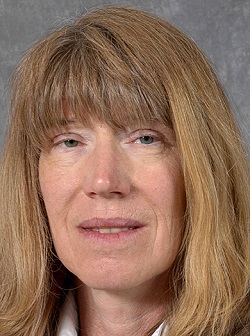
Vicki McCracken, MS ’81, PhD ’84, earned her Purdue degrees in the mid 1980s and headed west, landing at Washington State University, where she has been a faculty member for 31 years.
Since 2011, McCracken has served the school located in Pullman, Washington, as the Associate Director of the School of Economic Sciences. McCracken has chaired or served on more than 150 graduate student thesis committees.
At Washington State, McCracken found her passion for teaching. She has taught extensively in both the undergraduate and graduate classrooms ever since. In the past three years, her teaching portfolio has included introductory econometrics, advanced food economics and marketing, managerial economics for decision-making, instructional practicum, and internships. She is currently chair of the Undergraduate Studies Committee with about 250 student majors.
Which Purdue faculty member had the most profound impact on your professional career?
Dr. Jim Binkley taught my first Purdue class, AgEcon 650, econometrics. It was the first time that I was forced to think critically about class material. This was well before “critical thinking” became a buzzword in education. He was a smart guy who knew the answers to questions we would ask, but more importantly, he forced us to think, to become good thinkers.
Where was your favorite place on campus to study?
The Sweet Shop in the Union was a great place for me to study. My office was in the Krannert Building, so I could just grab the stuff I was working on, walk through the tunnel that connected the two buildings and be there in a matter of minutes. I didn’t even need to put on a coat. The Sweet Shop was dark and noisy, almost chaotic. There was just a bare light bulb above each table, but none of that bothered me. When I was there I could focus on my research or my studies, as long as I had a good cup of coffee with me.
Were you a good student when you were at Purdue?
Yes, maybe too good. I should have enjoyed life more as a student. There was so much going on: plays, concerts, and sporting events. And I enjoy all of those activities now. But at Purdue, Saturday afternoons were always study days in the library with my friends, so I didn’t really get involved in outside activities. I was too busy trying to be the best student I could be. Now I tell my students to have a hobby and get involved in outside activities, because it makes you a more balanced person.
What is the best advice you got while you were at Purdue?
Who gave you the advice?
Paul Farris was a quiet guy. And I was not very outgoing, either. I always thought I would become a great researcher. I didn’t think I had the necessary tools to be able to stand in front of a class and deliver a lecture. But by observing Dr. Farris, I learned to have confidence in my own abilities. His actions told me that I didn’t have to be a great entertainer, but I could still excel in the classroom.
What is the best advice you have ever given?
To whom did you give the advice?
Be yourself, work hard, and set your own expectations. I tell my students they have to do something because that is what they want to do, not because someone told them they would be good at this or that. My career path changed from research to teaching because I didn’t limit myself by what I thought I would be good at. And that has made all the difference.
Janis E. McFarland (Chapel Hill, NC | Distinguished Ag Alumni: 2010)
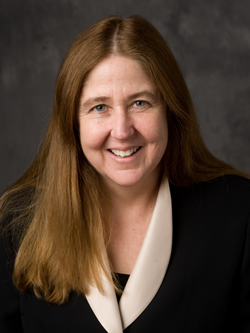
Janis McFarland counts herself fortunate to work in a dynamic industry on the brink of even greater technology-based advances: “It’s never been more exciting, meaningful, and fun to work in agriculture than today,” she says.As head of Regulatory Affairs, McFarlandoversees product registrations and stewardship of Syngenta’s crop protection products in the United States, Canada, and Mexico. Since November 2000, the global agribusiness has received registration approval from the EPA and states for more than 150 new fungicide, herbicide, and insecticide products, and for 15 new crop seed treatments.McFarland grew up in Maryland, the fourth of eight children. With degrees from Virginia Tech and Purdue, she began her career with Ciba-Geigy, studying the fate of herbicides, fungicides, and insecticides in plants, animals, and the environment.In November 1993, she headed an EPA-mandated review of the risks and benefits of atrazine, the most widely used herbicide in corn production, and related herbicides. The project resulted in a state-of-the-art scientific database for an older product, and the EPA issued a new registration for atrazine in 2006. The scientific advances resulting from studies that McFarland’s teams conducted has improved the design of safety tests and methodology used in risk assessments for many other pesticides. Ciba-Geigy was part of a merger that created Novartis in 1997. Novartis was part of a merger that created Syngenta in 2000. Throughout what some might view as corporate upheaval, McFarland embraced the benefits of change: “At every merger, we gained great people, different teams expertise, and new technology.” Her model for openly sharing knowledge across disciplines, she adds, was Purdue.McFarland is also an editor and author and is active in the Weed Science Society of America. She loves fishing, kayaking, visiting relatives far and near, and more recently, learning more about the native plants ofNorth Carolina. She and her husband of 30years, Dr. Richard McLaughlin (also a Purduealumnus) have two college-age children, two dogs, and two cats.“My unique experience at Purdue bridged basic and applied sciences. Even those of us considered ‘lab geeks had opportunities to be out in the field. Purdueemulated the way we work today across teams and different agricultural disciplines.”
Ted A. McKinney (Indianapolis, Indiana | Distinguished Ag Alumni: 2002)
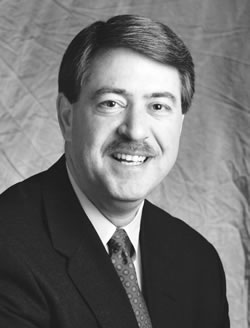
Ted McKinney well remembers earning his first blue ribbon. He was 10, his project was photography, and, as a member of the Blue Ribbon Chasers Club, he entered his work in the Tipton County Fair. He received another blue ribbon at the Indiana State Fair, and, he recalls, “It is incredible what that will do for enthusiasm and motivation for the future.”
The experience not only motivated McKinney, a 10-year 4-H member, throughout his life, it planted the seed for his passion today: investing in youth.
He does that through his old favorite, 4-H, currently serving on the Indiana 4-H Foundation Board, and through the FFA, another organization he was active in as a youth. Today, the National FFA Center is right next door to Dow AgroSciences, where McKinney works. “I led the committee that brought the center here. I’ve advised them from time to time. And I serve as a good neighbor,” McKinney says. “I got so much out of those two organizations, I feel there is some duty to give back.”
Besides, he believes in both. “4-H teaches involvement, skill development, interacting with others, and various qualities. And FFA is unequivocally the premier youth development organization in the world. You can learn public speaking and parliamentary procedure, and how to run a business, keep records, and make investments. And you can develop your leadership skills.”
The father of three—two in high school and a third grader—McKinney devotes his spare time to their activities, which include football, cheerleading, basketball, Girl Scouts, and— no surprise—4-H. “I don’t miss very many of their activities,” McKinney says. “That’s important to me.”
Thomas McKinney (Kempton, IN | Distinguished Ag Alumni: 2016)
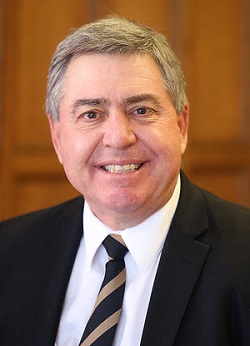
Thomas H. McKinney is the president and general manager of McKinney & McKinney, a family farm operation based in Kempton, Indiana.
McKinney returned to the family farm after receiving his B.S. For the past 36 years, he has grown the farm and the community in which he lives in central Indiana.
The farm now encompasses 5,000 acres and produces seed corn and soybeans as well as commercial corn and beans. But the most impressive part of the McKinney resume details what he as contributed to his community.
McKinney was instrumental in bringing the C.W. Mount Community Center to Tipton. His help to steward donated funds led to the creation of the facility that houses a community center for children and adults, housing the Tipton County Boys & Girls Club, the Encore Senior Center and Encore Food Pantry, Anytime Fitness Center, banquet rooms, gymnasium and walking track.
He has provided leadership and service to Indiana FFA and 4-H organizations. His work as president of the Indiana 4-H Foundation has enabled him to reach out to future leaders and remind them of the importance of giving back to their community as those before them have done.
Robert B. McNamara (Distinguished Ag Alumni: 1993)
Mr. McNamara is president and founder of McNamara Florists in Indianapolis. He started the McNamara retail florist business in 1954, and, over the years, it has grown to three locations in the Indianapolis area. His business ranks in the top 50 retail Florist Transworld Delivery (FTD) florists in the United States and Canada. Last year they ranked 16th out of the 24,000 FTD shops in terms of orders sent out across the U.S. and Canada. McNamara Florists joined forces with Engledow, Inc. in 1989 to form a corporate conglomerate combining one of Indianapolis’ premiere retail florist businesses with the city’s largest landscape management business.
Mr. McNamara has played a significant role in the growth and success of the Indiana State Florists Association. He served two terms as president and is viewed by other florists as a trendsetter and industry leader. A recent innovation of his was the planning and development of ENFLORA, a division of Engledow, Inc., that creates floral arrangements especially designed for businesses. He has also served the National FTD Association as its vice president, president, and board chairman. The FTD wire service is one of the main management tools retail florists use to accept telephone orders and handle their retail businesses. Mr. McNamara has played a significant role in the development of this organization and its tremendous success as a marketing mechanism for the retail florist industry. He just completed a two-year term as board chairman for INTERFLORA-the international flower relay system with 67,000 member shops delivering in 142 countries.
In addition to service to his profession, Mr. McNamara is very involved in his church and community. He currently serves as a director on the boards of the Indianapolis Symphony, the Indianapolis Rotary Foundation, the Overseers of St. Meinrad College and Seminary, and the Our Lady of Fatima Retreat House.
David Mech (St. Paul, MN | Distinguished Ag Alumni: 1995)
Dr. Mech is a wildlife research biologist with the Division of endangered Species Research Division of the Patuxent EnvironmentalScience Center with the National Biological Survey at theNorth Central Forest Experiment Station. He has been associated with the Center since 1969. He is also an adjunct professor in the department of Ecology and Behavioral Biology and the Department of Fisheries and Wildlife with the University of Minnesota. Dr. Mech has focused his primary research on the study of the wolf population: their ecology and behavior, predator-prey relations, population regulation, and their social ecology. Dr. Mech holds the patent for a drug-injection animal capture collar. He is the author of five books on the subject and over 250 scientific, semitechnical, and popular articles on wolves, deer, raccoons, ecology, predation, radio-tracking, and conservation. He has also been involved as a consultant and in the production of several films and television documentaries with groups such as National Geographic. He is a frequent guest speaker at colleges, universities, museums, and other institutions. Dr. Mech is a member of the American Society of Mammalogists, the Wildlife Society, the Ecological Society of America, Sigma Xi, Gamma Sigma Delta. He has chaired a Wolf Specialist Group with the International Union for the Conservation of Nature andNatural Resources, and the Species Survival Commission since. He is a former member of the boards of the Minnesota Zoological Society and the Springbrook Nature Center. Dr. Mechis also the founder of the International Wolf Center. He served on its board of directors from 1985 to 1993 and has been chair from 1993 to the present.Dr. Mech has many awards to his credit, including the Aldo Leopold Award for Distinguished Service to Wildlife Conservation from The Wildlife Society and the Gulf Oil ProfessionalConservationist Award.
Darrell G. Medcalf (Distinguished Ag Alumni: 1992)
Dr. Medcalf is Vice President of Research for Kraft General Foods, Glenview, Illinois. He coordinates Kraft’s worldwide programs in basic science, process, and packaging research. He directs Kraft’s research division which includes laboratories for research in analytical chemistry, basic food chemistry, physical microbiology, and food safety. These efforts include support for current product and process development and the identification and development of new technological advances for future use byKraft General Foods. Dr. Medcalf is also the leader of a global technology Basic Science core team at Kraft General Foods. Dr. Medcalf has held academic appointments at North Dakota State University and was Professor and Head of the Chemistry Department at the University of Puget Sound. He served as Director of Product Development and Director of Food Science and Technology with Hershey Foods Corporation, and as Vice President of Basic Science for Kraft General Foods before assuming his current position. After the formation of Kraft General Foods in December 1988 ‘ Dr. Medcalf became responsible for coordinating activities in the company’s six worldwide research centers. A major contribution of his was the development and introduction of reduced-fat and fat-and cholesterol-free versions of cheeses, dressings, and mayonnaise. Dr. Medcalf has served as Associate Editor of Cereal Chemistry, and as Chairman of the Carbohydrate Division and National Program Committee of the Institute of Food Technologists. He is the author of more than 40 research papers and the holder of several patents. Dr. Medcalf is recognized worldwide for his expertise in starch and polysaccharide chemistry.
Melak Mengesha (Andhra Pradesh, India | Distinguished Ag Alumni: 1996)
Melak Mengesha is director of Genetic Resources Division, International Crop Research Institute for the semi–arid tropics (ICRISAT), based in Hyderabad, India. ICRISAT's primarily primary products are world germplasm collections and development of improved cultivars for many crops. In addition to India, the organization has regional centers in Nigeria, Zimbabwe, Kenya, Malami, Mali and Niger. Currently, he is on sabbatical leave from ICRISAT, serving interim coordinator for the CG System–Wide Genetic Resources Program, with headquarters in Rome. As a native of Addis Ababa, Ethiopia, Dr. Mengasha earned his bachelor’s degree implant sizes from Haile Sellassie 1st University in Alemaya, Ethiopian. He earned a master’s degree in agronomy and botany from the University of Nebraska, then came to Purdue to study genetic and plant breeding. In 1964 Dr. Mengesha was appointed assistant professor of the Plant science department for that Alemaya College of Agriculture in Ethiopia. He quickly ascended from the academic ladder, being promoted to full professor 1974 and serving as the dean of the college. From here he became special assistant to the president at Addis Ababa Univeristy in his hometown. He was responsible for academics, research, planning, development, and administration of special and external prgrams. Since 1978 Melak has been in his current position with ICRISAT. As leader of Genetics Resource Division, he has developed an international gene bank, organizing collaborative germplasm conservation projects between ICRISAT and national programs in India and Africa. The ICRISAT gene bank holds over 96,000 accessions of sorghum, pearl millet, pigeonpea, chickpea, groundnut, and minor millets to aid future crop improvement research. Melak has authored more than 95 miscellaneous publications and is a fellow of the Indian Society of Genetics and Plant Breeding. He is a lifetime member of the Ethiopian Society of Agricultural Sciences, Millet Workers Association of India, and the American Society of Agronomy.
David L. Miers (Greensburg, IN | Distinguished Ag Alumni: 1999)
David Miers earned a bachelor’s degree in Agricultural Economics from Purdue in 1970. He is currently president of Miers Farm Corporation in Decatur County, Indiana. Here are some of this thoughts on education, career, and life: On his Purdue heritage: “I was raised on family land in Decatur County. I was in 4-H and Junior Leaders. I always knew that I was going to Purdue-I never even thought of going anywhere else. And agriculture was always going to be my focus. “I was a triple legacy, twice. While at Purdue I was in Sigma Nu Fraternity, as my Granddad had been at the University of Illinois, and my Dad had been at Purdue. My Grandfather, my Father and myself were also all officers in the United States Army. My Grandfather was in World War I, my father in World War II, and I was in ROTC at Purdue and on active duty during the Vietnam years. On his Purdue experience: “Both of the organizations that I was in-a fraternity and the military--were out of vogue in the late 1960s. You had to have a lot of perseverance to stay in ROTC at that time because of the negativism toward the military, but I loved the military life. I also loved fraternity life, the great football and basketball teams, and going to the Rose Bowl. Those are my best Purdue memories. “At Purdue in the fraternity and ROTC and later in the Army I was developing organizational skills, respect, how to manage people and make decisions, and self confidence.” On the most influential person at Purdue: “By far and away, that would have to be Dean David Fendler. He had been my Dad’s counselor at Purdue, and he was mine. He was adamant that I stay in ROTC because he felt it was important that people gain military experience, and if you were going to be in you should be an officer. He also was a great influence in getting me interested in agriculture. He guided me into general agriculture, and was not pleased when I changed to Ag Economics.” On his business: My granddad and father farmed the same land I’m working now, about 1,800 acres. We grow and harvest seed corn and seed soybeans for Pioneer. Most of the time I’m working with the markets or in the office or attending seminars, or working to make our community and state a better place to live. The most rewarding part of my career is making our own farm operation more productive and efficient. Most of that is achieved by continuous contact with Purdue, the Extension Service and the School of Agriculture, listening to their advice. “Several years ago, for example, I had to make the decision whether to purchase a very expensive seed corn harvester. I called to Purdue and spoke to Howard Doester. W spent a lot of time on the phone discussing pros and cons, and from those conversations with him I was able to make a decision that has been very lucrative and worked out extremely well. “Another example: In 1991 we built a large farm shop and I sought out advice from Bruce McKenzie from Ag Engineering about how to construct the building, things I should and shouldn’t do, and working with him we’ve built a showroom shop, made all the right decisions for efficiency. “Another thing we use all the time is the results from the state about the different varieties of soybeans and corn and how they yield in different areas. We also work closely with the entomology department putting out bug traps and reporting back to them on a weekly basis during the growing season. So we’re taking data out and putting it back in.” On his proudest civic contribution: “I have been working with the Decatur County Community Foundation, distributing funds to community organizations. The grants we gave this year will help build a new YMCA, a county day care center and youth softball leagues. I think youth are our future and it’s important we do a good job educating and training them to take those responsibilities.” On his philosophy of life: First and foremost, don’t burn any bridges. Anyone you’re involved with your entire life, you never know when that person will come back or have some influence on you. And secondly, leave things better than when you started. In an organization, a farm, a business, you should leave it in a better place than when you started.” Highlights/David Miers Education BS, Agricultural Economics, Purdue University, 1970 Career 1970-72 First Lieutenant, United States Army 1972-present President, Miers Farm Corporation, Greensburg, Ind. Honors and Associations Union Bank and Trust Company, Board of Directors Decatur County Family YMCA, Board of Directors Greensburg Area Chamber of Commerce, Board of Directors Decatur County Agriculture Hall of Fame Sagamore of the Wabash Indiana Agricultural Leadership Development Program Purdue University Alumni Association, Board of Directors Purdue University Agricultural Alumni Association, Board of Directors Indiana Farm Management Association, Board of Directors Decatur County Cooperative Extension Board Indiana Deputy Commissioner of Agriculture Chairman, Indiana State Fair Commission Display quote/David Miers “The most rewarding part of my career is making our own farm operation more productive and efficient. Most of that is achieved by continuous contact with Purdue, the Extension Service and the School of Agriculture, listening to their advice. “Several years ago, for example, I had to make the decision whether to purchase a very expensive seed corn harvester. I called to Purdue and spoke to Howard Doester. W spent a lot of time on the phone discussing pros and cons, and from those conversations with him I was able to make a decision that has been very lucrative and worked out extremely well. “Another example: In 1991 we built a large farm shop and I sought out advice from Bruce McKenzie from Ag Engineering about how to construct the building, things I should and shouldn’t do, and working with him we’ve built a showroom shop, made all the right decisions for efficiency. “Another thing we use all the time is the results from the state about the different varieties of soybeans and corn and how they yield in different areas. We also work closely with the entomology department putting out bug traps and reporting to them on a weekly basis during the growing season. So we’re taking data out and putting it back in.”
James R. Moseley (Distinguished Ag Alumni: 1992)
Mr. Moseley has a distinguished record of service to Agriculture. Most recently he served as Assistant Secretary of Agriculture for Natural Resources and Environment at the United States Department of Agriculture. In this capacity, Mr. Moseley was responsible for directing the policies and supervising the activities and programs of the U.S. Forest Service and the Soil Conservation Service. After receiving his bachelor’s degree from Purdue, Mr. Moseley established a thousand-acre grain and hog farming enterprise near Clarks Hill, Indiana. His farming operation is a model of how, through good management, an individual can start small and build a successful, large-scale farm business. He has been recognized as one of Indiana’s outstanding young farmers and was the recipient of the Jaycees “National Outstanding Young Farmer Award” in 1982. He has sponsored an active intern program at his farming operation, and many Purdue students have gained firsthand experience through his summer internships. Mr. Moseley has also been a frequent guest lecturer for agricultural courses and events at Purdue. He is a former member of the Dean of Agriculture’s Advisory Council. Before appointment as Assistant Secretary, Mr. Moseley served as Agricultural Advisor to William Reilly, Administrator of the U.S. Environmental Protection Agency. In this position, he advised the administrator on environmental issues that directly affected the agricultural industry. He has also served with several public policy groups that deal with agriculture and rural development at the local, state, and national levels, including the Board of Directors of the Farm Foundation. He is a former Chairman of the Board of the Indiana Institute of Agriculture, Food, and Nutrition.
Henry A. Moses (Nashville, TN | Distinguished Ag Alumni: 1994)
Dr. Moses is Assistant Vice President for Academic Support and Director of Continuing Education at Meharry Medical College. In addition to his administrative responsibilities, he is a professor of biochemistry. Dr. Moses joined the faculty at Meharry in 1964 and has held a number of high-level administrative positions there. He also serves on the faculty of Fisk University as a professor of biochemistry, a position he has held since 1966. Dr. Moses has been instrumental in encouraging many African American students to pursue professional careers. He is very active in national service, focusing on the recruitment and professional development of minority students for careers in science. He also coordinates programs to encourage an interest in science and scientific careers for Nashville area middle school students. Dr. Moses is a frequent guest lecturer and consultant for government, education, professional organizations, and civic groups. In 1988, he was the keynote speaker for the Minority Access to Research Careers national meetings held at Purdue University. Dr. Moses served as the Basic Sciences Coordinator of a program called “Neighborhood Youth Corps Enrollees.”The program was designed to give talented, at-risk high school students the motivation and the scientific fundamentals to work as laboratory technicians, to return to high school to earn a diploma, or to take an equivalency examination to fulfill graduation requirements. Dr. Thomas Brooks, a participant in this program, set up a scholarship at Meharry Medical College in 1988 to honor Dr. Moses for this work. In 1986, the National Association for Equal Opportunity in Higher Education awarded him the Presidential Citation as an Outstanding Alumnus. Meharry Medical College has bestowed many of their highest distinctions on Dr. Moses, including the Kaiser-Permanente Award for Excellence in Teaching.
David K. Mueller (Westfield, IN | Distinguished Ag Alumni: 1999)
David K. Mueller graduated from Purdue in 1975 with a B.S. in Entomology. He is president of two related companies: Insects Unlimited, Inc. and Fumigation Service and Supply, Inc. Here are some of his thoughts on education, career, and life: His favorite Purdue memory: “I remember walking across campus one day and realizing that I was attending one of the best universities in the country. That was an awesome feeling-that I was walking among the best. In the area of pest control, when you say you graduated from Purdue, it is automatically a very prestigious thing.” His favorite professor: “One of my professors, John V. Osmun, was very influential in my career and education. I dedicated my book to him because he was a friend to me and to other students. He’s still at the university as a professor emeritus, and we stay in touch. From time to time we go up to the Sagamore Room and have lunch, and I get notes from him about things he thinks will interest me. It’s nice, in such a large university, to have that kind of one-on-one contact with a full professor.” On choosing entomology: “I started out in Biology and Environmental Science. Part of the curriculum was Introduction to Entomology, and I just fell in love with it. I use my Entomology degree every day. Often I come to work and there’s a box on my desk and someone wants to know what kind of insect it is. The most important thing Purdue gave me was a degree that gave me the knowledge and confidence to go forward.” On applying his knowledge: “My work with stored-product protection is really varied, because it can apply to anything from farm bins to museum exhibits. I like working with museums to protect their treasures. The Field Museum in Chicago, for example, has 16 million items, and most of them are attractive to insects. I take a pest management approach, something I learned at Purdue. I start with the insect first and then work backwards to find an environment that it can’t survive in. It will then leave or die.” On his early life experiences: “I was a 95-pound wrestler in high school, so I had to do something else to carve my niche. I was an Eagle Scout, and was also active in Student Council throughout high school, and those activities developed my leadership abilities. Now I help with my sons’ Scout troop and with their wrestling teams at school.” On his philosophy of life: “My philosophy of life is also the first article of the mission statement of my company: “Be Daring, Be Innovative, Be Fair.” On his favorite honor: “For several generations, methyl bromide has been used as a fumigant, but it is a serious ozone depleter. I have been active in looking for an alternative for methyl bromide. I recently received the Stratospheric Ozone Protection Award from the Environmental Protection Agency for the work I did in this area and I’m proud of that-of daring to stick my nose out and tell a story that wasn’t popular.” On his future: “I try to focus on being the best in my field. I attend a lot of meetings, and try to make sure I’m where there are things going on that will keep me informed. Dr. Osmun had one saying that I remember: ‘We need to educate rather than regulate.’ I agree with that, and so I do a lot of training and educational programs both nationally and internationally.” On his biggest work accomplishment: “My most important accomplishment as a businessman is making payroll 894 times in a row. My companies have 20 regular full-time employees, and also seasonal help during the summer, and we hire a lot of Purdue students and graduates. But if you don’t pay them, they don’t come back.” Booklet highlights/Mueller Education B.S., Entomology, Purdue University, 1975 Career President, Insects Unlimited, Inc. and Fumigation Service and Supply, Inc. Honors and Associations Board Certified Entomologist (B.C.E.) Member, Pi Chi Omega Member, Entomological Society of America Officer, Ohio Valley Entomological Association Family David Mueller’s wife, Mary Beth, works with him in their businesses. They have three children: Peter, 15, is a Westfield High School varsity heavyweight wrestler, and for several years held the record in Purdue’s Bug Bowl cricket spitting contest. Tom, 12, is also a wrestler, and has “the biggest heart in the world,” according to his father. Frances, 10, is the child most likely to be a successful business person. All enjoy the outdoors and looking at the insects they find there. Display quote/Mueller “My most important accomplishment as a businessman is making payroll 894 times in a row. My companies have 20 regular full-time employees, and also seasonal help during the summer, and we hire a lot of Purdue students and graduates. But if you don’t pay them, they don’t come back.”
John D. Mumford (Ascot, Berkshire, United Kingdom | Distinguished Ag Alumni: 2011)
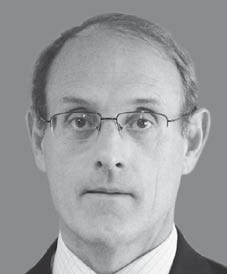
One of John Mumford’s part-time jobs as a Purdue undergraduate was collecting information from Indiana farmers on how they dealt with corn insects. During that experience, he began to ponder the problem-solving process. Later, as a Marshall Scholar in England, he focused on how pest control decisions were made on farms, and how extension information could be more effectively directed to growers concerns. Today, Mumford is in demand for his analyses and opinions of pest problems and their management. Issues related to the risks that management programs face in the environment are of particular interest, which has extended his work from pests to other environmental problems, such as fisheries management. He has led international missions to determine environmental risk management research, training, and implementation priorities. As director of the Centre for Environmental Policy, Mumford leads a university department that is intentionally interdisciplinary, with a range of natural scientists, engineers, and social scientists all involved in the understanding of broad environmental problems and their solutions.His teaching, too, addresses the interactions of economics and ecology in many aspects of applied resource management, environmental risk, and pest management. He finds great satisfaction in helping students see what kinds of real problems they can solve with “an understanding of biology, ecology, and some really interesting economics, management, and engineering thrown in.”Mumford is widely published in key research areas that include biosecurity, quarantine, and eradication policy for invasive pest and quarantine species; design of decision tools for environmental risk management; and integrated management of major insect pests. He believes that as the dominant macroscopic form of life on earth, insects are well worth knowing about — but he is most interested in “how humans interact with them, why we try to manage them as we do, and how we can get on with them in the end.”Mumford and his wife Megan Quinlanhave a 7-year-old son. He enjoys running and beekeeping, which he also learned at Purdue.
Alfredo Navarro de Andrade (Distinguished Ag Alumni: 1993)
Dr. Navarro is president of Varig Agropecuaria, a subsidiary of the Varig Brazilian Airlines Group, with 14 farms encompassing some 168,000 acres from the northeast to southernmost parts of Brazil. The company is involved with cash crops, beef, dairy, swine, poultry, and fruit production. Under his leadership the company has greatly improved productivity to yield a level of gross sales in excess of $43 million dollars annually. Varig has become one of Brazil’s leading companies in the use of new agricultural production technologies with an emphasis on maintaining an environmental balance.
Dr. Navarro began his professional career as a research assistant with the Agricultural Research Service of the Brazilian Ministry of Agriculture. Because of his keen interest and research ability in poultry production, he was granted a scholarship to pursue his master’s degree at Purdue University. Upon his return to Brazil in 1969, he became an assistant professor of monogastric nutrition at the School of Veterinary Medicine of the Federal University of Rio de Janeiro. He helped start the University’s graduate program in animal production. In 1972 he returned to Purdue to complete his Ph.D. program.
Dr. Navarro then held positions as president of EBRACE in West Africa, technical director of Granja Guanabara in South America, and president of Agrodata Consulting Company. While in his position with Granja Guanabara, a large poultry operation near Rio de Janeiro, he traveled extensively throughout South America and Africa to develop export markets for his and other companies’ products.
Dr. Navarro has been a strong advocate for cooperative research and working relationships between industry and educational/ research institutions. He is a past member of the National Poultry Commission of the Ministry of Agriculture and a charter member of the organizing committee for the Brazilian College of Animal Nutritionists. He currently serves on the board of trustees of the Brazilian Foundation for Sustainable Development, the Technical Committee of the Rio de Janeiro Research Foundation, and the editorial board of the Archives of Veterinary Medicine.
Kumar Navulur (Longmont, CO | Distinguished Ag Alumni: 2019)
Kumar Navulur is senior director of Global Strategic Programs at the world’s leading provider of highresolution earth imagery, data and analysis. DigitalGlobe provides sophisticated commercial satellite data and products from its satellite constellation and cloud-based platforms that enable analytics and information extraction at scale. Among its applications are agriculture and natural resources. The company’s extensive 17-year image and data library provides information for a range of change detection and other uses. Navulur leads efforts to make data and processed information available and timely to support applications and decision making. He has greatly improved processing and the availability of data and information through better computational processes and large cloud-based solutions. He is continually looking for new applications and information products that leverage data collected by his company’s satellites. Navulur also is president of the DigitalGlobe Foundation, where he is responsible for making the extensive library of geospatial images and data available at no cost to nonprofit institutions, including universities. He worked with Purdue University in 2016 to establish an agreement allowing access to these images and data. Purdue graduate students take advantage of this rich data source in their research endeavors. Navulur has returned to Purdue to speak with students in classes, including as a keynote speaker for the 2017 GIS Day. He challenges students to think about how geospatial data and, in particular, data from remotely sensed sources such as satellites, will impact their careers. He has published five articles, a book chapter, “The Role of Geographic Information Systems in Groundwater Engineering,” in Handbook of Groundwater Engineering, and a book, Multi-Spectral Image Analysis Using Object-Oriented Paradigm. He holds two patents and is a popular speaker for conferences. Navulur is a member of the United Nations Global Geospatial Information Management committee, an adjunct professor at the University of Denver and University of Colorado, and advisor of “Destination 2025” for the Norwegian Mapping Authority.
Douglas C. Needham (Kennett Square, PA | Distinguished Ag Alumni: 2017)
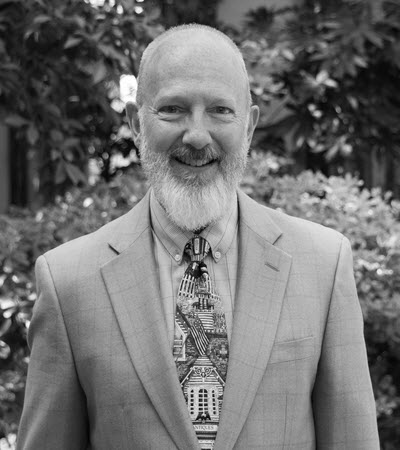
Doug Needham’s career as an award-winning university professor and public educator is grounded in his commitment to the profession of horticulture. As a member of the Longwood Gardens senior leadership team, he has been at the center of revitalizing all facets of Longwood’s extensive educational programs, with international impact.
After earning an undergraduate degree in biology, the Lafayette native pursued graduate study at Purdue to become a teaching professor. He signed on as a teaching assistant with then-new faculty member Robert Joly, whom he credits as a mentor and friend. Retired professor Allen Hammer also provided opportunities in research, and, once Needham was at Oklahoma State University, reached out to him with the idea of a study abroad consortium that Needham says launched his career in international work. Needham was a founding member of the HORTECUS Consortium, which coordinates study abroad for horticulture students among three U.S. and four European Union universities.
He rose through the academic ranks at Oklahoma State with an appointment that suited him perfectly: 100 percent teaching initially; and then 75 percent teaching and 25 percent 4-H and youth programs extension, which Needham characterizes as teaching to a younger audience. He also planned a botanical garden for the campus, which introduced him to public horticulture, and researched what a curriculum in this newly evolving field might look like, leading to the university’s Public Horticulture option within the Horticulture major.
To that end, he traveled to Longwood Gardens beginning in the early 1990s to bring back ideas from its wide-ranging education programs. Thus began a productive relationship, and Longwood Gardens recruited Needham to lead its innovative programs in 2007. He also co-chaired the Steering Committee for Seed Your Future, a national strategic initiative to develop action plans to increase public awareness of horticulture and to excite youth about pursuing careers in horticulture. Needham continues to advise Seed Your Future’s National Leadership Cabinet.
Needham and his wife of nearly 40 years enjoy gardening, and especially growing orchids. They have two adult children.
“I’m privileged to be doing what has been on my CV right from the beginning — fostering the development of others. I’m grateful for the opportunity to play a role in helping individuals become what they want to be. You can tell, it’s my passion.”
2007-present Vice President of Education, Longwood Gardens
2006 USDA Southern Region Excellence in College and University Teaching in the Food and Agricultural Sciences
1996, 2001 Oklahoma State University College of Agricultural Sciences & Natural Resources Regents Distinguished Teaching Award
1989-2007 Oklahoma State University Professor of Floriculture and 4-H and Youth Programs, 1999-2007 Associate Professor of Floriculture and 4-H and Youth Programs, 1994-1999 Assistant Professor of Floriculture and 4-H and Youth Programs, 1993-1994 Assistant Professor of Floriculture, Department of Horticulture and Landscape Architecture, 1989-1993
1989 PhD, Horticultural Plant Breeding and Genetics, Purdue University
1984 MS, Horticultural Plant Breeding and Genetics, Purdue University
1977 BS, Biological Sciences, Purdue University
Barton R. Nelson (Walla Walla, WA | Distinguished Ag Alumni: 1995)
Mr. Nelson is President of Nelson Irrigation Corporation, a manufacturer of agricultural irrigation equipment that employees 150 people. Nelson Irrigation Corporation has, from its inception, been dedicated to planning, designing, developing, manufacturing, and selling proprietary products for the agricultural irrigation equipment market. Today they manufacture the Big Gun® line of sprinklers, impact sprinklers, flow controls, pressure regulators, control valves, spinners, sprays, and the Rotator™ line. They strive to develop products that conserve water and energy. Upon graduation from Purdue University, Mr. Nelson began working for LR. Nelson Manufacturing Company, a family business started in 1911 by his grandfather. Today that company is known as LR. Nelson Corporation and produces lawn and garden sprinkling equipment. He initially worked as plant manager, then vice president, at the Peoria plant. In 1968, he moved to Portland, Oregon to start a division of the company to serve the irrigation needs of agriculture. Because of the company’s tremendous success in this market, the family sold the LR. Nelson Manufacturing Company in 1972 and simultaneously formed Nelson Irrigation Corporation. Mr. Nelson has been an innovator in irrigation research and agricultural water delivery systems. He and his staff hold several patents. He was awarded the 1988 Industry Achievement Award by the Irrigation Association. In 1992, he was named to the Leadership Group of the Irrigation Industry, a collaborative effort with the United States Agricultural Research Service. Mr. Nelson served with the Illinois Air National Guard during the Berlin Crisis in 1961 and was named the Outstanding Non Commissioned Officer by the 182nd Tactical Fighter Group. He currently serves on his local Community Corrections Board, which helps youth at risk and their families.
John H. Nelson (Distinguished Ag Alumni: 1993)
Dr. Nelson is vice president of science and technology for McCormick and Company, Inc. in Hunt Valley, Maryland. As such, he has responsibility for all research, development, and quality assurance programs for the largest spice and seasoning company in the world. McCormick and Company has purchasing, manufacturing, or sales operations in more than 75 countries. He joined the company in 1986 as corporate director of research and development.
Dr. Nelson is a recognized authority in cereal science, starch chemistry, and food flavorings. He started as a research biochemist with General Mills in 1955. Over the course of his career he has managed research and development divisions with General Mills, Peavey Company, and American Maize Products Company. He served as Operating Manager of the International Venture Research subsidiary with Peavey before joining American Maize in 1978. Dr. Nelson was vice president for corporate development, then chief operating officer for the Roman Meal Company in the years just prior to his move to McCormick & Company.
Dr. Nelson has served his profession as treasurer, national director, and president of the American Association of Cereal Chemists. As national president he organized the association’s Japan Section. He is also a member of the Institute of Food Technologists and has served as chairman for the National Program and Long Range Planning Committees. Dr. Nelson was president and director of the League for International Food Education. He is involved with Project SUSTAIN, a joint effort between industry and the United States Agency for International Development (USAID). They assist developing countries with the scientific knowledge and technologies to improve the quality, safety, and availability of low-cost processed foods. He has advised USAID on food industry issues in a number of developing countries. Dr. Nelson has also served academia as a member of Advisory Committees at the Universities of Minnesota, Illinois, North Dakota State, Maryland, and Towson State (Towson, Maryland). He is a current member of the Industrial Advisory Committee for Purdue’s Food Science Department.
Craig Newman (Westfield, IN | Distinguished Ag Alumni: 2015)
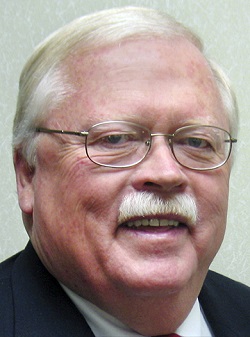
Craig Newman, BS ’71, is president and CEO of AgReliant Genetics, an innovative seed company representing seven different brands of corn, soybeans, and alfalfa seed from corporate headquarters based in Westfield, Indiana.
After graduating from Purdue with a degree in agricultural business management, Newman began his career with Procter and Gamble as a field sales representative in the health and beauty product market, rising to the position of unit sales manager. Newman broke into the agricultural sales field by joining Akin Seed in 1979 as the company’s operations manager eventually becoming the general manager of the company.
In 1995, Newman became general manager of Callahan Seeds as well as continuing as Akin Seed’s general manager. In 2000, Newman was named Vice President of Sales and Marketing for AgReliant Genetics, a joint venture formed by the French-based Limagrain and the German-based cooperative, KWS. He was appointed to his current position in 2012. Over the past 14 years, AgReliant Genetics’ seven seed brands have grown in sales volume by more than 300 percent and the company ranks as the third largest corn seed company in North America, with nearly a 7 percent share of the market.
Which Purdue faculty member had the most profound impact on your professional career?
Professor Bob Taylor. Prof. Taylor was my instructor in AgEcon 100, which was my first class in ag econ when I came to Purdue. There were more than 100 students in the class. Prof. Taylor was an excellent teacher and was very motivating. Before we took the first big test of the fall semester, Dr. Taylor announced that the students with the top 10 scores would be invited to his house for dinner. I was fortunate to be one of the invitees. I think we had steak, which was a real treat for a college student. That personal touch and his inspiration convinced me to continue in agriculture and in the Ag Econ department.
Why did you select Purdue as the place to continue your education?
When I was growing up near Covington (about 40 minutes southwest of campus), I was always excited about the opportunity to go to Purdue. I was a huge Purdue sports fan, I always wanted to go to Purdue, but agriculture wasn’t always a part of the plan. I liked math and agriculture, so I chose Ag Business Management.
What is the best advice you got while you were at Purdue?
Who gave you the advice?
I am not sure who gave me the best advice but the most motivating and inspirational people I met during my academic career were Dr. Taylor and Dr. (David) Downey. Dr. Taylor was just so encouraging and made the subject matter really exciting and interesting. Dr. Downey is an icon in the ag world. He had more energy than any professor that I ever met and he still does today. I have worked with him many times over the past 40 years. He is “Mr. Sales” for the ag industry! He literally “wrote the book” on agricultural sales.
What is the best advice you have ever given?
To whom did you give the advice?
I think the best advice that I have given is for students to get involved outside of their classes. A student’s efforts outside of the class show the student’s self-motivation, leadership skills, interest in learning, drive, work ethic, etc. This advice included summer intern jobs. Having a summer intern job illustrates all the above characteristics plus the student can learn about fields and jobs that he or she might like, and might not like, in the future.
Mario Nievera (Palm Beach, FL | Distinguished Ag Alumni: 2009)
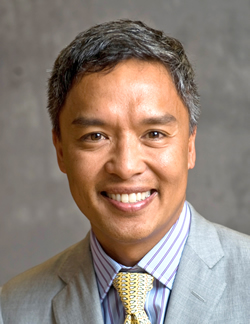
Whether the site is a jet aviation facility in Palm Beach County, Florida, or a $20million, 19-acre estate and garden in Southampton, New York, projects developed by acclaimed landscape designer MarioNievera sport signature trademarks—simplicity, scale, and attention to detail.“When I create an environment that people enjoy, I know I’ve succeeded,” says Nievera. As founder and president of MarioNievera Design Incorporated—withoffices in Florida and New York—his aesthetically pleasing landscape designs delight residential, corporate, institutional, and commercial clients nationwide. Prior to launching his firm in 1996, Nievera was employed by morgan Wheelock Incorporated, rising from staff landscape architect to principal and vice president. Nievera also cultivates a sense of environmental guardianship. Among his most rewarding projects was a re-design of planting and hardscape for PalmBeach Public Park—an appealing pocket of land featuring planting containers and extensive use of xeriscape plant material. Buildings settle easily into Nievera’slandscapes. His design solution for Portsmouth Abbey School in RhodeIsland, united original and new campus buildings and incorporated a one-acre lawn with fountains and seating. Recently, his inspirational design work graced the pages of Architectural Digest, Forbes, and House Beautiful. A WallStreet Journal Online article featuredNievera among a handful of emerging landscape designer stars reputed for outstanding work on high-profile residential designs. Such recognition may well be rooted in an early eye for aesthetics.“I’ve always been obsessed with houses and how they’re situated on the land,” says Nievera, who recalls building houses from cardboard and manila folders as a youngster. “Even today, everything links to my profession. My work is also my favorite hobby.”“My experience at Purdue was sensational, and the opportunities and resources provided by my professors and the Landscape ArchitectureProgram were extraordinary. Purdue University’sworldwide reputation for educational excellence contributed greatly to my success.”
Gustavo A. Nores (Buenos Aires, Argentina | Distinguished Ag Alumni: 1995)
Dr. Nares is an associate member of Consultants in Economics and Organization (CEO), a private consulting firm that specializes in strategic planning and organizational reforms for Latin American businesses and industries. Prior to his current position, he served as Director General of the International Center for Tropical Agriculture (CIA T). The Center is a leading international research institution whose mission is to help reduce widespread poverty and make future food supplies more secure. While a student at Purdue University, Dr. Nares was twice lauded by the American Agricultural Economics Association. Both his masters and doctoral theses won the outstanding dissertation awards from the Association. Early in his career, Dr. Nares was an agricultural advisor to the minister of Economics in Argentina and vice president of theNational Meat Board. At the same time, he served as a professor at the Argentinean Graduate School of Agricultural Sciences and the National Agricultural Research Institute. His career has been one of academic service to his country and, more recently, to the international agricultural community as a professional researcher, research administrator and consultant to agribusiness. From 1976 to 1987, he held a number of positions with CIAT. From 1987 to 1990, Dr. Nares headed his own consulting firm in Argentina. He has served on the boards of the International Fertilizer DevelopmentCenter and the International Council for Research in Agroforestry. He has also been a member of the steering committee for the Kellogg International Fellowship Program in food systems and a member of the Technical Advisory Committee of the Consultative Group on International Agricultural Research.
Christopher A Novak (Chesterfield, MO | Distinguished Ag Alumni: 2015)
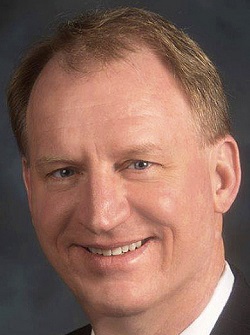
In 2014, Chris Novak, Executive MBA ’03, was appointed CEO of the National Corn Growers Association. Novak replaced Rick Tolman, MS ’78, who had spent 14 years with the organization. But Novak follows Tolman in another way, too: Tolman received the College of Agriculture’s Distinguished Agriculture Alumni Award in 2014.
Prior to joining the association representing the interests of more than 300,000 farmers who participate in the corn checkoff program, Novak had been (since 2008) CEO of the National Pork Board, overseeing an annual operating budget of $85 million.
Which Purdue faculty member had the most profound impact on your professional career?
I’ve had the pleasure of working with a number of Purdue faculty members throughout my career. Vic Lechtenberg, Otto Doering, and Mike Boehlje quickly come to mind. There are many others who have had an influence on me throughout my career, but if I’m selecting the one who has had the most profound influence — it would have to be Dean Jay Akridge. During my Purdue MBA program I quickly learned to appreciate his vision and his leadership style. Dr. Akridge served as my capstone advisor, so I worked closely with him in putting together a project that had personal as well as professional significance. Following completion of my MBA, I took a job as Executive Director of the Indiana Soybean and Corn Grower organizations. In this capacity, I was able to continue my relationship with now Dean Akridge through a number of joint projects and programs with Purdue.
What part of your visit back to campus in April are you most looking forward to?
Visiting with Luanna Demay — the Executive MS-MBA Program Manager — has been a joy in my life since her first card arrived in the mail. She is “mom” to most of the MBA students, but in addition to that honorary title, I consider her a dear friend. I’ve loved her sense of humor, her dedication to the EMBA program and its students, and the encouragement that she has provided me during my time at Purdue and well beyond. Whenever I’ve had a chance to swing through campus, it has been to see Luanna, the EMBA faculty, and program staff — it is always fun.
What is the best advice you got while you were at Purdue?
Who gave you the advice?
Dean Akridge’s strategy class has been a guiding influence for me. In the class, he stressed the importance of vision — of creating a BHAG, or a Big Hairy Audacious Goal. We discussed the importance and elements of strategic planning. Since that time, I have put together or facilitated strategic plans for the Indiana Soybean Alliance, the Indiana Corn Marketing Council, the National Pork Board (twice), the U.S. Pork Center of Excellence, and for three state pork associations. I like to believe that creating a vision for an organization, and developing a strategic plan that could effectively implement that vision, has been a hallmark of my career.
What is the best advice you have ever given?
To whom did you give the advice?
I have three children. My advice to them, and other young people I’ve visited with about career opportunities, has been to make decisions that give you choices. My career goal by the time I was 28 was to lead a national agricultural organization. I knew that I needed to go back to school to get an advanced degree to achieve that goal. Through my education and my career choices, I’ve been able to broaden the opportunities available to me. Young people need to continue to seek education, continually add new skills, and pursue new experiences that will set them apart in a highly competitive world.
William A. Nuerge (Independence, KY | Distinguished Ag Alumni: 2004)
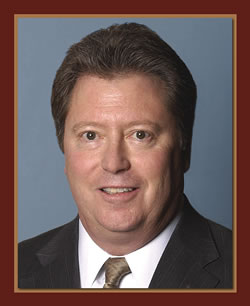
After long hours on the job, BillNuerge fills his time with almost a dozen hobbies, and everyone has a name. They’re his family—wife Teri; children Amy, Aaron, Branden, Andy, Josh, Austin, and Kelsey; and three grandchildren. Their time together ranges from sporting events—the children’s, college and pro games—to amusement parks, horse races, fishing trips and some travel. Holidays and birthdays bring them all together, too, when they often play football on the Nuerge’s seven acres and soccer on a nearby field. The family buys several season tickets to the Cincinnati Bengals and Reds, and whoever is available goes. Purdue and Colts football games are popular, too, as is an annual trip to Hawaii.“They’re smart. They’re interesting, and it’s enjoyable to see them grow,”Nuerge says of his clan. His oldest child is 29, and his youngest, 15. “And then there are the grandchildren. I have a blend. I enjoy the relationships betweenthe older kids and younger kids. They take care of them and have a lot of fun together. I also try to get individual time with, everybody.”His family time is more precious than ever because he was a long time earning it, he says. A father during his college years, he worked full time and studied, too. Then from 1994 to 2000, he commuted to his Kentucky job while his family stayed in Lafayette, Indiana.“I missed six years. Now they’ve all migrated here with me,” he says. “They are a challenge and a lot of work, too. I want to keep them on track as long as I can and get them through these difficult years. So my time is spent with my family.”“I worked full time when I went to Purdue, so I learned the work ethic, the values of taking care of yourself and managing your time. More than anything else, Purdue provided me with something worthy to work toward.”
Jack Odle (Raleigh, NC | Distinguished Ag Alumni: 2016)
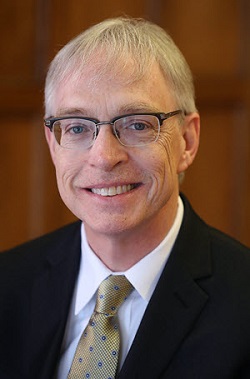
Jack Odle was named the William Neal Reynolds Distinguished Professor at North Carolina State University in 2005. Since joining the faculty in 2000, he has been a member of the Genomics, Biotechnology and Nutrition faculties, the Center for Gastrointestinal Biology and Disease and the Center for Comparative Medicine.
Odle’s laboratory uses suckling piglets as a model for the human infant, investigating problems relevant to both production agriculture and medical science.
Beyond his distinction as a preeminent scientist, Odle is regarded as an excellent teacher. He has mentored 50 graduate students, postdocs and visiting scientists and has served on graduate committees of another 80 students.
He has contributed to over 400 papers, abstracts and reports and has been awarded more than $9 million in research funding.
John K. Oelslager (Mantua, OH | Distinguished Ag Alumni: 1998)
Rarely does a person find enough drive, challenge, and determination to spend an entire career improving one company. Since his graduation from Purdue University, Mr. Oelslager has been with Parker Hannifin Corporation in Cleveland, Ohio, and his contributions to the company have been remarkable. Today, Mr. Oelslager, a native of Warren County, Indiana, is president of the Automation Group at Parker Hannifin.
Parker Hannifin is a $4.1 billion global manufacturer of components and systems used to control motion and pressurized fluids, including many types of controls, drives, and hydraulic components used in many agricultural machines. The company employs an astounding 33,000 persons worldwide. As one of these persons, Mr. Oelslager has been instrumental in the management of several divisions, such as the filter division and the cylinder division. In July of 1995, he was appointed Vice-President of the Motion and Control Group. In 1997, he assumed his present position.
Over the span of his career, Mr. Oelslager has returned to West Lafayette many times, speaking to Purdue students in the classroom . He not only emphasizes the intellectual and factual aspects of success in the agricultural engineering field, but also stresses the importance of maintaining integrity and service in a well-balanced career. Due to Mr. Oelslager’s direct endorsement of Purdue’s agricultural engineering programs and their students, Parker Hannifin has recruited several recent graduates, and now offers employment to four to six graduates each year. Parker-Hannifin also offers several undergraduate scholarships, and has donated upwards of $120,000 worth of equipment to Purdue’s teaching laboratories.
In addition to his responsibilities to Parker-Hannifin, Mr. Oelslager is also a member of the National Fluid Power Association (NFPA) and the Manufacturers Alliances for Productivity Improvement (MAPI).
For contributions to his profession and community, and for bringing distinction to his alma mater, Purdue University School of Agriculture is proud to present the Distinguished Alumnus Award to Mr. John Oelslager.
Reuben J. Olembo (Nairobi, Kenya | Distinguished Ag Alumni: 1994)
Dr. Olembo is the Assistant Executive Director for the United Nations Environment Programme. He has been a staff member of the United Nations Environment Programme since 1975, serving in the positions of Senior Programme Officer of Natural Resources, Deputy Director of the Ecosystems and Natural Resources Division, Director of Environmental Programmes, Member of the Senior Management Group, and Chair of the Joint Advisory Committee on Policy and Administration. Prior to his appointment with the United Nations Environment Programme, Dr. Olembo was a professor of botany at the University of Nairobi. Dr. Olembo is a strong advocate for promoting and improving education in Kenya and neighboring countries. He has served as an examiner for the Cambridge University School Certificate, a chief examiner for the East African Examinations Council, and an external assessor for university degrees in Nigeria, Ghana, and Tanzania. During his tenure with the United Nations Environment Programme, Dr. Olembo has made significant contributions. The World Conservation Strategy, a major document on conservation of living resources for sustainable resources, was the result of project activity initiated and formulated under Dr. Olembo’s supervision. It has become the primary reference for world-wide national conservation strategies and policies. He also had a prominent role in establishing The World Soils Policy, the Tropical Forest Action Plan of 1985, and the Microbial Resource Centers. Dr. Olembo is frequently invited to speak at world conferences on the environment, food security, biochemical nitrogen cycling, African education, and biological diversity.
Donald E. Orr Jr. (Noblesville, IN | Distinguished Ag Alumni: 1999)
Donald E. Orr, Jr., graduated from Purdue in 1967 with a B.S. in Animal Science. He is President and Chief Operating Officer of United Feeds. Here are some of his thoughts on education, career, and life: On his childhood: “I worked on the family farm, and that has provided me my whole life’s professional career. My father taught me to work hard and strive for excellence, to use what resources I have wisely and to plan for success. He also taught me that success requires preparation and sacrifice. You can’t always have it today. You have to do the important things and maybe give up something, that will allow you to be successful down the road.” On a major Purdue influence: “I particularly remember Dr. Hobart Jones, professor of Animal Science and swine specialist, because he was involved in judging many 4-H swine shows around the state. I knew him when I was 10 years old, a first year 4-H member and I had the reserve grand champion barrow at the Tipton County Fair. Later, he was my counselor at Purdue and he challenged me to excel, work hard, and improve on what I was doing.” On where his Purdue education has gotten him: “I have had the opportunity to see and experience the nutrition and swine business around the country and around the world. Today, I find myself based only seven miles from the farm where I grew up. I feel very fortunate see my industry from a global perspective and then to be able to apply my knowledge and experience in an industry I admire. “I’ve also judged swine at several major livestock shows in the United States and in Japan. I’ve enjoyed doing those activities where I have been able to influence young people and instill values and pride in the industry.” On changes in his industry: “Today we’re feeding a pig that is like an athlete. He’s a lean, heavy-muscled animal bred to provide the kind of animal protein that today’s consumers say they desire. To produce this animal efficiently, we have to meet his needs. As the genetics of the animal change, we have to meet the nutritional requirements to optimize lean, efficient growth, and do it cost effectively. We’re not feeding pigs like we were 20 or 40 years ago. There have been so many advances that we have to constantly re-evaluate.” On the future: “The future of agriculture is really unlimited. It will be great for those who embrace change, use those tools that are available today, and utilize sound business principles. “As for the future of the world-it’s becoming smaller and smaller and many of us will play a major role in the global agriculture industry. Who would have thought that a little company in Sheridan, Indiana, would become one of the world leaders in swine nutrition and emerging swine technology? Each year, visitors from all around the globe come see what we are doing and many of them have a real desire to do business with us and apply our technology to their local economy.” His favorite Purdue memory: “My very favorite Purdue memory is of meeting my wife, Pam. She didn’t go to Purdue (she was a student at IU), but her identical twin sister did. Her sister set us up on a blind date, but I already knew what she looked like because I knew her identical twin. Pam’s parents are both Purdue graduates. Her grandfather was a graduate of a Purdue ag short course held in the early 1900s.” Highlights/Orr Education B.S., Animal Sciences, Purdue University, 1967 M.S., Animal Industry, Pennsylvania State University, 1969 Ph.D., Animal Nutrition, Michigan State University, 1975 Career 1984-present United Feeds, Inc. President and Chief Operating Officer Vice President of Nutrition and Development, 1984-1997 Member of Board of Directors 1975-84 Texas Tech University Assistant and Associate Professor of Animal Science 1974-75 Central Soya Company Swine Nutritionist Honors and Associations American Society of Animal Science National Pork Producers Council National Feed Ingredient Association American Feed Industry Association Indiana Corporation for Science and Technology Charter Diplomate, American College of Animal Nutrition American Registry Professional Animal Scientists Family Donald Orr and his wife, Pam, have two sons, David and Daniel. Pam is an elementary school teacher in the Noblesville schools. David, a 1996 graduate of Rose-Hulman Institute, is currently a graduate student in the Purdue Krannert School of Management Master’s Program. Daniel is a senior at Purdue majoring in Food Process Engineering and is a member and student manager of the Purdue Varsity Glee Club. Display quote/Orr “I have had the opportunity to see and experience the nutrition and swine business around the country and around the world. Today, I find myself based only seven miles from the farm where I grew up. I feel very fortunate see my industry from a global perspective and then to be able to apply my knowledge and experience in an industry I admire.
Scot A. Ortman (Kokomo, IN | Distinguished Ag Alumni: 2017)
Under Scot Ortman’s leadership, Kokomo Grain has become one of the largest privately held grain companies in Indiana. As a respected leader in in the industry and former board chair of the statewide Grain and Feed Association (now the Agribusiness Council of Indiana), he is frequently called on to represent the grain industry on a variety of issues.
Kokomo is Ortman’s hometown. When he was still young, his father turned the 400-acre family farm over to the seven Ortman children to develop their business skills. Although Scot initially went to Purdue to pursue aeronautical engineering, his professional interest soon turned to the grain industry.
Ortman chose agricultural economics to supplement his real-life business experience. “Kokomo Grain is a family business, and I knew I needed more background,” he explains. “The grain business was different from a family farm, and I thought agricultural economics would serve me well.”
He credits his advisor, former Professor of Agricultural Economics Larry Bohl, for taking a personal interest in his coursework and academic progress, and the late Dean of Students Barbara Cook for inspiring him in scholarship, leadership and service. Ortman was president of Triangle fraternity at Purdue. His four years working for the New York City-based Continental Grain Company set a precedent for family members of the next generation, who must earn a degree and work for another firm before applying for open positions at Kokomo Grain.
Ortman balances his work responsibilities with service to a number of organizations, a commitment he learned during his upbringing. In addition to serving on the Purdue College of Agriculture Dean’s Advisory Council, St. Vincent Kokomo Hospital Foundation, IUK Advisory Board, and Ivy Tech Regional Board of Trustees, he has chaired the Indiana Grain and Feed Association Board of Directors and served on the boards of the National Grain and Feed Association and Central Indiana Soaring Society. “You have to be part of the community you live in,” he says. “It’s just the right thing to do.”
He and his wife Lisa have a son, Tyler, and daughter, Hannah, and the family enjoys travel of all kinds. Although he is challenged to fit it into a hectic schedule, Ortman also enjoys soaring, having received his first glider instruction while at Purdue.
“Sleepy old agriculture is so computerized now. The technology that our industry uses today is just astounding. And on the production side, the way genetics are affecting yields is amazing.”
1988-present Kokomo Grain Chief Executive Officer, 2003-present Chief Operating Officer, 2001-2003 Manager of Edinburgh, Indiana facility, 1993-2001 Grain Merchandiser, 1988-1993
1985-1988 Grain Buyer, Continental Grain
1985 BS, Agricultural Economics, Purdue University
Charles E. Owubah (Nairobi, Kenya | Distinguished Ag Alumni: 2013)
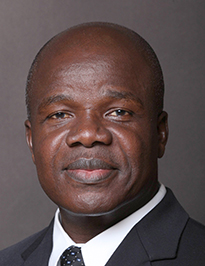
As the regional vice president of World Vision East Africa, Charles E. Owubah, oversees leadership and management of nine national offices in East Africa with an annual budget of $546 million and more than 6,000 staff. World Vision East Africa is a humanitarian organization dedicated to working with children, families, and their communities worldwide to reach their full potential by tackling the causes of poverty in more than 100 countries.
1988 B.S., Natural Resource Management, University of
Science & Technology, Kumasi, Ghana
1988-1990 Project Manager and Teaching Assistant, University
of Science & Technology, Kumasi, Ghana
1991 Consultant, Forestry Support Program, International
Forestry, USDA Forest Service, Washington, D.C.
1992 M.S., Natural Resource Management and Policy,
Purdue University
1992-1993 Consultant, Food Aid Management, Washington, D.C
1993-1995 Lecturer, Assistnat Project Manager, University of
Science & Technology, Kumasi, Ghana
1994 Consultant, Food Aid Management, Washington, D.C.
1999 Ph.D., Natural Resource Management and Policy,
Purdue University
1999-2007 World Vision, Inc., Wahsington D.C.
International Program Officer, 1999-2002
Monitoring and Evaluation Specialist, 2002-2004
Team Leader, East Africa Regional Team,
2004-2005
Director of Operations-HIV/AIDS, 2005-2007
2007-2009 National Director, World Vision Zambia, Lusaka
2009-present Regional Vice President, World Vision East Africa,
Nairobi, Kenya
Michael E. Pape (Ann Arbor, MI | Distinguished Ag Alumni: 2015)
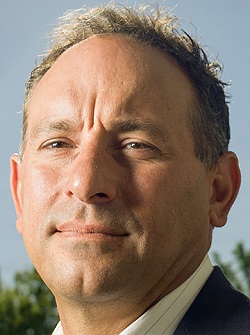
Michael Pape, PhD ’89, is a founding partner and managing director of Orchard Venture Partners and CEO of Nymirum, a private biotechnology company. He is an entrepreneur who has co-founded several life science companies.
Following postdoctoral work at Upjohn and a seven-year position as a research associate at Parke-Davis, Pape co-founded Esperion Therapeutics, serving as director, then senior director and, ultimately, vice president for cellular and molecular biology. Since 2004, Pape has focused on bringing drugs to market with the support of life sciences venture capital.
At Nymirum, a privately held drug discovery company based in Ann Arbor, Michigan, Pape has helped develop a proprietary technology platform that targets RNA with small molecules. At Upjohn and Parke-Davis/Warner-Lambert (now Pfizer) he was instrumental in the success of numerous cardiovascular drug discovery and development programs including Lipitor.
In 1998, Pape co-founded Esperion Therapeutics. He held a variety of executive positions and was involved in nearly all aspects of building Esperion, from its startup to its acquisition by Pfizer for $1.3 billion in 2004. He has also been an advisor or investor in numerous medical startup companies. He currently serves on the External Advisory Board for the Purdue Research Foundation Emerging Innovations Fund.
Which Purdue faculty member had the most profound impact on your professional career?
My PhD thesis advisor, Ki-Han Kim, played a big part in my scientific development. He pressed for rigor, repeatability, and proper controls in experimentation. That has served me well, whether I was doing the hands-on work or managing scientists. Jack Dixon was also a big influence since he was implementing the latest in molecular biology approaches in the mid-1980s. The Kim and Dixon labs were next to each other, which provided a dynamic environment for interaction.
What do you miss most about your college days at Purdue?
This might sound strange but there was a simplicity and pace to the Purdue environment that fostered a research mindset and interaction with other scientists. I don’t mean simplicity in a bad way. As a graduate student you are immersed in a research question, becoming intimate with it, experimentally trying to coax nature to give up its secrets, and talking with fellow students and professors. Purdue’s environment helped me to do that. It was the right place for my wife and I at that time in our lives. When I come back, that intangible sense of “place” comes back to me.
What is the best advice you got while you were at Purdue?
Who gave you the advice?
Ruthann Nichols was a postdoc when I was a new graduate student. She told me “to plan and do the experiment carefully.” As I watched her, she made the advice come to life, from her prep of the reagents to the execution of the experiment. It had a dramatic impact on me, not only when I was a hands-on experimentalist but also as I trained many young scientists over the years. In the business world it translates to “details do matter.” Due-diligence, the comprehensive appraisal of a project or entity, is a central activity in innovation, entrepreneurship, investing, and business. If you don’t do the little things well, then you won’t be successful with much bigger things.
What is the best advice you have ever given?
To whom did you give the advice?
I advise undergrads majoring in the hard sciences to do undergraduate research. They need to find out if they have the research bug, if they want to uncover the secrets of nature. No class-based laboratory can reproduce the energy one experiences when around researchers who don’t know the answer yet. When the hypothesis is tested experimentally and the answer revealed it’s like opening a special gift.
Sergio Pascholati (Piracicaba, Brazil | Distinguished Ag Alumni: 2016)
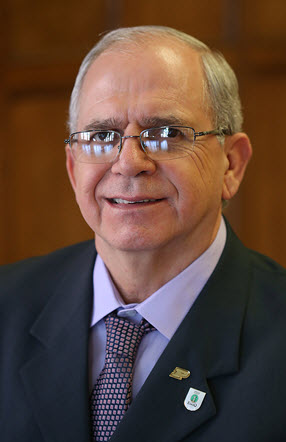
Sergio Pascholati is a professor in the department of phytopathology and nematology at the Luiz de Queiroz College of Agriculture, Sao Paulo University, Piracicaba, Brazil.
He has served as department head, president of the graduate school of the College of Agriculture and coordinator of the graduate program in plant pathology there. He started his scientific career at the Biological Institute in São Paulo. In his many roles, Pascholati has made significant contributions to graduate and undergraduate programs as well as to research in plant pathology and the biology of microbes that cause disease in major agricultural and horticultural crops.
After receiving his PhD in 1983, Pascholati returned to Purdue as a visiting scholar where he further developed his experience and skills in biochemical plant pathology research aimed at providing appropriate technologies to understand and manage recurrent disease challenges in agriculture.
Pascholati has trained a large number of undergraduate and graduate students including 25 master’s students, 22 PhD students and six postdoctoral scientists in various areas of microbiology, plant pathology and plant disease control.
A faculty member at Sao Paulo University since 1989, Pascholati was appointed a full professor in 2011.
Harry L. Pearson (, | Distinguished Ag Alumni: 1993)
Mr. Pearson, a Grant County native, is president of the Indiana Farm Bureau, Inc., the Farm Bureau Mutual Insurance Company of Indiana, the United Farm Bureau Life Insurance Company, Producers Marketing Association, Inc., the Indiana Agricultural Marketing Association, and the Indiana Farm Bureau Service Company. He is also involved in a family farming operation in Blackford County.
His first job after graduation was working as a herdsman on Purdue’s beef and dairy farms and as an administrative assistant in the Animal Sciences department. In 1968, he became a field assistant for Indiana Farm Bureau. He served as a member of the Indiana Farm Bureau Board of Directors from 1975 to 1982. In 1983 he was elected Vice President of the Indiana Farm Bureau leading to his current position as president in 1987.
Mr. Pearson serves agriculture both at the national and state levels. He is a member of the board of the American Farm Bureau Federation and of the board and executive committee of the National Producers Livestock Association. He also serves on the Agricultural Technical Advisory Committee of the United States Department of Agriculture and participated in President Clinton’s Economic Summit held in Little Rock, Arkansas, last December. At the state level he serves on the boards of the Indiana Beef Cattle Association; the Indiana 4 H Foundation Sponsors Board; the American Dairy Association of Indiana; and the Indiana Institute of Agriculture, Food and Nutrition. He is also a member of the Indiana State Fair Commission.
Mr. Pearson is widely recognized as one of Indiana’s key agricultural leaders. He served as a Blackford County Commissioner from 1979 to 1983. He is currently a member of the Greater Indianapolis Progress Committee and a member of the board of directors of the Oak Chapel United Methodist Church. Mr. Pearson is a member of the Purdue University President’s Advisory Council and a valued supporter of Purdue Agriculture.
J.B. Penn (McLean, VA | Distinguished Ag Alumni: 2000)
J.B. Penn ranks his trip to West Lafayette as a graduate student among the toughest of his life-a marathon drive from comparatively balmy Baton Rouge, La., that culminated with a bitter cold January snowstorm. The voyage to Purdue University, however, paved Penn’s path for considerably friendlier, and more colorful, journeys, “Department head Charlie French had a very aggressive management philosophy,” Penn recalls. “He recruited the best faculty and graduate students, and he greatly expanded the number of foreign students. The size and status of the program meant I competed against the very best, nationally and internationally.” • Penn has little competition when it comes to globe-trotting. He’s logged 65 trips to Poland, the first in 1982 at the height of the Cold War. Penn witnessed a dramatic metamorphosis through the years, one that took the country from black-and-white to Technicolor®. “Poland was a pretty bleak place before 1990,” he recalls. “The climate makes the afternoons seem dark, and lights were always dim. People didn’t care what they looked like. Their dress was very utilitarian and functional. “After the fall of Communism the change was remarkable-awnings appeared on buildings, streetcars were painted, and women started dressing in bright colors. People who were stifled just burst open with energy, enthusiasm, and creativity.” Travels occasionally take Penn back to his hometown of Leola, Ark., where his parents, both 95, still live on the home farm. Several years ago, Penn purchased the adjoining farm-500 rolling acres once owned by his grandfather.
Julio A. Penna (Buenos Aires, Argentina | Distinguished Ag Alumni: 1998)
After a wealth of global experience, Dr. Penna has traveled full circle and settled in his native land of Argentina. As head of the Department of Economics in the School of Agricultural Sciences at the Catholic University of Argentina, he fills the rolls of teacher, researcher, and administrator. Dr. Penna is also a senior economist at the Institute of Food Technology (INTA), a government-funded organization conducting agricultural research and establishing extension programs to provide the benefits of new technology directly
to farmers. Listed among INTA’s plentiful contributions are breeding developments in wheat, corn, potatoes, sugar cane, and cattle among others.
After receiving a bachelor’s degree from the University of Buenos Aires and a master’s degree from INTA, Dr. Penna ventured to Purdue University. Yearning to improve agriculture, and therefore, the quality of life for Argentines and other South Americans, Penna understood the need for international experience and understanding. For the past 25 years, Penna has continued to cultivate a relationship between Purdue and INTA as well as other universities he has been associated with, such as the Federal University of Vicosa in Brazil. Penna has welcomed Purdue faculty to Argentina in an effort to establish joint research, teaching, and exchange programs. He has also returned to Purdue himself, consulting with the deans of several Purdue schools.
Dr. Penna’s research and teachings have made monumental contributions to economic policy reform in Argentina by liberating trade, reducing agricultural subsidies, and adopting modern agricultural technology. His research provides convincing evidence to political leaders wishing to improve life for Argentina’s citizens. By spreading the findings of his work through the written word and powerful oration, Dr. Penna has distinguished himself as an accomplished leader in all aspects of agricultural economics.
For contributions to his profession and community, and for bringing distinction to his alma mater, Purdue University School of Agriculture is proud to present the Distinguished Alumnus Award to Dr. Julio A. Penna.
Chip Perfect (Lawrenceburg, IN | Distinguished Ag Alumni: 2006)
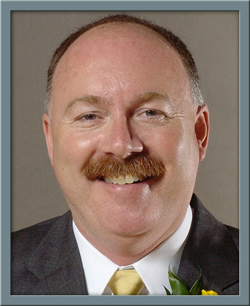
Six businesses in some 25 years markChip Perfect’s career accomplishments since earning a Purdue Universitybachelor’s in agricultural education in“I’m a serial entrepreneur,” he says. “I chose ag education because I thought I could get started teaching and have a summer business.”His initial venture was Indiana’s first professional landscape firm, which was later sold to its employees. Next came the family venture, Perfect North SlopesSki Area, created in 1980 on 100 hillside acres of the farm he grew up on in Dearborn County. Its startup time gavePerfect the chance to use his teaching degree at Rising Sun High School for four years, and he continues relying on it today to train a staff of 1,000 who welcome 250,000 guests “in about a100-day season” to the southern Indianalodge and slopes. Farming prepared him well for the ski business. “I already had the stomach for the difficulties of a weather-related business. In both skiing and farming, you have to be ready and willing to perform when the weather is right, and you never know when that’s going to be.”His unlikely success in a mountain-less state was recognized in 2001 when theNational Ski Area Association gave him its Sammy Award for significant industry contributions. Other recent entrepreneurial activities— all in his home county — include launching a contract packaging company, partnering in converting a one-million square-foot distillery into an industrial complex now housing a dozen businesses, and building a 10-screen movie theater and family restaurant.“My whole ag background propelled me in terms of leadership,” says the second of four siblings, who credits FFA,4-H, and Purdue.“It’s the doing, the pursuit,” that fuels his activity, he says. “I like coming here. I’m excited about what’s going to happen. And I like creating new ideas.”“The whole process of learning how to prepare for a class, how to learn, and how to study was huge for me. And learning to be an educator is valuable in what I do now, training managers.”
Ronald L. Phillips (, | Distinguished Ag Alumni: 1993)
Dr. Phillips, a native of Huntington County, Indiana is a professor of Genetics and Plant Breeding and director of the Plant Molecular Genetics Institute at the University of Minnesota. He is wellknown for his love of teaching. His graduate course in cytogenetics is particularly prominent and has been taught more than twenty times at the University of Minnesota and in Italy and China. He has advised thirty graduate students and several postdoctoral students. He was awarded the Outstanding Faculty Performance Northrup King Award in 1985 for his excellence in teaching.
Dr. Phillips developed one of the first modern biotechnology research programs. He is noted for his research on various aspects of plant genetics - bridging basic plant genetics with crop improvement. Dr. Phillips and a colleague were the first to regenerate corn plants from individual cells. This technological breakthrough has been highly recognized, and is now used by universities and companies around the world. There is great interest internationally in his subsequent studies of the variability among plants arising from tissue cultures. He has also developed laboratory screening procedures for improving the protein quality of corn and has identified a strain especially high in an essential amino acid required in the human diet. He and his students have been DNA-fingerprinting corn and oats and generating molecular genetic tags for important traits. They have recently begun to unravel the genetic biology of seed development.
Dr. Phillips is a fellow of the American Society of Agronomy, the Crop Science Society of America, and the American Association for the Advancement of Science. He received the Crop Science Research Award from the Crop Science Society of America in 1988. Dr. Phillips was recently recognized for his significant scientific contributions by being elected to membership in the National Academy of Sciences.
Craig S. Pikaard (Bloomington, IN | Distinguished Ag Alumni: 2010)
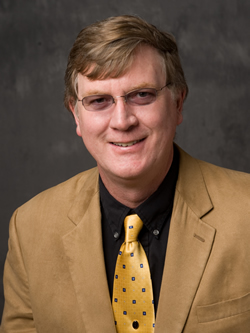
A new passion is always around the corner for Craig Pikaard, and his enthusiastic pursuit of new passions throughout his career has made him a leading researcher in plant epigenetics, an emerging area of plant molecular genetic research. Pikaard returned to Indiana this year to accept an endowed professorship at IndianaUniversity and joint appointments in theDepartment of Biology and new Department of Molecular and Cellular Biochemistry. Pikaard’s lab studies the ways in which genes are activated and repressed, using techniques of genetics, genomics, biochemistry, cell biology, and molecular biology. This multidisciplinary approach reflects “the beauty of biology these days,” he says. Born in New Jersey and raised mostly in Pennsylvania, Pikaard chose horticulture as his undergraduate major at Penn State, although he also loved English and biochemistry. At Purdue, courses in the relatively new field of molecular biology captivated him. He became especially interested in research investigating the molecular biology of gene expression. After NIH-supported work with Dr.Ronald H. Reeder at the Fred HutchinsonCancer Research Center in Seattle, Pikaardwent to Washington University. There he spent the next 19 years investigating the molecular and biochemical nature of the molecular machines that regulate gene expression in plants. This led him into the mainstream of research on gene silencing by short interfering RNAs—one of the hottest topics in plant and animal research. Pikaard thrives both on working with students and being the student himself. What most appeals to him is the creative, hands-on nature of research. “You have two parallel ideas, and you don’t see the connection right away,” he explains. “You can design your own experiment with your own hands to get to the edge of what we know and we don’t know. Then you can discuss these questions with other smart people.”With more than 95 manuscripts currently published and nearly $3 million in extramurally funded research, his return to Indiana opens a new chapter in an already-noteworthy research career. When not in the lab, Pikaard gravitates to the outdoors. He sails on Lake Monroe and still enjoys the hiking, cycling, and gardening that sparked his early interest in horticulture.“It was an exciting time at Purdue. As one of the first students in the interdepartmental plant physiology program, we crossed department boundaries to bring together people with a common scientific interest. Young, smart faculty hung out with the graduate students, and it was a hotbed of ideas.”
Daniel Ploper (Tucuman, Argentina | Distinguished Ag Alumni: 2009)
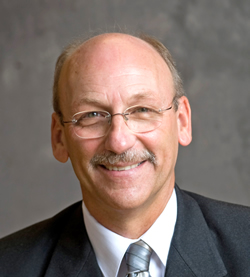
Two of his countless successes illustrate L. Daniel Ploper’s nearly30-year passion for plant pathology:post-epidemic eradications of soybean stem canker and frog eye leaf spot. Ploper directs the EstaciónAgroindustrial Obispo Colombres inTucumán, Argentina, the country’s oldest agricultural research station, founded with a staff of about 350, including 72 researchers at five locations, EEAOC’s challenge is to improve agricultural production through research and extension activities. He began his EEAOC work as a plant pathologist after earning his undergraduate degree. With eight years’ field experience, he came to Purdue on a Fulbright scholarship. He earned his master’s and doctoral degrees and then returned toEEAOC as a principal investigator, becoming head of the plant pathology section in 1996 and director in 2004.At the research station, his current focus is on integrating different tactics to control field crop diseases in soybeans, common beans, sugarcane, and citrus—lemons are one of Argentina’s largest crops—with special emphasis on developing disease-resistant cultivars.In 1994, Ploper added to his EEAOCworkload by beginning to teach at the National University of Tucumán, where he is now an associate professor and frequently guides graduate students. He has also taught graduate courses at National University of Buenos Aires andNational University of Catamarca.Since 1997, he has been an independent researcher at the NationalResearch Council of Argentina. In 2003, he co-founded the National Program onSoybean Rust created by the ArgentinaDepartment of Agriculture and other groups. He frequently presents at international scientific and technical meetings, has published extensively, and has received numerous awards.His work doesn’t allow much time for hobbies, but he enjoys photography, tennis, reading, and time with his family, which includes two sons and two daughters.“Purdue was the jumping board that propelled my professional career. As a Purdue alumnus,I knew I was expected to make a difference, and results show I was prepared for that challenge.”
Gerald A. Powell (Zionsville, IN | Distinguished Ag Alumni: 2005)
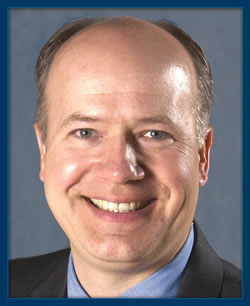
It’s been a busy 20 years for GeraldPowell since earning his Purduebachelor’s degree in agriculture. Although he’s been with the same company since graduation—today’s DowAgroSciences—over the years he’s held nine unique posts from sales representative to marketing and finance jobs. And he’s worked in Michigan, Nebraska, Illinois, and, since 1990, in his home state of Indiana.Four years ago, he joined the company's Six Sigma program. Since then, he’s served as a trainer and coach for 54 project managers who are SixSigma Black Belts. Together, they’ve so far achieved some $30 million in growth and efficiency projects in North andSouth America. That, Powell says, is his greatest career achievement. “Six Sigma is a wonderful way to improve business effectiveness. It’s the newest chapter in the book of quality.”He’s made his mark through “hard work—55-plus hours a week, every week—and an insatiable appetite for learning. It’s who I am.” Besides ongoing reading, he returned to Purdue for anM.B.A. in Food and Agribusiness in 2001.Powell is “a passionate user and advocate of technology,” and professionally has created a number of tools, models and reports that have been regionally and globally deployed by DowAgroSciences.A 4-H member as a youth, he was fascinated with electricity and electronics.He has been a volunteer for the organization since leaving Purdue. Today, he’s a 4-H leader and a parent who helps with his own children’s projects.Before he had a family, he enjoys windsurfing, sailing, water skiing, snow skiing and cross-country skiing. If the children take up those activities, he will again, too. For now, he likes vegetable gardening, landscaping, and family learning vacations, particularly to national parks.“At Purdue, I met talented, personable faculty who worked hard and accomplished amazing things. Like my parents, professors challenged me to ‘give it everything’ and‘good things will happen.’ Brilliant, actionable, effective advice that really works.”
Muhammad Abdur Razzaque (Dhaka, Bangladesh | Distinguished Ag Alumni: 2013)
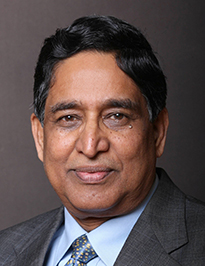
Muhammad Abdur Razzaque, Ph.D. 1983, has risen from the rold of a freedom fighter, struggling for Bangladesh to earn its independence from Pakistan in 1971, to become Minister of the People's Republic of Bangladesh Ministry of Food. Razzaque started his professional career as a scientific officer of the Bangladesh Agricultural Research Council (BARC), the apex organization of National Agricultural Reaserch System (NARS), and eventually was promoted to the rank of Chief Scientific Officer. He was the national coordinator of Integrated Farming System Research and Development, influenced the agriultural research policy to a great extent, and earned success in generating and implementing technology. Since he was appointed a minister in 2009, Razzaque has worked to reduce disaster risks while enhancing community resilience in the face of disaster and climate change.
1972 M.S., Bangladesh Agricultural University
1972-1973 General Secretary, Bangladesh Agricultural
University Central Student Union
1983 Ph.D., Purdue University
1976-2001 Bangladesh Agricultural Research Council
Scientific Officer, 1976-1979
Senior Scientific Officer, 1978-1986
Principal Scientific Officer, 1986-1994
Chief Scientific Officer, 1994-2001
1988-2001 Integrated Farming System Research and
Development
Associate Coordinator, 1988-1994
National Coordinator, 1994-2001
1996-1997 General Secretary, bangladesh Krishibid Institution
(the Professional Association of Agriculture
Graduates in Bangladesh)
2001-2009 Member of Parliment (elected in 2001 and 2008),
People's Republic of Bangladesh
2009-present People's Republic of Bangladesh
Minister for Food and Disaster Management,
2009-2012
Minister for Food, 2012-present
Kenda M. Resler Friend (Indianapolis, IN | Distinguished Ag Alumni: 2012)
Kenda Resler Friend is a communicator surrounded by scientists, salespeople, and engineers. In this diverse, cross-functional environment she brings the strength of building effective public relations teams and programs to improve communications with many audiences. Across her career, she has focused on efforts to reach out to corporate employees, investors, community stakeholders, and professional organizations — a skill essential now as she leads global communications efforts for Dow AgroSciences’ Enlist™Weed Control System.“This technology is coming forward to help farmers around the world address the accelerating challenge of weed resistance and hard-to-control weeds,” she says. She grew up in Goshen, Indiana, the granddaughter of farmers and daughter of teachers. When, at 16, she was named the Indiana winner of a 4-H competition sponsored by Bob Evans Restaurants, she and her parents traveled to Evans’ Ohiofarm to pick up her prize, a registered quarter horse weanling. During a weekend of trail rides, clinics, photo sessions, and social events with other state winners, the high school sophomore carefully observed the restaurant chain’s public relations director at work. Back in Elkhart County, where Purdue connections were strong, she asked her Purdue Extension educator if Purdueoffered “this thing called public relations.”That simple question, a strong work ethic, and increasingly complex assignments have taken her to the top of her field. She has been with Dow AgroSciences since2001: “This company has an amazing culture of teamwork, and everyone is so committed to the farmer who is the center of our universe.”She also validates the adage, “If you want to get something done, give it to a busy person.” Resler Friend is active inAgrIInstitute, an Indiana leadership development organization, and several professional groups. She remains supportive of 4-H and Purdue, and volunteers in her church and community. She and her husband Brian, a Purdue alumnus, have two future Boilermakers:“We have a second grader and a third grader, and the indoctrination process has begun — they can go to school anywhere they want in West Lafayette,” she jokes.
Matthew C. Reynolds (Auburn Hills, MI | Distinguished Ag Alumni: 2006)
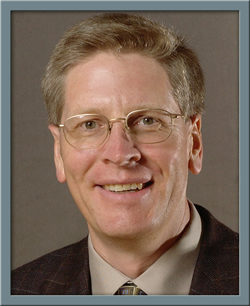
In an industry steered by customer demands and fueled by intense competition, it’s not enough to stay in the driver's seat. You’ve got to accelerate.“I’m competitive by nature, and while it's fun to compete, it’s much more fun to win,” says Matthew Reynolds, Director ofInterior Component Systems Engineering for the Daimler Chrysler Corporation. After graduating with a degree in Agricultural and Biological Engineering, Reynolds joined the Chrysler Center in1984 as a product engineer; he has racked up miles of victories ever since.In 1991, he was responsible for production of $60 million worth of parts to support manufacture of the LH sedan at two assembly plants. Currently, Reynolds leads InteriorComponent teams that design, develop, and integrate approximately 20 percent of the total vehicle cost on more than two million automobiles produced annually. His position combines an engineer's expertise with a keen knack for exceeding customer expectations.“Occupant safety has always been my key focus,” says Reynolds. To this end, he was instrumental in assessing and implementing enhanced interior vehicle features such as night vision, GlobalPositioning System location/maps, collision avoidance, and improved tractability. Reynolds’ initial work at Chrysler included development of new oils for use in transaxles, an early road marker pointing toward today’s biggest automotive industry challenge — advancement of alternative fuels and power systems. Over the next 20 years, he predicts engineering innovations will swerve from internal combustion engines and fuel sources will shift from fossil fuels to soybean fields.When it’s time for a detour, Reynoldstakes his competitive spirit to the great outdoors where he enjoys fly-fishing, mountain biking, and snow skiing.“Developing teamwork and leadership skills as part of undergraduate training is important. Ours is ultimately a ‘people’ business. The ability to bring many bright minds together to meet customer expectations is the key to success.”
Ronald R. Rice (Cincinnati, OH | Distinguished Ag Alumni: 1994)
Mr. Rice is Group Vice President of The Kroger Company, headquartered in Cincinnati, Ohio. He is also President of the company’s manufacturing operations, which includes nine dairy, nine bakery, four ice cream, two cheese, and five grocery product processing facilities that produce everything from pet foods to peanut butter. These facilities not only supply products for the 1280 Kroger food stores but also market their products to dozens of other national food companies. Mr. Rice, a native of North Manchester, Indiana, started with Kroger as a management trainee shortly after graduating from Purdue. He was made a general foreman at the company’s Dayton dairy in 1960 and also worked as a sales coordinator. In 1965, he became production superintendent at Kroger’s new dairy in Springdale, Ohio. Two years later, he was promoted to plant manager of the company’s Indianapolis dairy and was instrumental in Kroger’s decision to replace the old dairy with a new, state-of-the- art dairy plant in 1971. In 1973, Mr. Rice became Director of Operations of the Dairy Foods Division and a year later was promoted to Vice President of the division. His duties expanded in 1986 when he assumed the position of Vice President of the Dairy/Bakery Division. In 1991, he was named President of the division and a year later was promoted to Group Vice President for all of Kroger’s manufacturing operations. Mr. Rice is a leader, not only within his own company, but as an active affiliate of food industry professional and trade organizations. He has served as president of the Midwest Dairy Products Association, secretary and board member of the Milk Industry Foundation, and vice chairman of the International Ice Cream Association. Mr. Rice currently serves as chairman of the International Ice Cream Association. He is also the founder and chairman of the newly created International Dairy Foods Association.
James Rieth (Spicer, MN | Distinguished Ag Alumni: 1997)
Dr. Rieth is president and chief executive officer of Jennie-O Foods, a subsidiary of Hormel Foods Corp., and the second largest turkey processing company in the United States. With Hormel since 1963, Dr. Rieth has climbed the ranks from industrial engineer to vice president of engineering. He has held a variety of management positions during his tenure, and was once president and CEO of another Hormel subsidiary, Farm Fresh Catfish. Along the way, he has been involved with many facets of Hormel’s products, including the beef, pork, aquaculture, and poultry industries.
Dr. Rieth strives for continuous quality improvement and inspires success by effectively communicating with producers and motivating employees. Jennie-O’s methods of contracting with turkey producers allow much more flexibility than is typical of other processors in the industry.
Dr. Rieth’s interest in the food processing industry began with a summer job at a meat packing plant in his hometown in Muncie, IN. Desiring to combine technical knowledge with management skills, he embarked on his extensive education at Purdue, in a variety of disciplines. At a completion of his studies, he received an Honorable Mention at the National Agriculture Economics Dissertation Competition in 1972. Since graduating from Purdue, Dr. Rieth has returned to participate in the Krannert Executives in the Classroom program, and was honored as an Old Master in 1996.
Dr. Rieth is a member of the National Turkey Federation Executive Committee; a member of the Wilmar Area Quality Control Council and the Wilmar Rotary Club; and is on the Regional Executive Board of the Boy Scouts of America. Dr. Rieth also has been involved with the YMCA, United Way, and the Salvation Army.
Roy Riggs (North Salem, IN | Distinguished Ag Alumni: 2008)
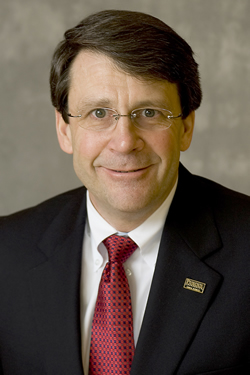
Growing up on a southern Indianadairy farm, Roy Riggs knew early that he wanted to work in animal health. After graduating from Purdue University in1979, his first choice in employers wasElanco Animal Health. He landed the job and has been there since, building an enviable career. Starting in sales, he went on to lead swine and cattle units, working at offices in Iowa, Minnesota, Texas, and Indiana. This year, he became director of global specialty business, developing the vision, strategies, and teams for innovative products entering the pipeline that are outside Elanco’s core businesses. While work that is helping to feed the world is “where I get hooked,” Riggs says his strong suit is the people side. “I really like developing people and helping teams reach their potential. I find out what people like to do and are good at, and I put them in those roles.”He also enjoys positively impacting the business in strategy and results. His work has involved travel, including trips to Europe, Japan, Korea, and Taiwan. Riggs has been active in industry groups, such as the Center for FoodIntegrity and Indiana’s Grow AmericaProject, and at Purdue, serving on the president's Council and College ofAgriculture Dean’s Advisory Council. A member of Purdue MusicalOrganizations during his college years, today his singing is occasional, usually at church. In his spare time, the father of four has given to FFA as a judge and to 4-H, helping about a dozen city youngsters raise calves. He’s currently an assistant coach for a travelling youth basketball team, and he’s also coached youth football and baseball. He lives on a 20-acre site with four horses, a bunny, two dogs, and “too many cats.”“It’s important to follow your passions, to understand your innate talents, and to maximize those. Keep learning, keep challenging yourself, keep a broad, long-term view, and have fun.”
Max T. Rodibaugh (Frankfort, IN | Distinguished Ag Alumni: 2006)
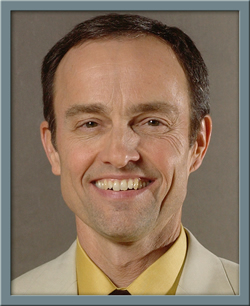
A lifelong fascination with biology and science, growing-up on a Rensselaergrain and purebred swine farm, and enjoying his work with pigs made MaxRodibaugh’s career choice an obvious one: swine health. He began his studies as a youngster, tending to the pigs and showing swine in4-H. He went on to earn a bachelor’s in general agriculture from Purdue in1974, his doctor of veterinary of medicine, also from Purdue, in 1977, and in 2000, a certificate in swine health management in the University of Illinois’Executive Veterinary Program. His first three years as a veterinarian, he worked for John Coltrain, DMV, in Thorntown, Indiana, then in 1980founded Swine Health Services in Frankfort, Indiana, one of the nation's first practices devoted entirely to swine. Today, it’s a two-vet practice that serves hers from 150 to 11,000 sows. He also provides swine health consultations, which have taken him to several states as well as to Mexico and Peru. His passion is helping producers solve health and production problems, Rodibaugh says. “I still find the scientific aspect challenging and the day-to-day work interesting. And the people are great. That’s what makes my day, hoping I can be of service to them.”Rodibaugh has served numerous leadership posts in the American Association of Swine Veterinarians, Indiana Veterinary Medical Association, and other industry groups. He frequently gives presentations at swine meetings and conferences. His pastimes include perennial flower gardening, reading, genealogy, photography, and skiing.“Besides a great education, at Purdue developed one-on-one relationships with professors — people I can always call on for their expertise, people who care about what I’m doing and want to help out.”
Thomas Roney (Greenfield, IN | Distinguished Ag Alumni: 1998)
When Mr. Roney was ten years old, he launched his career on his family's farm, today known as Tuttle Orchards Incorporated. By 1977, he was president of the 140-acre fruit, vegetable, and greenhouse production operation and on-site farm market. For decades, farm markets have been a staple of many rural communities across the heartland. Under Mr. Roney's direction, Tuttle Orchards has continued to improve this American tradition by providing greater Hancock County residents with fresh apples, strawberries, sweet corn, pumpkins, bedding plants and much more.
Mr. Roney has benefited his community more widely than by merely filling its pantries. He has held office in numerous councils affiliated with Resource Conservation and Development programs for improving communities. He is also Past Member of the Hancock County Planning Commission and the Hancock County Council. In an effort to improve agriculture, he was appointed member of the Deans Advisory Council for the School of Agriculture at Purdue University, the Indiana Pesticide Review Board, and the Area 6 Council for Agricultural Research, Education, and Teaching (CARET) Committee.
Mr. Roney has continually distinguished himself as a progressive individual in the fruit and vegetable industry. He is President of the Indiana Vegetable Growers Association and an active Past President of the Indiana Horticulture Society. As a producer, he received the Indiana Prairie Farmer Master Farmer Award in 1997 and the Indiana Horticulture Society's "Golden Apple Award" in 1995.
Today, Mr. Roney continues to use Tuttle Orchards as a teaching instrument. Inviting both college students and elementary schoolchildren alike to tour the orchards, he demonstrates to younger generations the significance of the family farm in today's society.
For contributions to his profession and community, and for bringing distinction to his alma mater, Purdue University School of Agriculture is proud to present the Distinguished Alumnus Award to Mr. Thomas E. Roney.
Nicholas L. Rozzi (Douglassville, PA | Distinguished Ag Alumni: 2014)
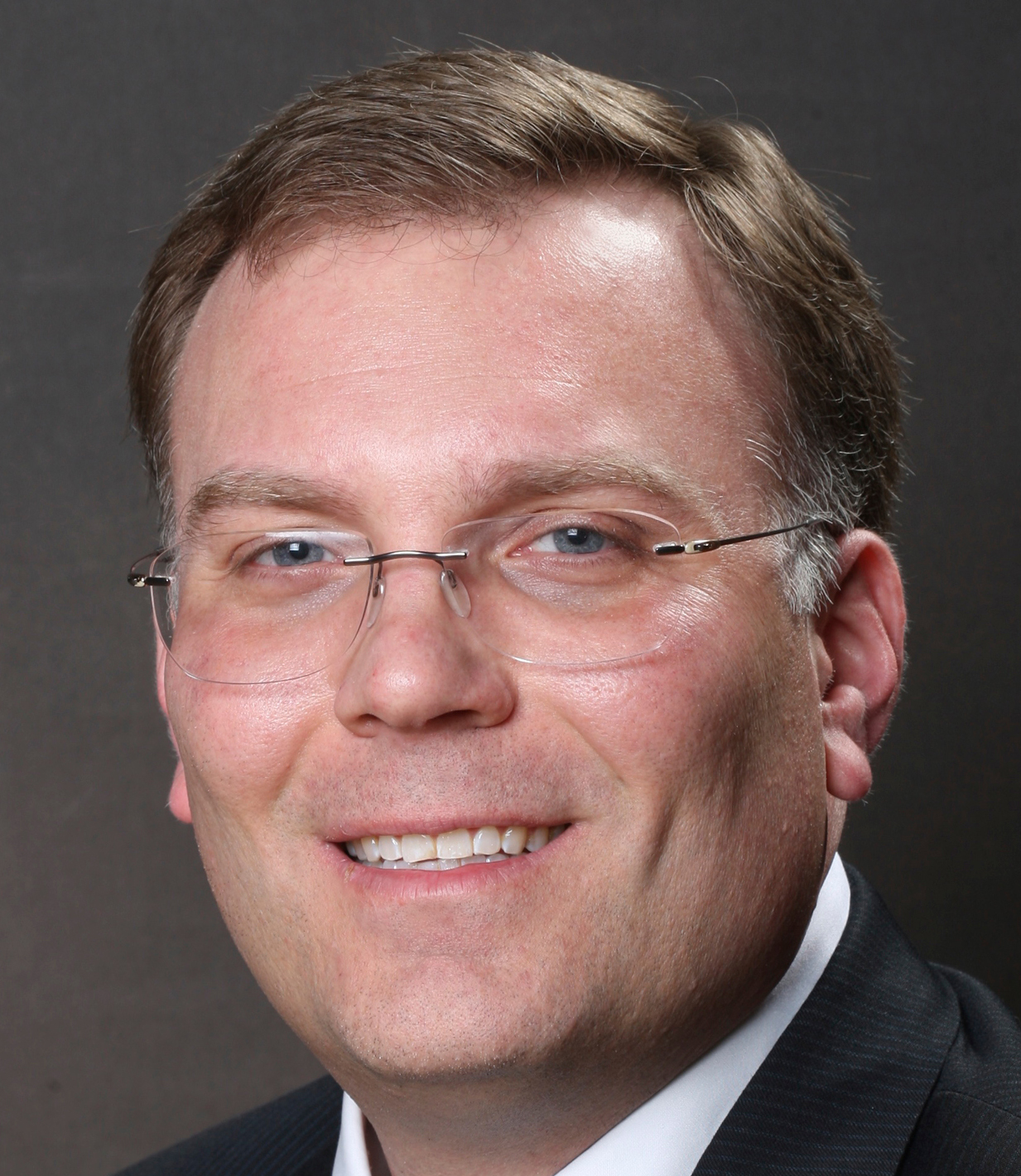
Nicholas L. Rozzi, B.S. ‘97, Ph.D. ‘01, was born outside Philadelphia. Now, after living in eight different states, he has found his way back to Pennsylvania as director of global commercialization for GodivaChocolatier, Inc., in Reading. Godiva manufactures and sells premium chocolates and confections in more than 10,000locations in 80 countries worldwide. Rozzi joined Godiva in 2007 as NorthAmerican Commercialization Manager and was appointed to his present position in. He has responsibility for the transition of products from bench-top chef-designed prototypes through pilot and industrial production on a global scale, leading teams based out of Reading, Pa., and Brussels, Belgium. Rozzi continues to support Purdue’sDepartment of Food Science. As an adjunct faculty member, Rozzi shares his expertise and enthusiasm for product development and technical aspects of food science as a regular guest lecturer in core food science classes and as a general mentor to undergraduate and graduate students. What part of your visit back to campus inMarch are you most looking forward to? I always enjoy traveling back to the Department of Food Science and meeting with the faculty and students. Even though some of the names have changed since I was a student, I have been able to forge new relationships and continue my connection with the University. I also always take a walk around the campus in the evening to see how it has expanded and improved over the years. Why did you select Purdue as the place to continue your education? A combination of factors went into my decision to attend Purdue for my undergraduate degree: academic reputation, cost, and distance from home. I went to high school in Libertyville, ill., soPurdue was not too close, but not too far away. Though, when it came down to the final decision between Purdue University and University of Illinois, I always enjoyed my Purdue campus visits, more than those to other schools. What do you miss most about your college days at Purdue? Taking walks on campus with my wife, Laura. We met and were married while in graduate school and used to take walks on campus for breaks while doing research in the evenings. I even proposed to her on one of those walks next to the fountain in front of Hovde Hall. What was the most difficult course you took at Purdue? What made it so difficult for you? Organic chemistry. I had taken the introductory chemistry classes in high school, so I started right into organic chemistry as a freshman, not really knowing how to study. It was quite a change, and forced me to quickly learn how to study for difficult courses. What is the best advice you got while you were at Purdue? Who gave you the advice? In 1994, Steve Smith suggested I go to work in the Food Science pilot plant with him. This provided me with early experience in my major, helped to place me in my first and second internships, and introduced me to my best friend and classmate, Dr. Keith Vorst. What is the best advice you have ever given? To whom did you give the advice? I come back to talk for FS 443 (FoodProduct Design (Capstone)) every spring, and always share this advice: Do not be afraid of taking on some of the dirty jobs that no one else wants to do. You can never be sure where they will lead. I did some work with the production team in my first job out of college, which led to my next two promotions.
Lawrence R. Rueff (Greensburg, IN | Distinguished Ag Alumni: 2001)
When Larry Rueff walks a famous Civil War battlefield, he traverses more than landscape. Rather, the self-described history buff sees stories unfolding - tales only Gettysburg or Chickamauga can tell. “These soldiers were people just like us,” says Rueff, whose Civil War study spans 15 years. “They were just caught up in a very tragic situation at an amazing time in United States history.” Rueff collects old photographs and newspaper articles about the Civil War as well. “It’s intriguing to chronicle the country’s transition,” he says. Rueff’s mother, Jean, an 83-year-old former schoolteacher, first opened his eyes to history. “Mom always said people made history boring by taking the story out of it,” Rueff recalls. “When you put in stories, people come alive, and it’s fascinating.” He recalls family vacations to Boston and sites such as the Old North Church and Liberty Bell. “Those trips really hooked me. Mom had a story for everything I saw.” One of her favorite tales always included a chapter on her son, the history teacher, Rueff laughs. Although his career path diverged from that foretold by his mother, he shares his mother’s love of storytelling, giving frequent presentations to the Rotary Club and other local groups. History will come alive for him again this summer, when Rueff and two friends travel to Vicksburg, Mississippi. Civil War battlefield jaunts are an annual tradition for the three, who share a passion for history. “When I visited Chickamauga in Georgia, I learned one of the battle heroes was a soldier from Greensburg,” Rueff says. “After the war, he moved south and became the mayor of Chattanooga. “Those are the stories I love to hear, and I love to tell.”
Kenneth B. Rulon (Cicero, Indiana | Distinguished Ag Alumni: 2003)
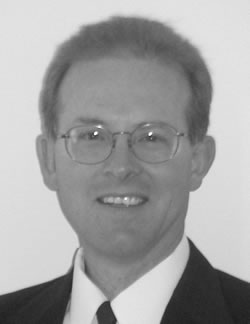
At 19 feet, boldly dressed in deep sky blue and white, Lady Jane presents a striking image. She’s great fun, too, on Indiana’s lakes. But floating and water skiing are this boat’s secondary purposes. Her most important task is providing opportunities for the Rulon family to enjoy time together.
“Our value structure is faith, family, and farm, in that order,” says Kenneth Rulon, parent with his wife Jane of two teenage daughters, Jennifer and Kathryn. The idea for the boat came during a “family pow wow” a couple of years ago, when everyone listed the top 10 things they’d like to see and do in North America. “Everyone did their list independently, and when we came back together, a boat was number one for Jane and the girls and number two for me.”
Lady Jane joined the family last June. “We all went shopping to buy it after listing all the features and benefits we wanted. We include everyone in these things,” Rulon says. Sixteen times that first summer, they were on the water together. “We can be skiing within 21 minutes of home,” he says. It’s a new sport for them, and “all four of us are in various stages of learning,” Rulon says. “For me, it’s easier to fall than it used to be, and it seems to hurt a little longer.”
Besides being a vessel for family togetherness, the Lady Jane provides a break for these high-achievers in school and work. “Once you get into the boat, you leave the world at the dock,” Rulon says. “You don’t have peer pressure. You can turn off the cell phones. And it’s a good family getaway.”
1982 B.S., Agricultural Economics, Purdue University
1982-1991 Marketing specialist, plastics industry
1991-present Rulon Enterprises, Cicero, Indiana, (overseeing financial planning, accounting, risk management, marketing, corn planting, and field harvest operations for 5,000-acre family farm business)
1992 Co-founded peer review group of 11 large Indiana families operating more than 57,000 acres
1993 Named Top Marketer by Top Producer magazine
“The life-long benefit of my time at Purdue was learning how to ask questions, critically evaluate the answers, and think about how to best apply the conclusion to our farm business.”
Claire Sawyers (Media, PA | Distinguished Ag Alumni: 2008)
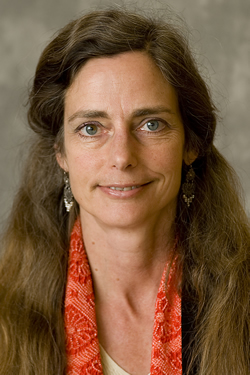
When Claire E. Sawyers set out to master horticulture, she made the world her textbook. By the time she earned her Purdue master’s in 1981, she’d spent a semester in Japan, cultivated the private garden of Princess Sturdza in France, and gardened at Belgium’s KalmthoutArboretum.She next spent seven years at the Mt.Cuba Center for the Study of PiedmontFlora in Delaware, developing the systems and framework for a private estate to become a public garden. Her work included computerizing plant records, labeling and mapping the collection, and developing tour and volunteer programs. In 1990, she was named director of the Scott Arboretum of SwarthmoreCollege. There, she directs a staff of 22, developing and maintaining the 330-acre campus arboretum that showcases more than 4,000 types of ornamental plants. Sawyers believes public horticulture is a bridge between art and science, between people and plants. “That’s what gets me excited. There is a calling and a deep sense of gratification being part of that bridge.”As with her studies, her career often takes her to other lands, most recently to Mexico to learn more about cycads, a group of slow-growing plants. She also regularly leads garden trips and has taken groups to U.S. spots, Scotland, England, South Africa, and Japan. Her most recent accomplishment is the2008 publication of The AuthenticGarden: Five Principles for Cultivating a Sense of Place. She’s both author andphotographer. The seed for writing was planted at Purdue, where she wrote and edited for a horticulture publication. She’s taken more than 10,000 slides of plants and gardens, many of which are published. She enjoys her home garden—“I do love the physical act and creative process.” And her pastimes also include public speaking, traveling, scuba diving, visiting museums, and ballroom, contra, swing, salsa, and cajun dancing.“So much came to me from the contacts I made at Purdue, the relationships I built with the faculty and staff. For students, that can be life-shaping and set you on a wonderful path.”
Bruce A. Scherr (Memphis, TN | Distinguished Ag Alumni: 2007)
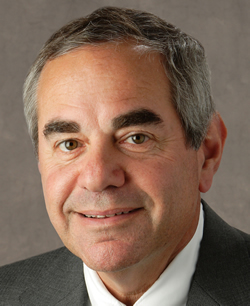
When it comes to boundless energy and unbridled enthusiasm for the task at hand, Bruce Scherr’s wife, Susie, occasionally compares him to his three-year-old grandson — a resemblance appreciated by Scherr, his employees, and hundreds of global clients alike. As Chairman of the Board and ChiefExecutive Officer of Informa Economics,Inc., a company he founded as AgriCommodities in 1981, Scherr heads one of the world’s premier agricultural and commodity research, analyses, and consulting firms. Informa Economics provides high-end services to over 750food and agribusiness firms and organizations worldwide from offices in Memphis, Washington D.C., Minneapolis, and Winnipeg, Manitoba. Scherr’s most significant career milestones are also those he applies to his company today. As a divisional vice president at Data Resources Inc. from1974 to 1979, he developed and utilized the first commercially available econometric model for U.S. agriculture— fully interactive forecasting tool designed to provide problem-solving information. This breakthrough led to advisory roles with numerous government agencies, including the President’s Council of Economic Advisers and the NationalAeronautics and Space Administration.His company’s success hinges on sensitivity to clients’ issues and opportunities, and Scherr believes the advent of renewable fuels, “the single biggest event to affect global agriculture in fifty years,” represents both.“It’s like taking a giant boulder and throwing it into a still pond,” he says.“Ethanol production has broad, farreaching consequences from farmer to consumer and everyone in between.”Scherr may match the vigor of a three year-old, but his peers equally energize him. “We have two assets — our people and our clients. And the more talented your client base, and the tougher their questions, the better you are as a consultant.”“Working with great people around the world to seize opportunities and to solve challenging problems defines my career, and Purdue University was the primary contributor that enabled this experience.”
Lee E. Schmidt (Scottsdale, AZ | Distinguished Ag Alumni: 2004)
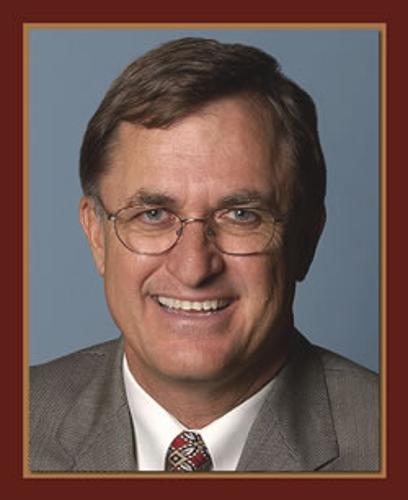
Nearly anything can spark the creator in Lee Schmidt—a cactus growing in his Arizona yard, an abandoned quarry, or even a 1939 Chevrolet.“I’m constantly reworking things,” says the Carmel, Indiana, native, who hails from a family of Purdue University graduates. “I move flower beds around in my yard, or, when I golf, I imagine the back edge of a hole’s bunker a couple feet higher.”The inclination comes naturally, Schmidt says, and traces its roots to high school summers employed as a golf course maintenance worker for the Indianapolis Country Club. Proximity toIndy—specifically to the Indy 500—also fueled an enduring passion for automobiles. And although it’s been decades, Schmidt still remembers “the one that got away.”“When I was in college, my brother and I saved money and were all set to buy a Model A Roadster,” he recalls.“We went to the auto auction, and learned it had been sold the day before.”His interest didn’t wane, though. Schmidt recently restored a 1939 Chevrolet and often frequents auto races and antique car auctions. “I really like the older styles, because you can immediately identify them,” he says. The1932 Ford, with its distinctive, over-sized grille and headlights perched atop front fenders, tops his list of all-time favorites. Traveling the world also inspires creativity, Schmidt believes. He and his wife, Jean, and children Kyle and Kelly lived in Hong Kong years ago when Schmidt worked for Jack NicklausDesign, and he’s traveled to Asia at least once a month for the past twelve years. The journeys have taught lessons in everything from bunkers and greens, to people and plants.“It’s not all about how we do things,” he says, “and traveling has truly opened my eyes to another side of this world.”“I was very fortunate to have studied under Dr. Daniel, a pioneer in turf grass management. Purdue University prepared me well for a challenging career and exciting life experiences.”
Rebecca Schroeder (Albion, IN | Distinguished Ag Alumni: 2018)
In 1996, the Department of Animal Sciences chose Rebecca Schroeder as the Outstanding Senior. She’s been validating that choice ever since. Schroeder joined Whiteshire Hamroc LLC, a family farming operation in Albion, northwest of Fort Wayne, soon after graduating with distinction. She spent a year and a half as Farrowing Manager (800 sows in a farrow-to-finish breeding stock operation), then 10 years as Production Manager, burnishing people skills while managing multiple production sites with a staff of 10 to 15. A year as General Manager prepared her to become President in 2008. Whiteshire Hamroc LLC is an innovative pork production company that also markets high-quality genetics worldwide, and engineers and markets cutting-edge confinement and ventilation systems (AirWorks) that minimize pathogen loads and disease transfer. Schroeder has overseen the company’s transition from a commodity-based business to a value-based business. Schroeder is a member of the Communications Committee for AgriNovus Indiana, the agbiosciences initiative that seeks to advance the sector as a nationally recognized leader in the development of innovative products and services. She’s also on the Ivy Tech Community College Ag Advisory Board, the National Pork Board’s Operation Main Street Program, and the Purdue Animal Science’s Advisory Board. The 2014 Albion Citizen of the Year serves on several boards and committees, including the Community Foundation of Noble County Executive Board, the Noble County Economic Redevelopment Commission, and the Noble County Comprehensive Plan Revision Steering Committee.
Kenneth L. Schwab (Shreveport, LA | Distinguished Ag Alumni: 2000)
Kenneth Schwab sees many lives in• pieces of wood, and his visions inspire handcrafted furniture designed to link generations. An old walnut tree on the family’s Wolcott, Ind., dairy farm captured his heart and imagination, Schwab says. When the tree was cut down, he kept several large pieces. And when Schwab took up woodworking years later, he honed his skills on the pieces of wood that represented family, permanency, and roots, fashioning an intricate loveseat that graces the entryway of his Shreveport, La., home. “Woodworking is very therapeutic,” Schwab says. .”It’s so rewarding to have tangible, hands-on evidence. of completing a task don’t always experience that in the ‘people’ business,” A handcrafted wooden rocking horse stands sentry in the entryway as well. His three sons have long outgrown it, but the toy remains a sentimental favorite, Schwab says. Hidden treasures are joys as well. Schwab is always on the hunt for antiques and he’s an avid refinisher. “I like to find old furniture that’s been painted,’’ he says. “It’s rewarding to liberate the beautiful wood that lies under the surface.” Stories lie beneath the veneers as well. A cabinet, handcrafted by Schwab’s great, great, great-grandfather and passed down to the oldest son of each generation, serves as an enduring lesson in history and perspective. “I look at that piece every day, and I’m reminded of its many lives in many different homes throughout the decades,” Schwab says. “It carries an incredibly rich history. “I find the older I get, the more connected I am with family and heritage. My family is my passion.”
Robert M. Schweikher (, | Distinguished Ag Alumni: 1993)
Mr. Schweikher is vice president and chief operating officer of the Orcon Corporation based in California. Orcon is the leading international supplier of advanced insulation material systems to commercial airframe and aerospace manufacturers. He is also president and chief executive officer of Chagrin, Ltd., a private consulting group involved in guiding advanced materials, biotechnology, electronic materials and specialty chemical companies through the initial start-up phases.
Upon graduation from Purdue University, Mr. Schweikher served in the U.S. Army Corps of Engineers. In 1960, he joined the Monsanto Company as product supervisor of their Agricultural Division. He held several key management positions with Monsanto. From 1963 to 1967 he built and managed the 23 Monsanto agricultural retail centers located in Indiana and Kentucky involved in the sale of bulk blended and liquid fertilizers and herbicides. In his assignment as director of new products from 1971 to 1974, he provided the oversight management for the successful worldwide development and commercialization of the successful Lasso and Roundup (Glyphosate) herbicides and Polaris (Glyphosine) sugar cane ripener. He then became the first director of marketing in the Electronics Division of Monsanto.
Mr. Schweikher left Monsanto in 1977 to become vice president and general manager of the Crop Chemicals Group of Mobil Chemical. He was responsible for all aspects of the worldwide operations of this herbicide, soil insecticide and cotton defoliant business. From 1981 to 1984 he served as executive vice president of the Allied Chemical Company and president of the Allied Technologies Company. He had worldwide management responsibilities for many diverse businesses, technologies, and venture capital investments in the agricultural, chemical, and electronics industries. He was also a founding member of the Board of Directors of Calgene, a prominent biotechnology firm.
Mr. Schweikher has had operating accountability and responsibility for companies and or businesses that have spanned from the startup stage to $600 million in size. He has supervised and managed manufacturing, marketing/sales, and research and development operations in the Pacific Basin, Latin America, and Europe.
Sue A. Shadley (Indianapolis, IN | Distinguished Ag Alumni: 2000)
Sue Shadley believes in the magic of open spaces, cherishing equally the charms of her six and one-half forested acres in north Monroe County and the spells cast in the wilds of Africa. Preserving such riches is her life’s passion. “I felt so wonderful when I stood in the middle of African grasslands and realized how much land has been set aside,” says Shadley, who has .traveled twice to Africa. “We lose so much with every endangered species that disappears. Balancing human needs with wildlife needs is a critical, delicate task.” The leopard initially inspired Shadley’s visions of Africa and fueled her passion for wildlife. She studied the endangered species and researched laws to protect it for an undergraduate class project. “I knew someday I’d have to see this animal,” Shadley recalls. “My first trip to Africa, I saw wildebeest, hippopotamus, antelope, cheetahs-even giraffes running alongside the dirt runway when we landed in Nairobi-but no leopards. “I went back a few years ago and had to go all the way into Tanzania to see a leopard. But I saw one, sound asleep in a tree.” Closer to home, Shadley is slowly but steadily turning her property back to forest. Since buying the land in 1986, she’s planted about 500 White Pine, Norway Spruce and Red Pine, and an arboretum, situated along her creek, boasts 30 varieties. Shadley also is nurturing a flower garden planted a century ago by the property’s original owner. Under her green thumb, hundred-year-old rose bushes and peonies thrive. “I’ve always loved nature, animals, and the outdoors,” Shadley says. “Mom tells me that when I was a baby, all she’d have to do to keep me happy was to lay me under a tree and let me watch the leaves blow.”
Henry L. Shands (Fort Collins, CO | Distinguished Ag Alumni: 2001)
Good stewardship and a willingness to treat others fairly guide the work of Henry Shands, whose career spans academics, industry and government. He currently is director of the National Seed Storage Laboratory and National Animal Germplasm Program in Fort Collins, Colorado. To give him focus for the day ahead, he takes an early morning run. “When I’m on my run, I can think most clearly,” he says. “It’s a time to contemplate what I’m going to be doing during the day, to think ahead and to think things through. It’s been especially helpful when dealing with international negotiations and sensitive subjects.” His international associations also are enhanced by the years he spent at Purdue, where he knew students from around the world. “I still have contact with many outstanding students I met at Purdue. That’s been a wonderful association, having that linkage, and it stimulated much of my interest in the international scene.” In Fort Collins, he says, “We have agreements with many of these countries, storing seeds for security. It’s nice to have linkages that transcend years of time and political wars. The bond you get as a co-student is something to be cherished.” While going the distance as a jogger helps him do the same on the job, running also has been a lifelong interest. He has passed the finish lines in marathons from Boston to Toronto, Indianapolis to Wichita. And now that he lives in Colorado, he’s added cross-country skiing to his outdoor repertoire. “I have to have something during the day to keep me somewhat fit to tackle the rest of the day,” he says. Indoors, he enjoys making fine furniture “when I have time,” and many pieces now fill his children’s homes.
Bradley T. Sheares (Lansdale, Pennsylvania | Distinguished Ag Alumni: 2002)
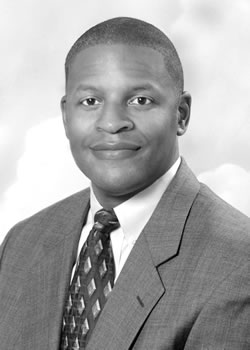
Ask anyone who knows him. In every language, the name Brad Sheares translates to “basketball nut.”
“I played on Purdue co-rec and intramural teams, but I was told to never quit my day job,” laughs Sheares. His love of the game hasn’t dimmed through the years, and he’s equally enthralled whether the competition is at the elementary school level or the pros.
Basketball fever is contagious, he says. Sheares’ three daughters play the game, and he thoroughly enjoys rotating one of the three to join him for Philadelphia 76ers games. “There’s no better experience than sharing the excitement and exhilaration of basketball with my daughters,” Sheares says.
Road trips are a symptom of basketball fever too, and the 2000 Indianapolis Final Four experience was a particular highlight. “I got tickets at the last minute and invited my brother, Reuben, who’s a cardiologist in Columbus, Ohio. We drove back to Columbus after the games, because there were no hotel rooms available. Even the clocks worked in our favor. Columbus switched to daylight savings time on Sunday, so we gained an extra hour of Indianapolis excitement along with Monday’s final game.” On the job, memorabilia such as Michael Jordan etchings, a signed basketball, and coffee table books find special spots in Sheares’ office.
An accomplished businessman with a scientist’s perspective, Sheares also sees basketball’s practical life applications. “There’s an art and science to the game. It’s a true team sport because you can see vividly how a team plays better than any single individual. Even if an individual is not particularly skilled, if he or she plays hard and sound, the team benefits as a whole.”
Angela L. Siemens (Wichita, KS | Distinguished Ag Alumni: 2011)
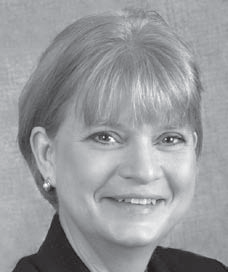
Angie Siemens grew up on a diversified livestock and grain farm near Connersville, Indiana, the oldest of five sisters. Her father didn’t hire any help. The strong midwest work ethic instilled on the farm has served Siemens well in a career dedicated to developing and implementing quality assurance and safety principles and management practices. As vice president of technical services for the Cargill Animal Protein division of Cargill, Inc., Siemens manages food safety for a $17 billion beef, pork, turkey, and meat processing company. She oversees all aspects of food safety and quality control in 32facilities in the United States and Canada. Her expertise in food safety came not in her formal education but in her working career. The first weekend of her senior year at Purdue, she married fellow animal sciences student Mike Siemens, and the two would pursue divergent but parallel paths in which they alternately followed and led each other’s job choices (he currently oversees animal welfare efforts for Cargill’s global meat businesses). After earning her doctorate in meat science with a collateral emphasis on statistics, she went to Washington, D.C., as a Congressional Science Fellow, which both capitalized on her research skills and shaped her interest in regulatory issues. To move closer to her husband’s work in Wisconsin, she spent a year in research and development at Beatrice Foods and the next in an Oscar Mayer Foods plant in a position for which she was clearly overqualified. But this period provided her “a pretty amazing combination of governmental training, technical training, and real-world plant experience.” From that broad base, she moved into the regulations and requirements group atOscar Mayer, which put her on her progressive track in food safety, in executive positions at Smithfield PackingCompany and since 2006, at Cargill. The couple keeps busy with their9-year-old son, church activities, and 80acres — although they’re still negotiating the number of four-legged creatures that will eventually occupy the property.
Sharrann E. Simmons (Wayne, New Jersey | Distinguished Ag Alumni: 2003)
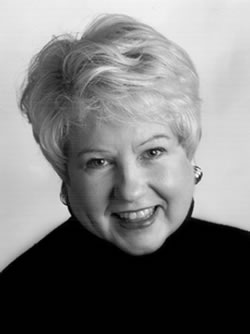
An only child, Sharrann Simmons appreciated the value of personal connections at a young age. The Merrillville native lost her mother as a child, and her father died when she was a senior at Purdue. Comfort, Simmons says, came through reaching out to others.
“I have a 90-year-old aunt who lives in Atlanta, and I’ve visited her at Christmas every year since I graduated from Purdue,” says Simmons, who maintains many friendships from her college days. “I also spend a lot of time with friends, wherever they live.”
Distance is an enticement, rather than a deterrent, Simmons insists. “Travel is a passion of mine,” she says, “and if I have the chance to fly to London or Paris for a weekend, I’ll take it every time. I’ve always been open to new opportunities, and I love the exposure to people of other cultures. I’m not skilled in foreign language at all, but I’ve found if you make the effort to extend yourself, it’s an easy barrier to overcome.”
Simmons lived in Brussels for five years, and, next to Indiana, considers the eclectic and charming city a “second home.” She also ranks China, Japan, and Brazil among her top destinations.
Relatively closer to home, Simmons extends herself to underprivileged women through “Dress For Success” and—true to form—fosters friendships along the way. “The program focuses on helping women get appropriate business wear and the coaching they need for interviews,” Simmons says. “Some women don’t even know what the word ‘résumé’ means, and, without our help, they’d never find a full time job.
“It’s very rewarding to put some of my training to work for women who are less fortunate. And it’s wonderful to stay in touch and to hear about their successes.”
1977 B.S., Food Science, Purdue University
1978 M.S., Food Science, Purdue University
1978-1981 National Technical Service Representative/Food Technologist, Durkee Foods
1981-1982 Food Technologist, L.S. Heath & Sons
1982-1986 Technical Service Manager, Bunge Edible Oil Corporation
1985-1987 Kellogg Graduate School of Management, Northwestern University
1986-1988 Food Service and Bakery Sales Manager, Bunge Edible Oil Corporation
1988-1989 Technical Sales Representative, FMC Corporation
1989-1990 Senior Technical Sales Representative, FMC Corporation
1990-1993 Product Manager, Specialty Excipients, FMC Corporation
1993-1995 Global Commercial Development Manager, FMC Corporation
1995-1999 European Food Marketing Director, FMC Corporation
1999-2001 Director of Food Sales, North America, FMC Corporation
2001-2002 Vice President, Marketing & Product Development, International Specialty Products
2002-present Vice President & General Manager, Colloides Naturels International, France
“Starting my first job, I felt very competent and well prepared, technically. Purdue’s Food Science program is very closely aligned with the food processing industry, and that affiliation affects everything from student grants to career placement.”
Steven E. Smith (Elwood, IN | Distinguished Ag Alumni: 2009)
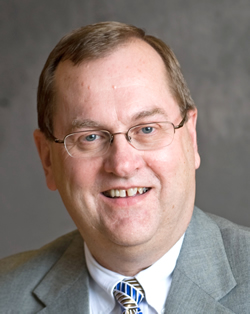
Growing up on a crop and livestock farm in Hagerstown, Indiana, Steve Smith got his first introduction to hard work. His second opportunity was at PurdueUniversity, where tight finances put him on the fast track, and he earned his bachelor’s in agriculture in just three years. Degree in hand, he returned to the family farm, working alongside his two brothers and father. Though he left that operation for other full-time work as a hog operations manager, the seed business, and a trucking company manager during the 1980s, he has always stayed somewhat involved. He soon took his management experience to a distribution management post at Red Gold Inc. in Elwood. There he was able to use his agricultural knowledge, too, as he moved into the agricultural manager position, then in2005 became director of agriculture. This year, he celebrates 20 years with the tomato processor.“It’s great to be on a winning team,” he says of the family-owned business where he contracts with growers, assists with corporate planning, and gets involved in government affairs.Smith has served on the PurdueAgriculture Dean’s Advisory Council, Mid-America Agriculture and horticulture Services Board, and American Fruit and VegetableProcessors and Growers Coalition. He also was an inaugural member of the Indiana Department of AgricultureAdvisory Board. Outside work, Smith has been a pilot for 30 years, likes tinkering with an old tractor, and takes care of his chickens and a cow. The parents of three, Smith and his wife Kathy have also hosted three international exchange students and traveled to Switzerland and Taiwan to maintain those connections. Church activities, Purdue sports, and traveling are other favorite pastimes.“Purdue taught me how to think, explore problems, and come up with solutions. I believe, ‘To whom much is given, much is required.’ I enjoy every day of work and giving back every place I can.”
Raghavan Srinivasan (College Station, TX | Distinguished Ag Alumni: 2015)
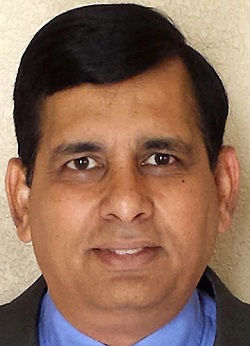
Raghavan Srinivasan, PhD ’92, is an internationally recognized authority on watershed modeling. The Soil and Water Assessment Tool (SWAT) developed by a team of researchers that included Srinivasan is used in every state in the country and around the world to evaluate agricultural production practices and the impact of watershed management strategies on water quality.
Srinivasan was part of the original SWAT development team, and he has published 158 papers in peer-reviewed articles that include major contributions to the model and its application to a wide variety of water resource problems. He has also published 11 book chapters and 105 articles in conference proceedings, which contribute to his international recognition as well as to the SWAT model.
Recently, a journal publication ranked Srinivasan as having the second greatest impact on nonpoint source pollution modeling in the past 20 years. The only person who has had a greater impact in that period was Jeff Arnold, PhD ’92, primary developer of SWAT, who was named a Purdue Distinguished Agriculture Alumnus in 2008.
Which Purdue faculty member had the most profound impact on your professional career?
Bernie Engel, my major professor and current department head of Agricultural and Biological Engineering, has been a big influence on my education, my career, and my life. Dr. Engel has guided me to success from the first time I arrived in the United States from India in 1989. When I arrived, I really didn’t have much of any expectations of myself regarding what I was capable of doing in the field of agricultural engineering. I learned a lot simply by watching how he conducted himself both professionally and as a human being. I was his first doctoral graduate student to graduate at Purdue. Over the years, we have continued the relationship we started at Purdue and have developed many successful programs together.
Why did you select Purdue as the place to continue your education?
Coming from India, I was not aware of Purdue when I first considered coming to the United States to attend graduate school. However, after coming to Purdue, I was fortunate to be able to meet so many world-class researchers and leaders in various disciplines. The opportunity to meet and interact with them and the study environment really went a long way in shaping my future. Looking back, everyone who studied with me has turned out to be very good at what they do and has achieved great heights in each of their professional careers. If I had to do it all over again, I would choose Purdue, without any doubts.
Where was your favorite place on campus to study?
I did a lot of my studying in the Agricultural and Biological Engineering Building on the south side of campus. I was able to interact with graduate students from all over the world and from the United States as well. That social interaction allowed us to exchange intellectual thoughts and ideas and talk with each other and learn more about the culture and respect for each other’s research topics. I think this process was greatly beneficial to all of us.
What is the best advice you have ever given?
To whom did you give the advice?
I think it is important to be unique and creative in your thinking, so that you will stand out from others. And to do the best you can through hard work, the rest will follow automatically. I not only say that to all my graduate students, but to my son, too.
Eric J. Steiner (Alexandria, VA | Distinguished Ag Alumni: 2018)
Nonprofit experience: Check. Legislative expertise: Check. High-level positions with prominent food and agriculture companies: Check. Eric Steiner, who graduated from Purdue University in 2002 as the G.A. Ross Award recipient (outstanding senior man), is using his Agricultural Education major in impressive, effective ways. His vision is “to build bridges between all people to ensure adequate food for our world”. Steiner is Director of U.S. Government Affairs for Elanco Animal Health, leading the U.S. lobbying team on strategy development and advocacy on antibiotics, vaccines, international trade, and food labeling issues. For three years previously, he had a similar role at Kraft Foods, where he was the lead lobbyist for international trade, intellectual property, commodities, cybersecurity, SNAP, and WIC. One criteria for the Distinguished Agriculture Alumni Award is how the nominee’s career growth and contributions have changed. Steiner’s past two jobs followed a decade of deep involvement with the legislative and policy process: the U.S. Senate Committee on Agriculture, Nutrition, and Forestry (serving three different Chairmen); and the U.S. Department of Agriculture (political appointee serving two Secretaries of Agriculture). He also worked briefly with the National Association of Wheat Growers (he co-led a trade mission to the World Trade Organization in Geneva, Switzerland); and with the U.S. Election Assistance Commission (law clerk). Steiner has been involved with the Congressional Hunger Center since 2002, and on the board of directors since 2012. A FarmHouse member as an undergraduate, he’s halfway through a four-year term on the fraternity’s International Executive Board. Furthering his studies at night, Steiner earned his Juris Doctor degree in 2009 from the George Mason University School of Law, where he received the Top Student Award in Trial Advocacy, and the Best Oralist Award in the Appellate Legal Writing class.
Lesa G. Sterling Griffiths (Newark, DE | Distinguished Ag Alumni: 2004)
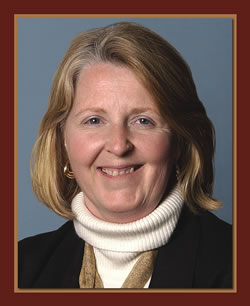
The first to offer a video-stream, online course in the University of Delaware’sCollege of Agriculture and a leader in connecting its students internationally, Lesa Sterling Griffiths embraces the wonders of the 21st century. At the same time, she connects to agriculture's past through her five Percheron draft horses, pre-Civil War barn of stone and peg construction, and century-old farmhouse. Growing up in suburban New York, Griffiths has no early ties to agriculture, but her mother did instill an appreciation of old things and a love of collecting. For Griffiths, that’s meant acquiring antique implements; veterinary items such as old-fashioned hog powders and animal ailment treatments; and a barn full of horse-drawn sleighs, hay wagons and carriages.“I just can’t wait to get home and get on a sleigh,” she says of a snow day. She’ll take her nine-year-old son and daughter along. “Usually a dog jumps in, too.” The sleigh will be pulled by one of two teams of Percherons. Jessie and Jane are her youngest. Holly and Ivy are the“older girls,” she says. “And our big gelding is Frank.”The family will ride around the neighborhood and perhaps explore the 5,000-acre natural resource area in Maryland near their 12-acre Delaware farm. “It’s a nice release from a busy career where you’re always on the phone or computer,” she says. “And it's something we can do together.”She’s drawn to the Percherons because of their nature. “I want something nice and well behaved. My horses are very gentle and very interactive with people. And it’s great being out in the open area, working with the horses, with the kids and dog along.”“My overwhelming memory of Purdue is one of being accepted. I still feel I’m part of a family of mentors, scholars and friends. I learned to not take myself too seriously, be real, and find humor in the worst situations and the best in every person.”
Jane Ade Stevens (Indianapolis, IN | Distinguished Ag Alumni: 2018)
Since 1976, when Jane Ade Stevens was student editor of Purdue Ag Student Intercom, a magazine solely controlled by seven ag communications students, she has been working to serve the agriculture industry and farm families. Today, she leads a one-of-a-kind ag organization that shares staff for the corn and soybean checkoff activities under the Indiana Corn Marketing Council and the Indiana Soybean Alliance. She also oversees the farm policy and lobbying farmer organizations, the Indiana Corn Growers Association and the Indiana Soybean Alliance Policy Committee. Most recently, under Ade Stevens’s leadership, corn and soybean farmers provided checkoff funding for the Indiana Corn and Soybean Innovation Center at Purdue’s Agronomy Center for Research and Education. In addition, her imagination and creativity led to the creation of The Glass Barn, a year-round agriculture education facility at the Indiana State Fairgrounds. Before serving as CEO at the corn and soybean organizations, Ade Stevens was President of Stevens & Associates. She was Editor of the Hoosier Farmer, and Radio/TV Director of the Indiana Farm Bureau. She has been the Public Relations Manager for Elanco Animal Health, Marketing & Communications Specialist for Supercrost Seed Corn, Edward J. Funk & Sons, curator of the Pioneer Hi-Bred Our Land Pavilion, and lead consultant and fundraiser for the State Fair Covered Bridge. Ade Stevens, who was raised on a grain and livestock farm 10 miles west of Purdue in Tippecanoe County, says she is driven in her work to do the best to make lives better for farm families and to help women attain the equality recognition they deserve. After the death of her father in a farm accident, she was asked to serve as Commissioner for the Indiana Occupational Safety and Health Standards Commission. She’s been Chairman of the Agricultural Leadership Development Board and Associate Chairman of the National Farm Broadcasters Association. She has worked for Indiana Farm Bureau and Elanco Animal Health, and at the U.S. Department of Agriculture for Assistant Secretary Jim Moseley. The Distinguished Agriculture Alumna Award adds to Stevens’ awards from the College of Agriculture: Certificate of Distinction Award, Purdue Ag Alumni Award, and the APEX Award from the Department of Agricultural Economics.
Michael Strunk (Eagle River, AL | Distinguished Ag Alumni: 1996)
During a forest ecology field trip more than 30 years ago, Michael Strunk found his niche. With his Purdue classmates, he traveled to the sand dunes of Labe Michigan to study the science of ecology. He came away with a philosophy as well: the importance of preserving natural resources. As chief of the Division of Planning, Design and Maintenance for the Alaska Regional Office of the National Park Service, he lives this philosophy every day. After completing his bachelor’s degree in forestry at Purdue, Strunk did graduate work in landscape architecture at Purdue and the University of California. He spent the next 10 years with The Designers Forum, Inc., in Columbus, Ohio, seven of those as president and chief executive officer. In 1977, Michael joined the National Park Service as a landscape architect and team leader in Denver, Colo. In his present assignment in Alaska, he manages 15 units of the National Park System, which encompass approximately 55 million acres-an area more than twice the size of Indiana. Strunk a native of Evansville, Ind., has led projects at more than 40 national parks, including Yellowstone, Yosemite, Grand Canyon, Rocky Mountain, and Olympic. He designed and supervised the Eagle Creek Reservoir, Southeastway and Carlisle park projects in the Indianapolis area, and planned communities in Indianapolis, Cincinnati, Pittsburgh, and Kingston, New York. He prepared the park master plan for Gallia County, Ohio, and has worked to protect India’s lions, coral reefs and waterfowl. Strunk is active in the National Parks and Conservation Association and the Sierra Club. He has worked to protect the Burning Bear study area in Colorado and Kentucky’s Red River Gorge in the Daniel Boone National Forest. He is a member of the American Society of Landscape Architects, serving as president in Ohio, Colorado and Alaska. Michael was an adjunct assistant professor at The Ohio State University, and on the faculties of the University of Colorado and Metropolitan State College of Denver. Michael also designed the Paul H. Douglas Center for Environmental Education at Indiana Dunes National Lakeshore, which opened in 1986 and is nestled among the same dunes. Strunk visited with his class as an undergraduate. For significant contributions to his profession and community, and for bringing distinction to his alma mater, Purdue University School of Agriculture is proud to present the Distinguished Agricultural Alumnus award to Michael B. Strunk.
Max D. Summers (, | Distinguished Ag Alumni: 1992)
Dr. Summers is a Distinguished Professor of Entomology and holder of the Chair in Agricultural Biotechnology at Texas AM University. He also holds professorships in Biochemistry and Biophysics, Genetics, and Biology. In addition to his teaching responsibilities, he serves as Director of the Center for Advanced Invertebrate Molecular Sciences. Dr. Summers’ career has been devoted to the study of the molecular biology of insects and insect viruses. The goal of his research is to develop a new generation of microbial pesticides that will provide safe and effective approaches for management of public health and agricultural pests. Dr. Summers and his colleagues were pioneers in gene expression research which led to novel systems for producing numerous proteins in insect cell cultures which had medical and agricultural importance. His research was the basis for the production of the first recombinant protein vaccine to receive FDA approval for clinical evaluation in the treatment of AIDS. Dr. Summers has authored over 100 research publications and has received nearly seven million dollars in research contracts and grants. He was elected to the National Academy of Sciences for his contributions to science. He served as editor of the journal, Virology, and was a charter and founding member of the Society of Virology. He has received numerous awards including the J.E. Bussart Memorial Award from the Entomological Society of America; the Alumni Citation Award for Outstanding Achievement in Research, Scholarship and Teaching from Wilmington College; the Faculty Distinguished Achievement Award in Research from Texas AM University; and the John V. Osmun Professional Achievement Award in Entomology from Purdue University.
Paul Ming Hsien Sun (, | Distinguished Ag Alumni: 1992)
Dr. Sun is currently the Commissioner of the Provincial Department of Agriculture and Forestry in Taiwan. He also maintains a professorship at the National Chung Hsing University, where he teaches a graduate course in breeding plants for disease-resistance. Dr. Sun is also an active member and former president of the Plant Protection Society of the Republic of China and the Agricultural Association of China. He was selected as one of the Ten Outstanding Young Men in Taiwan by Jaycees International in 1975. He began his professional career as a research assistant at the Tainan District Agricultural Improvement Station. He joined the Chinese-American Joint Commission on Rural Reconstruction in 1967. Dr. Sun became Deputy Director General of the Asian Vegetable Research and Development Center in 1980. His excellent managerial skills made it one of the most viable international agricultural research centers in Asia despite a prevailing financial crisis in the country. He also served as Division Chief for the Council of Agricultural Planning and Development and Commissioner of the Taiwan Provincial Government. Under his leadership, the annual use of pesticides in Taiwan was dramatically reduced from 40,000 tons in 1988 to less than 30,000 tons in 1990, without significant reduction in production. His dedication and forward-looking direction for his country's agriculture have earned him the respect and trust of both government officials and the farming population. Dr. Sun has been cited several times by the government of Taiwan for his meritorious service.
Gene L. Swackhamer (Spark, MD | Distinguished Ag Alumni: 1994)
Dr. Swackhamer is President and Chief Executive Officer of the farm Credit Bank of Baltimore, a position he has held since 1977. The Farm Credit Bank extends credit and financial services to45,000 customers through its 16 affiliated associations and 100offices in the five Mid-Atlantic states and the Commonwealth of Puerto Rico. It is owned by the farmers and rural homeowners and businesses it serves. Dr. Swackhamer grew up on a farm in Clinton County. After graduation from Purdue, he was commissioned in the Na valReserve, where he served two years of active duty. Following his military service and pursuit of his masters and doctoral degrees, he became a research officer for the Federal Reserve Bank of KansasCity.In 1970, Dr. Swackhamer was named Director of EconomicResearch and Finance at the Farm Credit Administration (FCA)in Washington, D.C. The FCA had administrative and research responsibilities for the national network of agricultural credit cooperatives. He served as Director of Research from 1970 to1975 and as Deputy Governor of Finance from 1975 to 1977.Dr. Swackhamer has been noted throughout his professional career for his research in farm finance and his skillful administration. He served on the President's Planning Committee and has been a member of the Agricultural Committee of the NationalPlanning Association.Dr. Swackhamer is a strong proponent of education, having served on the advisory boards of the School of Agriculture at the University of Maryland and the School of Business at Towson StateUniversity. He is a former vice president of the EducationalFoundation of the American Agricultural Economics Association and is presently a member of the World Presidents Organization.Dr. Swackhamer is also serving as treasurer of the National 4-H Council and president of the Alpha Gamma Rho EducationalFoundation.
Sue A. Tolin ( Distinguished Ag Alumni: 1993)
Dr. Tolin is a professor of plant pathology at Virginia Polytechnic Institute and State University (VPI). She conducts research with viruses and virus diseases of annual field crops, forage legumes, and perennial fruit crops in addition to her teaching responsibilities. Recent efforts have concentrated on using the newest biotechnology methods to identify the viruses and virus strains causing serious plant diseases and finding ways to control them through genetic and management means. Dr. Tolin has played a key role in the development of government standards and regulations on all biological research involving recombinant DNA For this she was recognized in 1992 with a Certificate of Appreciation Award from the United States Department of Agriculture for “Extraordinary Service to U.S. Sciences” Dr. Tolin joined the faculty of VPI in 1966.
Her research has been the basis for a significant volume of scholarly publications on plant virology and biotechnology. Much of her work over the past fifteen years has centered on the issues, policies, and regulations relating to the safety risks of genetically-modified plants to the food supply and the environment. She works closely with USDA ~n the broad area of biotechnology regulation. From 1980 to 1987 she was member and Vice-Chair of the USDA Recombinant DNA Research Committee. She played a key role in formulating policy and writing position papers that later became Federal Register documents on this subject.
She has been one of the major spokespersons nationally and internationally for sane regulations of biotechnology and the need for an international consensus on biotechnology regulation. Dr. Tolin is a recognized expert on agrofood biotechnology and is often called upon to testify before Congress as well as to speak to professional societies, universities, and private industries. As president-elect of the American Phytopathological Society, she will assume the responsibilities of president in 1994.
Richard Tolman (Chesterfield, MO | Distinguished Ag Alumni: 2014)
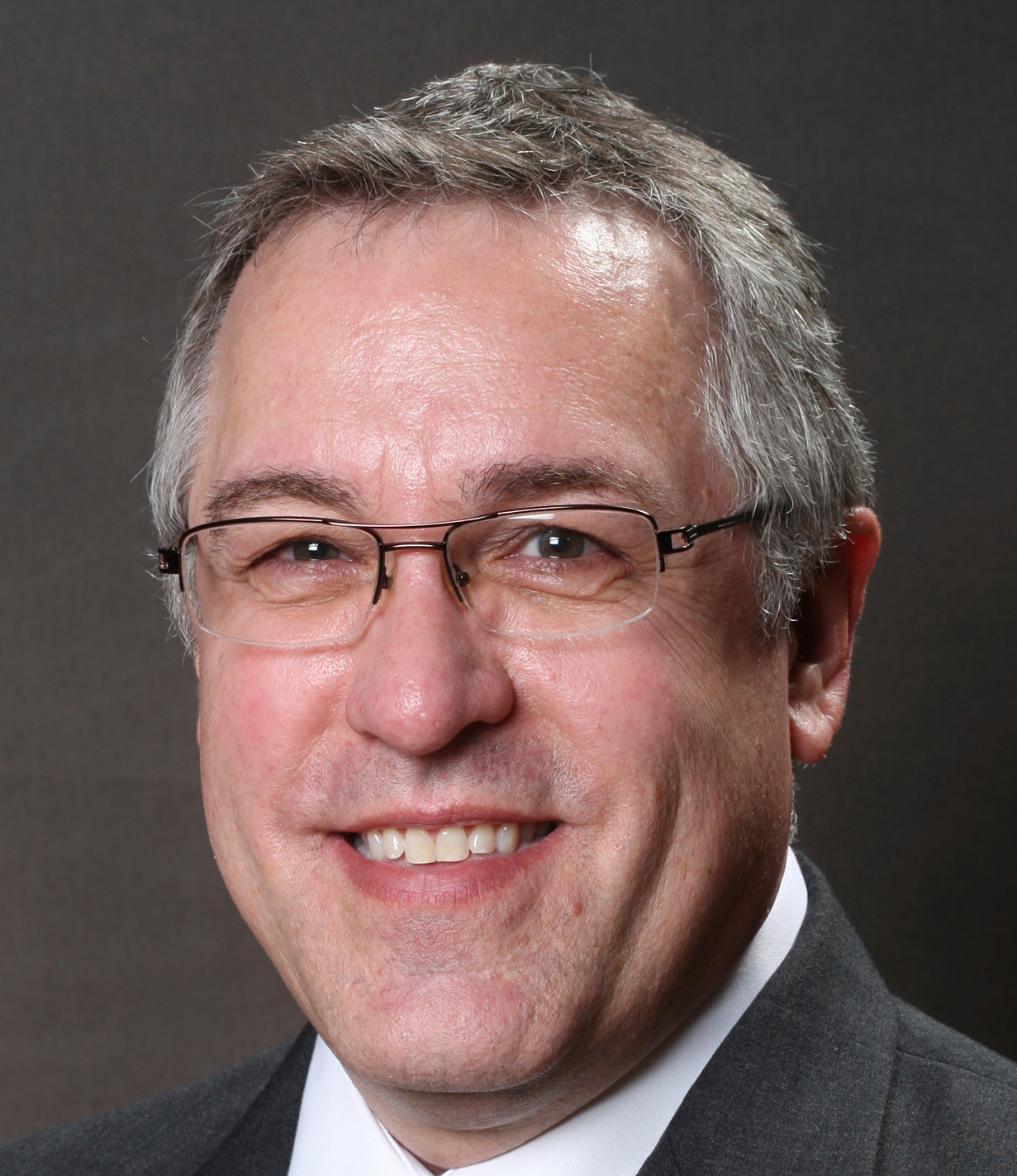
Rick Tolman, M.S., ‘78, joined the National Corn Growers Association in 2000, and currently serves as the chief executive officer of the St. Louis-based group that represents 40,000 dues-paying corn growers and the interests of more than 300,000 farmers who contribute through corn checkoff programs. His work with and for farmers actually goes back to 1982 when Tolman joined the U.S. Grains Council, a nonprofit organization that promotes the use of U.S. barley, corn, sorghum, and related products worldwide. “Under his leadership, the National Corn Growers Association has grown in membership, checkoff funds, and in market opportunities for corn farmers,” said his nominator, Kenneth A. Foster, head of the Department of Agricultural Economics. In 2008, Tolman was recognized as the Agribusiness Leader of the Year by the National Agri-Marketing Association. Why did you select Purdue as the place to continue your education? I did my undergraduate work at Brigham Young University. I had never been east of Wyoming. Coming to Purdue was a big decision for me. It was a long way from home. I had applied to several universities, and had been accepted at several, and offered several assistantships. When I looked at the options that I had and narrowed it down, the choice for me was between Purdue and Texas AM. Both made me similar offers and both had outstanding programs. I choose Purdue because of the quality of the Ag Econ faculty and program and its outstanding reputation. I have never regretted that decision. Were you a good student when you were at Purdue? Yes. I was on a full-ride assistantship and was married and had one child. I was scared to death that if I did not keep my grades very high, I might lose my assistantship. The competitive environment was tough and the expectations were high. I got very good grades, but I put in a lot of time and effort. What is the best advice you got while you were at Purdue? Who gave you the advice? After I interviewed for a trading position with General Mills in Minneapolis, Dr. Ray Wilson asked me how the interview went. I said I was really interested in the job, but was not sure how well that I had done in the interview. I had the contact information for the interviewer in my hand. He asked to see it and said, “There are times to be bold.” He picked up his phone and much to my dismay and embarrassment, he dialed the person and got him on the line. He proceeded to sing my praises and tell the person that if he was smart that he had better offer me the job. I did get the job offer, but ended up turning it down. The advice to be bold has stayed with me. That singular incident has come back to me and motivated me to be bold where I otherwise may not have. What is the best advice you have ever given? To whom did you give the advice? I like to share the analogy of pitch and catch with every new person I hire. H you are given an assignment, it is as if you are playing baseball catch with the person that gave you the assignment. When the ball is in your glove, it is yours to take care of and complete the task. But, the final part of completing the task is to throw the ball back - pitch and catch, pitch and catch. Reporting back on a completed assignment is crucial and will make you look good. Don’t make the person who gave you the assignment ask if the task is complete. “Throw the ball back.”
Wayne Townsend (Hartford City, IN | Distinguished Ag Alumni: 2005)
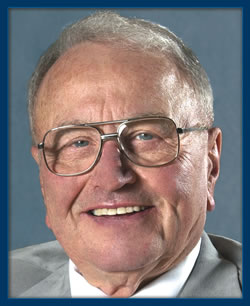
When W. Wayne Townsend came to the proverbial fork in the road, he took three paths simultaneously. So far, he cracked up more than 50 years farming,22 years in public office, 23 years in service to education and countless more in community activities. Raised on a farm, Townsend started his own operation in 1951 after earning a Purdue agriculture degree. What began as a 225-acre venture is now a 2,500-acre farm with a 2,400-sow,farrow-to-finish operation that ships1,000 hogs a week. Public service came early, at age 32when Townsend was first elected to the Indiana House of Representatives. He went on to the Indiana Senate and, in1984, ran for governor. From the beginning, public education was his passion, serving on the team that worked for passage of the SchoolReorganization Act of 1959 and its reauthorization in 1965.“My dad spoke of public affairs three times a day,” Townsend recalls.“Mealtime was an opportunity for lively discussion of the affairs of the world. Ifyou didn’t want to hear that, you wenthungry. I didn’t miss many meals.”Education, too, was rooted in early childhood, even though neither of his parents attended school beyond 8thgrade. “For us, school came first. Going to college was part of the program, even though we had very limited resources. That was first on the agenda.”His passion for education continued as a trustee for Earlham College for eight years, and for the last fifteen years, for Purdue University.Townsend’s community activities have included agricultural organizations, his church, social service groups and the Indiana Farm Policy Study Group. “You look for places where you might make a difference, and where you might affect the outcome of some issue on the table.”“Purdue teachers care about students. I owe much of what I’ve accomplished to teachers who became lifelong mentors. It didn’t stop at graduation; it’s gone on forever. They’ve guided me since I enrolled at Purdue.”
Jeffrey T. Troike (Attica, IN | Distinguished Ag Alumni: 2016)
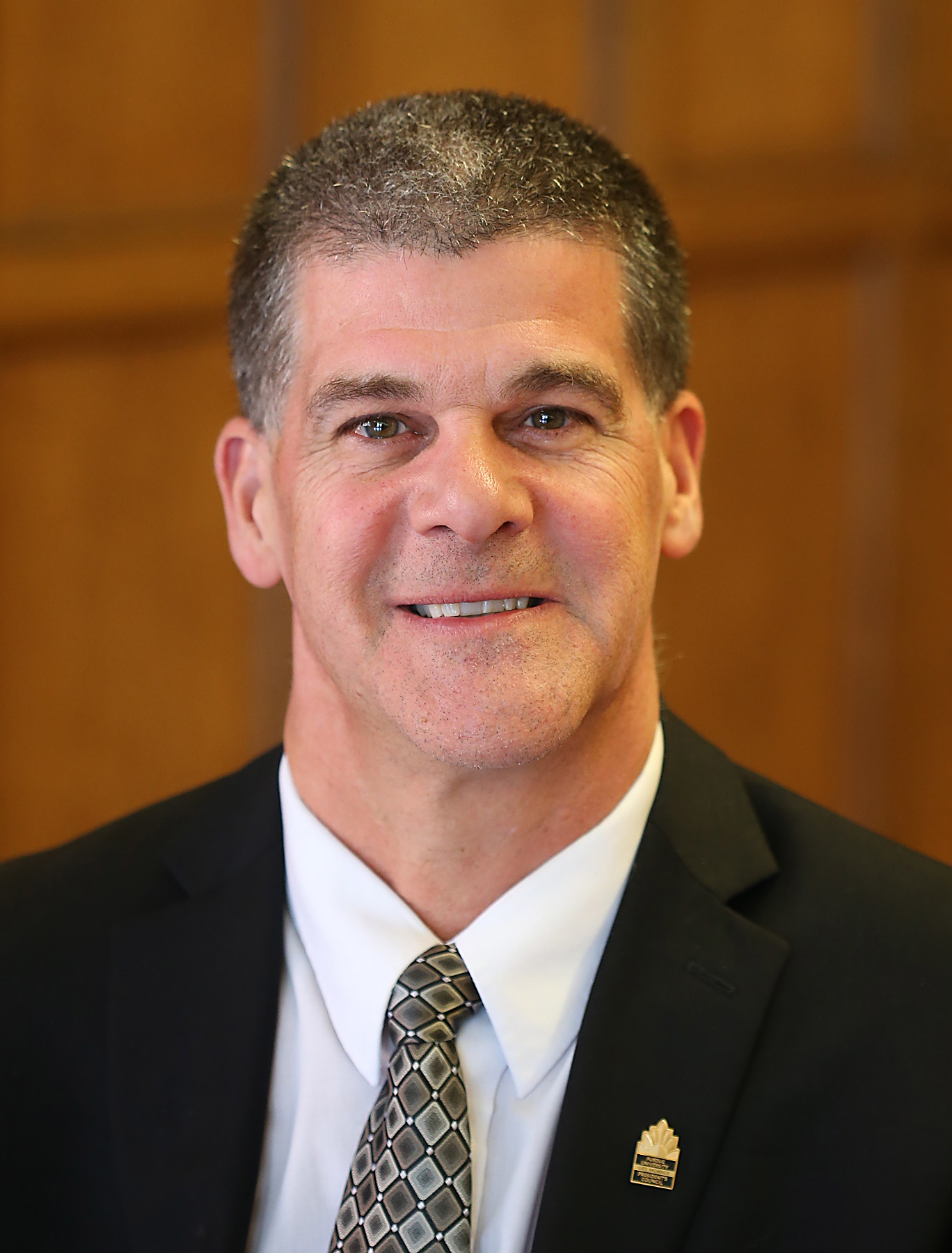 Jeffrey T. Troike is CEO and president of Ceres Solutions LLP, based in Crawfordsville, Indiana.
Jeffrey T. Troike is CEO and president of Ceres Solutions LLP, based in Crawfordsville, Indiana.
Jeff Troike has worked in production agriculture and agribusiness since the early 1980s. He was raised in rural Starke County, graduated from North Judson High School, and attended Purdue University.
Jeff brings four decades of experience to his management role, as well as a great understanding for what it takes to be successful in agriculture. He also leads with a passion to give back to the communities in which Ceres Solutions serves.
Ceres Solutions Cooperative is 100% farmer-owned. The company is a leading supplier of agronomy inputs, seed, technology, information, power fuels, lubes, propane gas, animal nutrition and more. Under Jeff’s consistent leadership, the mission of the organization is simple: to serve the customer with integrity, and serve well, bringing value to their operation. “If we can achieve that goal, everything else takes care of itself.” In 2016, Jeff was honored to be among the 2016 recipients of the Purdue University College of Agriculture’s Distinguished Agriculture Alumni Award, which recognizes alumni who have made significant contributions to their profession or society.
Jeff and his bride, Lisa, raised their family in Fountain County. The couple resides in Attica. They have two daughters and a son. Jeff is a member of the Land O’Lakes Board of Directors and serves as a member of the Executive Board of the National Council of Farmer Cooperatives (NCFC). Jeff is also a Deacon at Williamsport Christian Church. He also volunteers his time to several community programs. The Troikes have been active with Terre Haute Catholic Charities, Food Finders and several other mission projects. Jeff also enjoys running (when his knees allow it), and time with grandchildren.
J. Yun Tso (Menlo Park, California | Distinguished Ag Alumni: 2003)
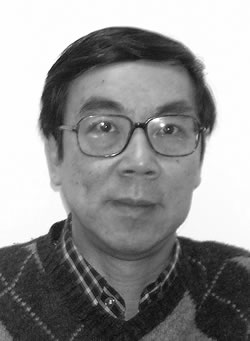
Unlike J. Tso’s professional life, where his gaze locks intently on infinitesimally small test tubes and cells, hours outside the lab are filled by a man with an expansive view—an observer who appreciates what he sees “from the outside, looking in.”
A self-described shutterbug, Tso still uses the trusty Minolta that first launched his hobby as a high school student in Hong Kong. And although he’s comfortable with slightly more sophisticated equipment, Tso still depends on simple point-and-click cameras to photograph his favorite parts of the world—Italy, southern France, Guatemala, and California’s Yosemite National Park. “The natural lighting makes Yosemite look different every time,” he says. “I never get tired of it.” He’s also mesmerized by watching and photographing ocean tides and sunsets. “When you’re born near the sea, it becomes part of you, and you’re always drawn to it,” he explains.
When display space on his own walls approached capacity, Tso began sharing his photography with friends. One grateful recipient reciprocated with a collection of about 20 old cameras, including a Hasselblad, the same medium-format, all mechanical camera used by Apollo astronauts to photograph the moon. “I marvel at the workmanship of old cameras,” he says. “It’s truly amazing.”
This appreciative observer also is an avid fan of foreign movies, another deeply rooted hobby. As a high school student, Tso spent much of his free time at the nearby French cultural center, where he watched Japanese and French films. “It was the only place with air-conditioning,” he laughs.
“Movies and photography allow me to enhance experiences in my life without being directly involved,” he adds. “(What I see) can be joyful or sad . . . but it always enriches my life to see how other people live or deal with their lives.”
1981 Ph.D., Biochemistry
Post-doctoral fellow
1981-1984 Post-doctoral fellow, Biochemistry, Cornell University
1984-1987 Stanford University, Genetics
Stanford University Cancer Biology Fellow
American Cancer Society Senior Post-doctoral Fellow
1987-1989 Staff Scientist, Protein Design Labs, Inc.
1989-2001 Senior Scientist, Protein Design Labs, Inc.
2001-present Director of Oncology, Protein Design Labs, Inc.
“At Purdue, I enjoyed the direct benefits of close interaction with my professors. I gained a very clear sense of professional direction from them.”
Terry L. Tucker (Distinguished Ag Alumni: 1992)
Mr. Tucker is Chairman of the Board, President and Chief Executive Officer of Maple Leaf Farms, Incorporated, the largest producer and processor of ducks in the United States. He joined Maple Leaf Farms, located in Milford, Indiana, in 1963 and served as its Treasurer and Executive Vice President. In 1974, he was elected President and CEO. The top national ranking of Maple Leaf Farms in the duck industry is largely the result of the leadership and management of Mr. Tucker. His operation, which is one of only two primary breeders of ducklings worldwide, conducts extensive research and development in genetics, nutrition and environmental improvement of duckling production. Major production units in both Indiana and Wisconsin include facilities for producing all necessary duck feeds, duckling hatcheries, processing plants, and a prepared foods plant. They also operate a duckling disease diagnostic laboratory and bacterin and vaccine production facility. Under Mr. Tucker’s direction, Maple Leaf Farms has created markets for nearly all the byproducts of processing. Subsidiaries and affiliates in Grand Rapids, Michigan, process the feathers and down into pillows and comforters. Maple Leaf Farms is often cited as one of the real value-added export success stories in American agriculture. Mr. Tucker currently serves on the board of the Indiana Institute of Agriculture, Food, and Nutrition and the Dean of Agriculture’s Advisory Council. He is a past director of the Indiana State Poultry Association, the Poultry and Egg Institute of America, and the National Duckling Council. He has also hosted dozens of Purdue students, staff, and other educational groups at his Maple Leaf Farms facilities.
Del Unger (Carlisle, IN | Distinguished Ag Alumni: 2012)
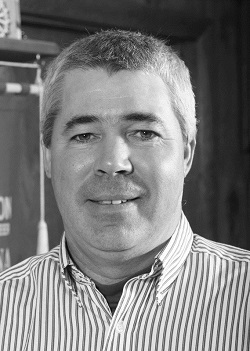
It hardly gets more black-and-gold than the Unger family. Del Unger’s parents graduated from Purdue, Del met his wife Tammi there, and the couple’s son and daughter both recently returned to the farm with Purdue Agriculture degrees in hand. That might have something to do with their father’s decree: “You can go to school anyplace you want — but if you want me to pay for it, you’ll go to Purdue,” he says with a grin. Unger is the owner-operator of UngerFarms, which consists of 5,000 acres. Cash grains include corn, soybeans, double crop corn, double-crop soybeans, wheat, and hay. Seed corn, green beans, popcorn, and white corn are grown on 1,800 acres irrigated for specialty crops. Of the farmed acreage, 1,700 acres are family-owned. The Ungers also operate a cow-calf operation on some of their rolling land. Unger takes a high-output production approach to derive the highest output and best efficiency from every acre. The labor force includes the four Ungers, two full-time employees, and Del’ssupposedly retired father. Unger Farms has increased acreage by nearly 60 percent and more than doubled on-farm storage in the last ten years. Expansion is important to ensure the farm’s future for his children, Unger says: “When we saw their interest and their desire to come back, and their love for it, we knew we had to grow.”As the operation has expanded in size and complexity, Unger has organized it into functional units that involve various combinations of owners, equipment, and land to manage risk and pave the way for the farm’s passage to the next generation. Unger has hosted international visitors and state officials, and his operation has been featured in several agricultural publications. Unger Farms also hosted the Indiana Farm Management Tour in 1996and again in 2011. He says that such experiences are not only a great excuse to get everything painted and cleaned up, but a valuable learning experience and a chance to promote farming: “We need to do a better job in agriculture of telling our story, that we provide a safe, reliable feed for the world.”
Larry N. Vanderhoef (Davis, CA | Distinguished Ag Alumni: 1994)
Dr. Vanderhoef is Acting Chancellor of the University of California at Davis. He has served as Executive Vice Chancellor since 1984 and was named Acting Chancellor in 1993. The University of California at Davis is primarily noted for its strong programs and traditions in agriculture, veterinary medicine, and the biological sciences. While serving in the above administrative capacities, Dr. Vanderhoef has had overall responsibility for all three undergraduate colleges and the graduate division, with a total of 22,000 students and a budget in excess of $400 million. During his graduate and post graduate career, he received fellowships from Purdue, the National Research Council, and the Carnegie Foundation. In 1970 he was appointed assistant professor of plant biology at the University of Illinois, Urbana. Moving rapidly through the ranks, he advanced to professor and head of his department in 1977. He joined the faculty of the University of Maryland at College Park in 1980, assuming an appointment as Provost of Agricultural and Life Sciences. Four years later he accepted the position of Executive Vice Chancellor and member of the Governing Board at the University of California Medical Center campus in Sacramento. Dr. Vanderhoef was a visiting lecturer at the National Taiwan University in 1984 and was awarded the Eisenhower Fellowship as a visiting scholar to the Republic of China in 1987. Dr. Vanderhoef has chaired program reviews at the University of Minnesota, the University of Maryland, the USDA Beltsville Agricultural Research Center, and the Department of Energy’s Plant Research Laboratory at Michigan State University. He has also been called upon to serve on major national review and advisory committees for such organizations as the National Science Foundation and the Department of Energy. Dr. Vanderhoef is currently serving on the Academic Affairs Council of the National Association of State Universities and Land-Grant Colleges.
Jeffrey J. Veenhuizen (St. Louis, MO | Distinguished Ag Alumni: 2013)
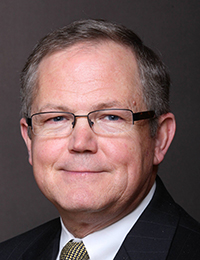
Jeffrey Veenhuizen started his career with Monsanto as a senior research biologist in 1989 after a post-doctorate fellowship at the University of Georgia. Veenhuizen is currently the director of Regulatory Strategy/Operations and Chief of Staff for Monsanto Company in St. Louis.
1981 B.S., Animal Science, Purdue University
1983 M.S., Animal Physiology, Animal Nutrition, Iowa State
University
1988 Ph.D., Biological Statistics, Dairy Nutrition, Biochemistry,
Iowa State University
1988-1989 Post-doctoral Research Associate, University of
Georgia
1989 Senior Research Biologist, Monsanto Company
1989-present Monsanto Company
Head of Clinical Chemistry/Endocrinology Lab,
1989-1993
Research Group Leader, 1994
Team Leader, Research & Development,
1995-1996
Director, Regulatory Affairs and Quality
Assurance, Dairy Business, 1996-1998
Director, Research and Development, Quality
Assurance and Regulatory Affairs, Animal
Agricultural Group, 1998-2002
Division Vice President, Research &
Development Quality Assurance and Regulatory
Affairs, Animal Agricultural Group, 2002-2003
Lead, Regulatory and Quality Assurance,
2003-2007
Lead, Global Vegetable Regulatory, 2007-2008
Director, Regulatory Strategy/Operations and
Chief of Staff, 2008-present
Joseph J. Villafranca (, | Distinguished Ag Alumni: 1992)
Dr. Villafranca holds a distinguished professorship as the Evan Pugh Professor of Chemistry at Pennsylvania State University, where he also serves in an administrative capacity as Director of the Center for Biomolecular Structure and Function. He has been recognized as an outstanding teacher. He was awarded the C.I. Noll Award for Excellence in Undergraduate Teaching from Pennsylvania State University. Dr. Villafranca has exploited approaches using nuclear magnetic resonance spectroscopy to explore the structure and mechanisms of metalloenzymes involved in regulating blood pressure, specifically concentrating on an enzyme involved in epinephrine (adrenalin) metabolism. This work has permitted the development of “mechanism-based” inhibitors for this enzyme- inhibitors which are particularly powerful, highly selective, and of pharmacological interest. Dr. Villafranca’s scholarly excellence has been recognized through his selection as a Guggenheim Fellow. He was also awarded a postdoctoral fellowship from the National Institute of Health with the Institute for Cancer Research and an Established Investigatorship with the American Heart Association. Purdue University recognized him with the Arnold K. Balls Research Award. He has served as Chair of the Biochemistry Study Section of the National Institute of Health and is currently the Associate Editor of the journal Biochemistry. Dr. Villafranca is an advisor on topics related to enzyme mechanisms for the National Research Council and a member of the Executive Committee of the Biological Chemistry Division of the American Chemical Society.
Donald B. Villwock (Edwardsport, IN | Distinguished Ag Alumni: 1994)
Mr. Villwock owns and operates Donald Villwock Farms in Knox and Daviess counties, raising com, soybeans, wheat, and popcorn. He started in 1972 with 40 acres and a shared equipment arrangement. Today he farms more than 2,000 acres, with 400 acres under ownership. The Indiana Prairie Farmer cited his unit as one the best managed operations in the state in 1985. Prairie Farmer also awarded him the Master Farmer Award in 1985. He served as the Indiana State Executive Director for the Agricultural Stabilization and Conservation Division of the United States Department of Agriculture under the Bush Administration. Prior to that, he held the position of State Agriculture Liaison to Senator Richard Lugar from 1984 to 1989. As Agricultural Liaison for Senator Lugar, he assisted hundreds of Indiana farmers in their efforts to negotiate the bureaucratic maze and furthered his reputation as a friend to agriculturalists. Mr. Villwock has served as a member of the Federal Reserve Board Agricultural Advisory Committee, board member of the American Farm Bureau Federation, and as national chairman of the American Farm Bureau Young Farmers Committee. He is also a member of the Edith and Dana Bennett Roundtable of the Farm Foundation. He has served Indiana agriculture in many capacities. He was a member of the Indiana Tax Commissioners Agricultural Advisory Council and chairman of the board of directors of the Indiana Institute of Agriculture, Food and Nutrition. Mr. Villwock also served as secretary for the Indiana Council on Agricultural Research, Extension and Teaching. Within his community and local area, he held the offices of either president or director for the Knox County Extension Council, the Farm Bureau Board, the Young Farmers Organization, and the Knox County Purdue Ag Alumni Association. Mr. Villwock has always been a strong supporter of Purdue Agriculture. He is a past president of the Purdue Ag Alumni Association and continues to serve as a member of their board of directors. Mr. Villwock has also been a member of Purdue Agriculture’s Dean’s Advisory Council and a member of the Purdue University Farm Policy Group.
Christopher J. Voglewede (Indianapolis, IN | Distinguished Ag Alumni: 2017)
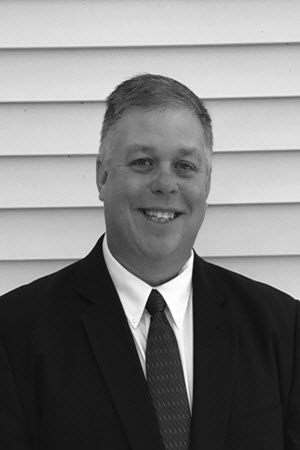
Chris Voglewede has influenced people and product development in the agricultural products industry on an international scale. He has contributed to the development, launch, and support of progressive technologies critical to sustaining world food productivity and structural protection, including crop herbicides, green chemistry insecticides, structural fumigants, termite baits, and nitrogen management products. His passion for leading young talent has brought many new professionals into the industry and helped others grow, develop, and contribute.
The native of Decatur, Indiana, was enrolled in the engineering program at Purdue University Fort Wayne when an entomology class instead sparked his interest in switching to a major in agriculture. Jim Haddock, professor emeritus of biology, called Voglewede’s attention to the program in plant protection and integrated pest management (IPM) on Purdue’s main campus. Voglewede also cites the positive influence of Professor Emeritus Alan York on his undergraduate career.
His academic achievements, summer internship as a gypsy moth scout for the USDA, and internship at Monsanto led Voglewede to an industry job that had strong components of research and extension. IPM and crop protection intrigued him, so he returned to Purdue for graduate study under Professor Emeritus C. Richard Edwards.
Edwards’ strength in Extension complemented Voglewede’s love of purpose-driven research. Balancing graduate school with full-time work, Voglewede incorporated courses across various agricultural disciplines. “Taking extra classes allowed me to immerse myself in agriculture, broaden my background, and meet so many people,” he says. “I always loved to learn, and my Purdue experience provided an exceptional venue to hone and pursue this passion.”
Dow AgroSciences, which once gave Voglewede a scholarship, has provided a steady supply of great leaders to help him and seven new and challenging positions in 16 years, he says. He also has supported public-sector agriculture as part of the Indiana Certified Crop Advisors professionals, an organization he led for three years.
Voglewede and his wife have six children ages 10 to 19, including a daughter in Agronomy at Purdue. He enjoys cooking, gardening, fishing, and hunting.
“Be open to new opportunities, and be willing to say ‘yes.’ I spent all that time getting a PhD, and now my job is to lead scientists, a completely different thing than I was trained for. If I hadn’t said ‘yes,’ I wouldn’t have had the opportunity to help others grow, develop, and innovate.”
2000-present Dow AgroSciences Crop Protection R&D Field Science Leader, North America and Latin America, 2015-present Global Product Development Director for Corn, Soybean, and Nitrogen Management, 2013-2015 R&D Director, Canada Research & Development, 2011-2013 Global Leader, Insect/Nematode, Disease Management Technology Center, 2007-2010 Functional Leader, Supply Research & Development, 2005-2007 Technology Transfer Leader, 2000-2005
1999-2000 Consulting Agronomist, BASF/American Cyanamid Company
1999 PhD, Entomology, Purdue University
1993-1999 Senior Technical Service Representative, American Cyanamid Company
1991 MS, Entomology, Purdue University
1987 BS, Agronomy, Purdue University
Edward P. Vondell (Mexico City, Mexico | Distinguished Ag Alumni: 2010)

From Chrysler de Mexico’s headquarters in Mexico City, Ed Vondell oversees design and approval of the automaker’s products for Mexico and Latin America. Growing up in Michigan and working on one of his family's two farms, he never expected to build his career in the automotive industry. Vondell intended to use his Purduedegree to break into the ag machinery business, but John Deere and Caterpillarweren’t hiring. Instead, Chrysler came to campus, open to talking with agricultural engineers, and Vondell signed on. After two years as a design and test engineer, he decided to learn more about manufacturing and connected with a colleague in Mexico City. Vondell wasn’t exactly a world traveler at the time; the flight from Indianapolis to Detroit for his job interview had been his first plane ride. But determined to expand his skills, he moved to Mexico. He didn’t speak Spanish, so he immersed himself in the language. He also learned firsthand that while engineering focused on products for the future, manufacturing was about the present and often required his round-the-clock attention. In 2002, Chrysler tapped Vondell to manage the Indiana Transmission Plant II in Kokomo, which represented a corporate investment of more than $455million. He was promoted again in 2006and moved back to Mexico as head of product engineering.Earlier this year, Chrysler Group LLC partnered with Fiat. “The upper management of the company is now Italian, so it’s about understanding their vision and how to work with them,” Vondell says. “The idea is to get the right product to the customer as quickly as possible at the right quality level and right price.”Vondell and his wife Pilar have two daughters ages 14 and 12 who attend the the130-year-old American SchoolFoundation in Mexico City. Vondell enjoys running and weight training. He maintains contact with Purdue faculty and enjoys returning to campus when possible.“Going to school out of state opened my mind and eyes to the international community. But without an engineering degree from Purdue—if I hadn’t been technically prepared—I wouldn’t have gotten a job in Mexico City.”
Dexter Wakefield (San Marcos, TX | Distinguished Ag Alumni: 2016)
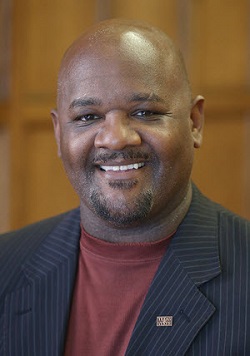
Dexter Wakefield is assistant professor of agricultural education and mechanics at Texas State University in San Marcos, Texas, and an adjunct professor of agriculture education at North Carolina A&T University in Greensboro, North Carolina.
Wakefield’s letter of nomination for the Distinguished Agriculture Alumni Award came from a man with no connection to Purdue University’s College of Agriculture but is a former student of Wakefield’s at Southern Illinois University.
“As an adviser, Dr. Wakefield helped me develop a strong work ethic, a commitment to excellence, the importance of continuing professional development and the importance of taking on leadership roles,” said Alex D. Meredith, an agricultural adviser, recruiter and adjunct instructor for the College of Agriculture and Related Sciences at Delaware State University.
“As a colleague, Dr. Wakefield leads by example and empowers agricultural professionals to think critically, make informed decisions that mutually benefit and to lead by servitude. He is compassionate about agricultural education and the impact it will have on future generations as we deal with agricultural adversities and uncertainties. He understands the need for a strong agricultural workforce.”
Prior to accepting his current faculty position, Wakefield was the education research coordinator for the Center for Urban and Multicultural Education, Indiana University-Purdue University, Indianapolis, and served as the director of diversity and inclusion for the National FFA Organization.
He was acknowledged by receiving the Honorary American FFA Degree and the Outstanding Teacher of the Year, Faculty of the Year and Outstanding Contribution to Agriculture Education awards. He has also served as national president of two agricultural organizations -- Alpha Tau Alpha (honorary agricultural education organization) and MANRRS.
Geoffrey C. Waldbieser (Stoneville, MS | Distinguished Ag Alumni: 2014)
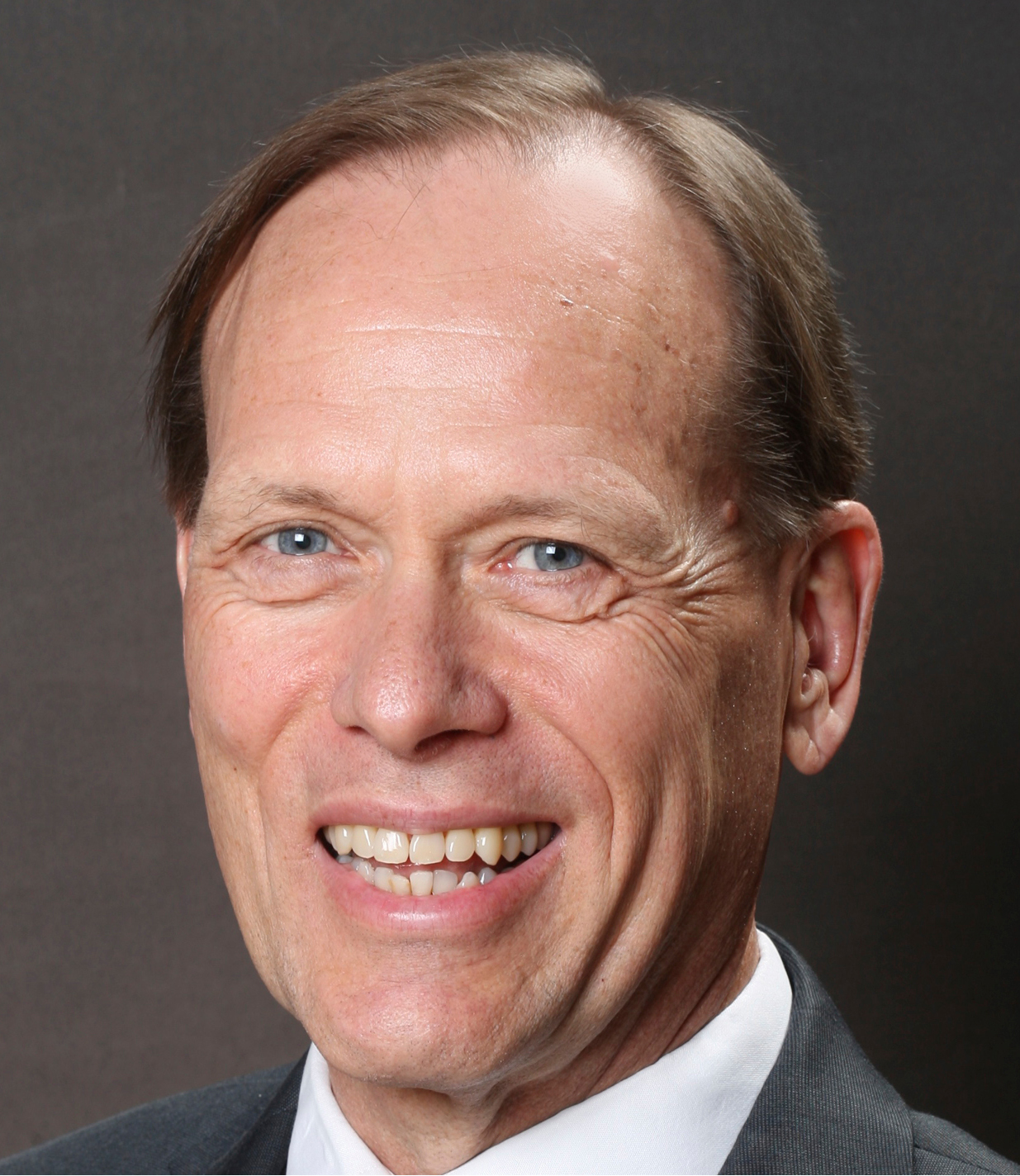
Geoff Waldbieser received all three of his degrees from Purdue University (B.S. ‘83, M.S. ‘85, and Ph.D. ‘89) before becoming a Research Molecular Biologist for the United States Department of Agriculture and an adjunct graduate faculty member in the Center for Veterinary Medicine at Mississippi State University. Based in Stoneville, Miss., Waldbieser and his research team have focused on genetic improvement of channel and blue catfish, which are the most economically important aquacultured species in the United States and are also grown throughout the world. His research has focused on DNA-based identification methods to produce pedigreed research populations, and currently leads efforts to sequence the genomes of these two species to facilitate selection for economically important traits. Waldbieser has authored or co-authored more than 85 research publications and has given numerous research presentations at national and international scientific conferences. He is a key scientist for the development of genomic resources for catfish, which continue to be essential for continued genetic selection. Which Purdue faculty member had the most profound impact on your professional career? Larry Chrisman (Animal Sciences) was most influential in my development as a scientist. During my junior year I volunteered in his lab. It was a watershed moment when I saw my own chromosomes under a microscope. William Frey, the manager of Tarkington Hall, also influenced me significantly. I worked for him as a counselor my senior year and as a staff resident for the two years of my master’s program .... Mr. Frey was a modest and effective leader, and an interesting man. He encouraged us to go the extra mile for those under our charge. He taught us to be active, empathetic listeners, which really changed my way of going from that point forward - amazing how many people just want someone to listen. What is the best advice you got while you were at Purdue? Who gave you the advice? Dr. Chrisman advised me to develop a “big bag of tricks,” basically broadening my learning and skills so when I graduated I would have flexibility in my career. He was a proponent of learning to communicate science to a general audience and gave me many opportunities to teach or talk to an audience. I was rough at first but improved with each experience. Dr. Chrisman would also encourage me to continue learning. One of his sayings was, “Don’t get so far behind the parade that you think you’re leading it.” What is the best advice you have ever given? To whom did you give the advice? Eat more U.S. farm-raised catfish. It’s good for you. Humility, self-sacrifice, and delayed gratification are valuable. Praise is always better coming from someone other than yourself. Don’t waste your time on envy. If you’re like me, then you admire those who give of themselves, so we should all work to be that kind of person. I would remind students that you will leave Purdue with a terrific education, but wisdom comes from experience so develop relationships and learn from experienced people. Sometimes you’ll only learn what not to do, but that’s valuable. Remember that you’re special and unique, just like everyone else, so be ready and willing to do the work, because the world does not owe you a living. Often, you’ll just have to be content with the personal satisfaction of a job well done. Hopefully you’ve learned how to learn, because you must continue learning to be relevant as knowledge and technology expand (although human nature doesn’t seem to change much). I think it boils down to: Learn from the past, live in the present, look to the future.
Gary M. Weber (Fishers Landing, NY | Distinguished Ag Alumni: 2012)
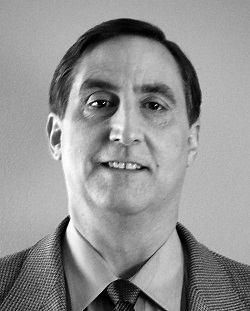
Gary Weber uses his education, experience, and skills to bridge the gap between science and society. He has contributed science-based solutions and a commonsense approach to challenges in diverse areas of animal agriculture, including sustainability, food safety, water quality, animal health, and international trade.“The cattle industry is where my heart is,” says the native of Angola, Indiana. He describes his current position as working with cattle and beef producers to evaluate and monetize risk reduction that will be of financial benefit to them. This specifically involves supporting efforts to license and commercialize a vaccine to reduce the shedding of E. coli O157:H7 for cattle in the United States and Canada. He interacts not only with the cattle production and beef processing sectors, but also with the produce industry, Congress, regulatory agencies, and the media. This job capitalizes on the expertise he gained in prior experiences. As executive director of regulatory affairs for theNational Cattlemen’s Association, he worked on public policy issues pertaining to meat inspection, animal health, beef safety, research, and education. During the1996 bovine spongiform encephalopathy crisis in Europe, he developed and led the organization's media response (including two appearances on the Oprah Winfrey show), and played a critical role during BSE incidents in 2001, 2003, and 2005. Frequently in the media spotlight, Weberbuilt a reputation for honesty. In 2007 he launched a consulting company to help clients deal with the forces of change in the areas of food safety, meat inspection, antibiotic resistance, animal well-being, environmental issues, homeland security, and crisis management. Weber considers himself a scientist first:“Regardless of the role I’m in, I try to apply the scientific method. Science is an open and transparent process that is very inclusive, and it’s a culture of dialogue and debate to find the right answers.”Weber enjoys spending time (and especially fishing) with his five daughters, ages 8 to 24, and continuing to learn by reading and thinking about science and political science literature.
Elaine R. Wedral (Distinguished Ag Alumni: 1992)
Dr. Wedral is President and Chairman of Westreco, Incorporated, located in Milford, Connecticut. Westreco is the North American Research and Development arm of Nestle S.A., the world’s largest food company, based in Switzerland. She serves on the Research and Development Steering Committee for Nestec, a subsidiary of Nestle S.A., which plans research and development strategy worldwide for Nestle. Dr. Wedral began her professional career as a Chemist at the Campbell Soup Company. She has since held positions as Senior Scientist in Product Development and Nutritional Services, Director of Product Development and Vice President of Research and Development and Technical Support Systems with Libby, McNeill, & Libby. Following the merger of Libby and Nestle S.A., Dr. Wedral was promoted to Vice-President/Director of Research and Development for Westreco, Inc., Nestle’s Western Hemisphere Research Laboratory. At Westreco she consolidated the Libby, Beech-Nut, and Nestle Foods development groups and technical services. In 1987, Dr. Wedral was named President of Nestle’s California development laboratory, which previously served as the Carnation Company’s research center. She reorganized that facility and directed the planning and construction of a state-of-the-art pet food product development laboratory in Missouri. Following this she assumed her current position with Westreco, Inc. She is deeply interested in the science education of our young people and is currently affiliated with the National Alliances for Science and the National Council for Science EdCication, whose goals relate to optimization of our science education methods and encouraging students to pursue careers in science.
Karl Weiss (Dunlap, IL | Distinguished Ag Alumni: 2016)
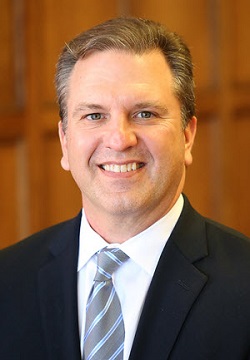
Karl Weiss is vice president of the Earthmoving Division at Caterpillar Inc., based in Peoria, Illinois.
Weiss has served in a variety of roles with increasing levels of responsibility in product design, marketing, operations and product management since joining Caterpillar as a design engineer in 1992.
His leadership skills have taken him to Caterpillar management positions throughout North America, Europe and Asia. In 2005, Weiss relocated to China for four years, where he assembled a team and developed and executed the wheel loader strategy for China, using and working on a joint venture project with Shangong Engineering Machinery.
Weiss was appointed vice president of the Earthmoving Division in 2013.
“His previous leadership and success in various global positions has given Karl Weiss the type of deep expertise and international experience that provides an ideal background for leading our Earthmoving business,” Caterpillar Group President Ed Rapp said.
Weiss is responsible for all aspects of the multibillion-dollar division, including design, engineering and manufacturing facilities as well as an extensive annual research and development budget.
Fujiang Wen (Taian, Shandong, China | Distinguished Ag Alumni: 2011)
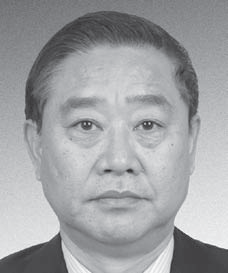
Fujiang Wen is one of China’s leading plant virologists — a noteworthy achievement in itself. But he is also a university president who has guided his institution through an extraordinary growth in both size and quality. And as an appointed representative to his country’s provincial and national assemblies, he serves on committees that develop policies on education, science, agriculture, and rural development that affect the lives of hundreds of millions of Chinese people. This highly educated, highly regarded figure grew up so poor that he did not walk until age 5 due to malnutrition; food was scarce in his rural village. Curious about the diseases that diminished his village’s grain harvest, he enrolled in Shandong Agricultural College(SDAU), where he discovered his passion for plant pathology. His subsequent graduate study at Purdue focused on studies of barley yellow dwarf virus and the use of various strategies to prevent or reduce losses from this important cereal crop virus. After completing his doctoral degree, he remained at Purdue as a postdoctoral associate working on various aspects of transgenic rice biotechnology. In 1992, he accepted a faculty position at SDAU, becoming one of the first Chinese plant pathologists trained in the United States to return to China. He quickly established his reputation as an outstanding research scientist and was promoted to full professor in two years. He was awarded a prestigious, two-yearRice Biotechnology Career Fellowship from the Rockefeller Foundation. Dedicated to promoting his discipline in China, he has trained many graduate students and helped launch their careers as scientists. Wen became president of his alma mater in 2002. During his tenure, enrollment more than doubled, to approximately32,000 in 2010. Annual research funding increased from $20 million to $130 million. He is heartened by the progress: “Every year in the graduation season, when I seethe undergraduates and graduates walk out of the university, I feel I get a reward with the greatest honor.”
Kristin Whittington (Edinburgh, IN | Distinguished Ag Alumni: 2016)
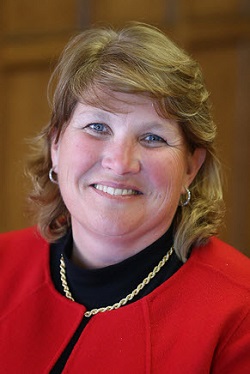
Kristin Whittington is the founder and president of Landmark Enterprises LLC, based in the southern Indiana town of Edinburgh.
Whittington’s agricultural background makes her uniquely suited to operate Landmark Enterprises, a company she founded in 2009. Whittington’s company is a consulting service helping livestock producers meet the requirements of local, state and federal environmental regulations.
After earning her Purdue degree in animal sciences and agribusiness, Whittington went to work with United Feeds and later with Purina Mills while she was building her own equine barn and riding school practice.
In 2000, Whittington joined the Indiana Department of Environmental Management as director of agricultural relations, responsible for educating both the IDEM staff and the general public on the functional realities of farming and agricultural operations.
In recognition of her efforts and contributions to Indiana agriculture, Whittington received the IDEM Commissioner’s Award in 2001.
Whittington is keenly interested in equine activities. She participates in nationally sanctioned competitive carriage driving events and has won several national titles.
Robert K. Wichmann (, | Distinguished Ag Alumni: 1992)
Mr. Wichmann is Corporate Vice President of the North American Seed Division of Pioneer Hi-Bred International Inc., headquartered in Des Moines, Iowa. He is in charge of marketing Pioneer brand products throughout the U.S. and Canada. He began his career with Pioneer in 1959 at its Tipton, Indiana facility. After one year, he became District Sales Manager for North Carolina and southern Virginia. He has since served as General Sales Manager and Vice President and Director of Sales for the Eastern Division, Executive Vice President and President of the Eastern Division. The Eastern Division is a highly profitable branch of the corporation, partly because of the innovative training and evaluation systems introduced by Mr. Wichmann for the Division’s 1,400 farmer-salesmen. Mr. Wichmann has served as a member of the Board of Directors of the Indiana 4-H Foundation and the Indiana Institute of Agriculture, Food, and Nutrition. He was also a member of the Resource Committee of the Indiana Corn Growers Association and the Indiana Agriculture, Food, and Nutrition’s Steering Committee for developing a strategic plan for Indiana agriculture. He is a member of the National Action Commission on the Mental Health of Rural Americans. He has always shown a strong commitment to his community. While living in the Tipton area, he was instrumental in establishing the Tipton County Foundation which identifies civic, social, educational, and recreational needs in that community. They address those needs through financial support in the form of grants from the Foundation. In 1988, the Purdue Ag Alumni Association presented its highest award, the Certificate of Distinction, to Mr. Wichmann for his contributions to Indiana Agriculture.
Marion P. Williams (Concord, MD | Distinguished Ag Alumni: 2000)
Raised on his family’s 40-acre farm in Salem, Ind, Marion Williams cultivated a love of the outdoors, an appreciation for the fruits of the earth, and a passion for health and nutrition. The elements-precursors to Williams’ career in food technology first were glimpsed in the shapes of apples, plums, cherries, and pears. “I started working odd jobs when I was 8 years old, and from age 11 to 18, I worked in an orchard, picking fruit in season and grading it out in the winter,” Williams recalls. “The most I ever made was $5. a day for a 10-hour day, but I managed to save enough for one semester at Purdue.” Once there, the objective was singular-succeed. “You .live with yourself 24 hours a day, and you do .whatever it takes to make. yourself comfortable,” Williams says. “I wanted to achieve, not fail. And that’s what drove me.” Williams excelled. Scholarships financed the rest of his Purdue education and a single conversation with Philip Nelson, who was completing his Ph.D. in food science at the time, defined his interests. “Something clicked when I talked to Phil about how science plays a role in getting a product from the fields to grocery stores,” Williams says. “I didn’t realize it as I picked apples and peaches, but fresh market produce was a latent interest of mine. It all came together at Purdue.” Today, a love for the great outdoors translates to weekly golf rounds and occasional company-sponsored tournaments. “I enjoy golf, but I think I’ll keep my day job,” Williams laughs. And yesteryear’s fresh fruits are today’s juices. An advocate of fruits and vegetables, Williams’ daily nutritional lineup includes a glass of purple grape juice-Welch’s, of course.
Thomas R. Wiltrout ( Distinguished Ag Alumni: 2009)
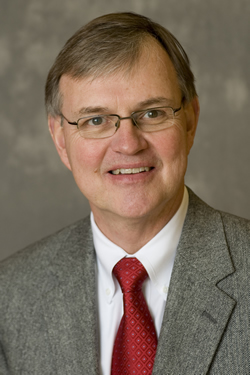
Mona Baker Wolf (Cincinnati, OH | Distinguished Ag Alumni: 2010)
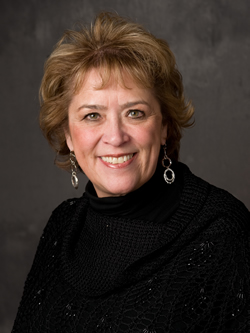
So you think there’s a huge market just waiting for a blue hot dog? Mona BakerWolf can tell you exactly how consumers will respond—not just to your idea but also to your hot dog’s shade of blue, taste, smell, and texture. Sensory science, a subset of food science, is the process of eliciting and measuring a human response as it relates to the five senses. For 21 years, the Cincinnati-based Wolf Group has provided sensory evaluation for concept testing, consumer preference, product improvement, and quality control. Wolf, a native of Bedford, Indiana, turned setback to opportunity in 1988 following a layoff. With three children under age three foremost in her planning, she launched Wolf Group from her basement. Today her company’s 17,000-square-foot facility includes rooms for both American- and European-style focus groups,35 sensory evaluation stations, six identical full bathrooms, three commercial and consumer kitchens, and an exercise room. Her clients range from mom-and-pop operations to Fortune 50 firms. Wolf and her 85 employees—including food scientists, marketing researchers, taste-testers, and sensory experts—have studied everything from chili to cellulite cream and razors to fabric softener. Highly trained descriptive panelists quantify minute attributes that allow the company to develop a statistical model of an ideal product. Sensory science can reduce product development time, save costs, and predict new product success. Understanding business models has been critical to the company's growth, Wolf says: “What we offer must be value-added to a company.”The Wolf Group also works with clients to ensure the accuracy of advertising claims. Wolf has served as an expert witness for legal issues related to sensory claims, usually to evaluate the protocols that were done to substantiate them. Frequent business travel gives Wolf time to read, and she also loves playing the piano. She is active in church activities and supports the Eve Center, a faith-based peer counseling organization. Wolf and her husband Tim have four children ages 25,23 (twins), and 19.“I think of Purdue as my watershed, where I found out who I was as an individual. I met some great people and had some tremendous professors. Purdue allowed me to invent myself—to create a self-sufficient person with marketable skills.”
Robert W. Wotzak (Fullerton, CA | Distinguished Ag Alumni: 2001)
Growing up in Chicago, Robert Wotzak was encouraged by his aunt at the University of Chicago to stretch a little and try something new. That first “something new” was coming to Purdue University. The second was choosing food science over biology for his master’s, so that he could use science in an applied fashion. “At the end of a two-hour lab, you can eat the sauerkraut, versus a chemistry lab, where you don’t dare taste the unknown,” he quips. Wotzak continued making “outside the box” decisions as he began his career. His first job was with Carnation Co. in southern California. “I had offers closer to home, but I said, ‘No, this will be the most challenging.”’ He also spent four years in Australia while working for Campbell Soup Co. “I don’t follow the normal path,” he says. Now he’s back in southern California, this time working for ConAgra Grocery Products Co. His passion is the outdoors, sometimes at sporting events involving his three children. Most often, his outdoor activity is walking -10 or 12 miles every weekend. “It’s a chance to break out and think and relax a little bit,” he says. He also enjoys gardening at his family’s San Juan Capistrano home. While flowers have been the mainstay, this spring he’s stepping off the familiar path. “We’re trying vegetables,” he says of the family garden. “I’m building big planter boxes, and hopefully we can control the soil and moisture and keep the gophers out.” What’s ahead? “That’s what scares me,” he laughs. “I tend to sit some place for a couple of years and then ask, ‘Now what?”’
Sarah E. Wyatt (Athens, OH | Distinguished Ag Alumni: 2019)
Sarah Wyatt is a plant molecular biologist and international authority on gravitational signaling in plants. Her research, including an experiment on board the International Space Station in 2014-15, has provided novel insights about the genes involved in graviperception and will likely impact plant responses to microgravity in the human quest to colonize space. Wyatt directs the Interdisciplinary Molecular and Cell Biology Program at Ohio University. Gravity is a fundamental stimulus governing plant growth and development. When plants are reoriented with respect to gravity — placed on their side — the shoots normally bend up and the roots bend down. Wyatt’s research revealed that shoots turned on their side in the cold do not bend but “remember” the gravity stimulus and bend to the side when returned upright at normal temperature. She used this to discover three classes of gravity persistent signal (GPS) mutants and established that the response in all three was related to inappropriate transport of the main growth hormone. Wyatt’s group continues to explore the GPS response by using genomic and proteomic analysis for global gene discovery. In addition to her research, Wyatt has been involved in teaching and service on local to global scales. At Ohio University, she developed the Tech Savvy Ohio training program through her involvement in the American Association of University Women. Her national and international service includes ongoing participation in the NASA’s Science Working Group GeneLab and Plant Science Definition Team. She serves on NASA’s grants panels on International Life Science Research, Spaceflight, and Fundamental Space Biology. Through her involvement in NASA, she also worked with the European Space Agency, International Space Life Sciences Working Group in Washington, DC, and Belgium. Wyatt serves on the editorial board of the American Journal of Botany and Gravitational and Space Biology and is active in governance of the American Society of Gravitational and Space Biology and the American Society of Plant Biologists.
Jeremy Xu (Distinguished Ag Alumni: 2012)
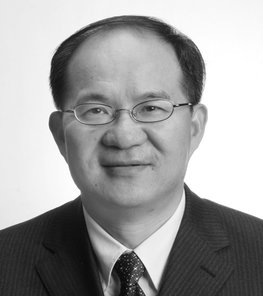
Jeremy (Jinghuai) Xu intended to become a university professor of biotechnology, but his balanced knowledge of both experimental science and business led him instead into corporate research and business development. Xu leads 320 professionals in finance, marketing, sales, technology, and supply chain management for DuPont ProtectionTechnologies, a unit of DuPont that owns the well-known brands Kevlar® andTyvek®, among others. Xu’s responsibility extends to Japan, Korea, China, India, Australia, and 15 other countries, and the total business revenue of the Asia Pacific area he manages exceeded $800 million in under his leadership, the business has doubled in five years. This savvy businessman considers himself a scientist first. “I’m not unique— we have many managers with Ph.D.degrees,” he says. “Everything we do in DuPont is built on solid science.”Xu grew up in China and attended one of the top universities in his province, where he met his wife, Lingling Shi. He worked for two years in a research institute in southern China before pursuing graduate study in Hong Kong, where a chain of contacts introduced him to Purdue. Today Xu tells friends he “lives in an airplane,” as he travels a region highly diverse in culture, language, and economics. His management style is one of servant leadership: “I put the right people in the right place and make sure they have the right tools and resources for mutually agreed-upon common goals. It’s all built on trust,” he explains. “I trust them, and they trust me.”He also is committed to mentoring younger managers, both because he enjoys it and because he feels an obligation to pay back the many people at Purdue and DuPontwho coached him along the way. Xu is a relentlessly hard worker whose business acumen and interpersonal skills have helped him earn the company’s top awards.Working for a U.S. company in Asiainvolves frequent evening conference calls, so Xu has little spare time during the workweek. He devotes weekends to his family, which includes two daughters, and he plays bridge — another skill he practiced at Purdue.
Carla N. Yerkes (Indianapolis, IN | Distinguished Ag Alumni: 2014)
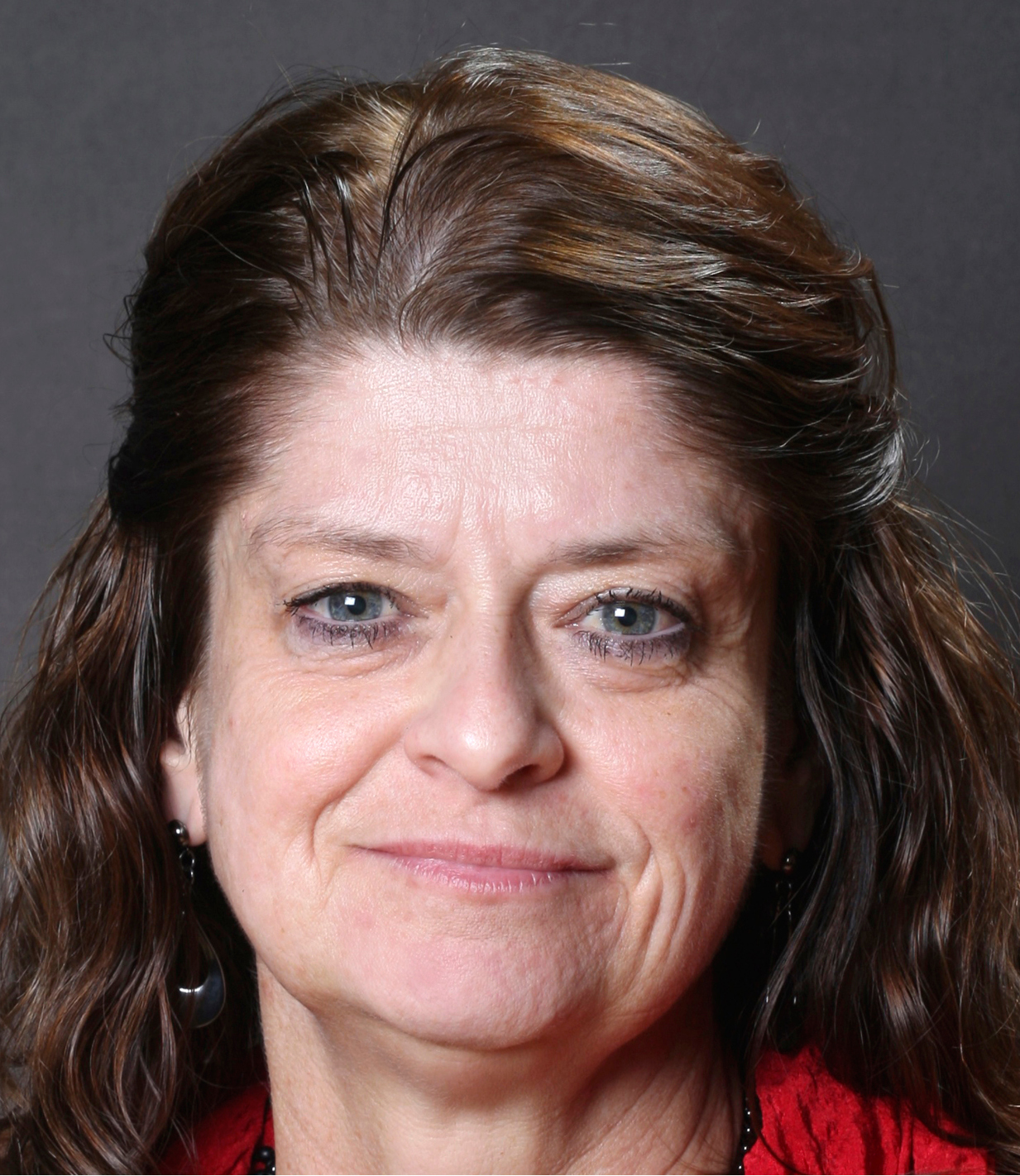
Carla Yerkes, B.S. ‘82, M.S. ‘85, Ph.D. ‘95, is a group leader, input traits biology, discovery research for Dow AgroSciences in Indianapolis. She was appointed to her present position in January 2012. She started her career as a research biologist specializing in weed management, discovery research, in 1995. “Carla Yerkes’ ability to contribute analytical depth across the broad scientific enterprise of Dow AgroSciences is remarkable,” said her nominator, Robert Joly, professor and head of Purdue’s Department of Horticulture and Landscape Architecture. Yerkes has generously given her time and expertise to current Purdue students by leading workshops, participating in STEM conferences, and contributing each spring to the HORT 110 (Survey of Horticulture) course. “The power of her presentation as a role model, especially for young women, cannot be overstated,” Jolly said. “She speaks directly to students in a way that gives them a sense of the possibilities that could await them, in areas they have not yet imagined.” Which Purdue faculty member had the most profound impact on your professional career? Steve Weller of the Department of Horticulture and Landscape Architecture had the most marked influence on my professional career. Before meeting Dr. Weller and joining his research group, I really didn’t grasp the significance of basic research and its real-life applications. Dr. Weller gave me the perfect balance of direction and freedom, which prepared me well for the research world. Outside of Purdue, my grandfather taught me to love agriculture. My dad taught me the value of hard work Where was your favorite place on campus to study? Unfortunately, my favorite place to study was not the most effective place. I enjoyed studying in the student lounge, but I studied best alone in my dorm room. Were you a good student when you were at Purdue? I was a good student in high school and in college. I think I did well in classes during my freshman year because I feared failure. I came from a small high school and was intimidated by the breadth of education with which students from larger high schools were equipped. I did well in subsequent years and in graduate school because I loved what I was learning. What is the best advice you got while you were at Purdue? Who gave you the advice? Whether the results prove or disprove the hypothesis being tested, a well¬ designed and executed experiment is successful. This message (paraphrased) was conveyed to me by Dr. Weller during one of our first meetings as graduate student and major professor. What is the best advice you have ever given? To whom did you give the advice? Having a career that you love will make you a success, not one that provides money without joy or satisfaction. That was my advice to my niece, Sara, when she told me she wanted to change her major.
Terry Yu-Hsien Yu (Distinguished Ag Alumni: 1993)
Dr. Yu served as chairman of the Council of Agriculture, Executive Yuan, in the Government of Taiwan from 1988 to 1992. As chairman, he was effectively the Minister of Agriculture of Taiwan. Since stepping down from the chairmanship in 1992 for health reasons, Dr. Yu has served as an advisor to the Council of Agriculture. Prior to holding the office of chairman, he was the Commissioner of Agriculture and Forestry of the Taiwan Provincial government.
In the early days of his career, Dr. Yu was progressively an associate professor, professor, and then Chairman of the Department of Agricultural Economics at the National Chung Hsing University. In 1972 Dr. Yu became a senior specialist with the Chinese American Joint Commission on Rural Reconstruction. He was appointed senior specialist of the Planning and Programming Division following the Commission’s reorganization into the Council for Agricultural Planning and Development, a cabinet advisory agency. Five months later, Dr. Yu accepted the post as president of the National Chiayi Junior College of Agriculture.
As Commissioner of Agriculture and Forestry in the Taiwan provincial government, he was cited dozens of times by the government for his meritorious service. Dr. Yu was elected a member of the Kuomintang Central Committee at the 13th congress and was then, shortly after, appointed the chairman of the Council of Agriculture, the highest policy-making body for agricultural affairs. He was particularly effective in influencing national agricultural policy. His direction led to many policy changes including: agricultural price policy, marketing cooperatives, water and irrigation policy, energy policy, farmland taxation, farm mechanization, environmental policy, and rural health insurance. Dr. Yu has been a driving force for Taiwan’s modernization of agriculture with a humanistic approach.
Liangli (Lucy) Yu (College Park, MD | Distinguished Ag Alumni: 2012)
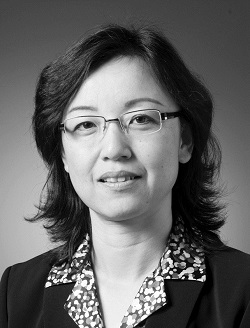
Liangli (Lucy) Yu’s career has been relatively brief by the standards of academia — a mere 12 years have elapsed since she completed her doctorate at Purdue. She has crammed that period full of achievement, distinguishing herself at two academic institutions, publishing prolifically, attracting grant funds, training graduate students, and receiving prestigious awards. Yu was born in Shanghai, lived inter-Mongolia until age 13, and attended high school and college in Jiangsu province on the east coast of China. She has very tight connections with several Chinese institutions, including having a research laboratory in the Center for Food Safety and human Nutrition at Shanghai Jiao TongUniversity, a top public research institution. At the University of Maryland, Yu studies nutraceuticals and functional foods.“Overall, we would like to improve foods to improve human health,” she explains.“Everybody eats. Food is the best approach to reduce the risk of chronic human diseases.”Her exceptional publication record includes editing or co-editing two books: Wheat Antioxidants and Cereals and pulses: Nutraceutical Properties and Health Benefits. She has written 13 book chapters and more than 100 research articles. She holds U.S. and European patents for the enzymatic modification of psyllium and has three U.S. patents pending. Several teaching awards have recognized's ability to create an interactive atmosphere: “I like to use many examples related to our daily life to explain the foodchemistry concepts,” she says. She givesher undergraduate students opportunitiesfor research, and several have published and received patents with her. She hastrained six doctoral and five master’sdegree graduates in food science, and onemaster’s degree graduate in nutrition. Hergraduate students have landed positions at top-ranked universities across the country. She currently has nine Ph.D. students in food science. Her own 22-year-old son is a first-year doctoral student in chemistry at Harvard University. Away from the classroom and lab, she enjoys cooking, travel, and outdoor activities.
Jian-Kang Zhu (Riverside, CA | Distinguished Ag Alumni: 2005)
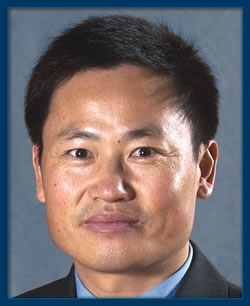
Growing up in a small village in China and observing plants sprout to maturity on his family’s farm rooted a lifelong interest and career passion for Jian-Kang Zhu. But leaving his homeland, immersing himself in the study of soil sciences, and exploring the intricacies of plant physiology produced a world-class scientist and researcher.“I drove all the way from California toughest Lafayette, and the many different landscapes I saw were fascinating,” saysZhu of his 1990 cross-country trek from the University of California to Purdue to study plant physiology. These days, however, airplanes cover international miles. A frequent guest lecturer and conference co-chair, Zhushares with scientists worldwide his laboratory's revolutionary findings on plant stress resistance—specifically, identification of key genes that indicate how plants respond to stressors, such as drought, temperature, and poor soil. His discoveries include the DNAdemethylating enzyme that is a major component of epigenetic gene regulation in plants and several new families of plant microRNAs and short interfering RNAs.In layman’s terms, this translates to the identification of particular genes in plants, which make them more resistant to stressors, such as drought and severe temperatures. Experiments and evaluations are ongoing in Zhu’slaboratories, but all point in the same positive direction: Someday, perhaps even in the next decade, improved genes will be incorporated into plants’ genomes, which will enable them to use water more efficiently. Farmers will reap higher yields; their acres will feed more of the world's hungry; and our environment will preserve a precious asset—water. The recipient of numerous honors and awards, Zhu most recently earned the distinguished Charles Albert Shull Award from the American Society of PlantBiologists. In 2004, he was appointed to a Presidential Chair by the University of California.“Purdue University provided a very stimulating intellectual environment for education through research, and I feel fortunate to have learned from world-class faculty members. I benefited greatly from an opportunity no student should miss.”
